|
Newsletter
Seminar Material
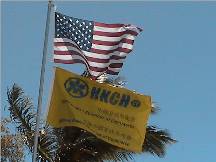



Biz:
China
Hong
Kong Hawaii


What people
said about us

China
Earthquake Relief
Tax &
Government
Hawaii Voter Registration
 Biz-Video
Biz-Video
 Hawaii's
China Connection Hawaii's
China Connection

 CDP#1780962
CDP#1780962

 Doing Business in
Hong Kong & China
Doing Business in
Hong Kong & China
| |
Hong Kong, China & Hawaii Biz*




Do you know our dues
paying members attend events sponsored by our collaboration partners worldwide
at their membership rates - go to our event page to find out more!
After
attended a China/Hong Kong Business/Trade Seminar in Hawaii...still unsure what
to do next, contact us, our Officers, Directors and Founding Members are
actively engaged in China/Hong Kong/Asia trade - we can help!
Are you ready to export your product or
service? You will find out in 3 minutes with resources to help you -
enter
to give it a try

 China Central TV - live
Webcast
China Central TV - live
Webcast
 Skype - FREE
Voice Over IP Skype - FREE
Voice Over IP
 View Hawaii's China Connection
Video Trailer
View Hawaii's China Connection
Video Trailer

 Direct link
PDF file
Direct link
PDF file

 Year of the Pig - February 18, 2007
Year of the Pig - February 18, 2007
  Listen to MP3 “Business Beyond the Reef” to discuss
the problems with imports from China, telling all sides of the story and then
expand the discussion to revitalizing Chinatown -
Special Guest: Johnson Choi, MBA, RFC. President - Hong Kong.China.Hawaii
Chamber of Commerce (HKCHcc) and Danny Au, Manager, Bo Wah Trading
Listen to MP3 “Business Beyond the Reef” to discuss
the problems with imports from China, telling all sides of the story and then
expand the discussion to revitalizing Chinatown -
Special Guest: Johnson Choi, MBA, RFC. President - Hong Kong.China.Hawaii
Chamber of Commerce (HKCHcc) and Danny Au, Manager, Bo Wah Trading
December 31 2007
 Hong Kong:
An extension of the Sha Tin-Central Rail Link connecting Yau Ma Tei and Whampoa
can be constructed separately from the project, a top MTR official said
yesterday. In the final draft submitted to the government earlier this year, the
MTR and the then Kowloon Canton Railway Corporation agreed to build a station in
Whampoa through an east-west extension from the Yau Ma Tei station on the Kwun
Tong Line through Ho Man Tin - an interchange station to the Sha Tin-Central
Rail Link. The official, who declined to be identified, said it was possible the
extension - which consists of only three stations - would be built first. "It is
all subject to the government's decision, and it should be announced in one to
two months," he said. He said he hoped the extension, along with other routes
including the South Island Line and the West Island Line - for which the
consultation period ended yesterday - would be finished in five to six years. In
a Legislative Council document released in July, the government proposed that
the link include 10 stations - Tai Wai, Diamond Hill, Kai Tak, To Kwa Wan, Ma
Tau Wai, Ho Man Tin, Hung Hom, Exhibition, Admiralty and Central West. The new
link is supposed to converge with East Rail at Hung Hom station before crossing
the harbour, but it has not been decided if the fourth harbour crossing would
extend from East Rail or the Sha Tin-Central Line, which will determine which
passengers get direct cross-harbour access. Meanwhile, the MTR has seen a surge
in passenger trips on West Rail and East Rail lines since the railway merger on
December 2. Exact figures will not be available until the end of this month, but
the official said he believed more passengers were taking the MTR given the
savings on offer. Hong Kong:
An extension of the Sha Tin-Central Rail Link connecting Yau Ma Tei and Whampoa
can be constructed separately from the project, a top MTR official said
yesterday. In the final draft submitted to the government earlier this year, the
MTR and the then Kowloon Canton Railway Corporation agreed to build a station in
Whampoa through an east-west extension from the Yau Ma Tei station on the Kwun
Tong Line through Ho Man Tin - an interchange station to the Sha Tin-Central
Rail Link. The official, who declined to be identified, said it was possible the
extension - which consists of only three stations - would be built first. "It is
all subject to the government's decision, and it should be announced in one to
two months," he said. He said he hoped the extension, along with other routes
including the South Island Line and the West Island Line - for which the
consultation period ended yesterday - would be finished in five to six years. In
a Legislative Council document released in July, the government proposed that
the link include 10 stations - Tai Wai, Diamond Hill, Kai Tak, To Kwa Wan, Ma
Tau Wai, Ho Man Tin, Hung Hom, Exhibition, Admiralty and Central West. The new
link is supposed to converge with East Rail at Hung Hom station before crossing
the harbour, but it has not been decided if the fourth harbour crossing would
extend from East Rail or the Sha Tin-Central Line, which will determine which
passengers get direct cross-harbour access. Meanwhile, the MTR has seen a surge
in passenger trips on West Rail and East Rail lines since the railway merger on
December 2. Exact figures will not be available until the end of this month, but
the official said he believed more passengers were taking the MTR given the
savings on offer.
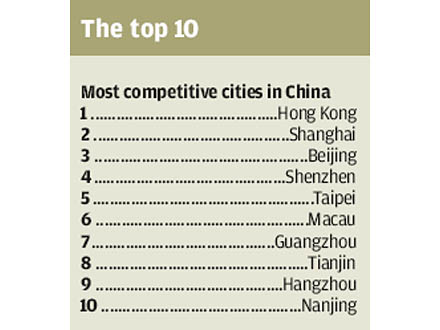 Hong Kong was named the most competitive city in China, beating Shanghai,
Beijing and Shenzhen, in research released yesterday. The city has taken the top
position six years running since the annual research was first released in 2002.
However, Hong Kong's growth potential rating dropped from fourth place last year
to sixth for this year. The research, conducted by the China Institute of City
Competitiveness, studied and assessed the social and economic factors of 289
cities in China to compile the rankings. On overall competitiveness, Hong Kong
topped the list, followed by Shanghai, with Beijing third. The casino boom city
of Macau, which ranked seventh last year, rose to sixth this year. The
administration of Chief Executive Donald Tsang Yam-kuen ranked No1 under the
category of government integrity, which measures administrative efficiency and
transparency of governance. The Shenzhen government came second followed by the
municipal government of Jinan in Shandong province . Macau was ranked seventh,
while Shanghai was 12th and Beijing 13th. In terms of growth potential, Hong
Kong came sixth, being overtaken by Shenzhen, Macau, Suzhou in Jiangsu province
, Tianjin and Qingdao.
Hong Kong was named the most competitive city in China, beating Shanghai,
Beijing and Shenzhen, in research released yesterday. The city has taken the top
position six years running since the annual research was first released in 2002.
However, Hong Kong's growth potential rating dropped from fourth place last year
to sixth for this year. The research, conducted by the China Institute of City
Competitiveness, studied and assessed the social and economic factors of 289
cities in China to compile the rankings. On overall competitiveness, Hong Kong
topped the list, followed by Shanghai, with Beijing third. The casino boom city
of Macau, which ranked seventh last year, rose to sixth this year. The
administration of Chief Executive Donald Tsang Yam-kuen ranked No1 under the
category of government integrity, which measures administrative efficiency and
transparency of governance. The Shenzhen government came second followed by the
municipal government of Jinan in Shandong province . Macau was ranked seventh,
while Shanghai was 12th and Beijing 13th. In terms of growth potential, Hong
Kong came sixth, being overtaken by Shenzhen, Macau, Suzhou in Jiangsu province
, Tianjin and Qingdao.
The Industrial and Commercial Bank
of China (ICBC) said on Thursday it had agreed to buy 1.92 billion HK dollars
(246 million U.S. dollars) worth of shares and warrants of its Hong Kong unit --
ICBC (Asia) Limited -- from the Spanish Fortis Bank. The deal, if completed,
would raise the stake of ICBC in its Hong Kong unit from the previous 62.98
percent to 71.21 percent, the country's largest commercial lender said in a
statement released in Beijing. The purchase included an 8.23-percent stake in
the common shares of ICBC (Asia) Limited held by Fortis Bank. ICBC (Asia)
Limited was the flagship subsidiary in charge of ICBC's overseas business. It
had become the sixth-largest bank, asset-wise, in Hong Kong by the end of June
with assets totaling 224.8 billion HK dollars. "The purchase of the stake from
Fortis demonstrated ICBC's confidence in the future prospects of its Hong Kong
unit as well as the financial market in Hong Kong," said ICBC's President Jiang
Jianqing.
An air services consultation between
Hong Kong and India had successfully concluded, with substantial liberalization
of the bilateral air services arrangements, said the government of the Hong Kong
Special Administrative Region (HKSAR) Thursday. Under the new arrangements, the
airlines of the two sides will be able to increase services to Delhi and Mumbai
by more than double the existing level, which is at present about 20 frequencies
per week. New services to Bangalore, the IT base in India, and Chennai will also
be possible. The two sides have also exchanged new fifth freedom rights. For
example, Indian airlines will be able to operate services to points in North
America via Hong Kong under the new arrangements. Hong Kong airlines will be
able to operate services to points in Europe beyond India. "The new arrangements
between the two sides are a major step forward in the bilateral aviation
relationship," said Eva Cheng, secretary for Transport and Housing of the HKSAR
government.
Hong Kong saw 2,448,135 visitor
arrivals in November, up 17.6 percent over the same month last year, and the
month's best on record, official figures released Thursday indicated. Hong Kong
Tourism Board said total arrivals for the year so far are 25,379,939, up 11.1
percent and topping the 2006 full-year figure of 25.25 million. All long- and
short-haul market regions achieved notable gains.Arrivals from the Chinese
mainland reached 1,291,307, up 23.7 percent over the same month last year. Of
the Chinese mainland arrivals, 51.9 percent traveled under the Individual Visit
Scheme, a year-on-year rise of 38.8 percent. Double-digit growth was also
registered in visitors from the Americas, Europe, Africa and the Middle East,
Australia, New Zealand and the South Pacific, and South and Southeast Asia.
About 60.5 percent of all visitors to Hong Kong in the month stayed in the city
for at least one night, with the remainder classified as same-day, in-town
visitors. Average occupancy across all categories of hotels in November was 93
percent, and the average achieved hotel room rate across all hotel categories
for the month was 1,383 HK dollars (177 U.S. dollars).
 The anti-graft watchdog
is launching a corruption awareness drive among supermarket operators after
receiving more than 10 malpractice reports in the first 11 months of the year.
The Independent Commission Against Corruption is urging the supermarket chains
to give clear instructions to staff that forbid them to accept advantages from
suppliers. It also calls for a policy for handling short deliveries or
poor-quality goods and security measures to protect customers' credit-card
information from improper use. A "best practice module" listing the
recommendations was issued to major supermarket chains this month. ICAC figures
show there are about 20 graft complaints related to supermarkets and chain
stores each year. Last year five people were convicted and received sentences of
between five and 39 months. The agency's acting assistant director of corruption
prevention, Mok Wah-hoi, said the malpractices were most likely to occur during
the procurement of goods by middle-ranking staff. "In some cases, the
supermarket staff were given a certain proportion of sales volume as commission
in return for providing preferential treatment to the suppliers," the official
said. The anti-graft watchdog
is launching a corruption awareness drive among supermarket operators after
receiving more than 10 malpractice reports in the first 11 months of the year.
The Independent Commission Against Corruption is urging the supermarket chains
to give clear instructions to staff that forbid them to accept advantages from
suppliers. It also calls for a policy for handling short deliveries or
poor-quality goods and security measures to protect customers' credit-card
information from improper use. A "best practice module" listing the
recommendations was issued to major supermarket chains this month. ICAC figures
show there are about 20 graft complaints related to supermarkets and chain
stores each year. Last year five people were convicted and received sentences of
between five and 39 months. The agency's acting assistant director of corruption
prevention, Mok Wah-hoi, said the malpractices were most likely to occur during
the procurement of goods by middle-ranking staff. "In some cases, the
supermarket staff were given a certain proportion of sales volume as commission
in return for providing preferential treatment to the suppliers," the official
said.
 China:
Exporters of food products that fail to meet safety standards of destination
countries face a fine of up to 20 times the value of the consignment and can
even be charged for committing a crime if the top legislature approves a draft
law. Food product exporters who fail to go through entry-exit quarantine
inspections face similar punishments, according to the draft law under the first
review at the ongoing session of the National People's Congress (NPC) Standing
Committee. If approved, the draft law will spell out clear penalties for illegal
food exporters for the first time. The two existing laws on food safety, the
Food Hygiene Law and the Law on Agricultural Product Quality and Safety, say
nothing about penalties. They only authorize the State Council to issue relevant
regulations. The draft food safety law seeks to impose tighter checks on food
exports, too, and makes it mandatory for food exporters and supply farms to
register with the General Administration of Quality Supervision, Inspection and
Quarantine (AQSIQ).
China:
Exporters of food products that fail to meet safety standards of destination
countries face a fine of up to 20 times the value of the consignment and can
even be charged for committing a crime if the top legislature approves a draft
law. Food product exporters who fail to go through entry-exit quarantine
inspections face similar punishments, according to the draft law under the first
review at the ongoing session of the National People's Congress (NPC) Standing
Committee. If approved, the draft law will spell out clear penalties for illegal
food exporters for the first time. The two existing laws on food safety, the
Food Hygiene Law and the Law on Agricultural Product Quality and Safety, say
nothing about penalties. They only authorize the State Council to issue relevant
regulations. The draft food safety law seeks to impose tighter checks on food
exports, too, and makes it mandatory for food exporters and supply farms to
register with the General Administration of Quality Supervision, Inspection and
Quarantine (AQSIQ).
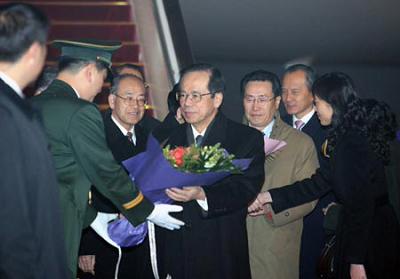 Japanese Prime Minister Yasuo Fukuda (C)
is welcomed by Chinese officials at an airport in Beijing, capital of China,
Dec. 27, 2007. Yasuo Fukuda arrived here on Thursday for a four-day official
visit to China. Japanese Prime Minister Yasuo Fukuda (C)
is welcomed by Chinese officials at an airport in Beijing, capital of China,
Dec. 27, 2007. Yasuo Fukuda arrived here on Thursday for a four-day official
visit to China.
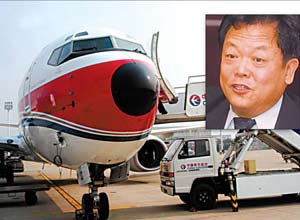 The partnership between China Eastern
Airlines and Singapore Airlines will provide necessary financial resources and
management expertise to help the Chinese firm achieve the goal of becoming a hub
airline company based in Shanghai, Li Fenghua said Thursday. The partnership between China Eastern
Airlines and Singapore Airlines will provide necessary financial resources and
management expertise to help the Chinese firm achieve the goal of becoming a hub
airline company based in Shanghai, Li Fenghua said Thursday.
 A
female trainee pilot of the China Air Force undergoes training in this undated
photo. Twenty-nine female trainee pilots gained their qualifications to attend
higher level flying training on Thursday. A
female trainee pilot of the China Air Force undergoes training in this undated
photo. Twenty-nine female trainee pilots gained their qualifications to attend
higher level flying training on Thursday.
 Xinhua
selects Chinese athletes of the Year 2007. They are Liu Xiang, Yang Wei, Shen
Xue/Zhao Hongbo, Zhu Qinan, Guo Jingjing, Zhang Guozheng, Zhu Lin, Zou Shiming,
Wu Peng and Guo Yue. Xinhua
selects Chinese athletes of the Year 2007. They are Liu Xiang, Yang Wei, Shen
Xue/Zhao Hongbo, Zhu Qinan, Guo Jingjing, Zhang Guozheng, Zhu Lin, Zou Shiming,
Wu Peng and Guo Yue.
China's telecoms industry came a step closer to its
long-awaited reorganization after the State Council backed a third- generation
high-speed mobile phone network for the mainland.
Shanghai surpassed Hong Kong as a market for initial stock
offerings this year with companies going public raising 417.8 billion yuan
(HK$444.1 billion) compared with HK$286.9 billion on local exchanges.
December 27 - 30, 2007
 Hong Kong:
Maritime authorities from Guangdong, Hong Kong and Macao jointly issued the
latest-version of electronic charts for one-year's free use for jet boats
shuttling between the three sides. The China Communication News reported Monday
that the Guangdong Provincial Maritime Bureau, the Marine Department of the Hong
Kong Special Administrative Region (HKSAR) and the Maritime Administration of
the Macao Special Administrative Region (MSAR )produced the 14 pieces of
electronic chart display and information system (ECDIS), which are available for
free use for more than 100jet boats carrying passengers in the sea area near the
Pearl River mouth. Such service will charge after the first year's free use of
the ECDIS, the authorities said, without saying how much it will cost. Hong
Sixiong, an official from Guangdong, said the ECDIS, a specific form of
computer-based navigation information system that integrates a variety of
information that is displayed and interpreted to mariners, will greatly improve
navigation safety and operational efficiency, the newspaper reported. The area
now sees nearly 300 departures and arrivals of jet boats every day. The annual
passenger departures and arrivals are about 20 million. The newly-developed
ECDIS provides seamless coverage of the sea area of the Pearl River mouth and
corrects a few errors of separate electronic charts previously prepared by the
three authorities, Hong said. The International Maritime Organization (IMO)
lately issued a regulation, requiring jet boats, manufactured after July 1,
2008,must be equipped with ECDIS receivers, and all jet boats in operation must
use the ECDIS facilities after July 1, 2010. Hong Kong:
Maritime authorities from Guangdong, Hong Kong and Macao jointly issued the
latest-version of electronic charts for one-year's free use for jet boats
shuttling between the three sides. The China Communication News reported Monday
that the Guangdong Provincial Maritime Bureau, the Marine Department of the Hong
Kong Special Administrative Region (HKSAR) and the Maritime Administration of
the Macao Special Administrative Region (MSAR )produced the 14 pieces of
electronic chart display and information system (ECDIS), which are available for
free use for more than 100jet boats carrying passengers in the sea area near the
Pearl River mouth. Such service will charge after the first year's free use of
the ECDIS, the authorities said, without saying how much it will cost. Hong
Sixiong, an official from Guangdong, said the ECDIS, a specific form of
computer-based navigation information system that integrates a variety of
information that is displayed and interpreted to mariners, will greatly improve
navigation safety and operational efficiency, the newspaper reported. The area
now sees nearly 300 departures and arrivals of jet boats every day. The annual
passenger departures and arrivals are about 20 million. The newly-developed
ECDIS provides seamless coverage of the sea area of the Pearl River mouth and
corrects a few errors of separate electronic charts previously prepared by the
three authorities, Hong said. The International Maritime Organization (IMO)
lately issued a regulation, requiring jet boats, manufactured after July 1,
2008,must be equipped with ECDIS receivers, and all jet boats in operation must
use the ECDIS facilities after July 1, 2010.
Mortgage delinquency ratio in Hong
Kong dropped to 0.11 percent and rescheduled loan ratio fell to 0.2 percent,
both record lows, driving the combined ratio lower to 0.32 percent, according to
a report released Monday. The Hong Kong Monetary Authority, which virtually
serves as the central bank in the special administrative region in south China,
also found in the monthly survey that new mortgage loans drawn down rose 17.5
percent to 18.7 billion HK dollars (2.4 billion U.S. dollars). New loans
approved surged 20.5 percent to 27.7 billion HK dollars (3.55 billion U.S.
dollars) in the city, which has seen its real properties industry rebounding
since 2003, when the SARS (severe acute respiratory syndrome) outbreak, coupled
with other elements, drove the economy and the properties industry to the
bottom. The rise was attributed to more approvals for secondary market
transactions, which more than offset the drop in approvals for primary market
transactions and refinancing loans, the report said. Approvals for
secondary-market transactions grew 39.4 percent to 21.9 billion HK dollars (2.81
billion U.S. dollars), primary- market transactions fell 33.4 percent to 2.7
billion HK dollars (0. 35 billion U.S. dollars), and refinancing loans dropped
3.3 percent to 3 billion HK dollars (0.38 billion U.S. dollars). The number of
new applications rose 3.9 percent, the report said. The proportion of new loans
approved at more than 2.5 percent below the best lending rate decreased to 90.9
percent from 94 percent in October. The outstanding value of mortgage loans rose
0. 9 percent to 554.6 billion HK dollars (71.1 billion U.S. dollars).
Twenty-three authorized institutions participated in the monthly survey.
Hong Kong recorded a 13.9 billion HK
dollars (1.8 billion U.S. dollars) surplus in its balance-of-payments account in
the third quarter of 2007, official figures released Friday indicated. The
amount was 3.9 billion HK dollars higher than in the second quarter,
representing 3.4 percent of Hong Kong's gross domestic product, the Census and
Statistics Department said. Of the major balance-of-payment components, there
was a current- account surplus of 65.2 billion HK dollars in the third quarter,
larger than that of 26.5 billion HK dollars in the second. A net outflow of
financial non-reserve assets amounting to 73.3billion HK dollars was recorded,
larger than that of 34 billion HK dollars in the second, said the department.
Compared with the 61.9 billion HK dollars surplus recorded in the third quarter
of 2006, the current-account surplus in the third quarter of 2007 was
characterized by rises in visible trade deficit and invisible trade surplus, a
continued net inflow of external-factor income, and a continued net outflow of
current transfers. In the third quarter, a net inflow of capital transfers was
estimated at 7 billion HK dollars, as compared with a net inflow of 3.7 billion
HK dollars in the second. (One U.S. dollar = 7.793 HK dollars)
 The relaunch of the Ngong Ping 360 cable car system on Lantau Island was met
with two minor halts lasting several minutes in the first two days of trials
since an empty cabin plunged more than 50 meters to the ground six months ago.
The company offered 8,000 to 10,000 free tickets to MTR staff and their family
members as well as to local engineers yesterday, ending up with more than 5,800
people enjoying a fog- shrouded ride from Tung Chung to Ngong Ping plateau. A
full relaunch of the line will be made on New Year's Eve after nearly six months
of enforced closure. The two breaks, lasting eight minutes yesterday and five
minutes on Saturday, were described as "normal situations" by Ngong Ping 360
managing director Morris Cheung Siu-wah. "Those were because the sensors of the
cable car had deviations. The operators of the car made announcements
immediately through the public address system while the cabins were moved
backwards for checkups," he said. Cheung added such incidents were a matter of
probability and normally took place once or twice a week.
The relaunch of the Ngong Ping 360 cable car system on Lantau Island was met
with two minor halts lasting several minutes in the first two days of trials
since an empty cabin plunged more than 50 meters to the ground six months ago.
The company offered 8,000 to 10,000 free tickets to MTR staff and their family
members as well as to local engineers yesterday, ending up with more than 5,800
people enjoying a fog- shrouded ride from Tung Chung to Ngong Ping plateau. A
full relaunch of the line will be made on New Year's Eve after nearly six months
of enforced closure. The two breaks, lasting eight minutes yesterday and five
minutes on Saturday, were described as "normal situations" by Ngong Ping 360
managing director Morris Cheung Siu-wah. "Those were because the sensors of the
cable car had deviations. The operators of the car made announcements
immediately through the public address system while the cabins were moved
backwards for checkups," he said. Cheung added such incidents were a matter of
probability and normally took place once or twice a week.
 China:
China has earmarked 15.2 billion yuan (2.05 billion U.S.
dollars) so far this year to support pig breeders, in an effort to ensure
adequate pork supplies, said Zeng Xiao'an, a senior official with the Ministry
of Finance, on Monday.
China:
China has earmarked 15.2 billion yuan (2.05 billion U.S.
dollars) so far this year to support pig breeders, in an effort to ensure
adequate pork supplies, said Zeng Xiao'an, a senior official with the Ministry
of Finance, on Monday.
Just over half, or 51.36 percent, of all stock investors
showed no gains from China's bull market, while 48.6 percent gained more than 10
percent this year, according to a survey by the China Securities Journal.
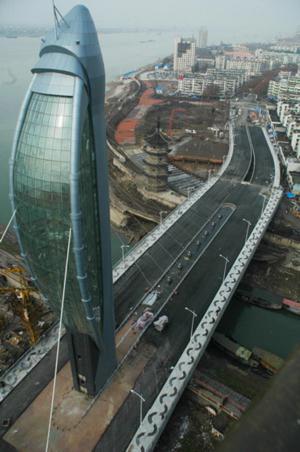 The main tower of the Linjiang Bridge
over the Qingyi River is finished in Wuhu, East China’s Anhui Province, December
23, 2007. The tower, with a distinct fish-like design, will be a new landmark
after the bridge opens to traffic and also provide an ideal overlook to the
city. The main tower of the Linjiang Bridge
over the Qingyi River is finished in Wuhu, East China’s Anhui Province, December
23, 2007. The tower, with a distinct fish-like design, will be a new landmark
after the bridge opens to traffic and also provide an ideal overlook to the
city.
 A staff member onboard China’s expedition ship Xue Long, or Snow Dragon, takes
pictures as the icebreaker makes its way through ice floe from Zhongshan Station
to the Great Wall Station for the country’s 24th scientific expedition to
Antarctica, Dec. 23, 2007.
A staff member onboard China’s expedition ship Xue Long, or Snow Dragon, takes
pictures as the icebreaker makes its way through ice floe from Zhongshan Station
to the Great Wall Station for the country’s 24th scientific expedition to
Antarctica, Dec. 23, 2007.
He Ning, Secretary of the Department
of American and Oceanian Affairs in the Ministry of Commerce, said in Beijing on
the 23rd that China-US trade reached 270 billion US dollars in the first 11
months of this year. The annual China-US trade volume is expected to exceed 300
billion US dollars, making China the third largest export destination by the end
of this year. He Ning confirmed this at the 2007 China Forum on Economic
Diplomacy at the China Foreign Affairs University. According to him, in recent
years China-US trade has become more interdependent; and the bilateral trade
volume increased from 2.5 billion US dollars in 1979 to 262.7 billion US dollars
in 2006. As of November 2007, China-US trade has reached an all-time record
high, breaking 270 billion US dollars: an increase of 15% compared with the same
period last year. By the end of this year, trade will exceed 300 billion US
dollars, making China the third largest exporter to the US. American investment
in China has also grown rapidly: by the end of November this year, the US set up
more than 54,000 enterprises and made over 56 billion US dollars in investments.
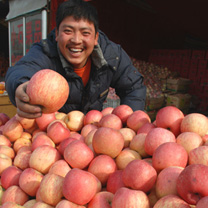 A Chinese farmer is
selling apples at the nation's largest fruits trading market in East China's
Shangong Province. China is now the world's top apple grower, accounting for
nearly half of the entire global harvest. A Chinese farmer is
selling apples at the nation's largest fruits trading market in East China's
Shangong Province. China is now the world's top apple grower, accounting for
nearly half of the entire global harvest.
China's Renminbi (RMB) climbed 54 basis points to break
the 7.33 mark on Tuesday, with the central parity rate at 7.3261 yuan against
one US dollar.
The Ministry of Science and Technology (MOST) said in
Beijing on Tuesday that China has 548 incubators, the second most in the world
next to the United States. They are considered powerful in breeding innovative
start-ups. On its website,
www.most.gov.cn, the ministry reported the incubators
had helped to raise 19,896 high technology companies, with 569 having annual
revenues of more than 100 million yuan (US$13.7 million). In addition, 53 were
listed on either domestic or overseas stock exchanges. China originally borrowed
the idea of incubators from the United States. They were expected to create
convenient and efficient environments for start-up companies, as well as in
providing financing, taxation and land-lease incentives. The country's first
incubator started in 1987 in Wuhan, capital of Central China's Hubei Province.
Such intermediate agencies, mostly funded by the government, were now spreading
throughout the country. They currently incubated 41,434 fledgling companies,
providing 460,000 jobs in high technologies, such as sophisticated home
electronic appliances or computer hardware and software. Companies selected into
the incubators were usually asked to become more independent and competitive in
three years. Unsuccessful companies in the risky hi-tech industry would be left
bankrupt. However, the ministry didn't mention the percentage of business
failures in those incubators. China has been trying to combine homegrown venture
capital funds and hi-tech business incubators in a drive to forge a
knowledge-driven and energy-efficient economy. The government and State-funded
policy banks were now active in setting up funds that aimed at financing smaller
venture capital funds. These were primarily for high-tech research and
development and seed funds that were provided to help a business develop an
idea, create the first product and market the product for the first time. In
August, the Ministry of Finance and the State Administration of Taxation adopted
more favorable financing and taxation terms for companies in incubators. The
government promised that 150 percent of research and development expenditure
could be deducted from the taxable income of companies in the following fiscal
year. Liang Gui, a senior MOST official, said his ministry planned to have 1,000
incubators by 2010, harboring more than 50,000 companies and helping create over
one million job opportunities.
Small and medium enterprises in China are bracing for a
tough new year as the government further tightens monetary policy to curb bank
loans and implement new labor laws to improve social welfare. But SMEs claim
both measures are pushing their businesses into severe hardship.
December 23 - 26, 2007
 Hong Kong:
The flag fall for taxi journeys in Hong Kong was set to go up by one HK dollar
after the endorsement of a proposal in support of the rise by the Special
Administrative Region (SAR) government's transport advisory committee Thursday.
Teresa Cheng, chairman of the committee, said the proposed fare increase was
reasonable, given the fact that "taxi drivers have been operating in difficult
conditions over the past decade," the local RTHK radio reported. Cheng said
members of the committee had assessed changes in the taxi industry's revenue and
operating costs and the impact of the proposed rise on passengers. Hong Kong:
The flag fall for taxi journeys in Hong Kong was set to go up by one HK dollar
after the endorsement of a proposal in support of the rise by the Special
Administrative Region (SAR) government's transport advisory committee Thursday.
Teresa Cheng, chairman of the committee, said the proposed fare increase was
reasonable, given the fact that "taxi drivers have been operating in difficult
conditions over the past decade," the local RTHK radio reported. Cheng said
members of the committee had assessed changes in the taxi industry's revenue and
operating costs and the impact of the proposed rise on passengers.
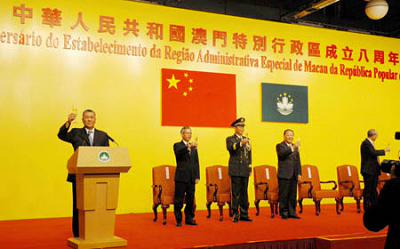 Special Administrative Region (MSAR) Chief Executive Edmund Ho Hau Wah (1st L)
proposes a toast with all the guests presented in Macao, China, Dec. 20, 2007.
Macao celebrated on Thursday the eighth anniversary of the region’s return to
the Chinese motherland.
Special Administrative Region (MSAR) Chief Executive Edmund Ho Hau Wah (1st L)
proposes a toast with all the guests presented in Macao, China, Dec. 20, 2007.
Macao celebrated on Thursday the eighth anniversary of the region’s return to
the Chinese motherland.
 This photo published on Wednesday, December 19, 2007 shows Joey Yung in a newly
shot TV commercial for the fast food restaurant chain McDonalds. She was invited
to shoot a new TV commercial for the venerable institution, reported the Hong
Kong-based publication Tungstar on Wednesday.
This photo published on Wednesday, December 19, 2007 shows Joey Yung in a newly
shot TV commercial for the fast food restaurant chain McDonalds. She was invited
to shoot a new TV commercial for the venerable institution, reported the Hong
Kong-based publication Tungstar on Wednesday.
 Tang Wei and Tony Leung Chiu Wai
in the film Lust, Caution (Se, jie). Tang Wei didn't know what it was that she
was auditioning for, or who was involved with the production. She had no idea
that 10,000 actresses, including many A-listers, were competing for the role. In
the little-known actress' first audition for the project, she read lines from a
fake script. For the second audition, the director showed up. It was Ang Lee.
Surprisingly, Lee poured a cup of tea for her, as if he had noticed her tension.
They then talked about Tang's family, her school and her stage experience. After
graduating from the Central Academy of Drama, China's best institute for theater
arts, Tang has spent most of her time on stage. She told Lee her favorite
director was Ingmar Bergman, but she had no idea he was also one of Lee's
favorites. When she mentioned that her mother was a Yueju opera singer, Lee
asked her to sing. As Lee later described it, that day they found something in
common - a love for theater and southern China. "Lee was like a senior family
member," Tang said in a phone interview. "He was a modest, good listener. I felt
very happy when I found the communication was so smooth, no obstacle at all."
When the call for the third audition came, Tang was told to wear a cheongsam. "I
had no cheongsam at all, actually I seldom wore dresses then," she said. After
hanging up the phone, she rushed to a tailor's shop. No one gave her any
feedback at the third audition. She had the fourth and fifth soon after with
makeup and full costume, which helped her get into the character, a
student-turned spy in the chaos of 1930s' Shanghai. After five auditions, Tang
was getting nervous. "I said to myself, 'you have tried your best, now it's time
to relax'." Another call led her to Hong Kong last summer. There, she found that
the crew had begun preparations for Lee's new project - the espionage thriller
Lust, Caution. "Everyone was busy," she recalled, "Material was piled
everywhere, but no one came up and told me that I was the leading actress." But
she suspected that was the case, as Lee had told her they were planning a
celebration. "Celebrating what? I asked myself, but I felt that something was
happening," she said. Even so, to stop the news from leaking to the press, the
crew had a simple dinner. "It was like, everyone has been busy preparing for the
film. I knew work had begun." To prepare for her role, Lee gave her a pile of
historic records and books to read, and she had to watch plenty of films about
1930s and '40s Shanghai. She threw herself into Greta Garbo's films and the
poems of Xu Zhimuo, one of the most famous Chinese poets of the 1920s.
Rehearsals included walking with a book on the head and tying her knees together
with a ribbon to emulate the elegant pose of Shanghai ladies. She also learned
southern opera, Cantonese, Shanghai dialect and English. The biggest torture for
the 28-year-old, however, was trying on different clothes. "I seldom shop. I
think shopping is exhausting. When I had to change clothes, they jokingly asked
me if I needed headache pills." Tang said that Lee once told her: "What you will
learn is more than 60 years of courses at the film academy." The newcomer had to
act alongside Asian superstars Tony Leung and Joan Chen and yet, of the 118 days
of shooting, 114 were focused on her. She slept three hours a day, sometimes
five to six. But despite these hardships, she said: "Even if it is the only role
I have in my life, I feel content." Tang Wei and Tony Leung Chiu Wai
in the film Lust, Caution (Se, jie). Tang Wei didn't know what it was that she
was auditioning for, or who was involved with the production. She had no idea
that 10,000 actresses, including many A-listers, were competing for the role. In
the little-known actress' first audition for the project, she read lines from a
fake script. For the second audition, the director showed up. It was Ang Lee.
Surprisingly, Lee poured a cup of tea for her, as if he had noticed her tension.
They then talked about Tang's family, her school and her stage experience. After
graduating from the Central Academy of Drama, China's best institute for theater
arts, Tang has spent most of her time on stage. She told Lee her favorite
director was Ingmar Bergman, but she had no idea he was also one of Lee's
favorites. When she mentioned that her mother was a Yueju opera singer, Lee
asked her to sing. As Lee later described it, that day they found something in
common - a love for theater and southern China. "Lee was like a senior family
member," Tang said in a phone interview. "He was a modest, good listener. I felt
very happy when I found the communication was so smooth, no obstacle at all."
When the call for the third audition came, Tang was told to wear a cheongsam. "I
had no cheongsam at all, actually I seldom wore dresses then," she said. After
hanging up the phone, she rushed to a tailor's shop. No one gave her any
feedback at the third audition. She had the fourth and fifth soon after with
makeup and full costume, which helped her get into the character, a
student-turned spy in the chaos of 1930s' Shanghai. After five auditions, Tang
was getting nervous. "I said to myself, 'you have tried your best, now it's time
to relax'." Another call led her to Hong Kong last summer. There, she found that
the crew had begun preparations for Lee's new project - the espionage thriller
Lust, Caution. "Everyone was busy," she recalled, "Material was piled
everywhere, but no one came up and told me that I was the leading actress." But
she suspected that was the case, as Lee had told her they were planning a
celebration. "Celebrating what? I asked myself, but I felt that something was
happening," she said. Even so, to stop the news from leaking to the press, the
crew had a simple dinner. "It was like, everyone has been busy preparing for the
film. I knew work had begun." To prepare for her role, Lee gave her a pile of
historic records and books to read, and she had to watch plenty of films about
1930s and '40s Shanghai. She threw herself into Greta Garbo's films and the
poems of Xu Zhimuo, one of the most famous Chinese poets of the 1920s.
Rehearsals included walking with a book on the head and tying her knees together
with a ribbon to emulate the elegant pose of Shanghai ladies. She also learned
southern opera, Cantonese, Shanghai dialect and English. The biggest torture for
the 28-year-old, however, was trying on different clothes. "I seldom shop. I
think shopping is exhausting. When I had to change clothes, they jokingly asked
me if I needed headache pills." Tang said that Lee once told her: "What you will
learn is more than 60 years of courses at the film academy." The newcomer had to
act alongside Asian superstars Tony Leung and Joan Chen and yet, of the 118 days
of shooting, 114 were focused on her. She slept three hours a day, sometimes
five to six. But despite these hardships, she said: "Even if it is the only role
I have in my life, I feel content."
Sun Hung Kai Properties (0016) and
New World Development (0017) yesterday fired back at critics who accused them of
standing to reap at least HK$5 billion profit from selling units at their
controversial joint-venture Harbour Place residential project they had purchased
from the government at a bargain price.
China COSCO (1919), soon to become
the world's largest dry-bulk shipping carrier, revised its yearly profit
forecast yesterday to beat market expectations, sending the share price even
higher.
A HK$300 million facelift aimed at
revitalizing Wan Chai was unveiled yesterday, saving the 70-year-old Wan Chai
market and redesigning the former Wedding Card Street into a "Wedding City."
 China:
China will raise the one-year deposit interest rate by 27 basis points to 4.14
percent and the lending rate by 18 basis points to 7.47 percent as of Dec. 21,
the central bank said Thursday.
China:
China will raise the one-year deposit interest rate by 27 basis points to 4.14
percent and the lending rate by 18 basis points to 7.47 percent as of Dec. 21,
the central bank said Thursday.
 More than 50 varieties of new
Olympic licensed products are to go on sale, with half of them priced at around
100 yuan each, according a New Year promotional activity by the Beijing
Organizing Committee for the Games of the XXIX Olympiad (BOCOG) in Beijing on
Wednesday. Most of the products are affordable Olympic badges. Among the
higher-end articles, gold badges and "Yubi" jade products will attract buyers
because of their combination of Olympic elements with gold and Hetian jade to
highlight Chinese traditional characteristics. More than 50 varieties of new
Olympic licensed products are to go on sale, with half of them priced at around
100 yuan each, according a New Year promotional activity by the Beijing
Organizing Committee for the Games of the XXIX Olympiad (BOCOG) in Beijing on
Wednesday. Most of the products are affordable Olympic badges. Among the
higher-end articles, gold badges and "Yubi" jade products will attract buyers
because of their combination of Olympic elements with gold and Hetian jade to
highlight Chinese traditional characteristics.
A Confucius institute was
inaugurated in the Italian port city of Naples Thursday, which is the second of
its kind in the nation. At the inauguration ceremony, Chinese Ambassador to
Italy Dong Jinyi said the Confucius Institute serves as a bridge to enhance
friendship and understanding between the Chinese people and peoples in other
countries and is aimed at promoting Chinese language and culture. The founding
of the Confucius Institute helps the world know more about China and makes China
integrate deeper with the rest of the world, he added. The Chinese ambassador
said that in the recent years, China and Italy have made fruitful achievements
in the field of culture and education. The number of Chinese students studying
in Italy has increased to more than 3,000 in two years, while the Italian people
also enjoy surging enthusiasm for Chinese language. Italy's first Confucius
institute was established at the University of Rome "La Sapienza" in September
2006. The Chinese government started to set up non-profit Confucius institutes
overseas since 2004. So far, a total of 210 Confucius institutes have been
established in 64 countries and regions.
 A girl from the Netherlands poses for
photos with two big Mickey Mice made in China, at the World of Disney in New
York, the United States, Dec. 18, 2007. China-made products are seen everywhere
in the brand stores like Macy's and the World of Disney in New York. Chinese
toys still well received by U.S. customers. The day after Thanksgiving, dubbed
Black Friday because it traditionally marks the day when retailers finally move
out of the red and into the black, shoppers rushed in their hordes into stores
such as Toys "R" Us to grab gifts for their children this Christmas. A girl from the Netherlands poses for
photos with two big Mickey Mice made in China, at the World of Disney in New
York, the United States, Dec. 18, 2007. China-made products are seen everywhere
in the brand stores like Macy's and the World of Disney in New York. Chinese
toys still well received by U.S. customers. The day after Thanksgiving, dubbed
Black Friday because it traditionally marks the day when retailers finally move
out of the red and into the black, shoppers rushed in their hordes into stores
such as Toys "R" Us to grab gifts for their children this Christmas.
 This undated file photo shows an artist's
impression of the glasshouse on the beach of Yangjiang, South China's Guangdong
Province, where a sunken ship will be displayed. The largest Chinese wreck, from
the Song Dynasty will be hauled from its watery grave on Saturday. This undated file photo shows an artist's
impression of the glasshouse on the beach of Yangjiang, South China's Guangdong
Province, where a sunken ship will be displayed. The largest Chinese wreck, from
the Song Dynasty will be hauled from its watery grave on Saturday.
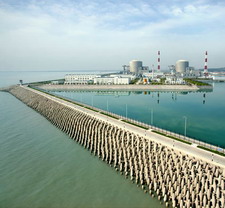 A general view
of the Tianwan nuclear power station in Lianyungang, Jiangsu Province. China
plans to build eight nuclear reactors with a combined capacity of 8,000
megawatts at the station. A general view
of the Tianwan nuclear power station in Lianyungang, Jiangsu Province. China
plans to build eight nuclear reactors with a combined capacity of 8,000
megawatts at the station.
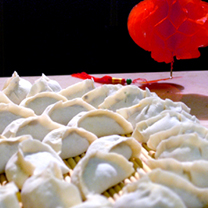 The
traditional Chinese festival Dongzhi, or midwinter in English, falls on this
Saturday. Chinese people normally eat dumplings to mark this occasion. The
reason why they eat dumplings is to protect their ears from getting frostbitten.
In ancient China dumplings once contained medicine countering frostbites. The
tradition is carried down until today. So let's go and eat dumplings on Dongzhi
in China. The
traditional Chinese festival Dongzhi, or midwinter in English, falls on this
Saturday. Chinese people normally eat dumplings to mark this occasion. The
reason why they eat dumplings is to protect their ears from getting frostbitten.
In ancient China dumplings once contained medicine countering frostbites. The
tradition is carried down until today. So let's go and eat dumplings on Dongzhi
in China.
 Lounge 18 is an
open yet oddly disjointed upscale lounge in the only place for an upscale
lounge–the Bund. A whimsical mix of furniture styles from comfortable lounge
chairs and caged candles to a digitized reproduction of Vermeer's "Girl with a
Pearl Earring" leads you to wonder if the venue was decorated by committee.
Although most of the basic drinks are covered, there are some holes in the drink
menu (like having only one single malt scotch). If you want wine, you can either
drink a first growth Bordeaux for thousands of renminbi or Jacob's Creek for a
few hundred. In all fairness though, they're still building up their inventory.
The specialty cocktail list offered one intriguing selection: the Ylang-Ylang(¥68),
a mix of gin, fresh mint, vanilla and fruit juices. Quite tasty, but why garnish
the rim of the glass with black pepper? Black pepper aside, the wait staff were
attentive and all smiles which was a welcome change from the pretension that so
abounds in bars on the Bund. Lounge 18 is an
open yet oddly disjointed upscale lounge in the only place for an upscale
lounge–the Bund. A whimsical mix of furniture styles from comfortable lounge
chairs and caged candles to a digitized reproduction of Vermeer's "Girl with a
Pearl Earring" leads you to wonder if the venue was decorated by committee.
Although most of the basic drinks are covered, there are some holes in the drink
menu (like having only one single malt scotch). If you want wine, you can either
drink a first growth Bordeaux for thousands of renminbi or Jacob's Creek for a
few hundred. In all fairness though, they're still building up their inventory.
The specialty cocktail list offered one intriguing selection: the Ylang-Ylang(¥68),
a mix of gin, fresh mint, vanilla and fruit juices. Quite tasty, but why garnish
the rim of the glass with black pepper? Black pepper aside, the wait staff were
attentive and all smiles which was a welcome change from the pretension that so
abounds in bars on the Bund.
December 22, 2007
 Hong Kong:
More than 200 film-makers, show-biz stars and artistes voiced their support and
blessings to the Beijing 2008 Olympic Games at a reception here Monday night,
vowing to play a role in promoting the Beijing Olympics. The "Welcoming Olympic
Christmas Reception" was hosted by the Hong Kong Film Development Council and
officiated by Hong Kong Special Administrative Region (HKSAR) Chief Executive
Donald Tsang and President of the Sports Federation and Olympic Committee of
Hong Kong, China, Timothy Fok. Chairman of the Film Development Council Jack So
said that although unrelated at first glance, the Olympic Games and the film
industry shared common ground - they are both cradles for talent. "Film stars
and sports elite both have the determination to strive for excellence and
record-breaking success," So said, adding "the exciting Olympic Games and
blockbusters of Hong Kong have always been able to attract and inspire big
audiences." Fok thanked the film industry for taking the lead to support the
Beijing Olympic Games. "I hope that with concerted efforts, the film industry
will be able to drum up public support for the Beijing 2008 Olympic Games and
the equestrian event to be held in Hong Kong, and that the whole territory will
share the joyous, enthusiastic atmosphere," Fok said. Chairman of the Hong Kong
Chamber of Films Peter Lam said the chamber would help the Film Development
Council shoot a series of Olympic Games promotional videos, which would be shown
in member theaters of the Hong Kong Theaters Association. Eric Tsang, Chairman
of the Hong Kong Performing Artistes Guild, also pledged to offer unswerving
support in the promotion of the Olympic Games. The Film Development Council was
established in April this year to advise the HKSAR government on the policy and
strategy for the short and long-term development and steady growth of the local
film industry. Hong Kong:
More than 200 film-makers, show-biz stars and artistes voiced their support and
blessings to the Beijing 2008 Olympic Games at a reception here Monday night,
vowing to play a role in promoting the Beijing Olympics. The "Welcoming Olympic
Christmas Reception" was hosted by the Hong Kong Film Development Council and
officiated by Hong Kong Special Administrative Region (HKSAR) Chief Executive
Donald Tsang and President of the Sports Federation and Olympic Committee of
Hong Kong, China, Timothy Fok. Chairman of the Film Development Council Jack So
said that although unrelated at first glance, the Olympic Games and the film
industry shared common ground - they are both cradles for talent. "Film stars
and sports elite both have the determination to strive for excellence and
record-breaking success," So said, adding "the exciting Olympic Games and
blockbusters of Hong Kong have always been able to attract and inspire big
audiences." Fok thanked the film industry for taking the lead to support the
Beijing Olympic Games. "I hope that with concerted efforts, the film industry
will be able to drum up public support for the Beijing 2008 Olympic Games and
the equestrian event to be held in Hong Kong, and that the whole territory will
share the joyous, enthusiastic atmosphere," Fok said. Chairman of the Hong Kong
Chamber of Films Peter Lam said the chamber would help the Film Development
Council shoot a series of Olympic Games promotional videos, which would be shown
in member theaters of the Hong Kong Theaters Association. Eric Tsang, Chairman
of the Hong Kong Performing Artistes Guild, also pledged to offer unswerving
support in the promotion of the Olympic Games. The Film Development Council was
established in April this year to advise the HKSAR government on the policy and
strategy for the short and long-term development and steady growth of the local
film industry.
 Hong Kong singer
Eason Chan was the biggest winner on Sunday night at the Mandarin
Music-On-Demand (MOD) Best 10 Awards ceremony held by Hong Kong's TVB station.
Chan's song "Tao Tai" (Elimination) won Best Producing, Best Songwriting and was
one of the Best 10 Golden Melodies. Another of his hits, "Under Mount Fuji," was
named the Globally-Loved Cantonese Song. Chan himself was also voted as the Most
Popular Male Singer. Taiwan singer Angela Zhang was the Most Popular Female
Singer. As one of Hong Kong's most important occasions music-wise, the awards
also honored new artistes from the mainland, including Zhang Liangying and Shang
Wenjie, both of who rose to fame from the Super Girl singing competition. Zhang
Liangying's "Damned Love" was among the Golden Melodies, while Shang Wenjie was
named Best Newcomer. There to share the 32 awards were also Wilber Pan, Twins,
Joey Yung and Gary Cao. Hong Kong singer
Eason Chan was the biggest winner on Sunday night at the Mandarin
Music-On-Demand (MOD) Best 10 Awards ceremony held by Hong Kong's TVB station.
Chan's song "Tao Tai" (Elimination) won Best Producing, Best Songwriting and was
one of the Best 10 Golden Melodies. Another of his hits, "Under Mount Fuji," was
named the Globally-Loved Cantonese Song. Chan himself was also voted as the Most
Popular Male Singer. Taiwan singer Angela Zhang was the Most Popular Female
Singer. As one of Hong Kong's most important occasions music-wise, the awards
also honored new artistes from the mainland, including Zhang Liangying and Shang
Wenjie, both of who rose to fame from the Super Girl singing competition. Zhang
Liangying's "Damned Love" was among the Golden Melodies, while Shang Wenjie was
named Best Newcomer. There to share the 32 awards were also Wilber Pan, Twins,
Joey Yung and Gary Cao.
The government has taken an unprecedented step in warning
of turmoil in financial markets due to the US subprime mortgage meltdown. "The
US credit market is in a very critical situation; liquidity of many corporations
are under pressure. Some companies even have to face capital inadequacy,"
government economist Kwok Kwok-chuen warned yesterday. He said US and European
authorities were greatly concerned about the situation, and were aware of the
problems that could lie ahead. So far Asian and emerging market economies had
not been severely affected. The government official's comments were echoed
elsewhere in Hong Kong's finance sector. Bank of East Asia (0023) chief
economist Paul Tang Sai-on said share prices in the US could plunge when the
negative news of the subprime mortgage crisis was fully discounted. "The US
market is too optimistic. US stock trading prices are still relatively high,
leaving ample room for shares to fall," he said. Standard Chartered Bank
economist Kelvin Lau Kin-heng warned the subprime problem could spark a
recession. "Although the subprime crisis was not initiated in Asia, Hong Kong
will still be affected as it cannot decouple from the US and global economy," he
said. Last Wednesday, the US Federal Reserve cut its benchmark interest rate by
0.25 percent to 4.25 percent. A day later the Fed, along with central banks in
Europe, including Britain and Switzerland, and Canada injected US$80 billion
(HK$623.7 billion) into the market to ease the global credit crunch. Hong Kong
Baptist University finance professor Billy Mak Sui-choi said the true picture
will emerge in January. "When [Hong Kong-listed] companies announce their
year-end results it might be the worst time for the subprime problem as the
issue will become more transparent," he said.
 Mickey Mouse and his
friends appear to have lost their charm as the number of visitors to the Hong
Kong Disneyland theme park dropped 23 percent in its second year of operation.
According to a paper to be discussed by the Legislative Council's economic
development panel on Friday, the park recorded just over four million visitors
from October 2006 to September 2007, compared to 5.2 million in the first year
after its launch on September 12, 2005. Hong Kong Disneyland is one of Hong
Kong's key attractions and was designed to revive the tourist industry which
went into a slump following the 2003 SARS outbreak. On a brighter note, while
overall attendance was down, the paper said the number of overnight family
visitors was up 15.8 percent from 2005 and the number of visitors under the age
of 16 had increased by 23.5 percent. According to the paper, issued by the
Tourism Commission and the Commerce and Economic Development Bureau, the drop in
attendance was mainly due to a lack of interest by Hongkongers. Locals accounted
for just 31 percent of the total number of visitors in 2006/07, compared with 42
percent in 2005/06. Conversely the percentage of mainland visitors rose from 34
percent in 2005/06 to 39 percent in 2006/07. Overall, the paper said that up to
December this year the park had received more than 10 million visitors since
opening in 2005, placing it among the top 20 theme parks in the world. A survey
carried out by theme park operator Hong Kong International Theme Parks Limited,
of which the government and the Walt Disney Company are joint shareholders,
showed 90 percent of visitors rated their experience at Hong Kong Disneyland as
positive and 92 percent said they would like to revisit the park again, compared
with an 85 percent rating in the opening year. On November 10, the Walt Disney
Company admitted for the first time that the poor performance of Hong Kong
Disneyland was dragging down its results, prompting calls from the SAR
government for the park's management to improve its operations. Hong Kong
Disneyland's worsening performance has left the park unable to meet performance
promises to its lenders and the American entertainment giant has asked creditors
to temporarily remove the covenants on its US$294 million (HK$2.29 billion)
revolving- credit facility. Following conversations with the government, Disney
has also agreed to give up its royalties for "a couple of years," according to
reports. Mickey Mouse and his
friends appear to have lost their charm as the number of visitors to the Hong
Kong Disneyland theme park dropped 23 percent in its second year of operation.
According to a paper to be discussed by the Legislative Council's economic
development panel on Friday, the park recorded just over four million visitors
from October 2006 to September 2007, compared to 5.2 million in the first year
after its launch on September 12, 2005. Hong Kong Disneyland is one of Hong
Kong's key attractions and was designed to revive the tourist industry which
went into a slump following the 2003 SARS outbreak. On a brighter note, while
overall attendance was down, the paper said the number of overnight family
visitors was up 15.8 percent from 2005 and the number of visitors under the age
of 16 had increased by 23.5 percent. According to the paper, issued by the
Tourism Commission and the Commerce and Economic Development Bureau, the drop in
attendance was mainly due to a lack of interest by Hongkongers. Locals accounted
for just 31 percent of the total number of visitors in 2006/07, compared with 42
percent in 2005/06. Conversely the percentage of mainland visitors rose from 34
percent in 2005/06 to 39 percent in 2006/07. Overall, the paper said that up to
December this year the park had received more than 10 million visitors since
opening in 2005, placing it among the top 20 theme parks in the world. A survey
carried out by theme park operator Hong Kong International Theme Parks Limited,
of which the government and the Walt Disney Company are joint shareholders,
showed 90 percent of visitors rated their experience at Hong Kong Disneyland as
positive and 92 percent said they would like to revisit the park again, compared
with an 85 percent rating in the opening year. On November 10, the Walt Disney
Company admitted for the first time that the poor performance of Hong Kong
Disneyland was dragging down its results, prompting calls from the SAR
government for the park's management to improve its operations. Hong Kong
Disneyland's worsening performance has left the park unable to meet performance
promises to its lenders and the American entertainment giant has asked creditors
to temporarily remove the covenants on its US$294 million (HK$2.29 billion)
revolving- credit facility. Following conversations with the government, Disney
has also agreed to give up its royalties for "a couple of years," according to
reports.
Cathay Pacific Airways has backed
down on its decision requiring staff to pay for doctor visits under a new
medical plan, saying each employee can make 10 free visits in the first year.
 The MGM Grand Macau opens its
doors on Tuesday, Dec 18th, becoming the latest Las Vegas-backed casino to crowd
into the tiny Chinese gambling enclave hoping to lure China’s growing middle
class. The US$1.25 billion (HK$9.75 billion) MGM Grand is a joint venture
between Las Vegas casino operator MGM Mirage and Pansy Ho Chiu-king, the
daughter of Macau’s former casino kingpin, Stanley Ho Hung-sun. It will vie for
high rollers with dozens of casinos already stationed in Macau, the only place
in China were gambling is legal and which last year raked in more gaming revenue
than the Las Vegas Strip. Mr Ho ran the casino business in Macau for 40 years
until 2001 — two years after the then-Portuguese colony returned to Chinese rule
— when the government broke up his monopoly and handed out gaming concessions to
foreign interests. American Sheldon Adelson was the first to enter the
territory, opening the Sands Macau in 2004, and then this August the US$2.4
billion (HK$18.7 billion) Venetian, a Las Vegas style mega casino-resort
complete with Italian gondolas punting down indoor canals. Ms Ho said the
600-room MGM Grand will target the wealthiest gamblers, called “VIP customers”
in the business, who are interested in top-end shopping and entertainment as
well as gambling. She dismissed concerns that the casino was squeezing into a
corner of Macau’s main island that was already packed with luxury gambling
resorts, including some run by her family. “These few casinos will actually work
in conjunction to present a really formidable proposition to all VIP customers
that this should be the centre of the high-rolling gaming experience,” she said
in Macau last week during a preview tour of the hotel. The 35-storey MGM Grand
boasts a huge atrium with a glass ceiling that’s 6.5 meters high and is modelled
on the central train station in Lisbon, a nod to the territory’s Portuguese
heritage. Abstract hand-blown glass sculptures by US artist Dale Chihuly are
scattered around the plush lobby. The hotel offers 400 gambling tables, 800 slot
machines and 16 private gaming rooms, comparable to its closest rivals, US
tycoon Steve Wynn’s casino and the Crown Macau. Both the US$1.1 billion (HK$8.78
million) Wynn and the Crown Macau, a joint venture between Australia’s
Publishing & Broadcasting and Hong Kong-based Melco International Development (SEHK:
0200, announcements, news), run by Pansy’s brother, Lawrence Ho Yau-lung, have
positioned themselves as high-end casinos. The Grand is MGM’s first entry into
Asia. While the jury is still out on whether Asian gamblers respond to the same
type of non-casino entertainment as those in Las Vegas, it was expected to be a
successful launch, said Jonathan Galaviz, a partner at Globalysis, a Las
Vegas-based consultancy. “MGM Mirage has an excellent Asian consumer base that
patronizes their integrated resorts in Las Vegas, their new Macau property
should benefit from these pre-existing customer relationships,” he said.
However, analysts warned that Macau was reaching “opening fatigue.” “We’re not
seeing the big jump in gaming revenues with every new opening that we saw with
the early casinos,” Rob Hart, an analyst with Hong Kong-based Morgan Stanley
said. However, with 100 million people just next door in China’s wealthiest
region of Guangdong, and with average salaries of one billion people in the land
on the increase, Mr Hart said there was still huge growth potential for Macau’s
gaming industry. The MGM Grand Macau opens its
doors on Tuesday, Dec 18th, becoming the latest Las Vegas-backed casino to crowd
into the tiny Chinese gambling enclave hoping to lure China’s growing middle
class. The US$1.25 billion (HK$9.75 billion) MGM Grand is a joint venture
between Las Vegas casino operator MGM Mirage and Pansy Ho Chiu-king, the
daughter of Macau’s former casino kingpin, Stanley Ho Hung-sun. It will vie for
high rollers with dozens of casinos already stationed in Macau, the only place
in China were gambling is legal and which last year raked in more gaming revenue
than the Las Vegas Strip. Mr Ho ran the casino business in Macau for 40 years
until 2001 — two years after the then-Portuguese colony returned to Chinese rule
— when the government broke up his monopoly and handed out gaming concessions to
foreign interests. American Sheldon Adelson was the first to enter the
territory, opening the Sands Macau in 2004, and then this August the US$2.4
billion (HK$18.7 billion) Venetian, a Las Vegas style mega casino-resort
complete with Italian gondolas punting down indoor canals. Ms Ho said the
600-room MGM Grand will target the wealthiest gamblers, called “VIP customers”
in the business, who are interested in top-end shopping and entertainment as
well as gambling. She dismissed concerns that the casino was squeezing into a
corner of Macau’s main island that was already packed with luxury gambling
resorts, including some run by her family. “These few casinos will actually work
in conjunction to present a really formidable proposition to all VIP customers
that this should be the centre of the high-rolling gaming experience,” she said
in Macau last week during a preview tour of the hotel. The 35-storey MGM Grand
boasts a huge atrium with a glass ceiling that’s 6.5 meters high and is modelled
on the central train station in Lisbon, a nod to the territory’s Portuguese
heritage. Abstract hand-blown glass sculptures by US artist Dale Chihuly are
scattered around the plush lobby. The hotel offers 400 gambling tables, 800 slot
machines and 16 private gaming rooms, comparable to its closest rivals, US
tycoon Steve Wynn’s casino and the Crown Macau. Both the US$1.1 billion (HK$8.78
million) Wynn and the Crown Macau, a joint venture between Australia’s
Publishing & Broadcasting and Hong Kong-based Melco International Development (SEHK:
0200, announcements, news), run by Pansy’s brother, Lawrence Ho Yau-lung, have
positioned themselves as high-end casinos. The Grand is MGM’s first entry into
Asia. While the jury is still out on whether Asian gamblers respond to the same
type of non-casino entertainment as those in Las Vegas, it was expected to be a
successful launch, said Jonathan Galaviz, a partner at Globalysis, a Las
Vegas-based consultancy. “MGM Mirage has an excellent Asian consumer base that
patronizes their integrated resorts in Las Vegas, their new Macau property
should benefit from these pre-existing customer relationships,” he said.
However, analysts warned that Macau was reaching “opening fatigue.” “We’re not
seeing the big jump in gaming revenues with every new opening that we saw with
the early casinos,” Rob Hart, an analyst with Hong Kong-based Morgan Stanley
said. However, with 100 million people just next door in China’s wealthiest
region of Guangdong, and with average salaries of one billion people in the land
on the increase, Mr Hart said there was still huge growth potential for Macau’s
gaming industry.
 The suspended Ngong Ping 360 cable-car
attraction on Lantau Island would be re-opened on New Year’s Eve. The suspended Ngong Ping 360 cable-car
attraction on Lantau Island would be re-opened on New Year’s Eve.
Senior government officials such as the Commerce Secretary, Frederick Ma
Si-hang, are scheduled to take a trial ride this Saturday, according to local
media. Last Thursday, government lawyers officially filed charges against its
former operator, Skyrail ITM as it had allegedly failed to provide proper
training to its employees. One of the company’s directors William Calderwood
would also be prosecuted on similar charges. The cable-car ride was suspended
following an incident on June 11, after an empty cabin fell to the ground during
brake tests. A former employee Li Kit-loi is currently facing charges of
criminal negligence over the crash. Mr Li was charged with negligently
performing a brake test, failing to consult the manufacturers beforehand, and
neglecting to supervise his assistant during the test – three criminal offences.
The cableway’s current managing director Morris Cheung Siu-wa initially said
plans for the ride to open by year-end were on schedule but had later said more
time was needed as a substantial amount of paperwork and repairs had to be
completed. Secretary for Commerce and Economic Development Frederick Ma Si-hang
welcomed the re-opening of the cable car.
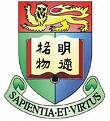 Hong Kong scientists have for the
first time identified cancer stem cells responsible for spreading colorectal
cancer, a discovery that could bring better-targeted treatment of the city's
second deadliest malignancy. The University of Hong Kong team of molecular
biologists was able to show that if the two stem cells were injected into
specially bred mice, the colorectal cancer spread to the liver. The team is also
the second in the world to show evidence that specific stem cells trigger the
growth of colorectal cancer. Stem cells can grow into any organ but some
researchers believe that rogue stem cells could be seeding some, if not all,
cancers. These cancer stem cells are now the focus of intense global research as
some patients do not respond well to chemotherapy or if the cancer returns in a
more aggressive form. "[Colorectal cancer] is one of those cancers with a
well-established treatment regimen but it remains the second cause of cancer
death in Hong Kong, suggesting that the current therapies are not adequate to
cure the disease," said Roberta Pang Wen-chi, research assistant professor at
the university's department of medicine, who is lead investigator. Dr Pang said
her team and scientists at the Ontario Cancer Institute at Princess Margaret
Hospital in Toronto might have been studying the same stem cell protein - CD133
- at the same time last year, but it was the Canadian team that published the
breakthrough first in the journal Nature. The Hong Kong study would be submitted
to an international journal by the end of the month. "We started to look for
other markers or proteins on the surface of stem cells," she said. "The novelty
of our research is the metastatic part." Metastasis is the process by which
cancer spreads from where it first arose to other locations in the body. The
Hong Kong team extracted cancer tissues from 30 patients and isolated the cancer
stem cells, which were implanted into the colons of about 120 immune-deficient
mice. For the growth of primary colorectal cancer, the team identified two
proteins, CD133 and CD44. The team also found CD133 and CD26 initiated the
spread of colorectal cancer to the liver. CD133 has also been implicated in the
growth of cancers of the brain and breast. "We showed that they not only grow
but they can actually metastasise to the liver. This is the first time it has
been shown in animal models. Usually in animal models it is not easy to show
metastasis with these stem cells," Dr Pang said. "We believe these stem cells
have the ability to self-renew, so we believe these cells are responsible for
tumour maintenance and metastasising. They are more resistant to chemotherapy,"
she said. The next step would be to look for colorectal patients who were
resistant to chemotherapy and see whether "they have high expressions of these
cancer stem cells". Hong Kong scientists have for the
first time identified cancer stem cells responsible for spreading colorectal
cancer, a discovery that could bring better-targeted treatment of the city's
second deadliest malignancy. The University of Hong Kong team of molecular
biologists was able to show that if the two stem cells were injected into
specially bred mice, the colorectal cancer spread to the liver. The team is also
the second in the world to show evidence that specific stem cells trigger the
growth of colorectal cancer. Stem cells can grow into any organ but some
researchers believe that rogue stem cells could be seeding some, if not all,
cancers. These cancer stem cells are now the focus of intense global research as
some patients do not respond well to chemotherapy or if the cancer returns in a
more aggressive form. "[Colorectal cancer] is one of those cancers with a
well-established treatment regimen but it remains the second cause of cancer
death in Hong Kong, suggesting that the current therapies are not adequate to
cure the disease," said Roberta Pang Wen-chi, research assistant professor at
the university's department of medicine, who is lead investigator. Dr Pang said
her team and scientists at the Ontario Cancer Institute at Princess Margaret
Hospital in Toronto might have been studying the same stem cell protein - CD133
- at the same time last year, but it was the Canadian team that published the
breakthrough first in the journal Nature. The Hong Kong study would be submitted
to an international journal by the end of the month. "We started to look for
other markers or proteins on the surface of stem cells," she said. "The novelty
of our research is the metastatic part." Metastasis is the process by which
cancer spreads from where it first arose to other locations in the body. The
Hong Kong team extracted cancer tissues from 30 patients and isolated the cancer
stem cells, which were implanted into the colons of about 120 immune-deficient
mice. For the growth of primary colorectal cancer, the team identified two
proteins, CD133 and CD44. The team also found CD133 and CD26 initiated the
spread of colorectal cancer to the liver. CD133 has also been implicated in the
growth of cancers of the brain and breast. "We showed that they not only grow
but they can actually metastasise to the liver. This is the first time it has
been shown in animal models. Usually in animal models it is not easy to show
metastasis with these stem cells," Dr Pang said. "We believe these stem cells
have the ability to self-renew, so we believe these cells are responsible for
tumour maintenance and metastasising. They are more resistant to chemotherapy,"
she said. The next step would be to look for colorectal patients who were
resistant to chemotherapy and see whether "they have high expressions of these
cancer stem cells".
Hong Kong’s unemployment rate was
at 3.6 per cent in the September to November period – the lowest level in almost
10 years.
 China:
The authorities in the capital of Guangdong Province introduced a new regulation
on Friday to prevent employers from retrenching large numbers of workers before
the end of the year. Between now and December 31, any company that intends to
dismiss more than 20 workers or reduce its staff by more than 10 percent must
apply to the labor department for permission, the Guangzhou labor and social
security bureau told China Daily yesterday. The regulation is designed to better
manage large-scale cutbacks and ease the implementation of the new Labor
Contract Law, the bureau's vice-director Chen Jianlong said. The regulation
recognizes that most employment contracts expire by the year-end, he said.
"Dismissing more than 20 employees or cutting staff by more than 10 percent in
the name of contract expiration violates the regulation," Chen said. The new
rule applies to all enterprises under the municipal government, private firms,
government departments, public institutions and social associations, he said.
Exemptions are possible for companies facing bankruptcy or deemed to be
undergoing reorganization by the courts. Those defined as "ailing enterprises"
by the government are also eligible for exemption. The labor and social security
bureau will adopt strict measures to prevent ineligible companies from firing
large numbers of workers, he said. Those that violate the regulations will be
unable to suspend coverage of dismissed workers' insurance.
China:
The authorities in the capital of Guangdong Province introduced a new regulation
on Friday to prevent employers from retrenching large numbers of workers before
the end of the year. Between now and December 31, any company that intends to
dismiss more than 20 workers or reduce its staff by more than 10 percent must
apply to the labor department for permission, the Guangzhou labor and social
security bureau told China Daily yesterday. The regulation is designed to better
manage large-scale cutbacks and ease the implementation of the new Labor
Contract Law, the bureau's vice-director Chen Jianlong said. The regulation
recognizes that most employment contracts expire by the year-end, he said.
"Dismissing more than 20 employees or cutting staff by more than 10 percent in
the name of contract expiration violates the regulation," Chen said. The new
rule applies to all enterprises under the municipal government, private firms,
government departments, public institutions and social associations, he said.
Exemptions are possible for companies facing bankruptcy or deemed to be
undergoing reorganization by the courts. Those defined as "ailing enterprises"
by the government are also eligible for exemption. The labor and social security
bureau will adopt strict measures to prevent ineligible companies from firing
large numbers of workers, he said. Those that violate the regulations will be
unable to suspend coverage of dismissed workers' insurance.


 Three architectures in Beijing are on the list of 10 best
architectural marvels (new and upcoming) selected by the Time magazine to be
published on the Dec. 24., they are Olympic Stadium, CCTV Headquarters and
Linked Hybrid (click on the small photo for full view).
Three architectures in Beijing are on the list of 10 best
architectural marvels (new and upcoming) selected by the Time magazine to be
published on the Dec. 24., they are Olympic Stadium, CCTV Headquarters and
Linked Hybrid (click on the small photo for full view).
China announced on Tuesday the setting up of a national
oil reserve center, the top economic planning agency confirmed. China said on
Monday it will scrap export rebates for 84 agricultural products as of Thursday
in effort to discourage exports of farm produce in a nation where food prices
drove inflation to an 11-year high in November.
  Malaysia's low-cost airlines AirAsia said here on Tuesday that it would offer
daily direct flights to Guangzhou, China, beginning Jan. 16 next year. The
budget airlines hoped that it could attract young people from China's Pearl
River Delta region to visit Malaysia with its amazing low fares, according to
the airlines. This would be the fourth destination opened by AirAsia to China
after Shenzhen Xiamen and Macao, it said. AirAsia is offering promotional fares
on its website on Dec. 19-26 for travels from Jan. 16 to Oct. 25 next year.
Malaysia's low-cost airlines AirAsia said here on Tuesday that it would offer
daily direct flights to Guangzhou, China, beginning Jan. 16 next year. The
budget airlines hoped that it could attract young people from China's Pearl
River Delta region to visit Malaysia with its amazing low fares, according to
the airlines. This would be the fourth destination opened by AirAsia to China
after Shenzhen Xiamen and Macao, it said. AirAsia is offering promotional fares
on its website on Dec. 19-26 for travels from Jan. 16 to Oct. 25 next year.
 As a goodwill ambassador, Taiwan supermodel Lin Chih-ling promoted tourism in
Taiwan last Sunday. She said she was currently busy with the shooting of John
Woo's big production "War of Red Cliff" or Chi Bi. But she also revealed that if
time allowed she hoped to travel aboard with her boy friend.
As a goodwill ambassador, Taiwan supermodel Lin Chih-ling promoted tourism in
Taiwan last Sunday. She said she was currently busy with the shooting of John
Woo's big production "War of Red Cliff" or Chi Bi. But she also revealed that if
time allowed she hoped to travel aboard with her boy friend.
 The mascot for the 2010 Shanghai World Expo, "Haibao,"
which literally means "treasure of the world", is unveiled during a ceremony at
the Shanghai Grand Stage in Shanghai December 18, 2007.
The mascot for the 2010 Shanghai World Expo, "Haibao,"
which literally means "treasure of the world", is unveiled during a ceremony at
the Shanghai Grand Stage in Shanghai December 18, 2007.
 China
unveiled Tuesday the design for its national pavilion for the 2010 Shanghai
Expo. With an estimated cost of 1.5 billion yuan, its design features a
traditional style red architecture called "oriental crown". Organizers said the
project is a significant milestone in the countdown to the 2010 event, signaling
the beginning of full-scale construction of the Expo's core projects. A
computer-generated image shows the design for the China pavilion for the 2010
Shanghai Expo. "Countries and international organizations have shown tremendous
enthusiasm to the Shanghai Expo, with many having come up with characteristic
and wonderful schemes for their national pavilions. That means there is a
greater expectation for the China Pavilion," said Wan Jifei, Chairman of the
China Council for the Promotion of International Trade. Since a global search
for designs was launched in April, organizers collected 344 submissions in a few
months, which were later short-listed to three winning entries. The oriental
crown scheme was approved in September. "The construction scheme for the China
Pavilion contains rich elements of Chinese culture and could well display
Chinese wisdom," vice-mayor Yang Xiong said during the ceremony. "It also has
international features, modernity and could serve as a symbol. It helps develop
the theme of the 2010 Expo." Located at the crossing of two horizontal and
vertical axes in the Pudong part of Expo garden, the China Pavilion comprises of
three parts. The first is the national hall, which is 20,000-sq-m, 30,000-sq-m
for provinces and regions, and 3,000-sq-m shared between Hong Kong, Macao and
Taiwan. The oriental crown, standing 63 meters in height, uses traditional
dougong brackets and features wooden brackets fixed layer upon layer between the
top of a column and a crossbeam. As a permanent landmark in the inner part of
Pudong New Area, the structure will adopt ecological sound technologies and
energy-saving measures. These include the sun-shading design, exterior of the
domestic pavilion is a buffer zone for heat or cold, as well as ecological
landscaping on the roof could lower energy demands effectively. During the Expo,
the main structure will be used for an exhibition based on the theme of "Chinese
wisdom in urban development" by explaining the values of harmony, nature and
spirit. The domestic hall will provide provinces, municipalities, autonomous
regions and other areas a platform to display their urban achievements,
designers said. But officials suggested that there might be some complexities of
having Taiwan participate in the event. "Negotiations with the Taiwan side has
lagged behind our talks with other provinces or regions, including Hong Kong and
Macao," said Dai Liu, China World Expo (Group) Co Ltd Managing Director. China
will have a back-up plan if they fail to persuade the island, he added. "If we
can include Taiwan in the Shanghai Expo, the world will see the status of
Chinese people is escalating in the global arena," he said. Organizers are still
searching for exhibition ideas for the pavilion, whose construction will be
completed in two years. China
unveiled Tuesday the design for its national pavilion for the 2010 Shanghai
Expo. With an estimated cost of 1.5 billion yuan, its design features a
traditional style red architecture called "oriental crown". Organizers said the
project is a significant milestone in the countdown to the 2010 event, signaling
the beginning of full-scale construction of the Expo's core projects. A
computer-generated image shows the design for the China pavilion for the 2010
Shanghai Expo. "Countries and international organizations have shown tremendous
enthusiasm to the Shanghai Expo, with many having come up with characteristic
and wonderful schemes for their national pavilions. That means there is a
greater expectation for the China Pavilion," said Wan Jifei, Chairman of the
China Council for the Promotion of International Trade. Since a global search
for designs was launched in April, organizers collected 344 submissions in a few
months, which were later short-listed to three winning entries. The oriental
crown scheme was approved in September. "The construction scheme for the China
Pavilion contains rich elements of Chinese culture and could well display
Chinese wisdom," vice-mayor Yang Xiong said during the ceremony. "It also has
international features, modernity and could serve as a symbol. It helps develop
the theme of the 2010 Expo." Located at the crossing of two horizontal and
vertical axes in the Pudong part of Expo garden, the China Pavilion comprises of
three parts. The first is the national hall, which is 20,000-sq-m, 30,000-sq-m
for provinces and regions, and 3,000-sq-m shared between Hong Kong, Macao and
Taiwan. The oriental crown, standing 63 meters in height, uses traditional
dougong brackets and features wooden brackets fixed layer upon layer between the
top of a column and a crossbeam. As a permanent landmark in the inner part of
Pudong New Area, the structure will adopt ecological sound technologies and
energy-saving measures. These include the sun-shading design, exterior of the
domestic pavilion is a buffer zone for heat or cold, as well as ecological
landscaping on the roof could lower energy demands effectively. During the Expo,
the main structure will be used for an exhibition based on the theme of "Chinese
wisdom in urban development" by explaining the values of harmony, nature and
spirit. The domestic hall will provide provinces, municipalities, autonomous
regions and other areas a platform to display their urban achievements,
designers said. But officials suggested that there might be some complexities of
having Taiwan participate in the event. "Negotiations with the Taiwan side has
lagged behind our talks with other provinces or regions, including Hong Kong and
Macao," said Dai Liu, China World Expo (Group) Co Ltd Managing Director. China
will have a back-up plan if they fail to persuade the island, he added. "If we
can include Taiwan in the Shanghai Expo, the world will see the status of
Chinese people is escalating in the global arena," he said. Organizers are still
searching for exhibition ideas for the pavilion, whose construction will be
completed in two years.
China's newly-founded National Bureau of Corruption
Prevention (NBCP) launched its official website on Tuesday. The public can now
post notes at the website (yfj.mos.gov.cn) or write e-mails (yfjzhc@mos.gov.cn)
and leave information and opinions on the body's work. The website also
publicizes the NBCP policies, events and lists anti-corruption news from both
home and abroad. The NBCP was officially established on September 13 with Ma
Wen, the Minister of Supervision, as its head. The bureau was founded at a time
when the country has seen many corruption scandals that have brought down a
number of high-level officials, most notably former food and drug administration
head Zhen Xiaoyu and former Shanghai Party head Chen Liangyu. The NBCP planned
to study methods to constantly improve corruption prevention systems, push for
the sound operation of these systems and to coordinate the corruption prevention
efforts of various departments, Ma said on September 13 when the NBCP was
launched. The bureau has been entrusted to collect and analyze information from
such sectors as banking, land use, medicine and telecom, among others, and to
share it with relevant departments. These included prosecuting organs, courts
and police authorities, among others. It would not, however, be involved in the
investigation of individual cases.
 Supermodel Jessica White has joined Zhang Ziyi as the latest Maybelline New
York's spokesperson.
Supermodel Jessica White has joined Zhang Ziyi as the latest Maybelline New
York's spokesperson.
December 21, 2007
 Hong Kong:
China's Hong Kong-based Starbay
Holding Limited will pour 1.6 billion U.S. dollars into building a 500-hectare
beach resort on Vietnam's Phu Quoc Island, southernmost Kien Giang province,
local newspaper Vietnam Investment Review reported Monday. Than Thanh Vu, a
member of Starbay's board of directors, said the project would include eight
beach-front hotels, villas, and two 18-hole golf courses. Other auxiliary
facilities will include schools, hospitals and a wharf for 250 yachts to dock at
a time. The project would be decided into three stages with 300 million dollars
initially spent on developing two five-star hotels, an 18-hole golf course, over
160 villas, and 20,000 square meters of restaurant and entertainment facilities.
Construction of the whole project will be completed within 15 years. "We are
hastening investment formalities so that the project can be licensed soon. We
expect to soon receive the investment certificate to start construction next
June," Vu said. According to Phu Quoc's development master plan, the island will
become a tourist paradise with around 18,000 hotel rooms, attracting two to
three million visitors in 2020 with foreign tourists representing 30-40 percent
of the total volume. Now, Kien Giang province is home to 170 foreign and
domestic investment projects, mostly tourism ones. Hong Kong:
China's Hong Kong-based Starbay
Holding Limited will pour 1.6 billion U.S. dollars into building a 500-hectare
beach resort on Vietnam's Phu Quoc Island, southernmost Kien Giang province,
local newspaper Vietnam Investment Review reported Monday. Than Thanh Vu, a
member of Starbay's board of directors, said the project would include eight
beach-front hotels, villas, and two 18-hole golf courses. Other auxiliary
facilities will include schools, hospitals and a wharf for 250 yachts to dock at
a time. The project would be decided into three stages with 300 million dollars
initially spent on developing two five-star hotels, an 18-hole golf course, over
160 villas, and 20,000 square meters of restaurant and entertainment facilities.
Construction of the whole project will be completed within 15 years. "We are
hastening investment formalities so that the project can be licensed soon. We
expect to soon receive the investment certificate to start construction next
June," Vu said. According to Phu Quoc's development master plan, the island will
become a tourist paradise with around 18,000 hotel rooms, attracting two to
three million visitors in 2020 with foreign tourists representing 30-40 percent
of the total volume. Now, Kien Giang province is home to 170 foreign and
domestic investment projects, mostly tourism ones.
An Asian Development Bank (ADB)
survey says Macao ranks third in per capita real GDP among 23 "developing
economies" in Asia and the Pacific, only after Brunei and Singapore, the Macao
Daily News reported on Wednesday. ADB's 2005 International Comparison Program (ICP),
released on Monday, showed that Macao's per capita real GDP in that year stood
at 211,907 HK dollars (27,175 U.S. dollars), as against 202,941 HK dollars
(26,025 U.S. dollars) in Hong Kong. But the ICP survey also tags Macao as the
third costliest place to live, only after Fiji and Hong Kong in the region. In
terms of per capita actual final consumption expenditure (AFCE), Hong Kong still
appears as the biggest spender with its AFCE of 125,303 HK dollars (16,069 U.S.
dollars) as against Macao's 67,160 HK dollars (8,612 U.S. dollars), ranking
fifth in the survey. Although Macao's booming gaming industry has contributed to
the spike of its per capita GDP, most civilians still saw their salaries stay in
low level, which resulted in its low AFCE, the newspaper quoted Dominic Sio,
board chairman of Center of Strategic Research for Development of Macao, as
saying. Sio also pointed out that the government should make effort to turn
Macao into a knowledge-orientated society like Hong Kong, the population of
which comprises a large number of well-educated and affluent middle classes. The
survey is part of a global initiative spearheaded by the World Bank that allows
cross-country comparisons of purchasing powers of currencies and living
standards.
 People love
watching movies. They like the beautiful actresses, handsome actors, touching
dialogues, stylish fashions and the witty lines in the movies. Yet there is one
more thing about movies that makes them worth our special attention-the
delicious food. When the the characters on the screen eat in a scene, we as the
audience can do a lot more than sit quietly watching them. Many of these
delicious foods can be found in Beijing. People love
watching movies. They like the beautiful actresses, handsome actors, touching
dialogues, stylish fashions and the witty lines in the movies. Yet there is one
more thing about movies that makes them worth our special attention-the
delicious food. When the the characters on the screen eat in a scene, we as the
audience can do a lot more than sit quietly watching them. Many of these
delicious foods can be found in Beijing.
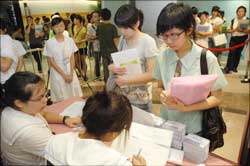 Hong Kong parents
are eager to send their children to education institutes overseas despite the
stronger euro and the pound, according to a placement agency. The credentials
evaluation director of a private company promoting overseas studies said there
was a 15 percent increase in inquiries this year, compared with the same period
last year. Ken Ng Chung-lai of the International Student Services Center
Corporation also said that more parents now seem to prefer Britain or Canada to
the United States. "Probably, Hong Kongers are wealthier ... perhaps it is
related to the better economy," Ng said. He said it appears the US may not be
the top choice in the wake of several school shootings. Ng said 40 percent of
students sent overseas by his company went to Canada, 30 percent to Britain and
30 percent to other countries including the US and Australia. But in the past 30
percent went to Canada and the US, 20 percent to Britain and 20 percent to other
countries. Ng said one of the surprising facts was that families earning only
about HK$20,000 a month were also keen to send their children to Canada for
study. He said one possible reason is that many Hong Kongers have relatives in
Canada. "Boarding is expensive, and in many cases it can cost as much as the
school fees, so parents with moderate means are advised to send their children
to schools in countries where they have relatives," Ng said. It was a different
story with the Hong Kong Overseas Studies Centre whose administrator, Michelle
Leung Pui-ling, said more parents sought information about studying in the US.
"This is because the Hong Kong dollar is fixed to the US dollar and parents have
a better idea of the costs involved," Leung said. She advised parents sending
their children elsewhere to budget for extra expenses as the pound as well as
the Australian and New Zealand dollars have been appreciating. A US report said
that - fueled by Asia - foreign student enrollment in US higher education
institutions has increased significantly for the first time since the September
11, 2001 attacks, which led to tighter visa controls. According to the report by
the Institute of International Education, enrollments from East Asia increased 3
percent, with strong increases from China, South Korea and Taiwan. This, though,
was partially offset by declines from Japan and Hong Kong. The report said
582,984 international students enrolled in colleges and universities in the US
in the 2006/07 academic year. "This is the first significant increase in total
international student enrollments since 2001/02," the institute said in its
annual " Open Doors" report. In the previous academic year, the increase was
just within a fraction of a percent. Asia accounts for 59 percent of total US
international enrollments, up 5 percent this year. Strong increases were seen
from the top three sending countries - India up 10 percent, China up 8percent
and South Korea 6 percent. Hong Kong parents
are eager to send their children to education institutes overseas despite the
stronger euro and the pound, according to a placement agency. The credentials
evaluation director of a private company promoting overseas studies said there
was a 15 percent increase in inquiries this year, compared with the same period
last year. Ken Ng Chung-lai of the International Student Services Center
Corporation also said that more parents now seem to prefer Britain or Canada to
the United States. "Probably, Hong Kongers are wealthier ... perhaps it is
related to the better economy," Ng said. He said it appears the US may not be
the top choice in the wake of several school shootings. Ng said 40 percent of
students sent overseas by his company went to Canada, 30 percent to Britain and
30 percent to other countries including the US and Australia. But in the past 30
percent went to Canada and the US, 20 percent to Britain and 20 percent to other
countries. Ng said one of the surprising facts was that families earning only
about HK$20,000 a month were also keen to send their children to Canada for
study. He said one possible reason is that many Hong Kongers have relatives in
Canada. "Boarding is expensive, and in many cases it can cost as much as the
school fees, so parents with moderate means are advised to send their children
to schools in countries where they have relatives," Ng said. It was a different
story with the Hong Kong Overseas Studies Centre whose administrator, Michelle
Leung Pui-ling, said more parents sought information about studying in the US.
"This is because the Hong Kong dollar is fixed to the US dollar and parents have
a better idea of the costs involved," Leung said. She advised parents sending
their children elsewhere to budget for extra expenses as the pound as well as
the Australian and New Zealand dollars have been appreciating. A US report said
that - fueled by Asia - foreign student enrollment in US higher education
institutions has increased significantly for the first time since the September
11, 2001 attacks, which led to tighter visa controls. According to the report by
the Institute of International Education, enrollments from East Asia increased 3
percent, with strong increases from China, South Korea and Taiwan. This, though,
was partially offset by declines from Japan and Hong Kong. The report said
582,984 international students enrolled in colleges and universities in the US
in the 2006/07 academic year. "This is the first significant increase in total
international student enrollments since 2001/02," the institute said in its
annual " Open Doors" report. In the previous academic year, the increase was
just within a fraction of a percent. Asia accounts for 59 percent of total US
international enrollments, up 5 percent this year. Strong increases were seen
from the top three sending countries - India up 10 percent, China up 8percent
and South Korea 6 percent.
Shares in Uni-President China Holdings, the mainland arm
of Taiwan’s largest food and beverage conglomerate, ended higher in their
trading debut after the firm’s initial public offering raised US$477 million.
The mainland arm of Taiwan’s largest food and beverage conglomerate,
outperformed as investors sought exposure to the mainland’s consumption story.
Shares gained momentum through the session, ending at HK$4.75, up 12.6 per cent
from their initial public offering price of HK$4.22. The rise followed a flat
performance in the morning and far outpaced the broad market, which suffered
heavy losses with the benchmark Hang Seng Index closing 3.5 per cent lower. The
performance followed a recent spate of lacklustre first-day showings in an IPO
market that had been hot for much of the year, adding to pressure on upcoming
listing hopefuls to price their issues more attractively. “Investors try to
avoid buying IPOs due to the weak market sentiment, but as Uni-President China
is a Chinese consumption play, its shares will stabilise during a market
rebound,” said Steven Leung, director of institutional sales at UOB-Kay Hian.
Shares in Uni-President China, which is a spin-off from Taiwan’s Uni-President
Enterprises, fell as low as HK$3.97 in the morning session before rising to
HK$4.26 at the midday close. The company priced its IPO at HK$4.22 per share,
which was in the middle of its indicated range. Its midday price valued the
company at about 22.5 times the next year’s earnings forecast of its
underwriters. By comparison, rival Tingyi (SEHK: 0322) trades at 37 times
forecast next year profit and Huiyuan Juice trades at 26 times. The deal
attracted orders for 4.56 times the shares offered to retail investors. The
company, which makes and distributes instant noodles and beverages in China,
sold 881.72 million shares, or 25 per cent of its enlarged share capital, in a
deal sponsored by UBS and Morgan Stanley. Uni-President China joins several
Taiwan companies that have chosen to list their mainland subsidiaries in Hong
Kong to get around Taiwan’s ban on companies putting more than 40 per cent of
their capital into the mainland. Recent Hong Kong listings by Taiwan companies
have not been star performers in the secondary market. Shares in meat processor
DaChan Food (SEHK: 3999) Asia, a unit of Great Wall Enterprise (Taiwan), have
fallen 14.8 per cent since their October listing. Shoe maker Stella
International (SEHK: 1836, announcements, news) ’s stock has risen 7.2 per cent
since its July float, compared with a 21 per cent rise in the Hang Seng index
over the same period.
 China:
Tibet is expected to receive a record-high 4.02 million tourists in 2007 with a
year-on-year increase of 64 percent, said an official Sunday. The region's
tourism revenues is estimated to hit 4.8 billion yuan this year, up 73.3 percent
from last year, said Zhang Qingli, secretary of the Tibet Autonomous Regional
Committee of the Communist Party of China at an economic work conference. "The
golden time of Tibet tourism has come," said Zhang. The official attributed the
rapid tourism growth to overseas promotional drives and the opening of
Qinghai-Tibet railway and the third civilian airport in Nyingchi, which help to
bring more tourists, from both home and abroad, to the plateau. "The traditional
low season of tourism, usually beginning after the Golden Week of National
Holiday in October, seems not low at all," said Zhang. The region received 2.5
million tourists last year and reaped 2.77 billion yuan in total tourism
earnings, accounting for 9.6 percent of the region's gross domestic product.
Tibet now has 88 star-level hotels, which host nearly 50,000 guests, and 56
travel agencies.
China:
Tibet is expected to receive a record-high 4.02 million tourists in 2007 with a
year-on-year increase of 64 percent, said an official Sunday. The region's
tourism revenues is estimated to hit 4.8 billion yuan this year, up 73.3 percent
from last year, said Zhang Qingli, secretary of the Tibet Autonomous Regional
Committee of the Communist Party of China at an economic work conference. "The
golden time of Tibet tourism has come," said Zhang. The official attributed the
rapid tourism growth to overseas promotional drives and the opening of
Qinghai-Tibet railway and the third civilian airport in Nyingchi, which help to
bring more tourists, from both home and abroad, to the plateau. "The traditional
low season of tourism, usually beginning after the Golden Week of National
Holiday in October, seems not low at all," said Zhang. The region received 2.5
million tourists last year and reaped 2.77 billion yuan in total tourism
earnings, accounting for 9.6 percent of the region's gross domestic product.
Tibet now has 88 star-level hotels, which host nearly 50,000 guests, and 56
travel agencies.
China's legislature is to conduct the first
reading of three draft laws on food safety, state assets and social insurance
later this month. The 31st session of the Standing Committee of the National
People's Congress (NPC) was expected to convene from Dec. 23 to Dec. 29,
according to a statement issued after a meeting of the chairman and
vice-chairpersons of the NPC Standing Committee on Monday. The draft law on food
safety has been a hot topic in China since 2005 due to increasing incidence of
food scandal.
China's 1st JV investment bank obtains QDII
quota - China International Capital Corp. (CICC) acquired a qualified domestic
institutional investor (QDII) investment quota of 5 billion U.S. dollars.
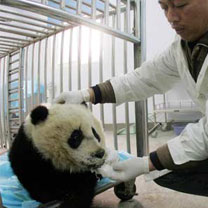 A veterinarian
feeds an injured wild giant panda after operation at the Shaanxi Province Rare
Wildlife Rescue & Breeding Research Center in Xi'an, capital of northwest
China's Shaanxi Province, Dec. 16, 2007. A veterinarian
feeds an injured wild giant panda after operation at the Shaanxi Province Rare
Wildlife Rescue & Breeding Research Center in Xi'an, capital of northwest
China's Shaanxi Province, Dec. 16, 2007.
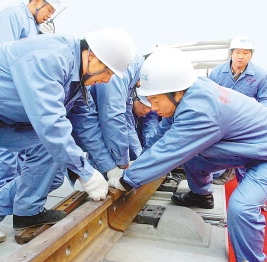 Workers lay the last
rail of the Beijing-Tianjin high speed railway in Tianjin on Sunday, December
16, 2007. The railway will be put into use before the Olympic Games in August
2008. Workers lay the last
rail of the Beijing-Tianjin high speed railway in Tianjin on Sunday, December
16, 2007. The railway will be put into use before the Olympic Games in August
2008.
 China's
fast-expanding oil tanker fleet is expected to shoulder half of the
transportation of imported oil by 2010, experts have said. Luo Ping, a
researcher with the Institute of Comprehensive Transportation (ICT) affiliated
to the National Development and Reform Commission, said domestic shipping
companies have been encouraged to expand the oil transportation market in the
past years to help guarantee economic security. Recent studies by the ICT showed
that Chinese-operated tankers should transport at least 60 percent of imported
oil to ensure supplies. But domestic tankers last year shipped only 16 percent
of oil imported by China, ICT figures showed. "Based on our studies, we
recommended in 2000 that it should be a long-term goal to have 60 percent of
China's imported oil shipped by domestic companies by 2015," Luo told China
Daily. The country imports more than 130 million tons of oil each year, about 90
percent of which is transported by ship. It has made China, the world's second
largest importer after the United States, vulnerable to transportation costs and
other uncertainties such as war. Given the huge potential of the market, almost
all major domestic shipping companies have rolled out ambitious plans to expand
their fleet. "Major shipping companies have all carried out plans to increase
oil transportation capacities," Luo said. Almost all of China's major shipping
companies have set a target of at least doubling their current imported oil
transportation capacity by the year 2010. The China Ocean Shipping (Group)
Company (COSCO), for example, said it planned to have an oil transportation
fleet totaling 10 million deadweight (dwt) tons by the year 2010, up from the
current 5.07 million dwt tons. The expanded fleet will be able to transport 35
million tons a year, accounting for more than 15 percent of China's imported oil
transport in 2010 and up from the current 8 percent, said COSCO vice-president
Zhang Liang. "We have already placed orders to build new tankers totaling 2.4
million dwt tons. The rest will be achieved through rents and more purchases,"
Zhang told China Daily. Another major player, China Shipping Development Co
Ltd's Tanker Company, said it planned to expand its oil transportation fleet to
a scale of 8.5 million dwt tons in 2010 through buying and renting, up from the
current 3.9 million dwt tons. The general manager of the tanker company, Mao
Shijia, said the firm has orders for new tankers of 3.5 million dwt tons. The
expanded fleet, including at least 12 to 14 very large crude carriers, will help
the company take up around 15 per cent of China's imported oil transportation
market, up from the current 5 percent, Mao said. Both companies forecast that
domestic shipping companies will be able to transport 50 percent of China's
imported oil in 2010. At the same time, the authorities have expressed some
concern that their new oil tankers are not flying Chinese flags. The deputy
director of the Water Transport Department of the Ministry of Communications,
Zhang Shouguo, said the ministry would prefer more Chinese ocean-going ships to
fly Chinese flags instead of flags of convenience. Zhang said the country needs
to have better command over shipping to safeguard economic interests. To that
end, the ministry has introduced a two-year policy granting tax exemption for
ships of certain types - including oil tankers between four and 12 years old in
July this year - if they come back and register at home. China's
fast-expanding oil tanker fleet is expected to shoulder half of the
transportation of imported oil by 2010, experts have said. Luo Ping, a
researcher with the Institute of Comprehensive Transportation (ICT) affiliated
to the National Development and Reform Commission, said domestic shipping
companies have been encouraged to expand the oil transportation market in the
past years to help guarantee economic security. Recent studies by the ICT showed
that Chinese-operated tankers should transport at least 60 percent of imported
oil to ensure supplies. But domestic tankers last year shipped only 16 percent
of oil imported by China, ICT figures showed. "Based on our studies, we
recommended in 2000 that it should be a long-term goal to have 60 percent of
China's imported oil shipped by domestic companies by 2015," Luo told China
Daily. The country imports more than 130 million tons of oil each year, about 90
percent of which is transported by ship. It has made China, the world's second
largest importer after the United States, vulnerable to transportation costs and
other uncertainties such as war. Given the huge potential of the market, almost
all major domestic shipping companies have rolled out ambitious plans to expand
their fleet. "Major shipping companies have all carried out plans to increase
oil transportation capacities," Luo said. Almost all of China's major shipping
companies have set a target of at least doubling their current imported oil
transportation capacity by the year 2010. The China Ocean Shipping (Group)
Company (COSCO), for example, said it planned to have an oil transportation
fleet totaling 10 million deadweight (dwt) tons by the year 2010, up from the
current 5.07 million dwt tons. The expanded fleet will be able to transport 35
million tons a year, accounting for more than 15 percent of China's imported oil
transport in 2010 and up from the current 8 percent, said COSCO vice-president
Zhang Liang. "We have already placed orders to build new tankers totaling 2.4
million dwt tons. The rest will be achieved through rents and more purchases,"
Zhang told China Daily. Another major player, China Shipping Development Co
Ltd's Tanker Company, said it planned to expand its oil transportation fleet to
a scale of 8.5 million dwt tons in 2010 through buying and renting, up from the
current 3.9 million dwt tons. The general manager of the tanker company, Mao
Shijia, said the firm has orders for new tankers of 3.5 million dwt tons. The
expanded fleet, including at least 12 to 14 very large crude carriers, will help
the company take up around 15 per cent of China's imported oil transportation
market, up from the current 5 percent, Mao said. Both companies forecast that
domestic shipping companies will be able to transport 50 percent of China's
imported oil in 2010. At the same time, the authorities have expressed some
concern that their new oil tankers are not flying Chinese flags. The deputy
director of the Water Transport Department of the Ministry of Communications,
Zhang Shouguo, said the ministry would prefer more Chinese ocean-going ships to
fly Chinese flags instead of flags of convenience. Zhang said the country needs
to have better command over shipping to safeguard economic interests. To that
end, the ministry has introduced a two-year policy granting tax exemption for
ships of certain types - including oil tankers between four and 12 years old in
July this year - if they come back and register at home.
 State-owned
Chang'an Automobile Group has started making its own hybrid cars, the first such
move by a mainland automaker. Mass production of the mainland- designed car,
which consumes 20 percent less fuel than ordinary cars of the same size, was
launched after six years of research and development. "This shows Chinese
automakers have grasped the core technology of making hybrid cars," Xinhua News
Agency said, adding that Chang'an will donate 10 such vehicles for the 2008
Olympics. The Chang'an Group controls listed Changan Automobile, a partner of
Ford and Mazda. The listed arm, based in the southwestern city of Chongqing, is
also China's largest minivan maker. Demand for hybrid cars is negligible in
China, where fuel economy figures little in consumers' purchasing decisions.
Hybrid cars are also expensive since the government offers buyers no incentives
to purchase them. Toyota was the first carmaker to build hybrid cars in China.
General Motors said last month it would begin producing a hybrid car in China
from next year, in time for the Olympics. Japan's Nikkei said the hybrid vehicle
made by Chang'an is based on a two-liter compact wagon that will be able to
travel 100 kilometers on 6.8 liters of gasoline, and it will be officially
released next year. The new hybrid is close in size to Toyota's Prius hybrid,
sold in China since late 2005. Mainland sales of the Toyota hybrid were down 86
percent in the first 10 months this year from the same period a year earlier to
299 units, as its 300,000 yuan (HK$317,390) price tag hurt its popularity.
Changan's new offering will cost around 150,000 yuan, roughly 20,000 yuan more
than the base vehicle but just half as much as the Prius. State-owned
Chang'an Automobile Group has started making its own hybrid cars, the first such
move by a mainland automaker. Mass production of the mainland- designed car,
which consumes 20 percent less fuel than ordinary cars of the same size, was
launched after six years of research and development. "This shows Chinese
automakers have grasped the core technology of making hybrid cars," Xinhua News
Agency said, adding that Chang'an will donate 10 such vehicles for the 2008
Olympics. The Chang'an Group controls listed Changan Automobile, a partner of
Ford and Mazda. The listed arm, based in the southwestern city of Chongqing, is
also China's largest minivan maker. Demand for hybrid cars is negligible in
China, where fuel economy figures little in consumers' purchasing decisions.
Hybrid cars are also expensive since the government offers buyers no incentives
to purchase them. Toyota was the first carmaker to build hybrid cars in China.
General Motors said last month it would begin producing a hybrid car in China
from next year, in time for the Olympics. Japan's Nikkei said the hybrid vehicle
made by Chang'an is based on a two-liter compact wagon that will be able to
travel 100 kilometers on 6.8 liters of gasoline, and it will be officially
released next year. The new hybrid is close in size to Toyota's Prius hybrid,
sold in China since late 2005. Mainland sales of the Toyota hybrid were down 86
percent in the first 10 months this year from the same period a year earlier to
299 units, as its 300,000 yuan (HK$317,390) price tag hurt its popularity.
Changan's new offering will cost around 150,000 yuan, roughly 20,000 yuan more
than the base vehicle but just half as much as the Prius.
December 20, 2007
 Hong Kong:
More than three-quarters of people in Hong Kong are prepared to pay higher
transport fees for cleaner air, and over 40 per cent support the controversial
electronic road pricing, according to the results of the city's biggest ever
consultation exercise. The study, commissioned by the semi-official Council for
Sustainable Development, also found that 95 per cent of people want the
government to respond to high air pollution days, including taking mandatory
measures such as suspending outdoor activities. Most also prefer a color-coded
alert system. The study, also the city's first consultation on clean air, was
conducted by the University of Hong Kong this summer. The findings were based on
more than 81,000 completed questionnaires. It will be released today at the Air
Summit, where Chief Executive Donald Tsang Yam-kuen, top business and social
leaders will discuss ways to clean the air. A council source said the survey
results would put the government under pressure to introduce road pricing and
other tougher policies. Officials have stressed before that we need a consensus
among the public and the Central-Wan Chai bypass before having road pricing. Now
the bypass could be built soon and the voice from the crowd is very clear," the
source said. "Clearly people want the government to do more against air
pollution." The authorities have studied the feasibility of road pricing in Hong
Kong since 1980s. But the Transport Department put off pursuing it in 2001 on
environmental and transport grounds following the completion of a four-year
study. Those who agreed with road pricing said it should be based on the
polluter-pays principle and the money collected should be used to encourage
greener vehicles and alternative transport choices. Of those who wanted a
government response to high pollution days, more than 80 per cent said outdoor
activities such as sports days should be cancelled when the air quality is bad.
Three-quarters of respondents said people should use public transport as much as
possible on high pollution days, and nearly two-thirds said they should be
required to do so. Half the respondents said staff with medical needs should be
allowed to work from home, and companies and individuals should reduce the use
of electrical and diesel equipment. Also, most people supported making more
measures to clean the air mandatory. These include turning off air-conditioners
and lights in empty offices, switching off advertising lights in the early
morning, and switching to energy efficient light bulbs. "Apparently people are
willing to do something and pay a bit more to help clean the air," the source
said. "This survey will be a very effective tool for the government to push for
tougher actions, such as an idling engine ban, in future." Hong Kong:
More than three-quarters of people in Hong Kong are prepared to pay higher
transport fees for cleaner air, and over 40 per cent support the controversial
electronic road pricing, according to the results of the city's biggest ever
consultation exercise. The study, commissioned by the semi-official Council for
Sustainable Development, also found that 95 per cent of people want the
government to respond to high air pollution days, including taking mandatory
measures such as suspending outdoor activities. Most also prefer a color-coded
alert system. The study, also the city's first consultation on clean air, was
conducted by the University of Hong Kong this summer. The findings were based on
more than 81,000 completed questionnaires. It will be released today at the Air
Summit, where Chief Executive Donald Tsang Yam-kuen, top business and social
leaders will discuss ways to clean the air. A council source said the survey
results would put the government under pressure to introduce road pricing and
other tougher policies. Officials have stressed before that we need a consensus
among the public and the Central-Wan Chai bypass before having road pricing. Now
the bypass could be built soon and the voice from the crowd is very clear," the
source said. "Clearly people want the government to do more against air
pollution." The authorities have studied the feasibility of road pricing in Hong
Kong since 1980s. But the Transport Department put off pursuing it in 2001 on
environmental and transport grounds following the completion of a four-year
study. Those who agreed with road pricing said it should be based on the
polluter-pays principle and the money collected should be used to encourage
greener vehicles and alternative transport choices. Of those who wanted a
government response to high pollution days, more than 80 per cent said outdoor
activities such as sports days should be cancelled when the air quality is bad.
Three-quarters of respondents said people should use public transport as much as
possible on high pollution days, and nearly two-thirds said they should be
required to do so. Half the respondents said staff with medical needs should be
allowed to work from home, and companies and individuals should reduce the use
of electrical and diesel equipment. Also, most people supported making more
measures to clean the air mandatory. These include turning off air-conditioners
and lights in empty offices, switching off advertising lights in the early
morning, and switching to energy efficient light bulbs. "Apparently people are
willing to do something and pay a bit more to help clean the air," the source
said. "This survey will be a very effective tool for the government to push for
tougher actions, such as an idling engine ban, in future."
 Revised labeling scheme
more balanced - Centre for Food Safety, The revised nutrition labeling scheme
for pre-packaged food has taken into account principles adopted by the Codex
Alimentarius Commission, local health and disease patterns as well as overseas
regimes, striking a balance among different stakeholders, Centre for Food Safety
Controller Dr Constance Chan says. Speaking on a radio show today, Dr Chan said
the revised scheme will cover energy, trans-fat, protein, carbohydrates, fat,
saturated fat, sodium and sugars. Compared with the original proposal tabled in
2005, the revised scheme will include saturated fat, sodium, sugars and
trans-fat, but cholesterol, calcium and dietary fibre will be taken off the
list. However, when a claim is made on the amount of cholesterol or the amount
and type of fat, then the amount of cholesterol, mono-unsaturated fat and
polyunsaturated fat should also be declared. Local situation - Dr Chan said
saturated fat, sodium, sugars and trans-fat are closely associated with
cardiovascular diseases and strokes, the second and third major causes of death
in Hong Kong. Limited intake of energy-dense foods and salt, and avoidance of
sugary drinks will cut the risk of cancer, the major cause of deaths in the
city. She said cholesterol is taken out as saturated fat and trans-fats are
considered more important risk factors for cardiovascular disease. Dr Chan said
apart from the principles adopted by the Codex Alimentarius Commission, local
health and disease patterns as well as overseas regimes, the revised proposal
has also taken into account compliance costs for the food trade, implication on
food choice, views collected during the consultation exercise and the results of
the regulatory impact assessment, so as to come up with a scheme appropriate for
the local situation. More flexibility - Principal Assistant Secretary for Food &
Health Angelina Cheung said under the original proposal 5% to 10% of food
available in Hong Kong would be withdrawn from the market. The impact on food
choice, however, will be reduced with the flexibility allowed in the revised
scheme. On the proposed small volume exemption scheme for food products with
annual sales volume of 30,000 units or below Mrs. Cheung said the move will
exempt many ethnic food, organic food, or niche food products mostly imported or
manufactured in small volume. This will also cater for the staging of food fairs
and trade promotion events held usually for market testing purposes. She said
small volume exemption will be subject to Food & Environmental Hygiene
Department approval under a pre-registration system. Food traders will have to
report to the department the monthly sales volume of the food items while
department staff will conduct enforcement checks. Revised labeling scheme
more balanced - Centre for Food Safety, The revised nutrition labeling scheme
for pre-packaged food has taken into account principles adopted by the Codex
Alimentarius Commission, local health and disease patterns as well as overseas
regimes, striking a balance among different stakeholders, Centre for Food Safety
Controller Dr Constance Chan says. Speaking on a radio show today, Dr Chan said
the revised scheme will cover energy, trans-fat, protein, carbohydrates, fat,
saturated fat, sodium and sugars. Compared with the original proposal tabled in
2005, the revised scheme will include saturated fat, sodium, sugars and
trans-fat, but cholesterol, calcium and dietary fibre will be taken off the
list. However, when a claim is made on the amount of cholesterol or the amount
and type of fat, then the amount of cholesterol, mono-unsaturated fat and
polyunsaturated fat should also be declared. Local situation - Dr Chan said
saturated fat, sodium, sugars and trans-fat are closely associated with
cardiovascular diseases and strokes, the second and third major causes of death
in Hong Kong. Limited intake of energy-dense foods and salt, and avoidance of
sugary drinks will cut the risk of cancer, the major cause of deaths in the
city. She said cholesterol is taken out as saturated fat and trans-fats are
considered more important risk factors for cardiovascular disease. Dr Chan said
apart from the principles adopted by the Codex Alimentarius Commission, local
health and disease patterns as well as overseas regimes, the revised proposal
has also taken into account compliance costs for the food trade, implication on
food choice, views collected during the consultation exercise and the results of
the regulatory impact assessment, so as to come up with a scheme appropriate for
the local situation. More flexibility - Principal Assistant Secretary for Food &
Health Angelina Cheung said under the original proposal 5% to 10% of food
available in Hong Kong would be withdrawn from the market. The impact on food
choice, however, will be reduced with the flexibility allowed in the revised
scheme. On the proposed small volume exemption scheme for food products with
annual sales volume of 30,000 units or below Mrs. Cheung said the move will
exempt many ethnic food, organic food, or niche food products mostly imported or
manufactured in small volume. This will also cater for the staging of food fairs
and trade promotion events held usually for market testing purposes. She said
small volume exemption will be subject to Food & Environmental Hygiene
Department approval under a pre-registration system. Food traders will have to
report to the department the monthly sales volume of the food items while
department staff will conduct enforcement checks.
 Airport passenger traffic up
10% - airport authority, Hong Kong International Airport's passenger throughput
exceeded four million in November, up 10% on the same month last year, the
Airport Authority says. Airport Authority Chief Executive Officer Stanley Hui
said today November saw robust visitor traffic, particularly from the Mainland,
North America and Europe. "At our current growth rate annual passenger volume
will soon reach 50 million. Hong Kong International Airport is ready to meet
this demand and committed to delivering top-quality services and facilities."
Cargo throughput grew 6.2% to 364,000 tonnes, driven by strong exports to
Southeast Asia and Europe, and transhipments to and from Southeast Asia and the
Mainland. Air traffic movements rose 6.1% to 25,210. For the 12 months ending
November 30 passenger throughput was 47.4 million, cargo volume 3.72 million
tons with 294,180 air traffic movements, representing year-on-year growth of
7.5%, 4.3% and 5.2%. Airport passenger traffic up
10% - airport authority, Hong Kong International Airport's passenger throughput
exceeded four million in November, up 10% on the same month last year, the
Airport Authority says. Airport Authority Chief Executive Officer Stanley Hui
said today November saw robust visitor traffic, particularly from the Mainland,
North America and Europe. "At our current growth rate annual passenger volume
will soon reach 50 million. Hong Kong International Airport is ready to meet
this demand and committed to delivering top-quality services and facilities."
Cargo throughput grew 6.2% to 364,000 tonnes, driven by strong exports to
Southeast Asia and Europe, and transhipments to and from Southeast Asia and the
Mainland. Air traffic movements rose 6.1% to 25,210. For the 12 months ending
November 30 passenger throughput was 47.4 million, cargo volume 3.72 million
tons with 294,180 air traffic movements, representing year-on-year growth of
7.5%, 4.3% and 5.2%.
 China:
China will have 500 top innovative firms by the end of next year, sharpening its
competitive edge in the international market, Vice Minister of Science and
Technology Li Xueyong has said. China has taken a series of steps to shift its
development base from resource and labor to technology and innovation. About 184
companies were added to the country's trial innovative firms' (TIF) list on
Friday to boost the country's Technology Innovation Guidance Program. The
Science and Technology Ministry, the Assets Supervision and Administration
Commission (SASAC), under the State Council, and the All-China Federation of
Trade Unions jointly launched the program in late 2005. The new TIFs are from
the key development sectors such as natural resources, agriculture, IT,
biotechnology and environmental protection. "More favorable policies and
regulations, including those on taxation, will be adopted to help build up an
innovative environment to push forward the program," Li said. Key laboratories
and industrial R&D centers will be set up in the TIFs , with provisions of more
training on management and IPR protection, Li said. The country introduced 103
TIFs last year, with half of them having an R&D budget of more than 6 percent of
their total revenue last year. The country's 287 TIFs account for more than 30
percent of its industrial assets, SASAC Deputy Director Shao Ning said. "These
firms, all of which are large are already leaders in their sectors, will become
the country's technology leaders with their independent core technology," Shao
said. Innovation is vital for the survival and development of a firm in today's
world, Tsinghua University Liu Jisheng said. "The expansion of Chinese firms has
mainly depended on mergers and acquisitions, rather than on building up their
core competitiveness, represented by technological innovation and intellectual
property rights," Liu said. For example, the average expenditure in R&D of 411
of the country's top 500 firms last year was only 1.45 percent of their revenue,
while the international norm is to spend at least 5 percent.
China:
China will have 500 top innovative firms by the end of next year, sharpening its
competitive edge in the international market, Vice Minister of Science and
Technology Li Xueyong has said. China has taken a series of steps to shift its
development base from resource and labor to technology and innovation. About 184
companies were added to the country's trial innovative firms' (TIF) list on
Friday to boost the country's Technology Innovation Guidance Program. The
Science and Technology Ministry, the Assets Supervision and Administration
Commission (SASAC), under the State Council, and the All-China Federation of
Trade Unions jointly launched the program in late 2005. The new TIFs are from
the key development sectors such as natural resources, agriculture, IT,
biotechnology and environmental protection. "More favorable policies and
regulations, including those on taxation, will be adopted to help build up an
innovative environment to push forward the program," Li said. Key laboratories
and industrial R&D centers will be set up in the TIFs , with provisions of more
training on management and IPR protection, Li said. The country introduced 103
TIFs last year, with half of them having an R&D budget of more than 6 percent of
their total revenue last year. The country's 287 TIFs account for more than 30
percent of its industrial assets, SASAC Deputy Director Shao Ning said. "These
firms, all of which are large are already leaders in their sectors, will become
the country's technology leaders with their independent core technology," Shao
said. Innovation is vital for the survival and development of a firm in today's
world, Tsinghua University Liu Jisheng said. "The expansion of Chinese firms has
mainly depended on mergers and acquisitions, rather than on building up their
core competitiveness, represented by technological innovation and intellectual
property rights," Liu said. For example, the average expenditure in R&D of 411
of the country's top 500 firms last year was only 1.45 percent of their revenue,
while the international norm is to spend at least 5 percent.
Asian food will make up about
one-third of the menu at the Olympic Village next summer, with a final menu to
be approved on January 1, officials from the Beijing Olympic organizing
committee said Tuesday. "The Olympic menu has passed the first round of
examination and culinary experts have given it a positive evaluation," said
Xiang Ping, deputy director of BOCOG's Games Services Department. "The menu will
be sent for final approval next January before further steps are taken," she
added. As required by the International Olympic Committee (IOC), the Olympic
menu will reflect international tastes based on the concept of sharing and
mutual respect. "The IOC suggested we avoid highlighting religious food in the
menu, so we won't set up special areas for people with certain religious
requirements, but only designate special foods stands. Everyone will be free to
choose their favorite food," Xiang said. As for food hygiene, a strict tracking
system will secure the safety of all the ingredients during the production
process. Officials will keep samples of all the food for further testing if
necessary. "All 350 ingredients that fall under the 10 basic food categories for
the Beijing Games are under close supervision and inspection by the Beijing Food
Security Office, and suppliers are also selected using the strictest standards,"
she said. "Only those who pass all examinations before the Games will be
qualified to serve at the Olympics."
 Alarm raised on credit squeeze for small firms - PBOC official urges more access
to capital markets for funding, The mainland should expand access to its capital
markets to help cushion the blow of monetary tightening on smaller firms in need
of financing, Wu Xiaoling, a central bank deputy governor, said yesterday. The
mainland's excessive cash pool was helping to stoke inflation, which sped to an
11-year high at 6.9 per cent last month and had to be combated with tighter
monetary policy, Ms Wu told a financial forum. However, the People's Bank of
China (SEHK: 3988) remained wary of harming the economy by going too far in
clamping down on credit financing. One oft-cited concern from critics is that
the government's stricter curbs on bank lending will result in only big
companies enjoying continued access to loans, leaving the smaller firms that
have become the main engine for job creation hard up for cash. "If capital
markets for direct financing are further developed, then bank loans to small
firms will not be squeezed, which will reduce the impact of monetary tightening
on the real economy," Ms Wu said. Although the stock market has grown
considerably over the past two years, only a narrow segment of the country's
companies are listed. The corporate bond market is in poor shape, hampered by
low liquidity and half-completed reforms. Inadequate funding from the banking
sector for small and medium-sized enterprises (SMEs) was an enduring problem
even when overall liquidity was excessive, and it was unlikely to improve in the
short term, said Qu Hongbin, chief China economist at HSBC (SEHK: 0005,
announcements, news). The further development of the stock and bond markets,
especially the latter, would indirectly help the funding needs of SMEs, Mr Qu
said. A vital bond market, he added, would enable enterprises to source
lower-cost funding than was available through bank loans. Smaller enterprises
account for 99 per cent of the country's registered businesses, and are
responsible for about 60 per cent of gross domestic product. However, only 10
per cent of such businesses can secure loans from banks, and these loans account
for just 14 per cent of all bank lending. Meanwhile, Ms Wu on Friday night said
micro-finance operators would soon achieve legitimate status and be able to
secure credit from commercial banks, the Beijing News reported yesterday. Ms Wu
said the central bank and the China Banking Regulatory Commission were working
on new policies and regulations to aid the development of micro-credit services.
Micro credit is a type of loan tailored for low-income groups. On the mainland,
it refers to single loans of less than 5,000 yuan. Ms Wu said the country should
foster the development of micro-finance operators by allowing them to borrow
from commercial banks and then provide micro-credit services to farmers. There
are three forms of micro credit available. The first type covers unemployment
trust loans, student loans and poverty reduction loans provided by commercial
banks. Small loans by rural credit co-operative unions comprise a second form.
The third type involves small loans provided by privately owned micro-finance
operators and non-governmental organisations. However, the mainland's
micro-credit business is still in its infancy. Restrictive policies and
regulations and insufficient funding were the main obstacles to the sector's
development, said Du Xiaoshan, a deputy director of the Rural Development
Institute.
Alarm raised on credit squeeze for small firms - PBOC official urges more access
to capital markets for funding, The mainland should expand access to its capital
markets to help cushion the blow of monetary tightening on smaller firms in need
of financing, Wu Xiaoling, a central bank deputy governor, said yesterday. The
mainland's excessive cash pool was helping to stoke inflation, which sped to an
11-year high at 6.9 per cent last month and had to be combated with tighter
monetary policy, Ms Wu told a financial forum. However, the People's Bank of
China (SEHK: 3988) remained wary of harming the economy by going too far in
clamping down on credit financing. One oft-cited concern from critics is that
the government's stricter curbs on bank lending will result in only big
companies enjoying continued access to loans, leaving the smaller firms that
have become the main engine for job creation hard up for cash. "If capital
markets for direct financing are further developed, then bank loans to small
firms will not be squeezed, which will reduce the impact of monetary tightening
on the real economy," Ms Wu said. Although the stock market has grown
considerably over the past two years, only a narrow segment of the country's
companies are listed. The corporate bond market is in poor shape, hampered by
low liquidity and half-completed reforms. Inadequate funding from the banking
sector for small and medium-sized enterprises (SMEs) was an enduring problem
even when overall liquidity was excessive, and it was unlikely to improve in the
short term, said Qu Hongbin, chief China economist at HSBC (SEHK: 0005,
announcements, news). The further development of the stock and bond markets,
especially the latter, would indirectly help the funding needs of SMEs, Mr Qu
said. A vital bond market, he added, would enable enterprises to source
lower-cost funding than was available through bank loans. Smaller enterprises
account for 99 per cent of the country's registered businesses, and are
responsible for about 60 per cent of gross domestic product. However, only 10
per cent of such businesses can secure loans from banks, and these loans account
for just 14 per cent of all bank lending. Meanwhile, Ms Wu on Friday night said
micro-finance operators would soon achieve legitimate status and be able to
secure credit from commercial banks, the Beijing News reported yesterday. Ms Wu
said the central bank and the China Banking Regulatory Commission were working
on new policies and regulations to aid the development of micro-credit services.
Micro credit is a type of loan tailored for low-income groups. On the mainland,
it refers to single loans of less than 5,000 yuan. Ms Wu said the country should
foster the development of micro-finance operators by allowing them to borrow
from commercial banks and then provide micro-credit services to farmers. There
are three forms of micro credit available. The first type covers unemployment
trust loans, student loans and poverty reduction loans provided by commercial
banks. Small loans by rural credit co-operative unions comprise a second form.
The third type involves small loans provided by privately owned micro-finance
operators and non-governmental organisations. However, the mainland's
micro-credit business is still in its infancy. Restrictive policies and
regulations and insufficient funding were the main obstacles to the sector's
development, said Du Xiaoshan, a deputy director of the Rural Development
Institute.

 Experts speak out on worries over Three Gorges - Increased landslides and
project's ill effects on plants and fish already being seen, Until recently,
there has been little criticism in public of the Three Gorges Dam project, but
in the first of a two-part report, Shi Jiangtao explains how times are changing.
Former national legislator Qin Chenggong, who voted in favor of the Three Gorges
Dam 15 years ago, recently made his first visit to the world's largest dam. "The
project appears much better than I expected," said the former railway engineer
from Guangxi. Mr Qin, 68, was among more than 2,600 delegates to the National
People's Congress, the country's normally docile rubber-stamp parliament, who
were asked to approve the contentious damming of the Yangtze River in 1992. "A
lot of people like me knew very little about the huge hydroelectric power plant
before the vote," he said. "But we had heard it was a controversial project
shrouded by a long list of concerns such as water pollution, silting, funding
and resettlement." He recalled intensive brainstorming sessions on the dam
project by government officials and experts, which focused on the positive
effects of flood control, clean power generation and navigation. Despite such
heavy lobbying, a third of the delegates refused to endorse construction of the
185-metre-high dam in an unprecedented show of defiance. "It was fairly normal
to see people [at the time] with conflicting views on such a gigantic dam," he
said. Admitting he still had reservations about the project, the former Guangxi
engineer cautioned against the country's current dam-building frenzy in the
search for hydroelectric power to feed its energy-hungry economy.
Experts speak out on worries over Three Gorges - Increased landslides and
project's ill effects on plants and fish already being seen, Until recently,
there has been little criticism in public of the Three Gorges Dam project, but
in the first of a two-part report, Shi Jiangtao explains how times are changing.
Former national legislator Qin Chenggong, who voted in favor of the Three Gorges
Dam 15 years ago, recently made his first visit to the world's largest dam. "The
project appears much better than I expected," said the former railway engineer
from Guangxi. Mr Qin, 68, was among more than 2,600 delegates to the National
People's Congress, the country's normally docile rubber-stamp parliament, who
were asked to approve the contentious damming of the Yangtze River in 1992. "A
lot of people like me knew very little about the huge hydroelectric power plant
before the vote," he said. "But we had heard it was a controversial project
shrouded by a long list of concerns such as water pollution, silting, funding
and resettlement." He recalled intensive brainstorming sessions on the dam
project by government officials and experts, which focused on the positive
effects of flood control, clean power generation and navigation. Despite such
heavy lobbying, a third of the delegates refused to endorse construction of the
185-metre-high dam in an unprecedented show of defiance. "It was fairly normal
to see people [at the time] with conflicting views on such a gigantic dam," he
said. Admitting he still had reservations about the project, the former Guangxi
engineer cautioned against the country's current dam-building frenzy in the
search for hydroelectric power to feed its energy-hungry economy.
December 19, 2007
 Hong Kong:
Initial public offerings disappointed investors anew on Friday, amid the bearish
market, as Anton Oilfield Services Group (3337) closed at HK$1.63 on debut, 25
cents or 13.3 percent below its offer price of HK$1.88. Hong Kong:
Initial public offerings disappointed investors anew on Friday, amid the bearish
market, as Anton Oilfield Services Group (3337) closed at HK$1.63 on debut, 25
cents or 13.3 percent below its offer price of HK$1.88.
 Hong Kong Financial Secretary John Tsang
has told Indian business people Hong Kong is a good platform for them to do
business on the Mainland. Speaking in Mumbai, he urged Indian entrepreneurs to
take advantage of Hong Kong's position as both an international business center
in Asia and China's global financial center. Tsang said 10 years after
reunification Hong Kong enjoys a much deeper relationship with the Mainland. The
city is working to enhance its unrivalled status as China's global financial
center by facilitating the flow of investment in and out of the Mainland. Tsang
said Hong Kong and India have built a strong friendship over many years, adding
the 30,000-strong Indian community in Hong Kong has an important part to play in
the city's future development. He added the One Country, Two Systems formula for
reunification with the Mainland is working well and Hong Kong people are running
the city with a high degree of autonomy. Hong Kong Financial Secretary John Tsang
has told Indian business people Hong Kong is a good platform for them to do
business on the Mainland. Speaking in Mumbai, he urged Indian entrepreneurs to
take advantage of Hong Kong's position as both an international business center
in Asia and China's global financial center. Tsang said 10 years after
reunification Hong Kong enjoys a much deeper relationship with the Mainland. The
city is working to enhance its unrivalled status as China's global financial
center by facilitating the flow of investment in and out of the Mainland. Tsang
said Hong Kong and India have built a strong friendship over many years, adding
the 30,000-strong Indian community in Hong Kong has an important part to play in
the city's future development. He added the One Country, Two Systems formula for
reunification with the Mainland is working well and Hong Kong people are running
the city with a high degree of autonomy.
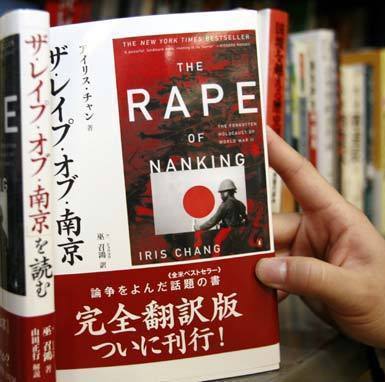 A Japanese skims over the "Iris
Chang: The Rape of Nanking" Japanese edition in a bookshop in Tokyo Dec 15,
2007. The book explored one of the darkest episodes of history in 1937 when
Japanese troops occupied Nanjing. A Japanese skims over the "Iris
Chang: The Rape of Nanking" Japanese edition in a bookshop in Tokyo Dec 15,
2007. The book explored one of the darkest episodes of history in 1937 when
Japanese troops occupied Nanjing.
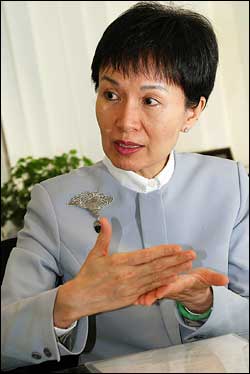 Tasked with safeguarding the Mandatory Provident Fund accounts of more than
460,000 people in Hong Kong, Bank Consortium Trust managing director Lau Ka-shi
says she is cautious. BCT offers an array of MPF and retirement products as well
as third-party scheme and fund administration services. Lau puts the single
largest chunk of her investment portfolio - about 30 percent - in equities.
"Equities in the long run will always outperform other investment vehicles,"
says Lau, and blue-chip China Life Insurance (2628) is one of her favorites. "I
have been holding my stocks for more than 10 years. I seldom sell them, except
shares in initial public offerings. "I may sell IPOs [initial public offerings]
within a month or even several days. Yet, these only account for less than 5
percent of my investment portfolio. It will not feel painful if I lose money."
Unlike many local investors, Lau does not use margin financing to fund her
purchases of IPO stocks. "One should not lose sleep over investments," she
stresses. Lau says she does not believe in borrowing money for investments, and
does not even use a credit card for personal purchases. Mortgages for her
apartments are the exception. Lau's first apartment in New York was her first
investment, and saving the money for the downpayment was important. To Lau,
saving is key to accumulating adequate liquidity enabling her to take advantage
of the most opportune time to invest. Lau offloaded stocks in August and
September before the Hang Seng Index ended at record high of 31,638.22 on
October 30.
Tasked with safeguarding the Mandatory Provident Fund accounts of more than
460,000 people in Hong Kong, Bank Consortium Trust managing director Lau Ka-shi
says she is cautious. BCT offers an array of MPF and retirement products as well
as third-party scheme and fund administration services. Lau puts the single
largest chunk of her investment portfolio - about 30 percent - in equities.
"Equities in the long run will always outperform other investment vehicles,"
says Lau, and blue-chip China Life Insurance (2628) is one of her favorites. "I
have been holding my stocks for more than 10 years. I seldom sell them, except
shares in initial public offerings. "I may sell IPOs [initial public offerings]
within a month or even several days. Yet, these only account for less than 5
percent of my investment portfolio. It will not feel painful if I lose money."
Unlike many local investors, Lau does not use margin financing to fund her
purchases of IPO stocks. "One should not lose sleep over investments," she
stresses. Lau says she does not believe in borrowing money for investments, and
does not even use a credit card for personal purchases. Mortgages for her
apartments are the exception. Lau's first apartment in New York was her first
investment, and saving the money for the downpayment was important. To Lau,
saving is key to accumulating adequate liquidity enabling her to take advantage
of the most opportune time to invest. Lau offloaded stocks in August and
September before the Hang Seng Index ended at record high of 31,638.22 on
October 30.
 Hong Kong's first equity fund
that complies with Islamic investment principles has gotten off to a good start.
The Islamic China Index Fund from Hang Seng Investment is an index tracker fund
based on the Dow Jones Islamic Market China/Hong Kong Titans Index. Hong Kong's first equity fund
that complies with Islamic investment principles has gotten off to a good start.
The Islamic China Index Fund from Hang Seng Investment is an index tracker fund
based on the Dow Jones Islamic Market China/Hong Kong Titans Index.
Hong Kong out to lead the wireless
revolution - City to get internet in the park, on the bus, and even on a hike -
Hong Kong could become one giant internet cafe as new wireless internet and
mobile phone services are rolled out over the next three years. The Office of
the Telecommunications Authority (Ofta) is making available two additional
portions of radio spectrum for provision of broadband wireless access via WiMax
and, for mobile phone users, 3.5G in a bid to make Hong Kong an "advanced
wireless city". WiMax is a more powerful version of Wi-fi. A single WiMax tower
can provide wireless internet up to 48km away. The move was announced at a
meeting of the Legislative Council's information technology and broadcasting
panel last week. It will give Hong Kong one of the world's first WiMax networks,
along with cities such as Moscow, Chicago, Baltimore and Washington. Ofta will
auction at least six licences to run the services next autumn. Companies are
expected to bid tens of millions of dollars. They will have two years to roll
out the services. Analysts say the move will trigger a massive shake-up in phone
and internet markets that is expected to bring greater competition and reduce
prices for consumers. Ofta chief telecoms engineer Cheng Chi-keung said: "This
new technology will enable people to use their laptop computers to connect to
the internet in many more areas of the city, such as parks, public squares and
the harbourfront. "You will also be able to pick up your laptop and connect to
the internet on a bus. "We are encouraging the operators to roll out the service
into rural areas and, in time, we expect high-speed internet access to be
available in country parks, on outlying islands and in other remote areas."
Enhanced broadband wireless access will also enable consumers to use the same
phone number for their fixed-line and mobile phones, to access their computer
via their mobile phone and to receive one bill for all telecoms services. An
Ofta spokeswoman said it had received four expressions of interest for broadband
wireless services in a consultation during the summer. Many of the eight
licensed phone carriers that took part indicated they were interested in
bidding. Such services would help Hong Kong maintain its competitive edge, she
said. Communications expert Francis Lau Chung-ming, of Polytechnic University,
said: "This new technology will mean that computer and phone users will have
greater choice between service providers, wherever they are in Hong Kong. It
will further open up the broadband communications service market and it will
almost certainly drive down monthly rental fees for mobile phones. "It means
that in future mobile phone users may be able to download videos or music, watch
TV, or call anywhere in the world for a very low price, whether with simple
audio phone or video phone." York Mok Sui-wah, chairman of the Hong Kong
Internet Service Providers Association, said ISPs would face very stiff
competition from the big phone companies for the new licences and some could be
driven out of business. "I think the government should allocate two or three of
the licences for providers that are offering special services such as free
wireless broadband services for people on low incomes so as to narrow the
digital divide," he said.
 Hong Kong Exchanges and Clearing (SEHK: 0388) will launch
its Mini H-share index futures contracts in April to provide individuals an
avenue into the market. But the new product does raise a question about whether
they are suitable for small investors. Exchange chief executive Paul Chow Man-yiu
announced the new product last week as one component of a 12-part plan for the
HKEx next year. He noted that, currently, H-share index futures contracts
require a deposit of about HK$180,000 - too expensive for many retail investors,
since the index had increased fourfold in the past four years. The miniature
version would require a deposit of about HK$36,000. Typically, futures contracts
enable investors to hedge against a decline in the value of a commodity or stock
portfolio, or simply to bet on the direction of the market. As they are bought
on margin, investors can make big gains, or, for that matter, lose even more
than they invested. "Futures have always been a high- risk, speculative
investment due to the fact that they are traded on margin. It may be appropriate
to enhance a portfolio of a sophisticated client but will not be suitable for
the average investor," said David Bellingham, chief executive of ING Financial
Planning, an independent financial adviser unit of ING Group.
Hong Kong Exchanges and Clearing (SEHK: 0388) will launch
its Mini H-share index futures contracts in April to provide individuals an
avenue into the market. But the new product does raise a question about whether
they are suitable for small investors. Exchange chief executive Paul Chow Man-yiu
announced the new product last week as one component of a 12-part plan for the
HKEx next year. He noted that, currently, H-share index futures contracts
require a deposit of about HK$180,000 - too expensive for many retail investors,
since the index had increased fourfold in the past four years. The miniature
version would require a deposit of about HK$36,000. Typically, futures contracts
enable investors to hedge against a decline in the value of a commodity or stock
portfolio, or simply to bet on the direction of the market. As they are bought
on margin, investors can make big gains, or, for that matter, lose even more
than they invested. "Futures have always been a high- risk, speculative
investment due to the fact that they are traded on margin. It may be appropriate
to enhance a portfolio of a sophisticated client but will not be suitable for
the average investor," said David Bellingham, chief executive of ING Financial
Planning, an independent financial adviser unit of ING Group.
The government will seek Legco approval for a HK$21.6
billion one-off grant to finance the initial stage of the West Kowloon cultural
development. The request is HK$2.6 billion higher than that previously sought,
because of inflation.
 China:
Shanghai will launch an international channel on Jan. 1 next year, as part of an
effort to become an international and cultural metropolis. The International
Channel Shanghai (ICS) is expected to serve as a window to showcase the economic
and cultural development of Shanghai and also provide audience with
entertainment and information, said Li Ruigang, president of Shanghai Media
Group (SMG). The ICS programs, covering news, information, fashion,
entertainment, foreign TV shows and movies, will be aired in English and
Japanese, with Chinese captions, for 19 hours a day. About 4.4 million Internet
subscribers in the city can also watch the programs on their computers through
IPTV (Internet Protocol Television). The new channel will also focus on the 2010
World Expo by launching a weekly program, "EXPO Connection", in an effort to
keep locals and foreigners informed of the preparatory progress. Shanghai TV is
the first in China to provide English programs. "News At Ten" and "Shanghai
Noon", which started broadcasting in 1986, were the first English language news
programs in the country.
China:
Shanghai will launch an international channel on Jan. 1 next year, as part of an
effort to become an international and cultural metropolis. The International
Channel Shanghai (ICS) is expected to serve as a window to showcase the economic
and cultural development of Shanghai and also provide audience with
entertainment and information, said Li Ruigang, president of Shanghai Media
Group (SMG). The ICS programs, covering news, information, fashion,
entertainment, foreign TV shows and movies, will be aired in English and
Japanese, with Chinese captions, for 19 hours a day. About 4.4 million Internet
subscribers in the city can also watch the programs on their computers through
IPTV (Internet Protocol Television). The new channel will also focus on the 2010
World Expo by launching a weekly program, "EXPO Connection", in an effort to
keep locals and foreigners informed of the preparatory progress. Shanghai TV is
the first in China to provide English programs. "News At Ten" and "Shanghai
Noon", which started broadcasting in 1986, were the first English language news
programs in the country.
The Chinese government on Sunday
officially announced the scrapping of one of the country's three "golden week"
holidays and introduced three new one-day public holidays. The new national
public holiday plan adds three traditional festivals -- Tomb-Sweeping Day,
Dragon-boat Festival and Mid Autumn Festival -- to the list of public holidays.
The plan, which comes into effect on Jan. 1, also increases the total number of
national holidays from 10 to 11 days. Each of the three traditional festivals
will be a one-day holiday, according to the plan unveiled by the State Council,
or China's cabinet. The Spring Festival remains a three-day public holiday, but
it will start one day earlier from the eve of the Lunar New Year, China's most
important traditional festival. The May Day holiday is shortened from three days
to one day, while the three-day National Day holiday and one-day New Year
holiday remain unchanged. The government will continue to move the weekend days
adjacent to a national holiday to form a longer holiday period so that people
will have three days or seven days off in a row. The New Year Day, Tomb-Sweeping
Day, Dragon-Boat Festival, May Day, and Mid-Autumn Day then become holidays of
three days each. The Spring Festival holiday and National Day holiday remain
seven-day holidays. An unnamed spokesman with the National Development and
Reform Commission (NDRC) said the new plan would uphold Chinese traditions, make
public holidays better distributed and, with more people traveling on new public
and paid holidays, ease overcrowding on the golden weeks. The three week-long
holidays -- Spring Festival, May Day holiday and National Day holiday -- were
introduced in 1999 to boost domestic demand amid efforts to promote China's
economic growth. But hundreds of millions of Chinese traveling at the same time
made transport and tourist destinations very crowded, making these holidays far
from an enjoyable experience. Many netizens have complained that the revised May
Day holiday will make the remaining two golden weeks even more crowded and that
deprives people working far from their hometowns of the chance to go back home
for family gatherings. They have even voiced their worry that a lot of company
employees will not be off on the newly-added traditional festival holidays. The
spokesman said the revision could not satisfy all the people, whose interests
might vary, but did respect the opinion of a majority. Citing government
figures, he said that 75 percent of the people were in favor of the whole plan
and that 60 percent of the netizens agreed to the way the May Day holiday was
revised. Also on Sunday, the State Council announced regulations on paid
holidays, saying all employees of government agencies, enterprises and
public-service institutions were entitled to take paid holidays after serving
the same employer for one year. Employees who have worked less than ten years
will have five paid days off a year, those who have worked for ten to 19 years
will have ten days and those who have worked for 20 years and above would have
15 days. National holidays and weekends will not be includes as paid holidays.
The regulations also stipulate that employees should have their full daily
salary guaranteed during paid holidays and that those who keep working should be
paid three times as much.
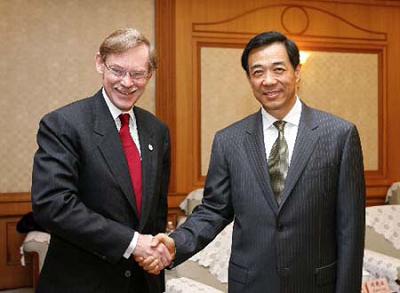 Bo Xilai(R), secretary of the
Chongqing Municipal Committee of the Communist Party of China (CPC), meets with
World Bank president Robert Zoellick in Chongqing on Saturday. Bo Xilai(R), secretary of the
Chongqing Municipal Committee of the Communist Party of China (CPC), meets with
World Bank president Robert Zoellick in Chongqing on Saturday.
 Snow sculptors work on the world's
tallest snow sculpture on Dec. 13 for the 20th Int'l Snow Sculpture Art Expo to
in Harbin in northeastern China's Heilongjiang Province. Snow sculptors work on the world's
tallest snow sculpture on Dec. 13 for the 20th Int'l Snow Sculpture Art Expo to
in Harbin in northeastern China's Heilongjiang Province.
Baosteel Group, China's largest
steel maker, has launched a 19.4-billion-yuan (2.6 billion U.S. dollars) joint
venture with Hansteel Group.
USA 'exaggerating ship-building
concerns' - Concerns expressed by a senior US Navy officer and a US lawmaker
that China's warship-building capabilities could soon surpass those of the
United States showed that Washington was unduly wary of competition, military
experts said yesterday. Admiral Gary Roughead, the commander of the US Pacific
Fleet, expressed concern on Thursday about competition from China's flourishing
ship-building sector. "[China's ship-builders] are very competitive on the world
market. There is no question that their ship-building capability is increasing
rapidly," Admiral Roughead told the House of Representatives Armed Services
Committee. His concern was supported by Republican congressman Duncan Hunter.
The lawmaker told the hearing that China was turning out 5,000 commercial ships
a year, against 300 by the US, and an average of three submarines a year, to
America's one. He said China was also producing nearly 480 million tonnes of
steel a year, five times as much as the US. "All that is giving them the
industrial base that could allow the Chinese naval capability to outstrip the
United States if they turn that commercial ship-building capability into
warship-building capability," Mr Hunter said. A Shanghai-based military expert
said the US admiral had exaggerated China's capability. "It's a fact that China
is now the second most prominent ship builder after the Koreans, but it's just
because of low costs due to China's cheap labour," said the expert, a former
People's Liberation Army officer. "But the technology involved in building
commercial ships and warships is vastly different." He said the quality of
mainland-made electronics equipment, fire control and missile systems could not
compete with the US. "Even Chinese-made steel is still not qualified to be used
in warship building because of poor quality," he said. Andrei Chang, a Hong
Kong-based military expert, said China had a good foundation in making hulls for
commercial ships, but its skills in integrating components still lagged behind
the US. "It's possible for China to surpass Korea as the biggest ship builder in
the world some day," Mr Chang said. "But in the warship-building sector, it's
impossible for it to catch up to the US." He said that Admiral Roughead's
singling out of China's ship-building capability was aimed at demanding more
funding for the US Navy next year. On Monday, the US Navy said that it needed an
extra US$18 billion to US$20 billion for the next six years, largely to fund
building of new warships.
December 18, 2007
 Hong Kong:
HSBC Holdings Plc (0005) might list the entire corporation in the mainland
instead of just its subsidiary HSBC China, the Hongkong and Shanghai Banking
Corp chairman Vincent Cheng Hoi-chuen told mainland media. Hong Kong:
HSBC Holdings Plc (0005) might list the entire corporation in the mainland
instead of just its subsidiary HSBC China, the Hongkong and Shanghai Banking
Corp chairman Vincent Cheng Hoi-chuen told mainland media.
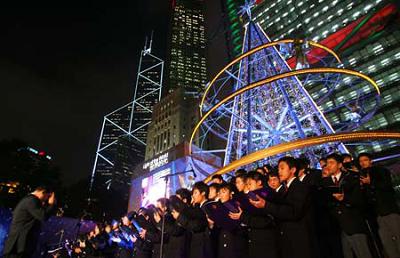 Students’ chorus perform in front
of the 55-feet-high lighting Christmas tree in Hong Kong of south China, Dec.
14, 2007 as the city is decorated to greet the Christmas. Students’ chorus perform in front
of the 55-feet-high lighting Christmas tree in Hong Kong of south China, Dec.
14, 2007 as the city is decorated to greet the Christmas.
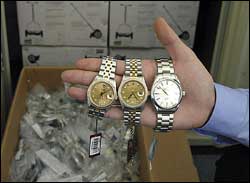 Mainland customs believe they have smashed a multimillion-dollar Hong Kong-based
luxury watch syndicate following the arrest of 15 people, including two from the
city. Officials say 10 Hong Kong watch shops and traders evaded 43 million yuan
(HK$45.5 million) in tax by smuggling more than 35,000 brandname watches worth
more than 200 million yuan into the mainland over the past two years. The brands
include Rolex, Vacheron Constantin and Longines, made by Swiss watchmakers, and
French brand Cartier. Customs attributed the increase in smuggling to the high
import tax in the mainland - which is 57 percent for every watch costing more
than HK$10,000. For a HK$26,000 Omega watch, 60 percent - or HK$16,000 - in tax
must be paid. Two of the 15 people arrested in Zhejiang and Guangdong provinces
were from Hong Kong. Mainland security officers uncovered the syndicate on
Thursday following raids on four "reputable" watch shops in Yiwu city and
Taizhou city in Zhejiang province. They were found to be selling watches for
prices ranging from 30 to 40 percent below the normal sale tags. An
investigation by customs officials in Zhejiang province showed the watches came
from about 10 companies in Hong Kong and were shipped in every few days. The
investigation also revealed two smuggling routes. In one of these, a man in
Dongguan smuggled watches to Dongguan city in Guangdong province by hiding them
in a space above the driver's seat of his brother's cross- border truck, and
then mailed the watches in batches to companies in Zhejiang. The alternative
arrangement was for Hong Kong companies to ask people to hand carry the watches
in their luggage when crossing the border to Shenzhen and then mail them to
Zhejiang. Officials in Hangzhou said the smuggling activities were becoming more
organized and networked and were being used to smuggle other luxury goods as
well.
Mainland customs believe they have smashed a multimillion-dollar Hong Kong-based
luxury watch syndicate following the arrest of 15 people, including two from the
city. Officials say 10 Hong Kong watch shops and traders evaded 43 million yuan
(HK$45.5 million) in tax by smuggling more than 35,000 brandname watches worth
more than 200 million yuan into the mainland over the past two years. The brands
include Rolex, Vacheron Constantin and Longines, made by Swiss watchmakers, and
French brand Cartier. Customs attributed the increase in smuggling to the high
import tax in the mainland - which is 57 percent for every watch costing more
than HK$10,000. For a HK$26,000 Omega watch, 60 percent - or HK$16,000 - in tax
must be paid. Two of the 15 people arrested in Zhejiang and Guangdong provinces
were from Hong Kong. Mainland security officers uncovered the syndicate on
Thursday following raids on four "reputable" watch shops in Yiwu city and
Taizhou city in Zhejiang province. They were found to be selling watches for
prices ranging from 30 to 40 percent below the normal sale tags. An
investigation by customs officials in Zhejiang province showed the watches came
from about 10 companies in Hong Kong and were shipped in every few days. The
investigation also revealed two smuggling routes. In one of these, a man in
Dongguan smuggled watches to Dongguan city in Guangdong province by hiding them
in a space above the driver's seat of his brother's cross- border truck, and
then mailed the watches in batches to companies in Zhejiang. The alternative
arrangement was for Hong Kong companies to ask people to hand carry the watches
in their luggage when crossing the border to Shenzhen and then mail them to
Zhejiang. Officials in Hangzhou said the smuggling activities were becoming more
organized and networked and were being used to smuggle other luxury goods as
well.
 A former head of the China-Hong Kong department at the Foreign and Commonwealth
Office, Andrew Seaton, has been named British consul-general in Hong Kong.
A former head of the China-Hong Kong department at the Foreign and Commonwealth
Office, Andrew Seaton, has been named British consul-general in Hong Kong.

 Macau and Hong Kong, although both
former colonies, have very different attitudes toward cultural preservation. It
appears that the Hong Kong government, regardless of the dedicated voice of
"collective memories," prefers for the city to be an ultra-modern metropolis,
with almost all traits of colonial influence being allowed to fade. Quite the
reverse, Macau understands and treasures its position as crossroads for
different cultures, cuisines and commerce, a delicious mixture of Portuguese and
Chinese civilization. You might call it hybrid, but for the Macanese, it is
their very own, genuine culture. Regardless of the increasing attention it gets
as a gaming and business tourism venue, Macau also proudly preserves its own
historical heritage and customs, while adding some new elements now and then.
Following the successful inscription of "The Historic Centre of Macau" on the
Unesco World Heritage List in July 2005, Macau received the Grand Award for
Heritage from Pacific Asia Travel Association in September. This award was given
to the Macau Government Tourist Office for its "2006 Macau World Heritage Year"
campaign that positioned the former Portugese enclave as a destination offering
travelers much more than entertainment and gaming - a historic center with rich
heritage. "Macau's living culture and heritage will always remain as our core
tourism assets, alongside other modern entertainment, leisure and business
ingredients, and we look forward to sharing this with all our visitors," said
Joao Manuel Costa Antunes, MGTO's director. For those wanting to know more about
the past history of Macau along with the existing architecture and customs, the
permanent exhibition "A Glimpse of the Past: A Collection of Old Macau Photos
from MAM" at the Macau Museum of Art ( Museu de Arte de Macau) will be an
invaluable opportunity for a more profound exploration. Through the display of
130 photographs, the exhibition showcases scenic spots, daily life, cultural
events, buildings, street views and vehicles of the old Macau across the last
century. Apart from nostalgic cultural preservation, Macau also enthusiastically
brings creative and artistic elements into its vivid life. The Macau Fringe is
an annual arts festival organized by the Civic and Municipal Affairs Bureau.
Every October or November, minds of creativeness, openness and inspiration bring
inventive, interesting, invigorating and passionate sentiments onto stage. An
inspirational platform for juvenile and experienced artists, international and
local, to interact and exchange ideas, Macau Fringe is a recognized channel for
the betterment of a more artistic Macau. Macau and Hong Kong, although both
former colonies, have very different attitudes toward cultural preservation. It
appears that the Hong Kong government, regardless of the dedicated voice of
"collective memories," prefers for the city to be an ultra-modern metropolis,
with almost all traits of colonial influence being allowed to fade. Quite the
reverse, Macau understands and treasures its position as crossroads for
different cultures, cuisines and commerce, a delicious mixture of Portuguese and
Chinese civilization. You might call it hybrid, but for the Macanese, it is
their very own, genuine culture. Regardless of the increasing attention it gets
as a gaming and business tourism venue, Macau also proudly preserves its own
historical heritage and customs, while adding some new elements now and then.
Following the successful inscription of "The Historic Centre of Macau" on the
Unesco World Heritage List in July 2005, Macau received the Grand Award for
Heritage from Pacific Asia Travel Association in September. This award was given
to the Macau Government Tourist Office for its "2006 Macau World Heritage Year"
campaign that positioned the former Portugese enclave as a destination offering
travelers much more than entertainment and gaming - a historic center with rich
heritage. "Macau's living culture and heritage will always remain as our core
tourism assets, alongside other modern entertainment, leisure and business
ingredients, and we look forward to sharing this with all our visitors," said
Joao Manuel Costa Antunes, MGTO's director. For those wanting to know more about
the past history of Macau along with the existing architecture and customs, the
permanent exhibition "A Glimpse of the Past: A Collection of Old Macau Photos
from MAM" at the Macau Museum of Art ( Museu de Arte de Macau) will be an
invaluable opportunity for a more profound exploration. Through the display of
130 photographs, the exhibition showcases scenic spots, daily life, cultural
events, buildings, street views and vehicles of the old Macau across the last
century. Apart from nostalgic cultural preservation, Macau also enthusiastically
brings creative and artistic elements into its vivid life. The Macau Fringe is
an annual arts festival organized by the Civic and Municipal Affairs Bureau.
Every October or November, minds of creativeness, openness and inspiration bring
inventive, interesting, invigorating and passionate sentiments onto stage. An
inspirational platform for juvenile and experienced artists, international and
local, to interact and exchange ideas, Macau Fringe is a recognized channel for
the betterment of a more artistic Macau.
 The popularity of
the Standard Chartered Hong Kong Marathon was proven once again after organisers
closed entries at noon yesterday - a full two weeks before the original deadline
- having estimated that the quota of 50,000 runners had been reached. "I believe
we will have more than 50,000 entries in all three categories including the
marathon," said Vivian So Wing-yee, executive director of the Hong Kong Amateur
Athletic Association. "We had to bring the deadline forward as we have already
reached the quota set for next year. "This is a great response. The numbers
taking part continue to grow and we are very happy. Last year we had around
44,000 entries." A new route and new finish line have apparently given the
February 17 race a fresh lease on life. Supported by Standard Chartered for the
12th year, the marathon will end at Victoria Park with the 10km race run
entirely on Hong Kong Island. Organisers set quotas for the three events: 30,000
runners for the 10km race, 12,000 for the half-marathon and 8,000 for the
marathon. The 10km race will start at North Point and be run on the Island East
Corridor, take a U-turn at Shau Kei Wan and return to Victoria Park. The other
two categories will have their usual start on Nathan Road, Tsim Sha Tsui, but
instead of finishing at the Grand Bauhinia Square in Wan Chai, continue on to
Victoria Park. The extra 1.5km will be compensated by shortening the loop on the
Tsing Ma Bridge. "The new 10km route will allow more runners to take part as
there won't be any more bottlenecks created by the presence of 10km runners,"
said organising committee chairman William Ko Wai-lam. The popularity of
the Standard Chartered Hong Kong Marathon was proven once again after organisers
closed entries at noon yesterday - a full two weeks before the original deadline
- having estimated that the quota of 50,000 runners had been reached. "I believe
we will have more than 50,000 entries in all three categories including the
marathon," said Vivian So Wing-yee, executive director of the Hong Kong Amateur
Athletic Association. "We had to bring the deadline forward as we have already
reached the quota set for next year. "This is a great response. The numbers
taking part continue to grow and we are very happy. Last year we had around
44,000 entries." A new route and new finish line have apparently given the
February 17 race a fresh lease on life. Supported by Standard Chartered for the
12th year, the marathon will end at Victoria Park with the 10km race run
entirely on Hong Kong Island. Organisers set quotas for the three events: 30,000
runners for the 10km race, 12,000 for the half-marathon and 8,000 for the
marathon. The 10km race will start at North Point and be run on the Island East
Corridor, take a U-turn at Shau Kei Wan and return to Victoria Park. The other
two categories will have their usual start on Nathan Road, Tsim Sha Tsui, but
instead of finishing at the Grand Bauhinia Square in Wan Chai, continue on to
Victoria Park. The extra 1.5km will be compensated by shortening the loop on the
Tsing Ma Bridge. "The new 10km route will allow more runners to take part as
there won't be any more bottlenecks created by the presence of 10km runners,"
said organising committee chairman William Ko Wai-lam.
Chief Executive Donald Tsang Yam-kuen will get 24 new
aides as soon as early next year to assist his ministers in policymaking and
conducting political work, after the Legislative Council passed a HK$65 million
package yesterday to create a new layer of political appointees. Despite
opposition by the pan-democrats, who said expanding the ministerial system in
the absence of universal suffrage would only create more officials who have no
mandate, pro-government parties backed the plan, which they said would help
cultivate political talent. The funding request - which will create 11
undersecretaries, each earning HK$193,773 to HK$223,586 a month, and 13
political assistants, earning HK$104,340 to HK$163,963 - was passed 29 to 16.
Speaking in a Legco finance committee meeting, legislator Anson Chan Fang
On-sang said pushing ahead with expansion without improving the present system
would only deepen public concerns on government favouritism towards its
political allies. "It would deepen the contradiction between civil servants and
political appointees, increase the workload of civil servants - especially those
in the administrative officer grades - and seriously affect the neutrality of
the civil service," she said. Emily Lau Wai-hing, of The Frontier, said it was
outrageous for the government to claim the new system was similar to
western-style democracy. "Of course it is OK for the US president to have layers
of political appointees - because he is elected through universal suffrage. Our
chief executive has no mandate because he is elected by a small circle of 800
people," Ms Lau said. But both the Democratic Alliance for the Betterment and
Progress of Hong Kong and the Liberal Party supported the plan, saying it would
help cultivate political talent. Secretary for Constitutional and Mainland
Affairs Stephen Lam Sui-lung denied the system was designed to return favors to
government allies.
 China:
Canada's total merchandise trade with China soared in the last decade, hitting
42.1 billion Canadian dollars (41.7 billion U.S. dollars) in 2006, federal
agency Statistics Canada reported Friday.
China:
Canada's total merchandise trade with China soared in the last decade, hitting
42.1 billion Canadian dollars (41.7 billion U.S. dollars) in 2006, federal
agency Statistics Canada reported Friday.
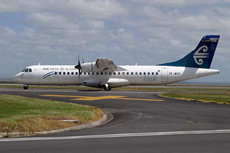 Air New Zealand, tapping the burgeoning
Chinese tourist market, and strong interest by New Zealanders in the Olympic
Games in Beijing next year, will start flying to Beijing from July 18 next year,
ahead of the Olympic Games. Air New Zealand chief executive Rob Fyfe announced
the new service on Thursday, the Dominion Post daily reported. The service,
subject to all necessary Chinese regulatory and operating approvals, would
operate out of New Zealand's largest city of Auckland on Wednesday and Friday
and out of Beijing on Thursday and Saturday using the airline's new Boeing
777-200ER aircraft. Fyfe said the new service would build on the success of the
airline's Auckland-Shanghai service, launched in November 2006. He added that
Chinese visitor numbers to New Zealand were booming, with growth of about 14
percent a year. The new service was part of the airline's push to expand its
presence in China, and was expected to generate a high level of interest, he
said. To provide sufficient capacity for the Beijing flights, the airline will
cut its Auckland Shanghai service to three times a week until November 2008.
Fyfe said from November next year the airline planned to operate five services a
week to Shanghai, plus the two Beijing flights. Fyfe expected strong demand from
New Zealanders as it coincided with the Beijing Olympics which run from Aug.
8-24. Air New Zealand, tapping the burgeoning
Chinese tourist market, and strong interest by New Zealanders in the Olympic
Games in Beijing next year, will start flying to Beijing from July 18 next year,
ahead of the Olympic Games. Air New Zealand chief executive Rob Fyfe announced
the new service on Thursday, the Dominion Post daily reported. The service,
subject to all necessary Chinese regulatory and operating approvals, would
operate out of New Zealand's largest city of Auckland on Wednesday and Friday
and out of Beijing on Thursday and Saturday using the airline's new Boeing
777-200ER aircraft. Fyfe said the new service would build on the success of the
airline's Auckland-Shanghai service, launched in November 2006. He added that
Chinese visitor numbers to New Zealand were booming, with growth of about 14
percent a year. The new service was part of the airline's push to expand its
presence in China, and was expected to generate a high level of interest, he
said. To provide sufficient capacity for the Beijing flights, the airline will
cut its Auckland Shanghai service to three times a week until November 2008.
Fyfe said from November next year the airline planned to operate five services a
week to Shanghai, plus the two Beijing flights. Fyfe expected strong demand from
New Zealanders as it coincided with the Beijing Olympics which run from Aug.
8-24.
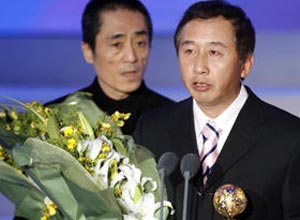 Chinese Director Zhang Yimou was among
nine winners of the "Green Chinese" awards, a government environmental prize, on
Friday for his engagement in environmental protection. Chinese Director Zhang Yimou was among
nine winners of the "Green Chinese" awards, a government environmental prize, on
Friday for his engagement in environmental protection.
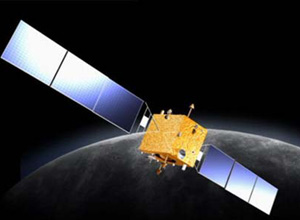 Chang'e-I mission may not end with a bang - An official said on Friday that
scientists had come up with several proposals on how to dispose of the lunar
satellite at the end of its mission, and two of them are under consideration.
Chang'e-I mission may not end with a bang - An official said on Friday that
scientists had come up with several proposals on how to dispose of the lunar
satellite at the end of its mission, and two of them are under consideration.
December 17, 2007
 Hong Kong:
AXA China JV approved to invest in HK stocks - Shanghai-based AXA-Minmetals
Assurance Co, a 51-49 joint venture between Europe's No. 2 insurer AXA and China
Minmetals Corp, has won approval from the China Insurance Regulatory Commission
to invest in Hong Kong H-shares and red chips, the Shanghai Securities News
reported, citing sources. The company becomes the first insurance joint venture
in China to gain such a license under the qualified domestic institutional
investor (QDII) program, the report quoted sources as saying. AXA-Minmetals
Assurance will be authorized to invest up to 5 percent of assets from the
previous year's accounting period in the Hong Kong stock market, the report
added. Also reportedly applying for QDII licenses are Aegon-CNOOC Life Insurance
Co, a 50-50 joint venture between Aegon NV and the China National Offshore Oil
Corp (CNOOC), and Allianz China Life Insurance Co, a 51-49 joint venture between
Allianz AG and China's CITIC Trust & Investment Co. Earlier, domestic insurers
including Ping An, Huatai, Sino Life and Taiping Life won approval to invest up
to 5 percent of their assets in H-shares and red chips. Insurers also need to
obtain a quota from the State Administration of Foreign Exchange (SAFE) before
initiating investment overseas. Only Taiping Life has announced a SAFE quota of
around HK$2 billion so far. In July, the CIRC issued revised rules allowing
Chinese insurers to invest up to 15 percent of their total assets in overseas
markets. The new rules will facilitate the conversion of yuan-denominated assets
into foreign exchange for investment in overseas equities products, including
options. Previously, only China's top three insurers, China Life, Ping An and
PICC, were authorized to invest overseas with a combined quota of about $3.5
billion under the QDII program. The three had been restricted to investing in
fixed income products using their own foreign exchange assets. Hong Kong:
AXA China JV approved to invest in HK stocks - Shanghai-based AXA-Minmetals
Assurance Co, a 51-49 joint venture between Europe's No. 2 insurer AXA and China
Minmetals Corp, has won approval from the China Insurance Regulatory Commission
to invest in Hong Kong H-shares and red chips, the Shanghai Securities News
reported, citing sources. The company becomes the first insurance joint venture
in China to gain such a license under the qualified domestic institutional
investor (QDII) program, the report quoted sources as saying. AXA-Minmetals
Assurance will be authorized to invest up to 5 percent of assets from the
previous year's accounting period in the Hong Kong stock market, the report
added. Also reportedly applying for QDII licenses are Aegon-CNOOC Life Insurance
Co, a 50-50 joint venture between Aegon NV and the China National Offshore Oil
Corp (CNOOC), and Allianz China Life Insurance Co, a 51-49 joint venture between
Allianz AG and China's CITIC Trust & Investment Co. Earlier, domestic insurers
including Ping An, Huatai, Sino Life and Taiping Life won approval to invest up
to 5 percent of their assets in H-shares and red chips. Insurers also need to
obtain a quota from the State Administration of Foreign Exchange (SAFE) before
initiating investment overseas. Only Taiping Life has announced a SAFE quota of
around HK$2 billion so far. In July, the CIRC issued revised rules allowing
Chinese insurers to invest up to 15 percent of their total assets in overseas
markets. The new rules will facilitate the conversion of yuan-denominated assets
into foreign exchange for investment in overseas equities products, including
options. Previously, only China's top three insurers, China Life, Ping An and
PICC, were authorized to invest overseas with a combined quota of about $3.5
billion under the QDII program. The three had been restricted to investing in
fixed income products using their own foreign exchange assets.
    The Chinese-language "Lust, Caution" was nominated for
Best Foreign Language movie Friday by the 65th Golden Globes in Los Angeles. The
award ceremony is slated for Jan. 13, 2008. Along with "Lust, Caution," four
others were also nominated as Best Foreign Language movies. They are "4 Months,
3 Weeks and 2 Days" (Romania), "The Diving Bell and the Butterfly" (France),
"The Kite Runner" (U.S.), and "Persepolis" (France). Directed by Ang Lee, "Lust,
Caution" was shot outside U.S. and partly produced by foreign entities, but was
financed and distributed by U.S. companies. World War II film saga "Atonement"
earned seven Golden Globe nominations, including one for best drama, to lead the
pack of movies vying for a key Hollywood honor in the widely watched awards
season.
The Chinese-language "Lust, Caution" was nominated for
Best Foreign Language movie Friday by the 65th Golden Globes in Los Angeles. The
award ceremony is slated for Jan. 13, 2008. Along with "Lust, Caution," four
others were also nominated as Best Foreign Language movies. They are "4 Months,
3 Weeks and 2 Days" (Romania), "The Diving Bell and the Butterfly" (France),
"The Kite Runner" (U.S.), and "Persepolis" (France). Directed by Ang Lee, "Lust,
Caution" was shot outside U.S. and partly produced by foreign entities, but was
financed and distributed by U.S. companies. World War II film saga "Atonement"
earned seven Golden Globe nominations, including one for best drama, to lead the
pack of movies vying for a key Hollywood honor in the widely watched awards
season.

 Hong Kong
director Peter Chan's "The Warlords" took in more than 10 million yuan, or 1.3
million U.S. dollars, at the box office in the first few hours following its
release. The war epic premiered in several Chinese cities at 6 p.m. on
Wednesday. Yu Dong, president of Poly-Bona, one of the movie's producers, told a
reporter with Chinese Web portal sina.com that he believed box office income
could double on Thursday, when the movie opens nationwide. "The Warlords" could
potentially break the box office records set by Zhang Yimou's "Curse of Golden
Flower," Yu Dong said. The movie, starring Jet Li, Andy Lau, Takeshi Kaneshiro
and Xu Jinglei, tells the tale of three blood brothers and their struggles
against a backdrop of war and political upheaval. It is scheduled for North
American release next March. Hong Kong
director Peter Chan's "The Warlords" took in more than 10 million yuan, or 1.3
million U.S. dollars, at the box office in the first few hours following its
release. The war epic premiered in several Chinese cities at 6 p.m. on
Wednesday. Yu Dong, president of Poly-Bona, one of the movie's producers, told a
reporter with Chinese Web portal sina.com that he believed box office income
could double on Thursday, when the movie opens nationwide. "The Warlords" could
potentially break the box office records set by Zhang Yimou's "Curse of Golden
Flower," Yu Dong said. The movie, starring Jet Li, Andy Lau, Takeshi Kaneshiro
and Xu Jinglei, tells the tale of three blood brothers and their struggles
against a backdrop of war and political upheaval. It is scheduled for North
American release next March.
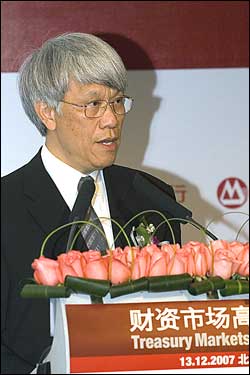 Whacked by the
subprime mortgage debacle in the United States, financial results of several
Hong Kong banks may be in the red, Hong Kong Monetary Authority chief executive
Joseph Yam Chi-kwong warned yesterday. "Up till now, we still haven't seen any
big impact [from subprime] on our economy," Yam said. "Yet, individual banks
that have involvement in subprime business might have problems. "We cannot rule
out the possibility that year-end results of these banks may report less profit
or even go into the red." On November 21, Moody's cut the rating of CITIC Ka Wah
Bank, a wholly owned subsidiary of CITIC International Financial Holdings
(0183), as the bank was found to have US$340 million (HK$2.65 billion) invested
in structured investment vehicles, accounting for 16.8 percent of the bank's
total investment portfolio and 34.4 percent of the bank's share capital. The
financial strength rating of CITIC Ka Wah was lowered to D+ from C- and its
subordinated debt was cut to Baa3 from Baa2. On November 26, CIFH injected
HK$2.5 billion into CITIC Ka Wah to strengthen its capital ratios. "The cash is
not big enough for us to change the rating," May Yan Meizhi, Moody's leading
analyst for CITIC Ka Wah told The Standard yesterday. "Furthermore, we need to
consider other factors. "CITIC Ka Wah could have to absorb impairment charges
related to its SIVs possibly equivalent to a full year's earnings. Without the
SIV impairment, full year earnings would be approximately double in the first
half of 2007." Kim Eng Securities analyst Ivan Li Sing-yeung said: "Profits of
CITIC Ka Wah will be less this year. The decrease depends on the amount of SIV-related
write-offs recorded this year." Adding to CITIC Ka Wah, Fubon Bank (Hong Kong)
(0636), HSBC Holdings (0005), BOC Hong Kong (Holdings) (2388), Bank of China
(3988), Standard Chartered (2888) and DBS Group were also found to have
exposures to subprime loans. Before the end of August, the city's de facto
central bank already collected data from local banks concerning their
involvement in the subprime mortgage. "Major banks are unlikely to report less
profits as the banking industry will benefit from this year's robust equity
market and improved loan growth. They will report increased profits instead," an
analyst at an Asian-based securities said. Fubon chief executive Lee Jin-yi
yesterday said the bank's investment in subprime-related assets is only slightly
larger than 1 percent of the bank's total assets. The most recent banks in the
city with red ink were Union Bank in 1998 fiscal year and Hong Kong Chinese Bank
in 1999. Meanwhile, Yam said the money injection by the US Federal Reserve and
four central banks yesterday showed that the worst of the subprime problem is
not yet over. "All central banks want to solve the issue quickly," said Yam. Whacked by the
subprime mortgage debacle in the United States, financial results of several
Hong Kong banks may be in the red, Hong Kong Monetary Authority chief executive
Joseph Yam Chi-kwong warned yesterday. "Up till now, we still haven't seen any
big impact [from subprime] on our economy," Yam said. "Yet, individual banks
that have involvement in subprime business might have problems. "We cannot rule
out the possibility that year-end results of these banks may report less profit
or even go into the red." On November 21, Moody's cut the rating of CITIC Ka Wah
Bank, a wholly owned subsidiary of CITIC International Financial Holdings
(0183), as the bank was found to have US$340 million (HK$2.65 billion) invested
in structured investment vehicles, accounting for 16.8 percent of the bank's
total investment portfolio and 34.4 percent of the bank's share capital. The
financial strength rating of CITIC Ka Wah was lowered to D+ from C- and its
subordinated debt was cut to Baa3 from Baa2. On November 26, CIFH injected
HK$2.5 billion into CITIC Ka Wah to strengthen its capital ratios. "The cash is
not big enough for us to change the rating," May Yan Meizhi, Moody's leading
analyst for CITIC Ka Wah told The Standard yesterday. "Furthermore, we need to
consider other factors. "CITIC Ka Wah could have to absorb impairment charges
related to its SIVs possibly equivalent to a full year's earnings. Without the
SIV impairment, full year earnings would be approximately double in the first
half of 2007." Kim Eng Securities analyst Ivan Li Sing-yeung said: "Profits of
CITIC Ka Wah will be less this year. The decrease depends on the amount of SIV-related
write-offs recorded this year." Adding to CITIC Ka Wah, Fubon Bank (Hong Kong)
(0636), HSBC Holdings (0005), BOC Hong Kong (Holdings) (2388), Bank of China
(3988), Standard Chartered (2888) and DBS Group were also found to have
exposures to subprime loans. Before the end of August, the city's de facto
central bank already collected data from local banks concerning their
involvement in the subprime mortgage. "Major banks are unlikely to report less
profits as the banking industry will benefit from this year's robust equity
market and improved loan growth. They will report increased profits instead," an
analyst at an Asian-based securities said. Fubon chief executive Lee Jin-yi
yesterday said the bank's investment in subprime-related assets is only slightly
larger than 1 percent of the bank's total assets. The most recent banks in the
city with red ink were Union Bank in 1998 fiscal year and Hong Kong Chinese Bank
in 1999. Meanwhile, Yam said the money injection by the US Federal Reserve and
four central banks yesterday showed that the worst of the subprime problem is
not yet over. "All central banks want to solve the issue quickly," said Yam.
 Hong Kong's leading
medical training academy and public hospitals are cooperating to open the door
for mainland doctors to work in Hong Kong through a new training exchange
program. The first batch of about 10 mainland specialist doctors will receive
temporary work placements in public hospitals for one to six months to
familiarize themselves with the local specialist training system. The program
has been jointly set up by the Hospital Authority, which will provide training,
insurance coverage and accommodation, and the Hong Kong Academy of Medicine,
which will provide a monthly scholarship of HK$15,000 to each eligible
candidate. The academy's foundation fund has set aside HK$500,000 a year for
eligible candidates. Others who are recommended by the mainland's Ministry of
Health can also train locally without a scholarship. The mainland doctors will
be provided with a temporary license to work in Hong Kong. The training program
aims to give doctors on both sides of the border a wider exposure to medical
practice in the hope that it will improve standards. "The purpose is not for the
mainland doctors to work in Hong Kong but to contribute to the medical
profession at home. To this end the mainland has asked us to help train their
doctors," Hospital Authority chief executive Shane Solomon said yesterday. Grace
Tang Wai-king, president of the Hong Kong Academy of Medicine, said mainland
doctors with experience in opthalmology, orthopaedics, dental surgery and
pediatrics will be eligible to apply to the Ministry of Health to work in Hong
Kong. A panel consisting of representatives from the Hospital Authority, the
academy and its 15 colleges will vet the applications. The program will be
provided by departments which have adequate training capacity to ensure local
trainees are not affected. Local trainees, who are one or two years from getting
their specialist qualifications, can also join the exchange program being
offered by mainland hospitals. At present, doctors who graduate from accredited
mainland universities must pass a licensing examination offered by the Hong Kong
Medical Council, complete a 12-month-long internship at a public hospital and
register at the council before they can practice in Hong Kong. Local
practitioner Lo Wing-lok, who has previously practiced in the mainland, welcomed
the program, saying it would attract talented mainland doctors. He dismissed
concerns that they would compete with Hong Kong doctors saying the city had a
shortage of local medics. Hong Kong's leading
medical training academy and public hospitals are cooperating to open the door
for mainland doctors to work in Hong Kong through a new training exchange
program. The first batch of about 10 mainland specialist doctors will receive
temporary work placements in public hospitals for one to six months to
familiarize themselves with the local specialist training system. The program
has been jointly set up by the Hospital Authority, which will provide training,
insurance coverage and accommodation, and the Hong Kong Academy of Medicine,
which will provide a monthly scholarship of HK$15,000 to each eligible
candidate. The academy's foundation fund has set aside HK$500,000 a year for
eligible candidates. Others who are recommended by the mainland's Ministry of
Health can also train locally without a scholarship. The mainland doctors will
be provided with a temporary license to work in Hong Kong. The training program
aims to give doctors on both sides of the border a wider exposure to medical
practice in the hope that it will improve standards. "The purpose is not for the
mainland doctors to work in Hong Kong but to contribute to the medical
profession at home. To this end the mainland has asked us to help train their
doctors," Hospital Authority chief executive Shane Solomon said yesterday. Grace
Tang Wai-king, president of the Hong Kong Academy of Medicine, said mainland
doctors with experience in opthalmology, orthopaedics, dental surgery and
pediatrics will be eligible to apply to the Ministry of Health to work in Hong
Kong. A panel consisting of representatives from the Hospital Authority, the
academy and its 15 colleges will vet the applications. The program will be
provided by departments which have adequate training capacity to ensure local
trainees are not affected. Local trainees, who are one or two years from getting
their specialist qualifications, can also join the exchange program being
offered by mainland hospitals. At present, doctors who graduate from accredited
mainland universities must pass a licensing examination offered by the Hong Kong
Medical Council, complete a 12-month-long internship at a public hospital and
register at the council before they can practice in Hong Kong. Local
practitioner Lo Wing-lok, who has previously practiced in the mainland, welcomed
the program, saying it would attract talented mainland doctors. He dismissed
concerns that they would compete with Hong Kong doctors saying the city had a
shortage of local medics.
 A new Las Vegas-style hotel is about to raise the stakes
in Macau's escalating casino war with a focus on the high-rollers market. The
US$1.25 billion MGM Grand Macau will add 600 hotel rooms, 385 gaming tables and
888 slot machines to the former Portuguese enclave when it opens on Tuesday. On
a prime waterfront site, the 154-metre tower is the Macau flagship of MGM Grand
Paradise, a 50-50 joint venture between MGM Mirage and Pansy Ho Chiu-king,
daughter of gaming mogul Stanley Ho Hung-sun. Ms Ho, managing director of MGM
Grand Paradise, yesterday gave notice to her casino neighbours in the burgeoning
Nam Van Lake gaming area, including Wynn Macau and Galaxy StarWorld, to brace
for a new wave of competition. "There's no end of creative ideas at MGM Grand
Macau," Ms Ho said. "I would urge our neighbours to really watch out." The
casino hotel's opening will mark a new era for the gambling hub, which has
outstripped Las Vegas in revenue, with all six of Macau's gaming concessionaires
in action. It also increases the supply of five-star hotel rooms in Macau by 8
per cent and boosts gaming tables by 9 per cent. The new property oozes luxury
for high rollers, featuring a 25-metre-high glass-ceilinged conservatory with a
facade inspired by the Central train station in Lisbon, a jade-floored VIP lobby
with huge wall mirrors, and hand-blown glass pansy flowers created by artist
Dale Chihuly. Each of the 600 luxury rooms has a different design with rates
ranging from HK$3,200 to HK$30,000 a night. At the end of September, Macau had a
total of 3,992 gaming tables, 7,641 five-star hotel rooms and 11,510 slot
machines. Yves Pepin, one of the three artistic advisers for the opening and
closing ceremonies of the 2008 Olympic Games, has been designing the
entertainment for the launch show. A VIP lifestyle will be the central theme of
the show. A special countdown to mark the event will use 3km of reflective film,
2,800 synchronised lights, 2,000 square metres of wood and enough wire to go
around the MGM Grand Macau three times.
A new Las Vegas-style hotel is about to raise the stakes
in Macau's escalating casino war with a focus on the high-rollers market. The
US$1.25 billion MGM Grand Macau will add 600 hotel rooms, 385 gaming tables and
888 slot machines to the former Portuguese enclave when it opens on Tuesday. On
a prime waterfront site, the 154-metre tower is the Macau flagship of MGM Grand
Paradise, a 50-50 joint venture between MGM Mirage and Pansy Ho Chiu-king,
daughter of gaming mogul Stanley Ho Hung-sun. Ms Ho, managing director of MGM
Grand Paradise, yesterday gave notice to her casino neighbours in the burgeoning
Nam Van Lake gaming area, including Wynn Macau and Galaxy StarWorld, to brace
for a new wave of competition. "There's no end of creative ideas at MGM Grand
Macau," Ms Ho said. "I would urge our neighbours to really watch out." The
casino hotel's opening will mark a new era for the gambling hub, which has
outstripped Las Vegas in revenue, with all six of Macau's gaming concessionaires
in action. It also increases the supply of five-star hotel rooms in Macau by 8
per cent and boosts gaming tables by 9 per cent. The new property oozes luxury
for high rollers, featuring a 25-metre-high glass-ceilinged conservatory with a
facade inspired by the Central train station in Lisbon, a jade-floored VIP lobby
with huge wall mirrors, and hand-blown glass pansy flowers created by artist
Dale Chihuly. Each of the 600 luxury rooms has a different design with rates
ranging from HK$3,200 to HK$30,000 a night. At the end of September, Macau had a
total of 3,992 gaming tables, 7,641 five-star hotel rooms and 11,510 slot
machines. Yves Pepin, one of the three artistic advisers for the opening and
closing ceremonies of the 2008 Olympic Games, has been designing the
entertainment for the launch show. A VIP lifestyle will be the central theme of
the show. A special countdown to mark the event will use 3km of reflective film,
2,800 synchronised lights, 2,000 square metres of wood and enough wire to go
around the MGM Grand Macau three times.
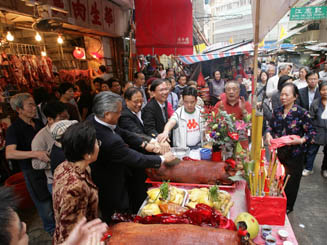 Saved market to
get a facelift - Stallholders at Tai Yuen Street bazaar will give the biggest
outdoor market in Wan Chai a facelift after the Lunar New Year in a bid to turn
it into a popular tourist spot. Saved market to
get a facelift - Stallholders at Tai Yuen Street bazaar will give the biggest
outdoor market in Wan Chai a facelift after the Lunar New Year in a bid to turn
it into a popular tourist spot.
Hong Kong’s total volume of exports increased by 8.5 per
cent in October as compared to the same period last year, latest statistics
released by the Census and Statistics Department (C&SD) on Friday showed.
Hong Kong's long-haul budget airline has been named the
world's leading new airline at the World Travel Awards, the travel industry's
equivalent of the Oscars. The prize was presented to Oasis Hong Kong Airlines at
a gala event at the Turks and Caicos resort islands in the Caribbean. The award
was the result of a vote involving 167,000 travel professionals worldwide,
including more than 110,000 travel agents. Oasis beat AirAsia X, Silverjet,
Virgin America, VivaAerobus and other new airlines. Oasis senior vice-president
Fritz Blayney, on receiving the award, said it was an understatement to say it
was an honor. "We are surrounded by the world's tourism heavyweights here
tonight, and Oasis has been voted by industry professionals as no less than the
best of the best," he said. The budget airline has come a long way since its
first flight last year. It got off to a bad start when its debut flight, from
Hong Kong to London on October 25 last year, was cancelled at the last minute
because it lacked permission to fly over Russia. Nearly 280 passengers onboard
the jumbo jet were sent home or to hotels after being stranded on the tarmac at
Chek Lap Kok airport for more than five hours. The company explained then that
the Russian authorities had suddenly revoked its permission to fly over the
country. By yesterday, the airline had sold more than 360,000 tickets. It has
more than 600 employees.
 China:
Tomson Riviera, the most expensive apartment project on the mainland, has been
ordered to lower its selling prices or turn all the units in the luxury Pudong
development into lease properties.
China:
Tomson Riviera, the most expensive apartment project on the mainland, has been
ordered to lower its selling prices or turn all the units in the luxury Pudong
development into lease properties.
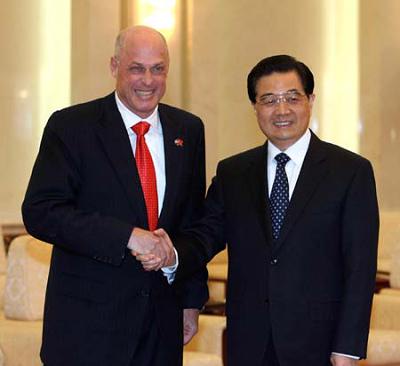 Chinese President Hu Jintao (R) meets with
U.S. Treasury Secretary Henry Paulson in Beijing Dec. 13, 2007. Hu Jintao called
for further cooperation between China and the U.S. as the two countries wound up
two days of economic talks with a slew of agreements in Beijing. Chinese President Hu Jintao (R) meets with
U.S. Treasury Secretary Henry Paulson in Beijing Dec. 13, 2007. Hu Jintao called
for further cooperation between China and the U.S. as the two countries wound up
two days of economic talks with a slew of agreements in Beijing.
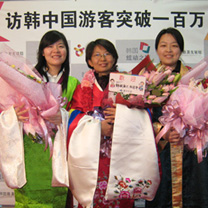 Wang Wei (C), the millionth Chinese to visit South Korea in 2007, poses with two
other Chinese travelers during a ceremony by South Korea to mark the historical
number at the airport of Daegu, December 13, 2007.
Wang Wei (C), the millionth Chinese to visit South Korea in 2007, poses with two
other Chinese travelers during a ceremony by South Korea to mark the historical
number at the airport of Daegu, December 13, 2007.
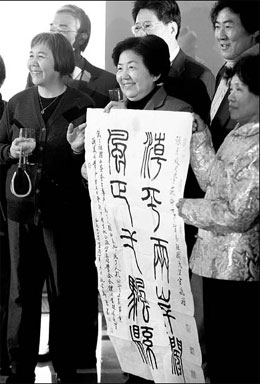 WTO judge vows to fulfill promise of job
- Zhang Yuejiao (center) displays a work of calligraphy - a goodwill scroll -
presented to her by the Western Returned Scholars Association at a press
conference in Beijing yesterday. Zhang has been appointed to the WTO's
seven-member Appellate Body that issues final rulings in trade disputes. The
first Chinese judge in WTO's highest court has vowed to serve the world trade
body impartially and faithfully. Zhang Yuejiao was appointed by the WTO Dispute
Settlement Body (DSB) as a member of Appellate Body last month, and termed her
new posting as a major turning point in her legal career. "I will do my best
with unwavering impartiality," Zhang said yesterday. She will take her seat in
June in the seven-member Appellate Body, which issues final rulings in trade
disputes. "You can rest assured that I will do justice to the post," she said.
The 63-year-old lawyer is at present senior counsel for Jun He Law Offices, one
of China's top law firms, and teaches at Shantou University in Guangdong
Province. Zhang once served as director of the treaty and law department of the
erstwhile Ministry of Foreign Trade and Economic Cooperation (now the Ministry
of Commerce) and in different capacities in the World Bank and the Asian
Development Bank. Her present colleagues describe her as "easy-going but
hard-working". "She looks petite, soft and easy-going, but she has a very
determined will. Once she sets a goal, she will go after it with full force,"
said Zheng Shujun, Partner and Lawyer with Jun He Law Offices. "She gets up as
early as 5 am and works late into night almost everyday, and has been doing that
for the past 19 months to prepare for the post (in the WTO Appellate Body),"
said Zheng, who has known Zhang for more than 10 years. Zhang was "assiduously
studying everything needed for the post (in WTO). She was like a fresh student,
though she was already an authority on the subject", Zheng said. Zhang is a
veteran negotiator and has taken part in China's talks with its trade partners
to settle disputes and for accession into the WTO. Zhang, who pursued law
studies in France and the US, is fluent in English and French. "I was moved and
encouraged by the overwhelming support of the Chinese people both at home and
abroad during my application for the post," she said. "Hence, I cannot afford
not to do a good job. I will strive to bring cheers to Chinese lawyers and
Chinese people." WTO judge vows to fulfill promise of job
- Zhang Yuejiao (center) displays a work of calligraphy - a goodwill scroll -
presented to her by the Western Returned Scholars Association at a press
conference in Beijing yesterday. Zhang has been appointed to the WTO's
seven-member Appellate Body that issues final rulings in trade disputes. The
first Chinese judge in WTO's highest court has vowed to serve the world trade
body impartially and faithfully. Zhang Yuejiao was appointed by the WTO Dispute
Settlement Body (DSB) as a member of Appellate Body last month, and termed her
new posting as a major turning point in her legal career. "I will do my best
with unwavering impartiality," Zhang said yesterday. She will take her seat in
June in the seven-member Appellate Body, which issues final rulings in trade
disputes. "You can rest assured that I will do justice to the post," she said.
The 63-year-old lawyer is at present senior counsel for Jun He Law Offices, one
of China's top law firms, and teaches at Shantou University in Guangdong
Province. Zhang once served as director of the treaty and law department of the
erstwhile Ministry of Foreign Trade and Economic Cooperation (now the Ministry
of Commerce) and in different capacities in the World Bank and the Asian
Development Bank. Her present colleagues describe her as "easy-going but
hard-working". "She looks petite, soft and easy-going, but she has a very
determined will. Once she sets a goal, she will go after it with full force,"
said Zheng Shujun, Partner and Lawyer with Jun He Law Offices. "She gets up as
early as 5 am and works late into night almost everyday, and has been doing that
for the past 19 months to prepare for the post (in the WTO Appellate Body),"
said Zheng, who has known Zhang for more than 10 years. Zhang was "assiduously
studying everything needed for the post (in WTO). She was like a fresh student,
though she was already an authority on the subject", Zheng said. Zhang is a
veteran negotiator and has taken part in China's talks with its trade partners
to settle disputes and for accession into the WTO. Zhang, who pursued law
studies in France and the US, is fluent in English and French. "I was moved and
encouraged by the overwhelming support of the Chinese people both at home and
abroad during my application for the post," she said. "Hence, I cannot afford
not to do a good job. I will strive to bring cheers to Chinese lawyers and
Chinese people."
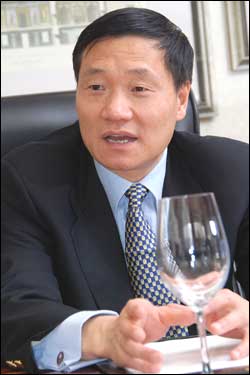 Bank of China (3988), the mainland's largest foreign exchange lender, said it is
steadily cutting down its subprime holdings, although it is only minimally
affected by the global mortgage-related problem. "Our subprime holdings will
definitely be less than its September level by the end of the fourth quarter,"
BOC chairman Xiao Gang told reporters in Hong Kong yesterday. "Our subprime
holdings are decreasing, for few of those investments have matured. The bank is
also selling part of the portfolio during daily trades. "We have only 2.8
percent of our securities investment in collateral debt obligations and subprime
investments as at the end of September. And we do not have any investment in
SIVs [structured investment vehicles] that recently caused another slump among
global big banks." Beijing-based BOC said at its third quarter results
announcement that it has put aside US$470 million (HK$3.67 billion) to cover
potential losses.
Bank of China (3988), the mainland's largest foreign exchange lender, said it is
steadily cutting down its subprime holdings, although it is only minimally
affected by the global mortgage-related problem. "Our subprime holdings will
definitely be less than its September level by the end of the fourth quarter,"
BOC chairman Xiao Gang told reporters in Hong Kong yesterday. "Our subprime
holdings are decreasing, for few of those investments have matured. The bank is
also selling part of the portfolio during daily trades. "We have only 2.8
percent of our securities investment in collateral debt obligations and subprime
investments as at the end of September. And we do not have any investment in
SIVs [structured investment vehicles] that recently caused another slump among
global big banks." Beijing-based BOC said at its third quarter results
announcement that it has put aside US$470 million (HK$3.67 billion) to cover
potential losses.
December 14 - 16, 2007
 Hong Kong:
Hong Kong Exchanges and Clearing Ltd (HKEx), operator of Asia's largest listed
bourse, will launch a mini H-share index next year to monitor Hong Kong-listed
small and medium-sized mainland companies. "As HKEx receives increasingly more
applications from mainland small and medium-sized companies to float shares, we
will launch an additional index to reflect the market performance more
accurately," said Paul Chow, chief executive of HKEx, yesterday. The Mini
H-shares Index (Mini-HHI) Futures will be launched in the second quarter of
2008. One-fifth the size of the H-shares Index (HHI) futures, the Mini-HHI could
provide a trading and hedging tool on H shares for retail customers who have
less risk capital. Some 45 of the exchange's 71 newly listed companies for the
first 11 months are from the mainland, accounting for 59 percent of total market
capitalization in the period. As most large mainland firms have already floated
their shares in Hong Kong, the city's bourse is embracing an influx of smaller
IPO (initial public offering) candidates. Mainland companies listing on the main
board in Hong Kong recorded turnover of HK$7,116 billion, accounting for nearly
47 percent of the total equity turnover, for the 11 months ended on November 30,
according to HKEx. The mini index was "a must" because small and medium-sized
mainland companies' performance provides an economic barometer and they are
major contributors to the country's GDP (gross domestic product), said Baniel
Cheung, a lecturer in business and economics at the University of Hong Kong.
"Large-scale enterprises may lead the development of industries, but it is their
smaller peers who make a significant contribution to the economic development,"
said Cheung. A more systematic monitor is needed, as "H-share companies are now
the leading players of Hong Kong stocks", said Andrew To, a senior analyst at
Taifook Securities. HKEx is one of the largest listed exchanges in the world,
established by the Hang Seng Index in 1969. The company has gradually launched
sub-indexes to classify stocks - a finance index for banks listed in Hong Kong,
a properties index and the H-share index, representing all mainland companies.
HKEx recorded a better-than-expected performance this year. "Funds raised by
initial public offerings so far this year have overtaken the amount recorded
last year, excluding the ICBC's massive IPO last year," Chow said yesterday. Hong Kong:
Hong Kong Exchanges and Clearing Ltd (HKEx), operator of Asia's largest listed
bourse, will launch a mini H-share index next year to monitor Hong Kong-listed
small and medium-sized mainland companies. "As HKEx receives increasingly more
applications from mainland small and medium-sized companies to float shares, we
will launch an additional index to reflect the market performance more
accurately," said Paul Chow, chief executive of HKEx, yesterday. The Mini
H-shares Index (Mini-HHI) Futures will be launched in the second quarter of
2008. One-fifth the size of the H-shares Index (HHI) futures, the Mini-HHI could
provide a trading and hedging tool on H shares for retail customers who have
less risk capital. Some 45 of the exchange's 71 newly listed companies for the
first 11 months are from the mainland, accounting for 59 percent of total market
capitalization in the period. As most large mainland firms have already floated
their shares in Hong Kong, the city's bourse is embracing an influx of smaller
IPO (initial public offering) candidates. Mainland companies listing on the main
board in Hong Kong recorded turnover of HK$7,116 billion, accounting for nearly
47 percent of the total equity turnover, for the 11 months ended on November 30,
according to HKEx. The mini index was "a must" because small and medium-sized
mainland companies' performance provides an economic barometer and they are
major contributors to the country's GDP (gross domestic product), said Baniel
Cheung, a lecturer in business and economics at the University of Hong Kong.
"Large-scale enterprises may lead the development of industries, but it is their
smaller peers who make a significant contribution to the economic development,"
said Cheung. A more systematic monitor is needed, as "H-share companies are now
the leading players of Hong Kong stocks", said Andrew To, a senior analyst at
Taifook Securities. HKEx is one of the largest listed exchanges in the world,
established by the Hang Seng Index in 1969. The company has gradually launched
sub-indexes to classify stocks - a finance index for banks listed in Hong Kong,
a properties index and the H-share index, representing all mainland companies.
HKEx recorded a better-than-expected performance this year. "Funds raised by
initial public offerings so far this year have overtaken the amount recorded
last year, excluding the ICBC's massive IPO last year," Chow said yesterday.
 The central government announced plans to further open its financial markets on
Thursday, saying it would let foreign firms invest again in domestic securities
joint ventures but did not go as far as United States officials wanted.
The central government announced plans to further open its financial markets on
Thursday, saying it would let foreign firms invest again in domestic securities
joint ventures but did not go as far as United States officials wanted.
 Chinese martial art movie star Jet Li (L) talks to CNN anchor Anjali Rao before
the talk show is recorded in Hong Kong, south China, Dec. 12, 2007. Li, starring
in his latest movie Warlords, was interviewed in CNN’s talk show TalkAsia on
Wednesday in Hong Kong.
Chinese martial art movie star Jet Li (L) talks to CNN anchor Anjali Rao before
the talk show is recorded in Hong Kong, south China, Dec. 12, 2007. Li, starring
in his latest movie Warlords, was interviewed in CNN’s talk show TalkAsia on
Wednesday in Hong Kong.
 Hong Kong actress Rosamund Kwan admits that she is retiring from the
entertainment industry at a charity event on Tuesday, Dec. 11, 2007.
Hong Kong actress Rosamund Kwan admits that she is retiring from the
entertainment industry at a charity event on Tuesday, Dec. 11, 2007.
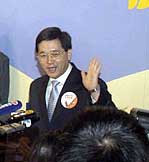 Hong Kong’s
Secretary for Constitutional and Mainland Affairs Stephen Lam Sui-lung on
Thursday defended Chief Executive Donald Tsang Yam-kuen’s 2017 proposal for
universal suffrage, saying there was still room under the Basic Law for more
democracy. This came a day after Mr Tsang had submitted a summarised report to
the central government on the outcome of the green paper public consultation on
constitutional reform earlier this year. Mr Tsang had suggested that a 2017
implementation for universal suffrage would have as good a chance of being
accepted by the majority – even though the general consensus of the public was
for a 2012 deadline. Mr Lam told state media public opinion was not the only
factor at play when Mr Tsang had drafted the report. He said: “In presenting our
report and in taking forward our plans in universal suffrage, we have to take an
overview and that incorporates positions taken by different political parties in
the legislature and district councils and in the different societal sectors.”
However, political analyst Stanley Ho did not agree with Mr Tsang’s stance on
Wednesday. Instead, he said a 2017 implementation was too early, RTHK radio
reported. He rationalised that Hong Kong did not need full democracy as it
already had a “stable society”. Hong Kong’s
Secretary for Constitutional and Mainland Affairs Stephen Lam Sui-lung on
Thursday defended Chief Executive Donald Tsang Yam-kuen’s 2017 proposal for
universal suffrage, saying there was still room under the Basic Law for more
democracy. This came a day after Mr Tsang had submitted a summarised report to
the central government on the outcome of the green paper public consultation on
constitutional reform earlier this year. Mr Tsang had suggested that a 2017
implementation for universal suffrage would have as good a chance of being
accepted by the majority – even though the general consensus of the public was
for a 2012 deadline. Mr Lam told state media public opinion was not the only
factor at play when Mr Tsang had drafted the report. He said: “In presenting our
report and in taking forward our plans in universal suffrage, we have to take an
overview and that incorporates positions taken by different political parties in
the legislature and district councils and in the different societal sectors.”
However, political analyst Stanley Ho did not agree with Mr Tsang’s stance on
Wednesday. Instead, he said a 2017 implementation was too early, RTHK radio
reported. He rationalised that Hong Kong did not need full democracy as it
already had a “stable society”.
Global consumer confidence has dropped but Hong Kong
consumers remain highly optimistic about their job prospects, personal finance
and consumption. The latest Nielsen global consumer confidence report shows the
city's consumer confidence was 5th among 48 world markets. Nielsen interviewed
more than 26,000 global consumers online and found more than a quarter expected
a global recession next year. But more than half of the 500 Hongkongers polled
said they did not believe one would occur. Nielsen executive director of client
solutions Angle Young Wai-suen said the US-based sub-prime credit issue might be
worrying international investors but figures show the local market is very
upbeat. The consumer confidence index is calculated on interviewees' perceptions
of their job prospects, personal finances and willingness to consume. About 61
per cent of local interviewees said they considered now to be a good time to buy
things they wanted or needed in the next year, a sentiment ranking third
worldwide. When asked what they did with disposable income, 58 per cent said
they invested in shares or mutual funds, the highest such percentage in
Asia-Pacific markets. As far as saving, the survey marks the first time since it
began in 2005 that Hongkongers have dropped out of the top 10. Only 57 per cent
of local consumers said they were going to save. Meanwhile, a world leader in
the employment services industry has found employers here remain optimistic
about hiring. Manpower Inc interviewed 811 local employers and nearly 52,000
worldwide in a bid to forecast global hiring intentions for the first quarter.
Figures showed that 27 per cent of local employers expect to increase staffing
over the next three months, and only 2 per cent expect to reduce their
workforce. Most Hong Kong employers (67 per cent) expect no change. "The results
reflect Hong Kong's strong labour market, and the lowest unemployment rate in
nine years - 3.9 per cent," said Lancy Chui, the firm's general manager of Hong
Kong operations. "With the government's promised 10 new infrastructure
improvement projects over the coming five years, sectors such as construction
and real estate should continue to report strong job prospects."
 China:
European aircraft producer Airbus has authorized a Shenzhen company to be its
first maintenance center in Asia. Lufthansa Technik Shenzhen Co. Ltd. (LTS), in
south China's Guangdong Province, will provide repair and overhaul services in
line with Airbus' requirements, according to an agreement signed by the two
companies. The Shenzhen company has started serving Chinese Airbus operators,
helping to cut costs and increase efficiency as they no longer need to send
aircraft parts all the way to Europe for repair. It is also expected to provide
maintenance services to other customers in the Asia-Pacific region.
China:
European aircraft producer Airbus has authorized a Shenzhen company to be its
first maintenance center in Asia. Lufthansa Technik Shenzhen Co. Ltd. (LTS), in
south China's Guangdong Province, will provide repair and overhaul services in
line with Airbus' requirements, according to an agreement signed by the two
companies. The Shenzhen company has started serving Chinese Airbus operators,
helping to cut costs and increase efficiency as they no longer need to send
aircraft parts all the way to Europe for repair. It is also expected to provide
maintenance services to other customers in the Asia-Pacific region.
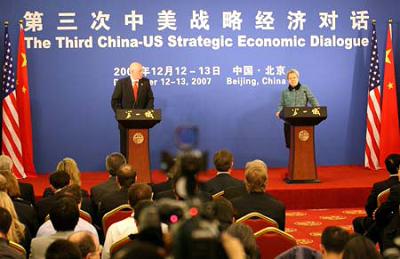 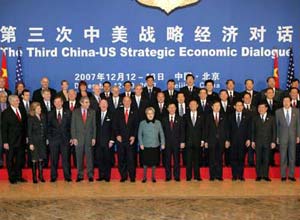 Chinese Vice Premier Wu Yi (R Back) and United States Treasury Secretary Henry
Paulson (L Back) hold a joint news conference after the Third China-U.S.
Strategic Economic Dialogue in Beijing, Dec. 13, 2007. The two-day meeting was
concluded on Thursday. Vice-premier Wu Yi and US Treasury Secretary Henry
Paulson opened the Third China-US Strategic Economic Dialogue in Beijing
yesterday amid rising concerns over food and product safety and protectionist
sentiments.
Chinese Vice Premier Wu Yi (R Back) and United States Treasury Secretary Henry
Paulson (L Back) hold a joint news conference after the Third China-U.S.
Strategic Economic Dialogue in Beijing, Dec. 13, 2007. The two-day meeting was
concluded on Thursday. Vice-premier Wu Yi and US Treasury Secretary Henry
Paulson opened the Third China-US Strategic Economic Dialogue in Beijing
yesterday amid rising concerns over food and product safety and protectionist
sentiments.
Midnight revelers will have a wider
choice of public transport during the 2008 Olympic Games as Beijing is to launch
special bus routes and add seven routes to the 24-hour bus network.
 The Park Hyatt in Shanghai will become the world's tallest hotel once it is
built next July as part of the World Financial Center -- now the tallest
building on the mainland. The hotel, covering the 79th to 93rd floor, will have
174 rooms and suites, each offering views of the Huangpu River. The Grand Hyatt
Shanghai on the 88-storey Jin Mao Tower is currently the world's tallest hotel.
The Park Hyatt in Shanghai will become the world's tallest hotel once it is
built next July as part of the World Financial Center -- now the tallest
building on the mainland. The hotel, covering the 79th to 93rd floor, will have
174 rooms and suites, each offering views of the Huangpu River. The Grand Hyatt
Shanghai on the 88-storey Jin Mao Tower is currently the world's tallest hotel.
Mobile phone users in China sent 429
billion text messages last year, while India added more mobile subscribers in
the year than Britain had in total, as the two countries joined Brazil and
Russia in driving growth in the sector.
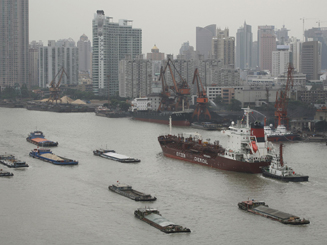 Foreign investors keen to win a slice of prime property in Shanghai have been
locked out of the bidding for two sites enjoying panoramic views of the Huangpu
River, according to market sources. The two pieces of land have a total area of
6.9 hectares and are zoned for mixed development. They are in Shanghai's Luwan
district, a key area for commercial and residential developments. Foreign funds
had expressed interest in the sites to the district government but were told
last week that they would not be allowed to join the bidding. The Luwan district
government could not be reached for comment. The setback for the funds followed
a People's Bank of China (SEHK: 3988) statement last Thursday, pledging to
strengthen liquidity management and improve the yuan exchange rate mechanism.
The pledge was interpreted by economists as a signal for stricter control on
liquidity and loan growth. The decision to bar foreign bidders also came a month
after the central government revised its guidelines on foreign investment in the
property market. Property experts were uncertain whether the specific case in
Luwan district would become a general rule. But they said the restriction was
not unexpected in view of Beijing's determination to contain rising prices in
the property market. Tang Zedong, deputy general manager of Centaline Property
Agency, said he was unaware that foreign investors had been banned from the
bidding for the Luwan sites but the news was not a shock. "I'm not surprised.
The government has been setting up barriers and making it increasingly difficult
for foreign investors to set foot in the property market. "There is a lot of hot
money coming in, betting on the yuan's appreciation and of course the mainland
authorities do not want to see more foreign investments that make excessive
liquidity even more serious." The sites will be the first new releases of
residential land in Shanghai since 2004. David Chen Weir, a senior director at
CB Richard Ellis in Shanghai, described the two pieces of land as "rare" and
said competition would be intense. The sites are among 32 pieces of land
totalling about 178 hectares to be sold between December 21 and 31. It is
understood the other 30 sites have no restrictions on foreign investment. In a
bid to curb the red hot property market, the Shanghai city government announced
in September that it would increase land supply by adding about 450 hectares to
the market by the end of the year, including 50 hectares in the city centre.
Foreign investors have long been under fire from critics on the mainland for
allegedly driving property prices out of the reach of local home-seekers. The
National Development and Reform Commission and the Ministry of Commerce
announced last month a revised Catalogue of Guidelines on Foreign Investment
that took effect this month. The guidelines, first issued by the NDRC in 2004,
classify investment in the country into three categories: "encouraged" or
preferential investments that qualify for incentives; "restricted" or those that
are subject to increased regulation; and "prohibited" or those that are
outlawed. The principal purpose of the new rules was said to be aimed at helping
put foreign direct investment to better use to spur innovation, promote
industrial restructuring and ease regional imbalances. The government said the
rule was intended to encourage investment that would help the mainland protect
its environment, cut pollution and develop renewable energy, as well as in the
technology sector. However, included in the catalogue were changes to
classification of foreign-invested property projects. Missing from the
"encouraged" list in the previous guidelines is foreign investment in new
ordinary residential developments on the mainland, which means these projects
will no longer qualify for incentives.
Foreign investors keen to win a slice of prime property in Shanghai have been
locked out of the bidding for two sites enjoying panoramic views of the Huangpu
River, according to market sources. The two pieces of land have a total area of
6.9 hectares and are zoned for mixed development. They are in Shanghai's Luwan
district, a key area for commercial and residential developments. Foreign funds
had expressed interest in the sites to the district government but were told
last week that they would not be allowed to join the bidding. The Luwan district
government could not be reached for comment. The setback for the funds followed
a People's Bank of China (SEHK: 3988) statement last Thursday, pledging to
strengthen liquidity management and improve the yuan exchange rate mechanism.
The pledge was interpreted by economists as a signal for stricter control on
liquidity and loan growth. The decision to bar foreign bidders also came a month
after the central government revised its guidelines on foreign investment in the
property market. Property experts were uncertain whether the specific case in
Luwan district would become a general rule. But they said the restriction was
not unexpected in view of Beijing's determination to contain rising prices in
the property market. Tang Zedong, deputy general manager of Centaline Property
Agency, said he was unaware that foreign investors had been banned from the
bidding for the Luwan sites but the news was not a shock. "I'm not surprised.
The government has been setting up barriers and making it increasingly difficult
for foreign investors to set foot in the property market. "There is a lot of hot
money coming in, betting on the yuan's appreciation and of course the mainland
authorities do not want to see more foreign investments that make excessive
liquidity even more serious." The sites will be the first new releases of
residential land in Shanghai since 2004. David Chen Weir, a senior director at
CB Richard Ellis in Shanghai, described the two pieces of land as "rare" and
said competition would be intense. The sites are among 32 pieces of land
totalling about 178 hectares to be sold between December 21 and 31. It is
understood the other 30 sites have no restrictions on foreign investment. In a
bid to curb the red hot property market, the Shanghai city government announced
in September that it would increase land supply by adding about 450 hectares to
the market by the end of the year, including 50 hectares in the city centre.
Foreign investors have long been under fire from critics on the mainland for
allegedly driving property prices out of the reach of local home-seekers. The
National Development and Reform Commission and the Ministry of Commerce
announced last month a revised Catalogue of Guidelines on Foreign Investment
that took effect this month. The guidelines, first issued by the NDRC in 2004,
classify investment in the country into three categories: "encouraged" or
preferential investments that qualify for incentives; "restricted" or those that
are subject to increased regulation; and "prohibited" or those that are
outlawed. The principal purpose of the new rules was said to be aimed at helping
put foreign direct investment to better use to spur innovation, promote
industrial restructuring and ease regional imbalances. The government said the
rule was intended to encourage investment that would help the mainland protect
its environment, cut pollution and develop renewable energy, as well as in the
technology sector. However, included in the catalogue were changes to
classification of foreign-invested property projects. Missing from the
"encouraged" list in the previous guidelines is foreign investment in new
ordinary residential developments on the mainland, which means these projects
will no longer qualify for incentives.
December 13, 2007
 Hong Kong:
Hong Kong
banks have followed the US Federal Reserve and lowered their prime interest
rates by 25 basis points - their fourth cut this year and the third in less than
two months. The worst of the US subprime mortgage debacle is yet to come, which
will cause the local bourse to be "very volatile" in the short term, Hong Kong
Monetary Authority chief executive Joseph Yam Chi-kwong warned yesterday. Hong Kong:
Hong Kong
banks have followed the US Federal Reserve and lowered their prime interest
rates by 25 basis points - their fourth cut this year and the third in less than
two months. The worst of the US subprime mortgage debacle is yet to come, which
will cause the local bourse to be "very volatile" in the short term, Hong Kong
Monetary Authority chief executive Joseph Yam Chi-kwong warned yesterday.
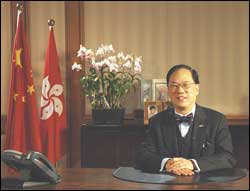 Universal suffrage in 2017 is the
expected timetable Beijing will have to decide on following Chief Executive
Donald Tsang Yam-kuen's submission of a long-awaited report on democratic
reform. In concluding his report - described as "utterly disappointing" by pan-
democrats - Tsang said setting the timetable for implementing universal suffrage
for chief executive and the Legislative Council "can help promote the ultimate
resolution of the issues involved." To this end, the 176-strong Standing
Committee of the National People's Congress will discuss at its bi-monthly
meeting Tsang's 18-paragraph report and recommendations from December 17-29. In
an official report to top legislator Wu Bangguo, Tsang stated that Hong Kong
people are getting more pragmatic and rational, as they eagerly await a
timetable for universal suffrage, which would help set the course for the city's
constitutional development and end political squabbling. "Implementing universal
suffrage for CE first in 2012 is the expectation of more than half of the
public, as reflected in the opinion polls," Tsang said. "This expectation should
be taken seriously and given consideration." Universal suffrage in 2017 is the
expected timetable Beijing will have to decide on following Chief Executive
Donald Tsang Yam-kuen's submission of a long-awaited report on democratic
reform. In concluding his report - described as "utterly disappointing" by pan-
democrats - Tsang said setting the timetable for implementing universal suffrage
for chief executive and the Legislative Council "can help promote the ultimate
resolution of the issues involved." To this end, the 176-strong Standing
Committee of the National People's Congress will discuss at its bi-monthly
meeting Tsang's 18-paragraph report and recommendations from December 17-29. In
an official report to top legislator Wu Bangguo, Tsang stated that Hong Kong
people are getting more pragmatic and rational, as they eagerly await a
timetable for universal suffrage, which would help set the course for the city's
constitutional development and end political squabbling. "Implementing universal
suffrage for CE first in 2012 is the expectation of more than half of the
public, as reflected in the opinion polls," Tsang said. "This expectation should
be taken seriously and given consideration."
Hong Kong
people are more than willing to spend their spare money on investing in the
stock market and mutual funds, while the territory's consumer confidence is
still at historical highs, a global online survey has found.
 China:
Chinese will soon be able to travel to the United States on tourist visas,
according to an agreement signed in Beijing yesterday. The memorandum of
understanding (MOU) signed between the two countries to facilitate outbound
tourist group travel grants the US Approved Destination Status (ADS) after years
of negotiations, making it the 134th country on China's list. Chinese travelers
will be able to travel in groups as early as in spring. Currently, the US issues
only business travel visas. The China National Tourism Administration (CNTA)
said the agreement will, apart from invigorating the tourism industry, provide a
strong impetus to bilateral ties in such sectors as the economy, trade and
culture. "The agreement will open a large and growing market for the US travel
and tourism industry," US Commerce Secretary Carlos Gutierrez said yesterday.
The US Department of Commerce forecast that the number of Chinese visitors would
reach 579,000 annually by 2011, up from 320,000 last year. "We are very excited.
We have been waiting for this day to come, and it came sooner than we thought,"
said Jamie Y. Lee, chief representative of the Los Angeles Convention and
Visitors Bureau, the first city-level tourism office established in China. More
US states and cities will likely open offices in China to promote tourism, she
said. According to the MOU, one of the 14 agreements and memoranda signed during
the 18th China-US Joint Commission on Commerce and Trade, US destinations will
get the green light to market themselves in China. The MOU may be terminated
only when significant numbers of group travelers overstay in the US, the
Department of Commerce said. Previously, the worry hindered tourism
negotiations, said Li Xinjian, a senior researcher at the school of tourism
management affiliated to Beijing International Studies University. But the
increase in the number of Chinese outbound tourists and their rising spending
power have made the opening of the US market inevitable. In the past five years,
China has overtaken Japan to become the largest source of outbound travelers in
Asia. Statistics from the US Department of Commerce indicate that the United
States attracted 320,000 Chinese travelers in 2006, up 19 percent from the
previous year. Total spending by the Chinese travelers there added up to $2.07
billion last year, up 35 percent year-on-year. The expenditure included
accommodation, communications, tickets to tourist spots and shopping. "It is
much higher than the average expenditure of Chinese travelers in other countries
and regions," Li said. CNTA figures for 2006 showed that the average Chinese
traveler spent $735, compared with more than $6,400 in the US. In the long run,
tourists' spending will continue to grow, along with the increase in incomes, Li
forecast. The MOU is also good news for the domestic tourism industry. "The US
is an important destination with huge market potential for us," said Dun Jidong,
marketing director of the China Travel Service's overseas tourism department.
Before yesterday's agreement, the US and Canada were the last two major tourism
destinations that were closed to Chinese tour groups.
China:
Chinese will soon be able to travel to the United States on tourist visas,
according to an agreement signed in Beijing yesterday. The memorandum of
understanding (MOU) signed between the two countries to facilitate outbound
tourist group travel grants the US Approved Destination Status (ADS) after years
of negotiations, making it the 134th country on China's list. Chinese travelers
will be able to travel in groups as early as in spring. Currently, the US issues
only business travel visas. The China National Tourism Administration (CNTA)
said the agreement will, apart from invigorating the tourism industry, provide a
strong impetus to bilateral ties in such sectors as the economy, trade and
culture. "The agreement will open a large and growing market for the US travel
and tourism industry," US Commerce Secretary Carlos Gutierrez said yesterday.
The US Department of Commerce forecast that the number of Chinese visitors would
reach 579,000 annually by 2011, up from 320,000 last year. "We are very excited.
We have been waiting for this day to come, and it came sooner than we thought,"
said Jamie Y. Lee, chief representative of the Los Angeles Convention and
Visitors Bureau, the first city-level tourism office established in China. More
US states and cities will likely open offices in China to promote tourism, she
said. According to the MOU, one of the 14 agreements and memoranda signed during
the 18th China-US Joint Commission on Commerce and Trade, US destinations will
get the green light to market themselves in China. The MOU may be terminated
only when significant numbers of group travelers overstay in the US, the
Department of Commerce said. Previously, the worry hindered tourism
negotiations, said Li Xinjian, a senior researcher at the school of tourism
management affiliated to Beijing International Studies University. But the
increase in the number of Chinese outbound tourists and their rising spending
power have made the opening of the US market inevitable. In the past five years,
China has overtaken Japan to become the largest source of outbound travelers in
Asia. Statistics from the US Department of Commerce indicate that the United
States attracted 320,000 Chinese travelers in 2006, up 19 percent from the
previous year. Total spending by the Chinese travelers there added up to $2.07
billion last year, up 35 percent year-on-year. The expenditure included
accommodation, communications, tickets to tourist spots and shopping. "It is
much higher than the average expenditure of Chinese travelers in other countries
and regions," Li said. CNTA figures for 2006 showed that the average Chinese
traveler spent $735, compared with more than $6,400 in the US. In the long run,
tourists' spending will continue to grow, along with the increase in incomes, Li
forecast. The MOU is also good news for the domestic tourism industry. "The US
is an important destination with huge market potential for us," said Dun Jidong,
marketing director of the China Travel Service's overseas tourism department.
Before yesterday's agreement, the US and Canada were the last two major tourism
destinations that were closed to Chinese tour groups.
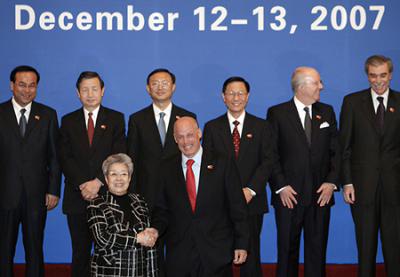 US Treasury Secretary Henry Paulson
shakes hands with Chinese Vice-Premier Wu Yi (L) during the opening of The Third
Strategic Economic Dialogue in Xianghe, near Beijing, December 12, 2007.
China told the United States
yesterday to fix its own economic problems rather than deliver lectures, as the
two sides warned at top-level talks here that protectionism threatened their
trade ties. US Treasury Secretary Henry Paulson
shakes hands with Chinese Vice-Premier Wu Yi (L) during the opening of The Third
Strategic Economic Dialogue in Xianghe, near Beijing, December 12, 2007.
China told the United States
yesterday to fix its own economic problems rather than deliver lectures, as the
two sides warned at top-level talks here that protectionism threatened their
trade ties.
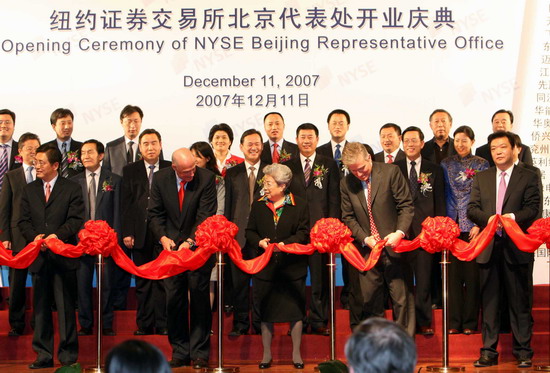 Vice Premier Wu Yi and US Treasury
Secretary Paulson cut ribbons for the launch of the New York Stock Exchange's
Beijing office yesterday. Vice Premier Wu Yi and US Treasury
Secretary Paulson cut ribbons for the launch of the New York Stock Exchange's
Beijing office yesterday.
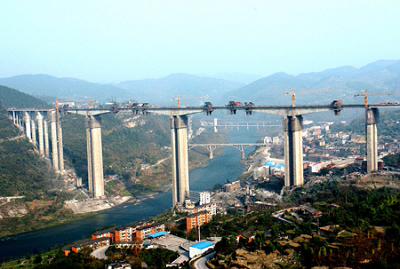 The Wujiang Mega Bridge is seen
under construction over the Wujiang River near Guiyang, Southwest China’s
Guizhou Province, Dec. 11, 2007. The tallest pier of the 1,452-meter-long bridge
stands 173.5 meters high, and the bridge will open to traffic before the new
year. The Wujiang Mega Bridge is seen
under construction over the Wujiang River near Guiyang, Southwest China’s
Guizhou Province, Dec. 11, 2007. The tallest pier of the 1,452-meter-long bridge
stands 173.5 meters high, and the bridge will open to traffic before the new
year.
China's central bank governor, Zhou
Xiaochuan, said on Wednesday that surging domestic consumer prices and recent
U.S. interest rate cuts would have "considerable influence" over Chinese
monetary policy. Chinese Vice Commerce Minister Chen Deming said here Wednesday
that if the Renminbi, China's currency, appreciated too rapidly, it would cause
fluctuations in the Chinese economy that would not be positive for the world.
Air China and Shanghai Airlines joined the Star Alliance, the oldest and largest
airline alliance in the world, on Wednesday.
There was a ceremony held in the new Terminal Three, which will open to
passengers in March 2008, at the Beijing Capital International Airport. With the
two new members, Star Alliance has 19 member carriers operating 17,000 daily
flights to 897 destinations in 160 countries. Air China and Shanghai Airlines
have added more than 40 new domestic destinations to the network. Air China
chairman Li Jiaxiang said, "By becoming a member, Air China is set to undergo
many years of strategic cooperation with a large group of the world's leading
airlines." Shanghai Airlines chairman Zhou Chi said they were very excited since
"Shanghai Airlines can reach more places around the world and deliver higher
quality services and more rewards to its customers." In order to provide better
interconnection between international flights and domestic destinations in
China, Air China, Shanghai Airlines and other Star Alliance member carriers are
working together to improve the two key airports in China -- Beijing Capital
International Airport and Shanghai Pudong Airport. Terminal Two in Shanghai
Pudong Airport will also open in March2008 and permit all Star Alliance members
to operate from the new terminal.
The China Film Group Corporation (CFGC)
Wednesday denied a New York Times report that alleged China had stopped granting
permission to US films to be screened in cinemas on the mainland.
 China's actress Tang Wei (R) smiles after winning Best New Performer for "Lust,
Caution" at the 44th Golden Horse Awards in Taipei December 8, 2007. Watching
are actress Isabella Leong and South Korean actor Lee Joon-ki (L).
China's actress Tang Wei (R) smiles after winning Best New Performer for "Lust,
Caution" at the 44th Golden Horse Awards in Taipei December 8, 2007. Watching
are actress Isabella Leong and South Korean actor Lee Joon-ki (L).
December 10 - 12, 2007
 Hong Kong:
More than 70 percent of Hong Kong households have a personal computer connected
to the Internet, strengthening the city's status as one of the world's leading
digital hubs, an official survey released Thursday indicated. Hong Kong's Census
and Statistics Department said that the figure represents a slight rise on last
year when 71.7 percent of households had a computer and 67.1 percent had it
connected to the Internet. The survey conducted in mid-2007 found 1,671,600
households, or74.2 percent of all domestic premises in Hong Kong, had a personal
computer. Of them, 94.5 percent had their computers connected to the Internet,
representing 70.1 percent of the city's households. About 66.4 percent of people
aged 10 and over had used personal computers at least once and 64.8 percent had
used the Internet. Utilization of electronic business services in the city was
also high. About 98.2 percent of people aged 15 and over had used electronic
business services, a slight rise on last year's 97.4 percent. About 10.1 percent
of that age group had used on-line purchasing services, according to the survey. Hong Kong:
More than 70 percent of Hong Kong households have a personal computer connected
to the Internet, strengthening the city's status as one of the world's leading
digital hubs, an official survey released Thursday indicated. Hong Kong's Census
and Statistics Department said that the figure represents a slight rise on last
year when 71.7 percent of households had a computer and 67.1 percent had it
connected to the Internet. The survey conducted in mid-2007 found 1,671,600
households, or74.2 percent of all domestic premises in Hong Kong, had a personal
computer. Of them, 94.5 percent had their computers connected to the Internet,
representing 70.1 percent of the city's households. About 66.4 percent of people
aged 10 and over had used personal computers at least once and 64.8 percent had
used the Internet. Utilization of electronic business services in the city was
also high. About 98.2 percent of people aged 15 and over had used electronic
business services, a slight rise on last year's 97.4 percent. About 10.1 percent
of that age group had used on-line purchasing services, according to the survey.
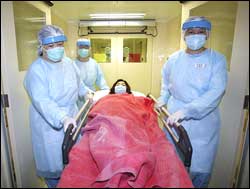 Crying out for nurses - Public and private hospitals are raising their stakes to
attract senior nurses in the face of a worsening shortage of frontline medical
staff in Hong Kong. At the launch of its mass recruitment exercise today, the
Hospital Authority will offer better salaries to experienced nurses. The
authority will replace its old pay scale that was based on a system of so-called
entry points and flat rates for both full- and part-time nursing posts with a
more flexible scale based on experience. Under the new arrangements, part- time
nurses will be paid between HK$99 and HK$215 an hour, depending on the work
shifts and their clinical experience. This compares with the old flat rates for
normal, non- standard and night shifts of HK$114, HK$134 and HK$154 an hour,
respectively. Salaries for full-time posts will be determined by clinical
experience instead of seniority within the authority, Housing Authority chief
manager (nursing) Susie Lum Shun-sui said. Private nurses are paid at least 10
percent more than their peers in the public sector. To bring remuneration in
line, starting salaries for senior matrons and nursing managers at public
hospitals have been raised to almost HK$60,000, up from nearly HK$48,000, and to
more than HK$87,000 for a hospital cluster chief manager, up from HK$62,000. Lum
told The Standard the authority was alarmed by the higher-than- expected
turnover rate, which rose to about 4 percent this year compared with the usual
rate of 3 percent. Some public nurses have joined the private sector, while
others have been recruited overseas or have left the profession altogether. The
Hospital Authority, Hong Kong's biggest employer of medical workers, has 19,000
nurses. Lum said the authority does not have a quota for new recruits, but hoped
it could attract at least 300 full- and part- time nurses at its first
recruitment fair. The authority also could not say how much more would be spent
on salaries after the adjustment. It normally advertises jobs in newspapers or
internally, but Lum believes the high-profile jobs fair will reach out to more
career seekers. "We will take as many recruits as possible," she said. "The more
the better." But the recruitment exercise has raised concern among private
hospitals that some senior nurses will be siphoned off by their public rivals.
Hong Kong Private Hospitals Association chairman Alan Lau Kwok- lam said the
shortage of nurses is acute across the whole medical sector as some had been
hired by private elderly homes and elderly centers run by agencies. Lau said
private hospitals have been offering attractive packages to appeal to both new
graduates and senior nurses. Kwong Kwok-hay, deputy medical superintendent of
Hong Kong Sanatorium and Hospital, does not rule out the authority's recruitment
putting pressure on private hospitals to improve pay and conditions for their
staff. "We will monitor the situation very carefully," Kwong said. The deputy
medical superintendent said the Hong Kong Sanatorium and Hospital had offered
both bonus and double pay for nurses since last year amid the fierce manpower
shortage. However, a spokeswoman for the Association of Hong Kong Nursing Staff
said some former Hospital Authority staff had become so fed up with the large
workload and poor working conditions in public hospitals that they were unlikely
to return. One former public nurse, who did not wish to be named, moved to a
private hospital a year ago after working a decade in public hospitals. She said
she would not be lured back by the authority's new package as it would not be
able to compensate for the heavy workload and stress from working in public
hospitals.
Crying out for nurses - Public and private hospitals are raising their stakes to
attract senior nurses in the face of a worsening shortage of frontline medical
staff in Hong Kong. At the launch of its mass recruitment exercise today, the
Hospital Authority will offer better salaries to experienced nurses. The
authority will replace its old pay scale that was based on a system of so-called
entry points and flat rates for both full- and part-time nursing posts with a
more flexible scale based on experience. Under the new arrangements, part- time
nurses will be paid between HK$99 and HK$215 an hour, depending on the work
shifts and their clinical experience. This compares with the old flat rates for
normal, non- standard and night shifts of HK$114, HK$134 and HK$154 an hour,
respectively. Salaries for full-time posts will be determined by clinical
experience instead of seniority within the authority, Housing Authority chief
manager (nursing) Susie Lum Shun-sui said. Private nurses are paid at least 10
percent more than their peers in the public sector. To bring remuneration in
line, starting salaries for senior matrons and nursing managers at public
hospitals have been raised to almost HK$60,000, up from nearly HK$48,000, and to
more than HK$87,000 for a hospital cluster chief manager, up from HK$62,000. Lum
told The Standard the authority was alarmed by the higher-than- expected
turnover rate, which rose to about 4 percent this year compared with the usual
rate of 3 percent. Some public nurses have joined the private sector, while
others have been recruited overseas or have left the profession altogether. The
Hospital Authority, Hong Kong's biggest employer of medical workers, has 19,000
nurses. Lum said the authority does not have a quota for new recruits, but hoped
it could attract at least 300 full- and part- time nurses at its first
recruitment fair. The authority also could not say how much more would be spent
on salaries after the adjustment. It normally advertises jobs in newspapers or
internally, but Lum believes the high-profile jobs fair will reach out to more
career seekers. "We will take as many recruits as possible," she said. "The more
the better." But the recruitment exercise has raised concern among private
hospitals that some senior nurses will be siphoned off by their public rivals.
Hong Kong Private Hospitals Association chairman Alan Lau Kwok- lam said the
shortage of nurses is acute across the whole medical sector as some had been
hired by private elderly homes and elderly centers run by agencies. Lau said
private hospitals have been offering attractive packages to appeal to both new
graduates and senior nurses. Kwong Kwok-hay, deputy medical superintendent of
Hong Kong Sanatorium and Hospital, does not rule out the authority's recruitment
putting pressure on private hospitals to improve pay and conditions for their
staff. "We will monitor the situation very carefully," Kwong said. The deputy
medical superintendent said the Hong Kong Sanatorium and Hospital had offered
both bonus and double pay for nurses since last year amid the fierce manpower
shortage. However, a spokeswoman for the Association of Hong Kong Nursing Staff
said some former Hospital Authority staff had become so fed up with the large
workload and poor working conditions in public hospitals that they were unlikely
to return. One former public nurse, who did not wish to be named, moved to a
private hospital a year ago after working a decade in public hospitals. She said
she would not be lured back by the authority's new package as it would not be
able to compensate for the heavy workload and stress from working in public
hospitals.
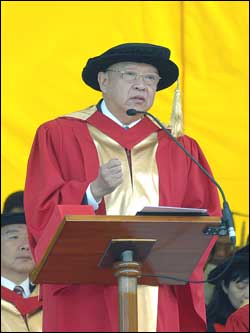 Tung wins his freedom of speech - Former
chief executive Tung Chee-hwa yesterday faced down a group of protesting Chinese
University students - and won his right to freedom of speech. He was conferred
with an honorary doctorate degree by the university - an award disputed by the
students, who described it as an act of "fawning on Tung" by vice chancellor
Lawrence Lau Chun- yee. The students also want Lau to step down. The protesters
shouted, whistled and chanted slogans during the ceremony. Some tried to enter
the congregation venue but were stopped by security guards. Just as Tung began
to deliver his acceptance speech in Putonghua, he had to switch to Cantonese to
ask the students to respect the big day of graduates and their parents. He also
told them that he would meet them afterwards. "Today is the happiest day for
parents but now, can you give me a chance and freedom to finish my speech?" Tung
said. The audience of parents and students clapped when they heard these words.
Among the protesters was lawmaker "Long Hair" Leung Kwok-hung, of the League of
Social Democrats, who sat on the floor as a protest against Tung's policy over
parents seeking right of abode for their mainland-born children when he was a
chief executive. Leung was barred from going up to the stage and was asked to
leave. Students' Union chairman Napoleon Wong Weng-chi said the protest was
meant to demonstrate against university head Lau, rather than Tung. Lau said the
decision on Tung's doctorate degree was not made by one person, but by the board
of the university. Tung wins his freedom of speech - Former
chief executive Tung Chee-hwa yesterday faced down a group of protesting Chinese
University students - and won his right to freedom of speech. He was conferred
with an honorary doctorate degree by the university - an award disputed by the
students, who described it as an act of "fawning on Tung" by vice chancellor
Lawrence Lau Chun- yee. The students also want Lau to step down. The protesters
shouted, whistled and chanted slogans during the ceremony. Some tried to enter
the congregation venue but were stopped by security guards. Just as Tung began
to deliver his acceptance speech in Putonghua, he had to switch to Cantonese to
ask the students to respect the big day of graduates and their parents. He also
told them that he would meet them afterwards. "Today is the happiest day for
parents but now, can you give me a chance and freedom to finish my speech?" Tung
said. The audience of parents and students clapped when they heard these words.
Among the protesters was lawmaker "Long Hair" Leung Kwok-hung, of the League of
Social Democrats, who sat on the floor as a protest against Tung's policy over
parents seeking right of abode for their mainland-born children when he was a
chief executive. Leung was barred from going up to the stage and was asked to
leave. Students' Union chairman Napoleon Wong Weng-chi said the protest was
meant to demonstrate against university head Lau, rather than Tung. Lau said the
decision on Tung's doctorate degree was not made by one person, but by the board
of the university.
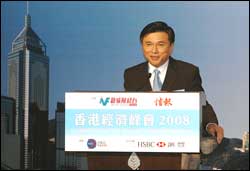 Hong Kong's economic growth will moderate
next year, dampened by the US subprime mess and a moderate slowdown in the
mainland, according to Secretary of Financial Services and the Treasury Ceajer
Chan Ka-keung. However, the economy will maintain its momentum, he said. Chan
expects the economy this year will have expanded by 6 percent. The economy grew
6.2 percent in the third quarter, moderating from the 6.6 percent growth in the
second quarter, as exports dropped amid slowing demand in the United States.
Speaking at an economic summit yesterday, Chan said that China's pledge to
tighten its monetary policy in 2008 was aimed at avoiding economic overheating.
He said the move will be beneficial to both Hong Kong and China. Beijing
announced on Wednesday that it will shift to "tight" monetary policy next year,
which some analysts said could have a major significance to the mainland
economy. George Leung Siu-kay, Asia-Pacific adviser on strategy and economics at
HSBC, said the policy shift can help avoid an asset bubble and pave the way for
balanced economic development in China. Leung said the Hong Kong economy will
grow by more than 5 percent next year, while inflation will rise to 4 percent.
He added that the Hong Kong asset market will benefit from a negative real
interest rate next year, with rising inflation and falling interest rates. But
the city will not experience an asset price bubble similar to the one seen in
1997, as next year's negative real interest rate will be less than 1 percent,
compared to the 2 to 3 percent seen in 1997, he said. Interest rates are falling
as local banks follow US interest rate movements, due to the city's currency
link to the US dollar. Leung expects Hong Kong to record a HK$80 billion surplus
this year, exceeding the financial secretary's October projection of HK$50
billion. Hong Kong's economic growth will moderate
next year, dampened by the US subprime mess and a moderate slowdown in the
mainland, according to Secretary of Financial Services and the Treasury Ceajer
Chan Ka-keung. However, the economy will maintain its momentum, he said. Chan
expects the economy this year will have expanded by 6 percent. The economy grew
6.2 percent in the third quarter, moderating from the 6.6 percent growth in the
second quarter, as exports dropped amid slowing demand in the United States.
Speaking at an economic summit yesterday, Chan said that China's pledge to
tighten its monetary policy in 2008 was aimed at avoiding economic overheating.
He said the move will be beneficial to both Hong Kong and China. Beijing
announced on Wednesday that it will shift to "tight" monetary policy next year,
which some analysts said could have a major significance to the mainland
economy. George Leung Siu-kay, Asia-Pacific adviser on strategy and economics at
HSBC, said the policy shift can help avoid an asset bubble and pave the way for
balanced economic development in China. Leung said the Hong Kong economy will
grow by more than 5 percent next year, while inflation will rise to 4 percent.
He added that the Hong Kong asset market will benefit from a negative real
interest rate next year, with rising inflation and falling interest rates. But
the city will not experience an asset price bubble similar to the one seen in
1997, as next year's negative real interest rate will be less than 1 percent,
compared to the 2 to 3 percent seen in 1997, he said. Interest rates are falling
as local banks follow US interest rate movements, due to the city's currency
link to the US dollar. Leung expects Hong Kong to record a HK$80 billion surplus
this year, exceeding the financial secretary's October projection of HK$50
billion.
Mainland fund companies with
qualified domestic institutional investor (QDII) qualification may be the first
to get regulatory permission to set up branches in Hong Kong.
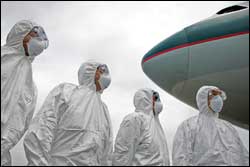 The government will push ahead with a
new law giving the health chief draconian powers during outbreaks of disease or
other health emergencies. Under the proposed Prevention and Control of Disease
Bill, to be gazetted tomorrow, the director of health will be empowered to seize
any object believed to be an infectious agent and also to detain suspected
disease carriers for isolation, quarantine or medical surveillance. Officials
can also arrest people who escape from medical detention. The announcement comes
after a 24-year-old man died in the mainland from avian flu on Sunday with no
known contact with infected or dead poultry. Under the new law, the government
can also demand access to information about the diseases, even patients' details
from doctors. It also has the power to requisition private property with
compensation in the case of a public health emergency. It means that the
government can requisition any private assets from properties, transport, basic
necessities, vaccines, protective gear and drugs. Research laboratories will
also have to surrender their specimens on government orders. These powers will
also be extended to the airport and all border checkpoints. Travelers may be
required to make health declarations, show proof of vaccination or even be
subject to medical examination. Deputy Secretary for Food and Health Patrick Nip
Tak-kuen said any such powers would be exercised only in a full public health
emergency. Officials would also have to apply for court orders to exercise any
of these powers if the measures infringe on human rights and freedom. "Such
powers would be exercised only in the most extreme situation and would not
affect daily life [outside of emergencies]," Nip said. Thomas Tsang Ho-fai,
controller of the Centre for Health Protection, said similar contingency
measures had already been enacted through administrative rules during the SARS
outbreak four years ago. Putting them into a legal framework would help the
government cope with any new emergency and disease outbreak more efficiently and
speedily, Tsang explained. The number of notifiable diseases will also increase
from 31 to 45. However, the bill is set to face challenges from lawmakers when
it is submitted to Legislative council for first and second readings on December
19. Some legislators expressed concern over the scope and severity of the
powers. Independent legislator Albert Chan Wai-yip said that he did not see the
justification for the government to put such powers into law while they could be
done by means of administrative measures. "It would be dangerous if the
government is given absolute legal power, especially over detention of people
and seizure of private property, Chan said. Richard Tsoi Yiu-cheong, member of
Hong Kong Human Rights Commission, raised serious concern over possible
infringement of basic human rights. The government will push ahead with a
new law giving the health chief draconian powers during outbreaks of disease or
other health emergencies. Under the proposed Prevention and Control of Disease
Bill, to be gazetted tomorrow, the director of health will be empowered to seize
any object believed to be an infectious agent and also to detain suspected
disease carriers for isolation, quarantine or medical surveillance. Officials
can also arrest people who escape from medical detention. The announcement comes
after a 24-year-old man died in the mainland from avian flu on Sunday with no
known contact with infected or dead poultry. Under the new law, the government
can also demand access to information about the diseases, even patients' details
from doctors. It also has the power to requisition private property with
compensation in the case of a public health emergency. It means that the
government can requisition any private assets from properties, transport, basic
necessities, vaccines, protective gear and drugs. Research laboratories will
also have to surrender their specimens on government orders. These powers will
also be extended to the airport and all border checkpoints. Travelers may be
required to make health declarations, show proof of vaccination or even be
subject to medical examination. Deputy Secretary for Food and Health Patrick Nip
Tak-kuen said any such powers would be exercised only in a full public health
emergency. Officials would also have to apply for court orders to exercise any
of these powers if the measures infringe on human rights and freedom. "Such
powers would be exercised only in the most extreme situation and would not
affect daily life [outside of emergencies]," Nip said. Thomas Tsang Ho-fai,
controller of the Centre for Health Protection, said similar contingency
measures had already been enacted through administrative rules during the SARS
outbreak four years ago. Putting them into a legal framework would help the
government cope with any new emergency and disease outbreak more efficiently and
speedily, Tsang explained. The number of notifiable diseases will also increase
from 31 to 45. However, the bill is set to face challenges from lawmakers when
it is submitted to Legislative council for first and second readings on December
19. Some legislators expressed concern over the scope and severity of the
powers. Independent legislator Albert Chan Wai-yip said that he did not see the
justification for the government to put such powers into law while they could be
done by means of administrative measures. "It would be dangerous if the
government is given absolute legal power, especially over detention of people
and seizure of private property, Chan said. Richard Tsoi Yiu-cheong, member of
Hong Kong Human Rights Commission, raised serious concern over possible
infringement of basic human rights.
 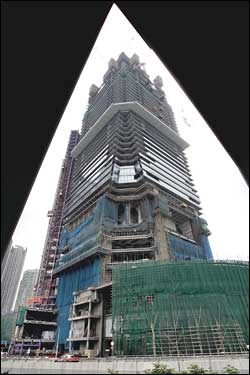 Another investment bank has been drawn away from Central
to International Commerce Centre in West Kowloon - a move analysts believe will
trigger even more financial houses to go across the harbor because of more
attractive rents there. ICC's developer Sun Hung Kai Properties (0016) and
Credit Suisse said the bank will take up the top 10 floors of the office tower
atop MTR Kowloon station. Credit Suisse will take up some 300,000 square feet,
an expansion of the bank's Hong Kong office by 40 percent to house a
2,000-strong staff. Support departments will move from Exchange Square to the
ICC in the second half of next year. The relocation will be completed by 2011.
ICC has signed leases for 60 percent of the building's 2.5 million sq ft total
floor area, said Victor Lui Ting, Sun Hung Kai Real Estate Agency managing
director. Credit Suisse followed Morgan Stanley, who signed a lease for 350,000
sq ft in the lower floors of what would be Hong Kong's tallest building.
"Because of successful leasing results, we will raise rents in phase 2 by 10
percent from the current HK$42 psf," Lui said. DTZ Debenham Tie Leung business
space director Alan Yuen Chun-yin expects more companies to relocate to ICC. The
firm is currently talking to a few major financial institutions. Despite the
rent hike, Yuen said it is still attractive compared to Central. ICC and
International Finance Centre in Central have been built according to the same
specifications. Both have been co-developed by SHKP. According to Jones Lang
LaSalle, prime offices rentals in Central rose 6.7 percent last quarter,
chalking up a 21 percent surge so far this year. Spot rents in IFC and Exchange
Square hit HK$176 per sq ft, and HK$120 psf respectively. Financial firms like
Morgan Stanley and Credit Suisse have offices scattered around Central. It is
impossible to get all their staff under one roof in the core business area due
to a lack of space. "As vacancy rates in Central dive below 2 percent, ICC
represents a very good alternative for major tenants keen to expand and
consolidate," said Chris Marriott, deputy managing director and head of leasing
at Savills Hong Kong. But analysts had mixed reactions as to whether ICC will
make an impact on rents in Central. Lehman brothers said ICC and One Island East
in Quarry Bay coming on stream will create a cap for Central rents, while Yuen
and Marriott said the effect would be small and gradual. Lui expects the pace of
rent hikes in Central to ease by about 10 percent next year.
Another investment bank has been drawn away from Central
to International Commerce Centre in West Kowloon - a move analysts believe will
trigger even more financial houses to go across the harbor because of more
attractive rents there. ICC's developer Sun Hung Kai Properties (0016) and
Credit Suisse said the bank will take up the top 10 floors of the office tower
atop MTR Kowloon station. Credit Suisse will take up some 300,000 square feet,
an expansion of the bank's Hong Kong office by 40 percent to house a
2,000-strong staff. Support departments will move from Exchange Square to the
ICC in the second half of next year. The relocation will be completed by 2011.
ICC has signed leases for 60 percent of the building's 2.5 million sq ft total
floor area, said Victor Lui Ting, Sun Hung Kai Real Estate Agency managing
director. Credit Suisse followed Morgan Stanley, who signed a lease for 350,000
sq ft in the lower floors of what would be Hong Kong's tallest building.
"Because of successful leasing results, we will raise rents in phase 2 by 10
percent from the current HK$42 psf," Lui said. DTZ Debenham Tie Leung business
space director Alan Yuen Chun-yin expects more companies to relocate to ICC. The
firm is currently talking to a few major financial institutions. Despite the
rent hike, Yuen said it is still attractive compared to Central. ICC and
International Finance Centre in Central have been built according to the same
specifications. Both have been co-developed by SHKP. According to Jones Lang
LaSalle, prime offices rentals in Central rose 6.7 percent last quarter,
chalking up a 21 percent surge so far this year. Spot rents in IFC and Exchange
Square hit HK$176 per sq ft, and HK$120 psf respectively. Financial firms like
Morgan Stanley and Credit Suisse have offices scattered around Central. It is
impossible to get all their staff under one roof in the core business area due
to a lack of space. "As vacancy rates in Central dive below 2 percent, ICC
represents a very good alternative for major tenants keen to expand and
consolidate," said Chris Marriott, deputy managing director and head of leasing
at Savills Hong Kong. But analysts had mixed reactions as to whether ICC will
make an impact on rents in Central. Lehman brothers said ICC and One Island East
in Quarry Bay coming on stream will create a cap for Central rents, while Yuen
and Marriott said the effect would be small and gradual. Lui expects the pace of
rent hikes in Central to ease by about 10 percent next year.
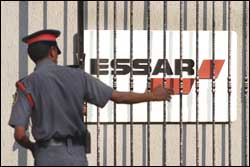 Cairo-based Orascom
Telecom Holding is selling off its entire 14.22 percent stake in Hutchison
Telecommunications International Ltd (2332), ending the two-year relationship
between the two emerging-markets telecom firms. The move comes less than a month
after Orascom Telecom said it would not reduce its holding further. HTIL's
parent Hutchison Whampoa (0013) announced late yesterday it was reacquiring a
9.22 stake, or 441.026 million shares, from Orascom for HK$4.851 billion, or
HK$11 per share. The buyer for the Egyptian firm's remaining 5 percent interest
is Hutchison Whampoa chairman Li Ka-shing, a person familiar with the situation
told The Standard. The price Hutchison is paying represents a 2.65 percent
discount to HTIL's closing price yesterday of HK$11.30. Orascom - the largest
mobile operator in the Middle East by subscribers - will not make any profit on
its investment, as it originally acquired the HTIL shares from Hutchison for the
same HK$11 apiece. After completion of the latest deal, Hutchison Whampoa's
stake in its subsidiary will be increased to 59.33 percent from 50.11 percent.
HTIL "is one of the best capitalized telecom companies in the region, and is
strategically and financially well positioned to take up new opportunities and
to capture growth opportunity in certain of their existing markets," the parent
said in the statement. Shareholder approval for the transaction is not required. Cairo-based Orascom
Telecom Holding is selling off its entire 14.22 percent stake in Hutchison
Telecommunications International Ltd (2332), ending the two-year relationship
between the two emerging-markets telecom firms. The move comes less than a month
after Orascom Telecom said it would not reduce its holding further. HTIL's
parent Hutchison Whampoa (0013) announced late yesterday it was reacquiring a
9.22 stake, or 441.026 million shares, from Orascom for HK$4.851 billion, or
HK$11 per share. The buyer for the Egyptian firm's remaining 5 percent interest
is Hutchison Whampoa chairman Li Ka-shing, a person familiar with the situation
told The Standard. The price Hutchison is paying represents a 2.65 percent
discount to HTIL's closing price yesterday of HK$11.30. Orascom - the largest
mobile operator in the Middle East by subscribers - will not make any profit on
its investment, as it originally acquired the HTIL shares from Hutchison for the
same HK$11 apiece. After completion of the latest deal, Hutchison Whampoa's
stake in its subsidiary will be increased to 59.33 percent from 50.11 percent.
HTIL "is one of the best capitalized telecom companies in the region, and is
strategically and financially well positioned to take up new opportunities and
to capture growth opportunity in certain of their existing markets," the parent
said in the statement. Shareholder approval for the transaction is not required.
Macau casino operator Galaxy
Entertainment Group (0027) reported unaudited earnings before interest, tax,
depreciation and amortization for the nine months ended September 30 increased
to HK$1.109 billion - exceeding the whole of 2006 by a whopping 150 percent.
 Financial Secretary John Tsang Chun-wah
said the government is concerned over the rise in inflation, but cannot do much
to control the problem at a luncheon of an economic summit on Thursday. “The
weak US dollar, the strong yuan, the surge of food prices and the fluctuation of
the oil prices were the major factors fuelling inflation. As food is the biggest
expenditures for low-income earners, we expect the inflation will going to
affect them more.” Mr Tsang said. “We are actively studying measures to increase
their productivity through education and training,” he added. “Last year, the
government also suggested several financial measures, such as to cut the rates
on property to ease the inflation rate to about 1 per cent. We estimate the
inflation rate would remain at about 2 per cent by the end of this year. He also
pointed out the inflation is not serious compare to 1990’s. “Over the last four
years, Hong Kong’s GDP reached 7.7 per cent. Compare to 90s, the inflation rate
is not serious in this year,” he said. During the summit, an attendee asked the
government to introduce more measures in the upcoming budget to ease the burden
of the middle class. Mr Tsang did not reply to him directly, but just said “OK”. Financial Secretary John Tsang Chun-wah
said the government is concerned over the rise in inflation, but cannot do much
to control the problem at a luncheon of an economic summit on Thursday. “The
weak US dollar, the strong yuan, the surge of food prices and the fluctuation of
the oil prices were the major factors fuelling inflation. As food is the biggest
expenditures for low-income earners, we expect the inflation will going to
affect them more.” Mr Tsang said. “We are actively studying measures to increase
their productivity through education and training,” he added. “Last year, the
government also suggested several financial measures, such as to cut the rates
on property to ease the inflation rate to about 1 per cent. We estimate the
inflation rate would remain at about 2 per cent by the end of this year. He also
pointed out the inflation is not serious compare to 1990’s. “Over the last four
years, Hong Kong’s GDP reached 7.7 per cent. Compare to 90s, the inflation rate
is not serious in this year,” he said. During the summit, an attendee asked the
government to introduce more measures in the upcoming budget to ease the burden
of the middle class. Mr Tsang did not reply to him directly, but just said “OK”.
The wave of Hong Kong migrants who
literally changed the face of Vancouver and Toronto in the run-up to the
handover is officially over, according to the newly released Canadian census.
Tens of thousands of Hongkongers settled in Canada ahead of 1997 amid fears of
big changes under Chinese rule, with the vast majority moving to the two big
cities on either side of the country. From 1991 to 2000, 100,075 people born in
Hong Kong moved to Canada. But the new data shows that from 2001 to last year, a
mere 7,430 relocated to the North American nation. And the number of Hong Kong
migrants living in British Columbia fell by 12 per cent to 78,060, with
thousands of Hongkongers thought to have moved back. There are now about 220,000
Canadians living in Hong Kong, according to the Canadian consulate, with the
vast majority believed to be either returnees or part of the floating population
that moves back and forward between the two. The big fall in Hong Kong migrants
to Canada has been more than matched by a surge in the number of mainlanders,
who are on the verge of overtaking British-born Canadians as the biggest
foreign-born contingent. From 2001 to last year, there were 155,105 new arrivals
in Canada from the mainland, compared with 108,285 in the previous five years.
Mary Chan Siu-yee, manager of immigration consultancy Rothe International
Canada, said less demand and tougher requirements imposed by Canadian
authorities had led to the drop in Hongkongers relocating to Canada. "There have
been ups at times of political uncertainty, and after the Sars outbreak, but
downs when the local property and the stock market performed well." Ms Chan said
the reasons behind a decision to emigrate varied, with some multimillionaires
seeking a higher quality of life and better education for their children, and
teachers finding themselves fed up with local education reforms. While the
strong Canadian dollar might have deterred some locals from relocating to Canada
temporarily, Ms Chan said the booming stock and property markets could offset
some of these disincentives. Immigration consultant Eddie Kwan King-hung said
most of those who wanted to go had left already, and he expected the number of
migrants from Hong Kong would fall further in coming years. He said only 5 per
cent of his firm's business was from Hong Kong, while about 40 per cent involved
Chinese Canadians from the mainland resettling in Hong Kong through the
investment migrant scheme. A spokesman for the Canadian consulate said Canada
remained an attractive immigration option given its strong economic growth, safe
neighbourhoods, pristine environment, falling taxes and the lowest unemployment
rate in 33 years. Hong Kong Security Bureau figures show that 10,300 people
migrated overseas last year, compared with 30,900 in 1997. Ten years ago, 15,000
people left for Canada, but only 1,600 went last year.
Shanghai Disneyland could 'help' HK
park - Mainlanders may not know much about Disneyland, and a park in Shanghai
might boost attendances at the Hong Kong theme park, the commerce and economic
development minister told lawmakers yesterday. Following a recent report that
Shanghai's Chongming Island might be the site of a Disneyland after 2010, and in
the light of poor attendance figures at Hong Kong Disneyland, legislators had
questioned the theme park's economic benefits. But Secretary for Commerce and
Economic Development Frederick Ma Si-hang insisted that the economic viability
of the project should be assessed in the long term. "Since the park has only
been open for two years, the government has not conducted another assessment of
the quantifiable economic benefits that Hong Kong Disneyland has brought to the
local economy since its opening," he said. The Hong Kong government estimated in
1999 that the net economic benefit over 40 years would range from HK$80 billion
to HK$148 billion. Democratic Party legislator Fred Li Wah-ming asked the
government's view on the prospect of a Shanghai Disneyland being built. "So far,
the question is still a hypothetical one," Mr Ma said. "But China is big enough
to have more than one international theme park. If there is one Disneyland in
the north and another in southern China, it might be even better."
The Hong Kong government will
auction as many as six new licenses for wireless broadband service next year
which may boost competition in the already congested local telecommunications
market. Market watchers said existing fixed-line operators lacking that
last-mile access network connecting them to end-users were likely to have a keen
interest in bidding for a licence. The Office of the Telecommunications
Authority yesterday said that it would assign new licenses on the 2.3 gigahertz
and 2.5 GHz wavelengths for the broadband wireless access (BWA) service which
allows operators to provide fixed wireless or full mobile service. Marion Lai
Chan Chi-kuen, the director-general of Ofta, yesterday said the auction would be
held in the fourth quarter next year and services would be available in 2009.
"The issuing of BWA licenses will help Hong Kong to maintain its leading
position as a telecommunications hub in the region," Mrs Lai said at the
Mobility World Congress yesterday. She said the licensing framework would be
technology neutral and market oriented. The government will put no limitation on
what technology the licensees can use and the number of licenses that can be
issued. "Details of the pre-qualification requirements, the auction rules and
the reserve price will be released nearer the time of the auction," Ms Lai said.
"Any interested party including incumbent fixed and mobile carriers will be
welcome to bid for the spectrum." Wharf (SEHK: 0004) T&T, the fixed-line
telecommunication arm of Wharf Holdings, expressed interest in bidding for the
new licenses. "The new licenses can enable us to provide fixed broadband service
initially and we can offer a mobile service once the technology is ready," said
Raymond Mok Wai-man, a vice-president of Wharf T&T, a fixed-line operator owned
by Wharf Holdings. "The key issue is whether there are enough new applications
to attract investment on a new network," said Wong Chi-man, a telecommunications
analyst at China Everbright (SEHK: 0165) Securities. Worldwide Interoperability
for Microwave Access (WiMAX) is a wireless technology that can be used on the
new spectrum. It can support fixed wireless and full mobile service with a
download speed of 40 megabits per second. In October, WiMAX was adopted as a
global 3G mobile standard by the International Telecommunications Union, a UN
organization handling global telecommunications issues.
 China:
Despite the success of Chinese language films in the global market in the past
few years, action star Jet Li's latest movie "The Warlords" would not be one
that particularly caters to foreigners' taste, the director of the movie said on
Wednesday. "The film is not vying for a global market and will not be a typical
Chinese film in foreigners' eyes," said director Peter Chan, adding that it
would involve less "martial arts features" but more depiction of the characters.
Chan's comments on the film was echoed by Li, who said that the film mainly
targeted the Chinese-language audience, and Europe and Northern American markets
would come second. "The Warlords," a war epic based on a Qing Dynasty story, is
due to release in Chinese mainland on December 13. Nearly half of the $40
million budget for the movie went to the cast and Li is set to rake in 100
million yuan ($13 million) for the film, a record for an actor in a
Chinese-language film, Chan said on an earlier occasion. The film, also starring
Andy Lau, Takeshi Kaneshiro and Beijing-based actress and director Xu Jinglei,
is slated for release in North America next March. Ang Lee's martial arts tale
"Crouching Tiger, Hidden Dragon" is one of the Chinese films that won
international acclaim in recent years. It featured sword-fighting and wire
acrobatics. Li, 44, a former national kung fu champion on the Chinese mainland,
made his name in Hong Kong films in the 1990s with movies such as "The Legend of
Fong Sai-Yuk" series before moving on to Hollywood.
China:
Despite the success of Chinese language films in the global market in the past
few years, action star Jet Li's latest movie "The Warlords" would not be one
that particularly caters to foreigners' taste, the director of the movie said on
Wednesday. "The film is not vying for a global market and will not be a typical
Chinese film in foreigners' eyes," said director Peter Chan, adding that it
would involve less "martial arts features" but more depiction of the characters.
Chan's comments on the film was echoed by Li, who said that the film mainly
targeted the Chinese-language audience, and Europe and Northern American markets
would come second. "The Warlords," a war epic based on a Qing Dynasty story, is
due to release in Chinese mainland on December 13. Nearly half of the $40
million budget for the movie went to the cast and Li is set to rake in 100
million yuan ($13 million) for the film, a record for an actor in a
Chinese-language film, Chan said on an earlier occasion. The film, also starring
Andy Lau, Takeshi Kaneshiro and Beijing-based actress and director Xu Jinglei,
is slated for release in North America next March. Ang Lee's martial arts tale
"Crouching Tiger, Hidden Dragon" is one of the Chinese films that won
international acclaim in recent years. It featured sword-fighting and wire
acrobatics. Li, 44, a former national kung fu champion on the Chinese mainland,
made his name in Hong Kong films in the 1990s with movies such as "The Legend of
Fong Sai-Yuk" series before moving on to Hollywood.
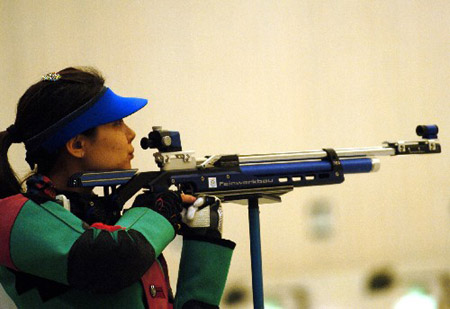 Chinese sharpshooter Du Li, who held the world record of women's 10-meter air
rifle, mounted the champion platform of the event again at the 11th Asian
Shooting Championships here on Thursday, with an easy win of 503.7 points.
Chinese sharpshooter Du Li, who held the world record of women's 10-meter air
rifle, mounted the champion platform of the event again at the 11th Asian
Shooting Championships here on Thursday, with an easy win of 503.7 points.
A leading engineer for China's
indigenous satellite navigation system said the new system would be used in
guiding traffic and monitoring sports venues during the Beijing Olympics in
summer 2008. Ran Chengqi, deputy director of China Satellite Navigation
Engineering Center, said the Compass Navigation Satellite System, which consists
of five positioning satellites orbiting the Earth, will help alleviate traffic
problems during the Olympics by providing detailed positioning information to
individual drivers. The home-grown navigation system, coded as Beidou in the
Chinese pronunciation for the compass, can not only pinpoint precise locations
of moving vehicles, but also tell drivers real-time traffic on routes to their
destinations, Ran said at an international navigation industry forum in
Shanghai. In working for the Olympics, Ran said, the Beidou system would be
compatible to the prevailing global positioning system (GPS), which was
developed by the U.S. military and is now in pervasive civilian use worldwide.
China had primarily constructed the experimental satellite navigation web by May
2003, via launching three Beidou satellites into space. In February and April
2007, another two satellites were separately sent into orbit. The cluster of
five Beidou satellites are comprised of the main infrastructure of the Chinese
satellite navigation network. China is going to launch more navigation
satellites in 2008, the Shanghai-based Wenhui Daily quoted Ran as saying.
Besides the specific employment for the Beijing Olympics, Ran said, the Beidou
system would also benefit wider applications from transportation, fishery,
mining, to wildfire surveillance, Ran said. In addition to the GPS and GLONASS,
which was funded and constructed by the Russian military, the European Union
invested in 2003 roughly 3.6 billion euros in developing an ambitious project,
Galileo, which is planned to group 30 navigation satellites. The Galileo project
does not run smoothly because of fund shortage.
Britain opposes Taiwan’s plan for a
referendum on pushing for UN membership, Foreign Secretary David Miliband said
Wednesday, adding that any “reckless manoeuvres” were to be “deplored”.
Britain’s policy towards Taiwan had not changed in the past 35 years, Mr
Miliband said after talks in London with his Chinese counterpart Yang Jiechi.
“I’m happy to repeat for this audience what I said to the foreign minister about
this issue,” Mr Miliband told reporters. “British policy in respect of Taiwan
was set in 1972 when we first exchanged ambassadors between out two countries.
Our One China policy has not changed. “We do not support the proposed referendum
in Taiwan for it to gain membership of the United Nations under the name of
Taiwan.” He added: “We think it is very important that all sides act with real
restraint given the need for stability across the Taiwan Straits and any
reckless manoeuvres are to be deplored.” Taiwanese President Chen Shui-bian
intends to hold a referendum next year. France and the United States have
already expressed their opposition to the plan. Along with Britain, China and
Russia, they make up the five permanent members of the UN Security Council, who
all have veto-wielding powers on resolutions. Taiwan, under its official name
the Republic of China, lost its UN seat to China in 1971. Efforts in the past 14
years to rejoin the world body, using the name Republic of China, have been
repeatedly blocked by Beijing, which regards the island as part of its own
territory awaiting reunification. The two sides split at the end of a civil war
in 1949.
December 7 - 9, 2007
 Hong Kong:
Mainlanders in major cities, including Beijing, are likely to invest an average
HK$110,000 each in Hong Kong-traded securities once the direct investment
"through train" gets the green light, according to the latest poll. Hong Kong:
Mainlanders in major cities, including Beijing, are likely to invest an average
HK$110,000 each in Hong Kong-traded securities once the direct investment
"through train" gets the green light, according to the latest poll.
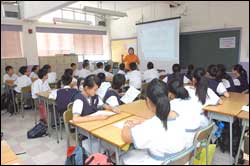 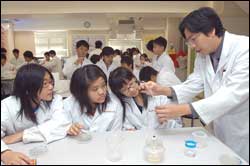 Hong
Kong school kids outclass most of the world in maths, reading and science,
according to an eagerly awaited global score card of scholastic performance
released yesterday. Hong Kong pupils aged 15 scored an average of 547 in maths,
along with South Korea - one point below Finland and two points below Taiwan.
"In mathematics, Chinese Taipei, Finland, Hong Kong and Korea together rank the
top, with no statistically significant difference between their scores," said
the report by the Programme for International Student Assessment rankings, which
are coordinated by the Organization for Economic Cooperation and Development. In
the last two PISA surveys, conducted in 2000 and 2003, Hong Kong led the top
group in maths. "We are always in the top four. This does not differ from the
previous cycles," said Dr Esther Ho Sui-chu of the Chinese University of Hong
Kong. "To the layman, this might look as though we are third, but there is no
statistical difference." Hong Kong pupils made huge strides in reading, climbing
to third place from 10th position in 2003 - the last time the study was
conducted - and moving up one place to second in science. About 400,000 students
in 57 countries were assessed as part of the poll - including 4,645 randomly
selected students from 146 Hong Kong secondary schools. "Hong Kong's
15-year-olds performed well. Socioeconomic status had a modest impact on
performance," the report said. The three-yearly survey compares education
systems by assessing how 15-year-olds have developed the skills necessary to
deal with daily life. An Education Bureau spokesman said of Hong Kong's results:
"The flying colors were the result of concerted efforts of schools and teachers.
It is a great encouragement to stakeholders in the education sector who have
been making tireless efforts in carrying through education reform." He
attributed the improved ranking in reading to school-based programs, the
strategic approach of emphasising learning to read among younger students and
gradually moving towards reading to learn among older students in the curriculum
reform, and implementation of the new Chinese language curriculum in 2002. Hong
Kong school kids outclass most of the world in maths, reading and science,
according to an eagerly awaited global score card of scholastic performance
released yesterday. Hong Kong pupils aged 15 scored an average of 547 in maths,
along with South Korea - one point below Finland and two points below Taiwan.
"In mathematics, Chinese Taipei, Finland, Hong Kong and Korea together rank the
top, with no statistically significant difference between their scores," said
the report by the Programme for International Student Assessment rankings, which
are coordinated by the Organization for Economic Cooperation and Development. In
the last two PISA surveys, conducted in 2000 and 2003, Hong Kong led the top
group in maths. "We are always in the top four. This does not differ from the
previous cycles," said Dr Esther Ho Sui-chu of the Chinese University of Hong
Kong. "To the layman, this might look as though we are third, but there is no
statistical difference." Hong Kong pupils made huge strides in reading, climbing
to third place from 10th position in 2003 - the last time the study was
conducted - and moving up one place to second in science. About 400,000 students
in 57 countries were assessed as part of the poll - including 4,645 randomly
selected students from 146 Hong Kong secondary schools. "Hong Kong's
15-year-olds performed well. Socioeconomic status had a modest impact on
performance," the report said. The three-yearly survey compares education
systems by assessing how 15-year-olds have developed the skills necessary to
deal with daily life. An Education Bureau spokesman said of Hong Kong's results:
"The flying colors were the result of concerted efforts of schools and teachers.
It is a great encouragement to stakeholders in the education sector who have
been making tireless efforts in carrying through education reform." He
attributed the improved ranking in reading to school-based programs, the
strategic approach of emphasising learning to read among younger students and
gradually moving towards reading to learn among older students in the curriculum
reform, and implementation of the new Chinese language curriculum in 2002.
HSBC executive Margaret Leung Ko
May-yee predicted yesterday that Hong Kong banks will follow the lead of the US
Federal Reserve after the Fed does the expected and cuts its benchmark interest
rate by 25 to 50 basis points next Tuesday.
 China:
Lenovo Group, the only worldwide Olympic partner from China, said yesterday it
will not renew its sponsorship contract with the International Olympic Committee
(IOC) after the Beijing 2008 Olympic Games. The computer giant stated on its
website it will focus on a "regional sports marketing strategy" after the
Beijing Games instead. It will end its partnership with the IOC in December next
year, four months after the closing of the Beijing Games. "In order to make
Lenovo a brand known worldwide, the company will be more focused on event
sponsorship for strategically targeted markets, which will better meet the needs
of deepening the development of Lenovo in particular countries and regions," the
statement said.
China:
Lenovo Group, the only worldwide Olympic partner from China, said yesterday it
will not renew its sponsorship contract with the International Olympic Committee
(IOC) after the Beijing 2008 Olympic Games. The computer giant stated on its
website it will focus on a "regional sports marketing strategy" after the
Beijing Games instead. It will end its partnership with the IOC in December next
year, four months after the closing of the Beijing Games. "In order to make
Lenovo a brand known worldwide, the company will be more focused on event
sponsorship for strategically targeted markets, which will better meet the needs
of deepening the development of Lenovo in particular countries and regions," the
statement said.
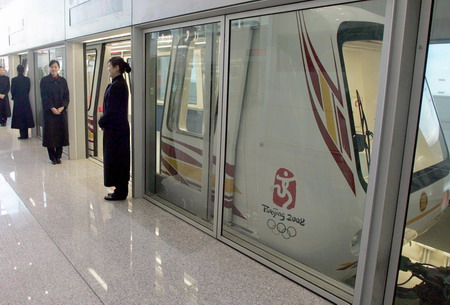 Airport staff wait
beside a car of an express train, which is known as the Automated People Mover
system at the new Terminal 3, or T3, in the Beijing Capital International
Airport, November 4, 2007. The express train service system was completed
Tuesday at the T3 that will serve Olympic and Paralympic chartered flights
during the Games. Airport staff wait
beside a car of an express train, which is known as the Automated People Mover
system at the new Terminal 3, or T3, in the Beijing Capital International
Airport, November 4, 2007. The express train service system was completed
Tuesday at the T3 that will serve Olympic and Paralympic chartered flights
during the Games.
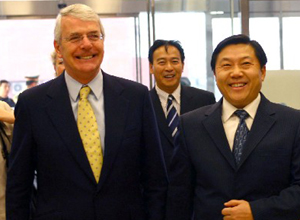 Xinhua News Agency Vice President Lu Wei meets with former British Prime
Minister John Major in Beijing, Dec. 5, 2007. John Major was born on March 29,
1943, London. He was prime minister from 1990 to 1997.
Xinhua News Agency Vice President Lu Wei meets with former British Prime
Minister John Major in Beijing, Dec. 5, 2007. John Major was born on March 29,
1943, London. He was prime minister from 1990 to 1997.
Nearly one out of three people in
Beijing belongs to the mobile population, according to the capital's population
and family planning commission. The municipality's mobile population reached 5.4
million in October, accounting for nearly 30 percent of the total, the
commission's deputy director Li Yunli said. More than 80 percent of the
capital's mobile population belongs to the China-unique category of rural
migrant workers, Li told a conference on population in Beijing on Monday. The
remainder is mostly made up of people visiting for less than a month. She added
that migrant workers would comprise the vast majority of both the capital's and
the nation's mobile population for a long time to come. Currently, the national
mobile population stands at 150 million. The most recent influx of migrant
workers boosted the capital's population to about 17.4 million by October,
signaling Beijing's population would likely exceed its threshold of 18 million
earlier than previous forecasts, Li said. The total population would continue to
grow in Beijing over the next five or 10 years, Li said, and "that would further
strain scarce resources, including land, water and energy".
 Sony Ericsson mobile phones are
exhibited at a high-tech expo held in Beijing in May this year. China is likely
to produce nearly 500 million mobile phones in 2007, or more than 40 percent of
the world's total. Sony Ericsson mobile phones are
exhibited at a high-tech expo held in Beijing in May this year. China is likely
to produce nearly 500 million mobile phones in 2007, or more than 40 percent of
the world's total.
China has opened eight biomass
plants in five leading grain-producing provinces to cut carbon dioxide emissions
and generate electricity, amid growing concerns over greenhouse gas and climate
change. The plants, with a total capacity of 200,000 kilowatts, are expected to
burn 1.6 million tons of grain stalks a year. They will generate 1.4 billion
kilowatt hours of electricity, said Cui Mengshan, a planning and business
development manager with the National Bio Energy Co Ltd, a subsidiary of the
State Grid Corporation. "Compared with coal-fired power plants, these biomass
projects are expected to cut carbon dioxide emissions by 800,000 tons a year,"
he said. China has been turning grain stalks into clean energy since last
December when the State Grid Corporation launched the first biomass plant in the
eastern Shandong Province. The project, which burns 200,000 tons of stalks
annually, has enabled local farmers to profit from what was traditionally waste.
Similar projects have been launched over the past year in four other
grain-producing provinces of Hebei, Jiangsu, Henan and Heilongjiang. China's
capacity for bio-energy electricity is forecast to reach 5.5 million kilowatts
by 2010, according to the country's 11th Five-Year Plan (2006-10). "This means
China's carbon dioxide emissions will be reduced by 2,200 tons by then," Cui
said.
December 6, 2007
 Hong Kong:
Investors' expectations of further fund inflows and interest cuts saw a strong
growth of housing market in Hong Kong last month, reveal the Land Registry's
latest statistics on Tuesday. According to the Land Registry's latest figures,
15,759 residential flat sale and purchase pacts were registered in Hong Kong in
November, up 121.8 percent year on year. The total consideration also surged
260.3 percent to 70.1 billion HK dollars (about 9 billion U.S. dollars) in the
city populated by about 7 million people, the Land Registry said. According to
the latest land registration statistics, the total number of building unit sale
and purchase agreements registered last month was 18,105, up 36.9 percent from
October and 112 percent from a year earlier. Using a 12-month moving average,
the figure represents a rise of 7.4 percent from October and 44.5 percent on a
year earlier. The total consideration of these agreements surged 60.6 percent
from October and 213.8 percent on last year to 81.4 billion HK dollars (10.44
billion U.S. dollars). Hong Kong:
Investors' expectations of further fund inflows and interest cuts saw a strong
growth of housing market in Hong Kong last month, reveal the Land Registry's
latest statistics on Tuesday. According to the Land Registry's latest figures,
15,759 residential flat sale and purchase pacts were registered in Hong Kong in
November, up 121.8 percent year on year. The total consideration also surged
260.3 percent to 70.1 billion HK dollars (about 9 billion U.S. dollars) in the
city populated by about 7 million people, the Land Registry said. According to
the latest land registration statistics, the total number of building unit sale
and purchase agreements registered last month was 18,105, up 36.9 percent from
October and 112 percent from a year earlier. Using a 12-month moving average,
the figure represents a rise of 7.4 percent from October and 44.5 percent on a
year earlier. The total consideration of these agreements surged 60.6 percent
from October and 213.8 percent on last year to 81.4 billion HK dollars (10.44
billion U.S. dollars).
 Hong Kong's Tony Leung and mainland
actress Tang Wei 'flirt' in Ang Lee's film "Lust, Caution". The Venice Film
Festival's Golden Lion winner has become a popular hit on the Chinese mainland
for its explicit sex scenes. A month after its release in the Chinese mainland,
Ang Lee's award-winning film "Lust, Caution" has been a permanent subject of
debate for its explicit sexual content - or lack of it - and for its political
undertones. Containing bold sex scenes, the Venice Film Festival's Golden Lion
winner for Best Picture had to be cut by seven sexually explicit minutes.
Unfazed, Chinese filmgoers have ensured the film has been a big hit on the
mainland, with box office sales surpassing more than 100 million yuan (US$13.3
million) in just over two weeks. Some were left unsatisfied by the deleted sex
scenes, choosing to download the film from the Internet and, in some cases,
traveling from southern Guangdong province to Hong Kong specifically to watch
the steamy sections. In online forums, the movie ignited a new round of debate
about the adoption of a film rating system in China. One critic said, "The true
meaning of the film's screening in the Chinese mainland lies in renewing the
debate of the rating system." In 2001, Wang Xingdong, movie director, and a
member of the Chinese People's Political Consultative Conference, was one of the
first to call for a film rating system, but over the subsequent six years, the
idea has only remained on the lips of some senior officials of the State
Administration of Radio, Film and Television (SARFT). After watching the
censored version of "Lust, Caution", Dong Yanbin, a doctoral student in Beijing,
filed a lawsuit against SARFT as well as UME, the cinema showing the film, for
infringing upon his "consumer rights", according to local media reports. Hong Kong's Tony Leung and mainland
actress Tang Wei 'flirt' in Ang Lee's film "Lust, Caution". The Venice Film
Festival's Golden Lion winner has become a popular hit on the Chinese mainland
for its explicit sex scenes. A month after its release in the Chinese mainland,
Ang Lee's award-winning film "Lust, Caution" has been a permanent subject of
debate for its explicit sexual content - or lack of it - and for its political
undertones. Containing bold sex scenes, the Venice Film Festival's Golden Lion
winner for Best Picture had to be cut by seven sexually explicit minutes.
Unfazed, Chinese filmgoers have ensured the film has been a big hit on the
mainland, with box office sales surpassing more than 100 million yuan (US$13.3
million) in just over two weeks. Some were left unsatisfied by the deleted sex
scenes, choosing to download the film from the Internet and, in some cases,
traveling from southern Guangdong province to Hong Kong specifically to watch
the steamy sections. In online forums, the movie ignited a new round of debate
about the adoption of a film rating system in China. One critic said, "The true
meaning of the film's screening in the Chinese mainland lies in renewing the
debate of the rating system." In 2001, Wang Xingdong, movie director, and a
member of the Chinese People's Political Consultative Conference, was one of the
first to call for a film rating system, but over the subsequent six years, the
idea has only remained on the lips of some senior officials of the State
Administration of Radio, Film and Television (SARFT). After watching the
censored version of "Lust, Caution", Dong Yanbin, a doctoral student in Beijing,
filed a lawsuit against SARFT as well as UME, the cinema showing the film, for
infringing upon his "consumer rights", according to local media reports.
One indication that the initial
public offering frenzy has subsided is the growing list of companies delaying
listing due to the aggressive pricing of companies lined up in the trading
block, "Asia's Warren Buffett" and Henderson Land Development (0012) founder Lee
Shau-kee said yesterday.
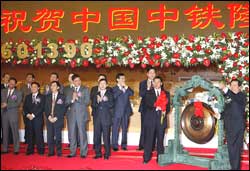 Hopes of stability as China Railway
A shares perform - Hong Kong-listing candidate China Railway Group's
yuan-denominated shares saw a 69 percent rise on its Shanghai debut yesterday.
This was in line with market expectations and shows that the enthusiasm of
mainland investors is still intact. Buoyed by its near monopoly of China's
fast-growing railway construction sector, China Rail's A shares closed yesterday
at 8.09 yuan (HK$8.51), compared with its IPO price of 4.8 yuan, easing from an
intraday high of 8.1 yuan in the morning. About 1.86 billion shares changed
hands, with a total value of 8.59 billion yuan. "Despite the fact that China
Rail's performance is not as good as some of its predecessors such as PetroChina
(0857) and China Shenhua Energy Company (1088), the almost 70 percent rise in
the first day amid the recent fragile domestic market was reasonably good," said
a Hong Kong-based fund manager who also manages QFII (qualified foreign
institutional investor) funds for investment in domestic markets. The company's
closing price was slightly inclined to the high end but was more reasonable than
many previous debutants, Huaxia Securities analyst Zhou Lin said. The world's
largest construction contractor will commence H-share trading on Friday with an
offer price of HK$5.80 per share. Market watchers have said the H shares will
not gain a spillover effect from its A-share counterpart. "There was an asking
bid at above HK$6 yesterday but there have not been any transactions yet," a
fund manager said, adding the H-share performance will depend on the market
performance over the coming days. China Railway raised US$3 billion (HK$23.4
billion) in its Shanghai initial public offering, and another US$2.5 billion
from an IPO in Hong Kong while attracting US$457 billion in subscriptions.
Analysts had previously warned a lackluster debut may dent confidence in
Shanghai and Hong Kong, but now they believe the first day performance could
help towards stabilizing a future slump. Hopes of stability as China Railway
A shares perform - Hong Kong-listing candidate China Railway Group's
yuan-denominated shares saw a 69 percent rise on its Shanghai debut yesterday.
This was in line with market expectations and shows that the enthusiasm of
mainland investors is still intact. Buoyed by its near monopoly of China's
fast-growing railway construction sector, China Rail's A shares closed yesterday
at 8.09 yuan (HK$8.51), compared with its IPO price of 4.8 yuan, easing from an
intraday high of 8.1 yuan in the morning. About 1.86 billion shares changed
hands, with a total value of 8.59 billion yuan. "Despite the fact that China
Rail's performance is not as good as some of its predecessors such as PetroChina
(0857) and China Shenhua Energy Company (1088), the almost 70 percent rise in
the first day amid the recent fragile domestic market was reasonably good," said
a Hong Kong-based fund manager who also manages QFII (qualified foreign
institutional investor) funds for investment in domestic markets. The company's
closing price was slightly inclined to the high end but was more reasonable than
many previous debutants, Huaxia Securities analyst Zhou Lin said. The world's
largest construction contractor will commence H-share trading on Friday with an
offer price of HK$5.80 per share. Market watchers have said the H shares will
not gain a spillover effect from its A-share counterpart. "There was an asking
bid at above HK$6 yesterday but there have not been any transactions yet," a
fund manager said, adding the H-share performance will depend on the market
performance over the coming days. China Railway raised US$3 billion (HK$23.4
billion) in its Shanghai initial public offering, and another US$2.5 billion
from an IPO in Hong Kong while attracting US$457 billion in subscriptions.
Analysts had previously warned a lackluster debut may dent confidence in
Shanghai and Hong Kong, but now they believe the first day performance could
help towards stabilizing a future slump.
To help local investors make prompt
investment decisions, the Hong Kong stock exchange has decided to allow HSBC
Holdings (0005) to publish price-sensitive information during trading hours
without suspending the shares.
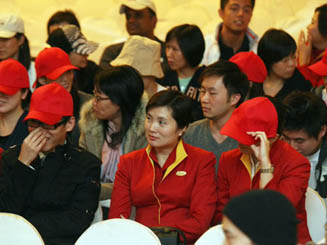 Cathay Pacific Airways appears headed for turbulence ahead
of the busy Christmas period with the Flight Attendants Union threatening
industrial action unless the airline withdraws a new medical policy set to go
into effect January 1.
Cathay Pacific Airways appears headed for turbulence ahead
of the busy Christmas period with the Flight Attendants Union threatening
industrial action unless the airline withdraws a new medical policy set to go
into effect January 1.
 China:
The Nasdaq Stock Market opened a representative office in Beijing Monday in a
fresh move to tap the bourse's fastest growing market outside the United States.
China:
The Nasdaq Stock Market opened a representative office in Beijing Monday in a
fresh move to tap the bourse's fastest growing market outside the United States.
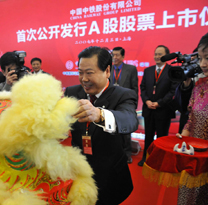 China Railway Chairman Shi Dahua paints the eyes of a dancing lion at a ceremony
to mark the company's trading debut in Shanghai yesterday. China Railway Group
Ltd, the world's third-biggest construction company, surged 69 percent on its
Shanghai trading debut Monday on optimism the nation's growing transport demand
will spur earnings. The stock climbed to 8.09 yuan at the close of trading,
compared with an initial public offer price of 4.80 yuan, valuing the company at
141 billion yuan. China Railway sold shares on the mainland and in Hong Kong to
raise funds for equipment, capacity expansion and technology upgrades as China
spends 5.05 trillion yuan on transportation through 2010. The country will
lengthen its rail network by almost a third through 2020 to move more people and
goods. "The current share price reflects the potential of the company," Tony
Zheng, who manages the equivalent of $790 million at Bank of Communications
Schroeders Fund Management Co in Shanghai, said by phone yesterday. "Railway
investment will be huge in the next few years in China, and this will give the
company huge opportunities to expand its market share." China Railway, Asia's
biggest construction company, raised 22.4 billion yuan in the Shanghai offering
and another HK$19.2 billion in a Hong Kong IPO, people with direct knowledge of
the sales said on November 22 and November 30. The company, established in
September, is the publicly traded unit of China Railway Engineering Corp, the
world's third-largest construction company by contract value last year,
according to a draft of the company's share-sale documents. China, with 78,000
km of rail, has the world's third-longest railway after the US and Russia. Its
projected spending on railways in the five years to 2010 is more than triple
that of the previous five years, according to the share- sale documents. Railway
builders and operators will need to raise as much as 1 trillion yuan from
capital markets through the sale of stock or debt to fund the expansion, Cao
Yuanzheng, chief economist at share-sale arranger BOCI International Holdings
Ltd, said on April 18.
China Railway Chairman Shi Dahua paints the eyes of a dancing lion at a ceremony
to mark the company's trading debut in Shanghai yesterday. China Railway Group
Ltd, the world's third-biggest construction company, surged 69 percent on its
Shanghai trading debut Monday on optimism the nation's growing transport demand
will spur earnings. The stock climbed to 8.09 yuan at the close of trading,
compared with an initial public offer price of 4.80 yuan, valuing the company at
141 billion yuan. China Railway sold shares on the mainland and in Hong Kong to
raise funds for equipment, capacity expansion and technology upgrades as China
spends 5.05 trillion yuan on transportation through 2010. The country will
lengthen its rail network by almost a third through 2020 to move more people and
goods. "The current share price reflects the potential of the company," Tony
Zheng, who manages the equivalent of $790 million at Bank of Communications
Schroeders Fund Management Co in Shanghai, said by phone yesterday. "Railway
investment will be huge in the next few years in China, and this will give the
company huge opportunities to expand its market share." China Railway, Asia's
biggest construction company, raised 22.4 billion yuan in the Shanghai offering
and another HK$19.2 billion in a Hong Kong IPO, people with direct knowledge of
the sales said on November 22 and November 30. The company, established in
September, is the publicly traded unit of China Railway Engineering Corp, the
world's third-largest construction company by contract value last year,
according to a draft of the company's share-sale documents. China, with 78,000
km of rail, has the world's third-longest railway after the US and Russia. Its
projected spending on railways in the five years to 2010 is more than triple
that of the previous five years, according to the share- sale documents. Railway
builders and operators will need to raise as much as 1 trillion yuan from
capital markets through the sale of stock or debt to fund the expansion, Cao
Yuanzheng, chief economist at share-sale arranger BOCI International Holdings
Ltd, said on April 18.
China's economy will grow by 11.6%
this year, the fifth consecutive year for the country to achieve double-digit
GDP growth since 2003, according to the economic forecasts of the Chinese
Academy of Social Sciences.
 Fiat
announced yesterday it will invest $32.2 mln to build its first Chinese R&D
center in Shanghai, which will will focus on development of engines and
transmissions for commercial vehicles. Fiat
announced yesterday it will invest $32.2 mln to build its first Chinese R&D
center in Shanghai, which will will focus on development of engines and
transmissions for commercial vehicles.
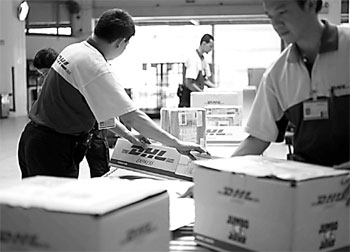 Shanghai took a huge step toward
its target of becoming the most promising international air cargo center in the
Asia-Pacific region last week after DHL announced decisions to build its North
Asia express delivery hub in Shanghai Pudong International Airport. The
announcement means the airport will be the first in the world with two
international express delivery hubs. United Parcel Service Inc (UPS) is also
building a facility at Pudong. The General Administration of Civil Aviation of
China and the Shanghai Municipality launched a strategy in 2004 to build
Shanghai into a leading international air cargo transportation hub, which is
also part of China's 11th Five-Year Plan (2006-10). Attracting world-leading
express and logistics giants to establish their operations in the city plays a
crucial role in realizing this ambition. The airport, which currently handles 63
percent of China's international cargo, has been busy expanding its capacity and
is the world's fastest-growing international airport for handling cargo. It was
only ranked the 26th largest cargo airport in the world in 2002 with cargo
throughput of 635,000 tons, according to Airports Council International (ACI).
But by 2006, it raced up the rankings to become the sixth-largest in the world
with cargo throughput of 2.17 million tons. ACI is a non-profit association with
573 members operating over 1,640 airports in 178 countries and territories. "Our
target is to handle six million tons of cargo a year by 2015," says Wu Nianzu,
the Shanghai Airport Authority's chairman and president. Shanghai took a huge step toward
its target of becoming the most promising international air cargo center in the
Asia-Pacific region last week after DHL announced decisions to build its North
Asia express delivery hub in Shanghai Pudong International Airport. The
announcement means the airport will be the first in the world with two
international express delivery hubs. United Parcel Service Inc (UPS) is also
building a facility at Pudong. The General Administration of Civil Aviation of
China and the Shanghai Municipality launched a strategy in 2004 to build
Shanghai into a leading international air cargo transportation hub, which is
also part of China's 11th Five-Year Plan (2006-10). Attracting world-leading
express and logistics giants to establish their operations in the city plays a
crucial role in realizing this ambition. The airport, which currently handles 63
percent of China's international cargo, has been busy expanding its capacity and
is the world's fastest-growing international airport for handling cargo. It was
only ranked the 26th largest cargo airport in the world in 2002 with cargo
throughput of 635,000 tons, according to Airports Council International (ACI).
But by 2006, it raced up the rankings to become the sixth-largest in the world
with cargo throughput of 2.17 million tons. ACI is a non-profit association with
573 members operating over 1,640 airports in 178 countries and territories. "Our
target is to handle six million tons of cargo a year by 2015," says Wu Nianzu,
the Shanghai Airport Authority's chairman and president.
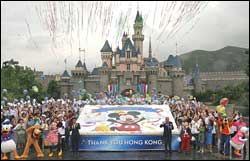 Shanghai determined to build own Disney -
A competitor to the already troubled Hong Kong Disneyland may emerge sooner than
expected because Shanghai has expressed determination to build its own
Disneyland theme park starting 2010, when it hosts the World Expo, according to
mainland media reports. The proposed location for the attraction has switched
from suburban Chuansha town in Shanghai's Pudong district to Chongming Island,
the China Business Journal reported, quoting an unidentified source. Project
investment has also increased to 40 billion yuan (HK$42.12 billion), from the
previous plan of 30 billion yuan. Negotiations for a Shanghai Chuansha
Disneyland was stopped last year when the probe into the city's pension fund
began, the China Business Journal said. Walt Disney Corporation has resumed
talks with the Shanghai government recently for a possible shift in location,
according to the newspaper report. Chuansha's main advantage is its location.
Only 10 minutes away from Shanghai Pudong International Airport, the easy access
would allow airport transit passengers to visit the park for up to 48 hours
without needing a visa. But as it is also within the Shanghai Pudong area, any
future land expansion would be very difficult. Chongming Island, situated at the
mouth of Yangtze River, has a population of 650,000 and an area of nearly 1,200
square kilometers. Its main advantage over Chuansha is that it is "virgin
territory," according to the report. The undeveloped island is said to be more
suitable for a theme park, allowing it to adopt the same model as Disney World
Orlando in Florida and be a "back to nature" park. The Chongming county
government has had plans to develop the island since 2004 and already set aside
land for a theme park as part of its plans to develop the economy in an
environmentally friendly way. Shanghai determined to build own Disney -
A competitor to the already troubled Hong Kong Disneyland may emerge sooner than
expected because Shanghai has expressed determination to build its own
Disneyland theme park starting 2010, when it hosts the World Expo, according to
mainland media reports. The proposed location for the attraction has switched
from suburban Chuansha town in Shanghai's Pudong district to Chongming Island,
the China Business Journal reported, quoting an unidentified source. Project
investment has also increased to 40 billion yuan (HK$42.12 billion), from the
previous plan of 30 billion yuan. Negotiations for a Shanghai Chuansha
Disneyland was stopped last year when the probe into the city's pension fund
began, the China Business Journal said. Walt Disney Corporation has resumed
talks with the Shanghai government recently for a possible shift in location,
according to the newspaper report. Chuansha's main advantage is its location.
Only 10 minutes away from Shanghai Pudong International Airport, the easy access
would allow airport transit passengers to visit the park for up to 48 hours
without needing a visa. But as it is also within the Shanghai Pudong area, any
future land expansion would be very difficult. Chongming Island, situated at the
mouth of Yangtze River, has a population of 650,000 and an area of nearly 1,200
square kilometers. Its main advantage over Chuansha is that it is "virgin
territory," according to the report. The undeveloped island is said to be more
suitable for a theme park, allowing it to adopt the same model as Disney World
Orlando in Florida and be a "back to nature" park. The Chongming county
government has had plans to develop the island since 2004 and already set aside
land for a theme park as part of its plans to develop the economy in an
environmentally friendly way.
December 5, 2007
 Hong Kong:
Billionaire Hong Kong businessman Li Ka-Shing has reportedly invested $60m
buying a stake in social networking website Facebook. Deal would appear to give
Li no more than a 0.4% stake in the company, though press reports say that he
has an option to invest a further $60 million. Agreement may pave the way for
cooperation between Facebook and Tom.com, an Internet group that Li controls.
Microsoft recently paid $240 million for a 1.6% stake, which would value
Facebook at $15 billion. Li appears to have bought the stake through a company
other than his main Hutchison Whampoa and Cheung Kong vehicles, though he did
not offer any further details. Hong Kong:
Billionaire Hong Kong businessman Li Ka-Shing has reportedly invested $60m
buying a stake in social networking website Facebook. Deal would appear to give
Li no more than a 0.4% stake in the company, though press reports say that he
has an option to invest a further $60 million. Agreement may pave the way for
cooperation between Facebook and Tom.com, an Internet group that Li controls.
Microsoft recently paid $240 million for a 1.6% stake, which would value
Facebook at $15 billion. Li appears to have bought the stake through a company
other than his main Hutchison Whampoa and Cheung Kong vehicles, though he did
not offer any further details.
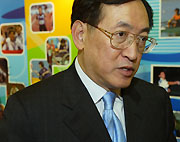 Health authorities of the Chinese mainland, Hong Kong and Macao held a joint
communication exercise Monday shortly after a man in east China's Jiangsu
Province died of avian flu on Sunday. The exercise was to test their cooperation
and coordination in mounting an emergency response in the event of a
cross-border incident of avian flu involving human cases. The Secretary for Food
and Health Dr. York Chow, who led Hong Kong's team in the exercise, said the
joint exercise was a valuable opportunity for the three places to review their
response actions via video-conference in respective command and control centers.
"The exercise has further bolstered collaboration and communication among the
three places in emergency preparedness and response for public health crisis,"
Chow said, adding "the importance of timely notification and collaboration for
the prevention of avian influenza and pandemic influenza was highlighted." The
Director of Health, Dr. P Y Lam, said that the Department of Health would
strengthen its work with health authorities on the Chinese mainland and in Macao
in the prevention of infectious diseases. It was the second joint exercise
organized under the Cooperation Agreement on Response Mechanism for Public
Health Emergencies signed by the three places in 2005. Code-named "Great Wall
2007", the exercise was based on a scenario in which several members of a family
on the Chinese mainland had been infected with avian flu during a visit to a
poultry market and one of them had traveled by public transport to Hong Kong via
Macao before symptoms emerged. During the exercise, emergency responses set out
in preparedness plans were tested, including the notification of counterparts in
the three places, epidemiological investigation of the affected patients,
contact tracing and medical surveillance for probable cases. More than 60 public
health officials and medical personnel took part in the exercise. Participating
organizations included the Food and Health Bureau, the Department of Health and
the Hospital Authority in Hong Kong, the Ministry of Health in Beijing, the
Jiangsu province Health Department and the Health Bureau of Macao. The scenario
of Monday's exercise unfolded when a 17-year-old girl living in east China's
Jiangsu province was confirmed to have been infected with avian influenza virus
after visiting a local poultry market with her mother, brother and uncle. Her
mother and brother also developed influenza symptoms while her uncle had arrived
in Hong Kong via Macao. The Ministry of Health promptly notified the Center for
Health Protection in Hong Kong and the Health Bureau of Macao of the case. In
order to control and prevent the spread of the disease, the health authorities
of the three places immediately swung into action. In Hong Kong, the Department
of Health promptly located the girl's uncle who had developed symptoms of
influenza upon arrival in Hong Kong. The man was taken to an isolation ward of
the Health Authority's Infectious Disease Center for treatment. A nasal swab
taken from him subsequently tested positive for the deadly H5N1 influenza virus
strain. The Hong Kong Special Administrative Region government activated the
"Serious Response Level" and the Health Authority activated the corresponding
contingency measures. After epidemiological investigation and contact tracing,
the Department of Health in Hong Kong found 22 people who had had contact with
the man while he traveled and stayed in Hong Kong. All of them were taken to a
holiday village for quarantine and were put under medical surveillance.
Health authorities of the Chinese mainland, Hong Kong and Macao held a joint
communication exercise Monday shortly after a man in east China's Jiangsu
Province died of avian flu on Sunday. The exercise was to test their cooperation
and coordination in mounting an emergency response in the event of a
cross-border incident of avian flu involving human cases. The Secretary for Food
and Health Dr. York Chow, who led Hong Kong's team in the exercise, said the
joint exercise was a valuable opportunity for the three places to review their
response actions via video-conference in respective command and control centers.
"The exercise has further bolstered collaboration and communication among the
three places in emergency preparedness and response for public health crisis,"
Chow said, adding "the importance of timely notification and collaboration for
the prevention of avian influenza and pandemic influenza was highlighted." The
Director of Health, Dr. P Y Lam, said that the Department of Health would
strengthen its work with health authorities on the Chinese mainland and in Macao
in the prevention of infectious diseases. It was the second joint exercise
organized under the Cooperation Agreement on Response Mechanism for Public
Health Emergencies signed by the three places in 2005. Code-named "Great Wall
2007", the exercise was based on a scenario in which several members of a family
on the Chinese mainland had been infected with avian flu during a visit to a
poultry market and one of them had traveled by public transport to Hong Kong via
Macao before symptoms emerged. During the exercise, emergency responses set out
in preparedness plans were tested, including the notification of counterparts in
the three places, epidemiological investigation of the affected patients,
contact tracing and medical surveillance for probable cases. More than 60 public
health officials and medical personnel took part in the exercise. Participating
organizations included the Food and Health Bureau, the Department of Health and
the Hospital Authority in Hong Kong, the Ministry of Health in Beijing, the
Jiangsu province Health Department and the Health Bureau of Macao. The scenario
of Monday's exercise unfolded when a 17-year-old girl living in east China's
Jiangsu province was confirmed to have been infected with avian influenza virus
after visiting a local poultry market with her mother, brother and uncle. Her
mother and brother also developed influenza symptoms while her uncle had arrived
in Hong Kong via Macao. The Ministry of Health promptly notified the Center for
Health Protection in Hong Kong and the Health Bureau of Macao of the case. In
order to control and prevent the spread of the disease, the health authorities
of the three places immediately swung into action. In Hong Kong, the Department
of Health promptly located the girl's uncle who had developed symptoms of
influenza upon arrival in Hong Kong. The man was taken to an isolation ward of
the Health Authority's Infectious Disease Center for treatment. A nasal swab
taken from him subsequently tested positive for the deadly H5N1 influenza virus
strain. The Hong Kong Special Administrative Region government activated the
"Serious Response Level" and the Health Authority activated the corresponding
contingency measures. After epidemiological investigation and contact tracing,
the Department of Health in Hong Kong found 22 people who had had contact with
the man while he traveled and stayed in Hong Kong. All of them were taken to a
holiday village for quarantine and were put under medical surveillance.
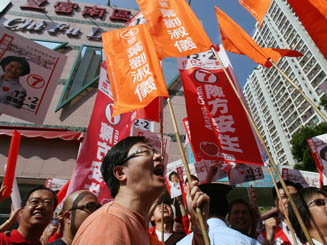 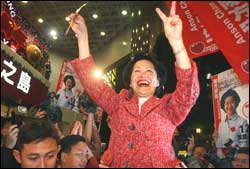 The woman once called the "conscience of Hong Kong," Anson Chan Fang On-sang has
won the most closely contested election since the handover in 1997. Chan
defeated her archrival Regina Ip Lau Suk-yee by 38,324 votes when final results
were released at 3.30am. Chan had 175,874 votes against Ip's 137,550 in the
Legislative Council by-election. I'm feeling great. Chan said with her
trade-mark smile. More than 320,000 people, or 52 percent of the electorate,
cast their votes. Polling stations closed at 10.30pm. Chan campaigned on a
platform of democracy and universal suffrage. Flanked by cheering supporters and
core backers, including pan-democratic lawmakers, Chan thanked Hong Kong people
for their support and blessings.
The woman once called the "conscience of Hong Kong," Anson Chan Fang On-sang has
won the most closely contested election since the handover in 1997. Chan
defeated her archrival Regina Ip Lau Suk-yee by 38,324 votes when final results
were released at 3.30am. Chan had 175,874 votes against Ip's 137,550 in the
Legislative Council by-election. I'm feeling great. Chan said with her
trade-mark smile. More than 320,000 people, or 52 percent of the electorate,
cast their votes. Polling stations closed at 10.30pm. Chan campaigned on a
platform of democracy and universal suffrage. Flanked by cheering supporters and
core backers, including pan-democratic lawmakers, Chan thanked Hong Kong people
for their support and blessings.
Beijing is considering plans to let
foreign governments issue yuan- denominated bonds in the mainland and hopes Hong
Kong and overseas companies will list on its stock markets, Xinhua News Agency
cited senior officials as saying.
Hong Kong’s retail sales volume
continued to display a strong performance witnessing a 9.3 per cent increase in
volume over the first ten months of this year as compared to the same period a
year earlier, latest figures released by the Census and Statistics Department
(C&SD) on Monday showed. A government spokesman said, “[These figures] reflect
the upbeat consumer sentiment on the back of the robust economic fundamentals
and improving labour market.” The value of total retail sales in October this
year was provisionally estimated at HK$20.7 billion, increasing by 16.6 per cent
over a year earlier. After netting out the effect of price changes over the same
period, the volume of total retail sales also increased by 12.8 per cent in
October this year over a year earlier. “This marks the fifth consecutive month
of double-digit year-on-year growth in volume terms. The booming stock market
during the month, together with the continued surge in the number of incoming
visitors, also helped,” the spokesman added. Comparing October this year with
October last year, the volume of sales of electrical goods and photographic
equipment increased the most, by 32.5 per cent. This was followed by sales of
motor vehicles and parts (up 29.0 per cent in volume); jewellery, watches and
clocks, and valuable gifts (up 27.4 per cent); footwear, allied products and
other clothing accessories (up19.3 per cent); wearing apparel (up 14.0 per
cent); commodities in department stores (up14.0 per cent); furniture and
fixtures (up 6.5 per cent); commodities in supermarkets (up2.4 per cent); and
fuels (up 0.4 per cent). On the other hand, the volume of sales of food,
alcoholic drinks and tobacco in October this year decreased by 9.1 per cent as
compared with a year earlier. The spokesman expressed optimism that sales would
continue to increase in the coming months. “Rising labor incomes and a better
job market, together with the expansion of inbound tourism, should provide firm
support to retail business in the period ahead,” he explained.
 China:
Food safety law will punish lax officials - Guangdong action to raise product
quality - Guangdong officials will be punished for any serious food safety
incident under the first ever food safety law enacted on the mainland amid
growing concerns about the quality of its products. The law, passed by the
Standing Committee of the Guangdong People's8 Congress on Saturday, will impose
tough penalties on food retailers and restaurant owners who fail to recall all
food products that are found to be unsafe. According to the legislation, which
will come into effect on January 1, those failing to do this will face fines
ranging from 5,000 yuan to 50,000 yuan. Guangdong, which is a major food
supplier to Hong Kong, came under the media spotlight last week when
Vice-Premier Wu Yi and a team of officials conducted two days of food-quality
spot checks in the province - part of a four-month campaign against poor product
quality that began in August. While officials and some experts welcomed the new
law as a means to curb malpractice by food suppliers and producers, some
consumers have voiced concern over its implementation. Under the law, government
officials and the "person in charge" will be punished whenever a food-safety
problem causes "serious consequences". The law also states that inspections
should not disrupt the normal operation of an enterprise, and inspection staff
should not receive financial or other benefits from manufacturers. Chen Yongquan
, a food safety expert from South China Agriculture University in Guangzhou,8
said the provincial law was the first piece of legislation on food safety on the
mainland. "In the past, it's been pretty hard for the provincial government to
manage small-scale food suppliers and producers because they are scattered
around the province," Professor Chen said. "But now they have the legal power to
act, so it will be easier." Chan Xi , 32, a housewife in Panyu who previously
ran her own business, said she liked the new law's recall system because in the
past people didn't know how to return substandard food. "But I am afraid that it
will be difficult for the government to find small producers, since some of them
don't provide real information about themselves, just like in the fake
milk-powder event several years ago," she said. "Even the addresses and names of
some of the milk-powder makers were forged. So how could they recall the bad
food?" Although welcoming the new law, Guangzhou housewife Zhou Yanqin , 63,
said it might not be easy for the government to implement it. "I heard some
mooncake producers recalled expired fillings, but they still used them the next
year," Ms Zhou said.She said that food producers who failed in their duties
should be severely punished.
China:
Food safety law will punish lax officials - Guangdong action to raise product
quality - Guangdong officials will be punished for any serious food safety
incident under the first ever food safety law enacted on the mainland amid
growing concerns about the quality of its products. The law, passed by the
Standing Committee of the Guangdong People's8 Congress on Saturday, will impose
tough penalties on food retailers and restaurant owners who fail to recall all
food products that are found to be unsafe. According to the legislation, which
will come into effect on January 1, those failing to do this will face fines
ranging from 5,000 yuan to 50,000 yuan. Guangdong, which is a major food
supplier to Hong Kong, came under the media spotlight last week when
Vice-Premier Wu Yi and a team of officials conducted two days of food-quality
spot checks in the province - part of a four-month campaign against poor product
quality that began in August. While officials and some experts welcomed the new
law as a means to curb malpractice by food suppliers and producers, some
consumers have voiced concern over its implementation. Under the law, government
officials and the "person in charge" will be punished whenever a food-safety
problem causes "serious consequences". The law also states that inspections
should not disrupt the normal operation of an enterprise, and inspection staff
should not receive financial or other benefits from manufacturers. Chen Yongquan
, a food safety expert from South China Agriculture University in Guangzhou,8
said the provincial law was the first piece of legislation on food safety on the
mainland. "In the past, it's been pretty hard for the provincial government to
manage small-scale food suppliers and producers because they are scattered
around the province," Professor Chen said. "But now they have the legal power to
act, so it will be easier." Chan Xi , 32, a housewife in Panyu who previously
ran her own business, said she liked the new law's recall system because in the
past people didn't know how to return substandard food. "But I am afraid that it
will be difficult for the government to find small producers, since some of them
don't provide real information about themselves, just like in the fake
milk-powder event several years ago," she said. "Even the addresses and names of
some of the milk-powder makers were forged. So how could they recall the bad
food?" Although welcoming the new law, Guangzhou housewife Zhou Yanqin , 63,
said it might not be easy for the government to implement it. "I heard some
mooncake producers recalled expired fillings, but they still used them the next
year," Ms Zhou said.She said that food producers who failed in their duties
should be severely punished.
Chinese crude steel output is
estimated to hit 490 million tons this year, 16 percent higher than the figure
last year, said Luo Bingsheng, deputy head of China Iron and Steel Association
on Saturday.
 China vies for a piece of Alaskan gas project - Five companies applied to build
the pipeline, including Sinopec, TransCanada Corp, ConocoPhillips.
China vies for a piece of Alaskan gas project - Five companies applied to build
the pipeline, including Sinopec, TransCanada Corp, ConocoPhillips.
 The
New York Stock Exchange (NYSE) will officially inaugurate its Beijing office
next week, the exchange said on Monday. NYSE Euronext (NYX) Chief Executive
Officer Duncan L. Niederauer will travel to the Chinese capital to host the
grand opening on Dec. 11 in his first overseas trip since becoming exchange boss
earlier this year. NYSE Euronext is a holding company that was created by the
merger of the NYSE Group, Inc. and Euronext N.V. in April. NYSE Euronext started
trading on April 4 and now operates the world's largest and most liquid exchange
group. On Sept. 4, it was announced the NYSE had received approval from the
China Securities Regulatory Commission (CSRC) to open a representative office in
Beijing. It was the first foreign exchange to receive such approval. Since July
1, representative offices of foreign exchanges have been allowed to set up in
the country if approved. The new office will become the NYSE's center of
operations for China in advancing its brand and services to its listed companies
operating in the country. Catherine R. Kinney, president and co-chief operating
officer of NYSE Euronext, said during her recent trip to China in September that
the opening was a historical event for both the New York-based stock exchange
and global capital markets. It would help the NYSE to woo more initial public
offerings in the fast-growing Chinese economy. The NYSE currently lists a total
of 49 Chinese companies, including 38 from China's mainland. Others listed
include six Hong Kong companies and five from Taiwan. This year, 14 Chinese
mainland companies have launched initial public offerings on the famed exchange.
As of Nov. 30, the total market capitalization of Chinese mainland companies on
the NYSE was 1.1 trillion U.S. dollars. At the same time, Hong Kong and Macao
authorities received notification from the Chinese mainland that the index
patient's mother was confirmed to have been infected with avian influenza virus.
The exercise ended when the participants exchanged information on their
respective actions and the latest situation in the three places and the
situation was subsequently brought under control. The
New York Stock Exchange (NYSE) will officially inaugurate its Beijing office
next week, the exchange said on Monday. NYSE Euronext (NYX) Chief Executive
Officer Duncan L. Niederauer will travel to the Chinese capital to host the
grand opening on Dec. 11 in his first overseas trip since becoming exchange boss
earlier this year. NYSE Euronext is a holding company that was created by the
merger of the NYSE Group, Inc. and Euronext N.V. in April. NYSE Euronext started
trading on April 4 and now operates the world's largest and most liquid exchange
group. On Sept. 4, it was announced the NYSE had received approval from the
China Securities Regulatory Commission (CSRC) to open a representative office in
Beijing. It was the first foreign exchange to receive such approval. Since July
1, representative offices of foreign exchanges have been allowed to set up in
the country if approved. The new office will become the NYSE's center of
operations for China in advancing its brand and services to its listed companies
operating in the country. Catherine R. Kinney, president and co-chief operating
officer of NYSE Euronext, said during her recent trip to China in September that
the opening was a historical event for both the New York-based stock exchange
and global capital markets. It would help the NYSE to woo more initial public
offerings in the fast-growing Chinese economy. The NYSE currently lists a total
of 49 Chinese companies, including 38 from China's mainland. Others listed
include six Hong Kong companies and five from Taiwan. This year, 14 Chinese
mainland companies have launched initial public offerings on the famed exchange.
As of Nov. 30, the total market capitalization of Chinese mainland companies on
the NYSE was 1.1 trillion U.S. dollars. At the same time, Hong Kong and Macao
authorities received notification from the Chinese mainland that the index
patient's mother was confirmed to have been infected with avian influenza virus.
The exercise ended when the participants exchanged information on their
respective actions and the latest situation in the three places and the
situation was subsequently brought under control.
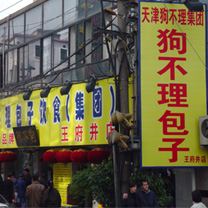 Goubuli's
store in Beijing's Wangfujing snack street. As a 150-year-old brand, Goubuli is
famous across China and even known to many foreigners. Goubuli's
store in Beijing's Wangfujing snack street. As a 150-year-old brand, Goubuli is
famous across China and even known to many foreigners.
December 4, 2007
 Hong Kong:
Digital broadcasting will cover half of Hong Kong's population at its initial
launch, up to 75 percent by the 2008 Beijing Olympics and the whole city by
2011, an official said on Saturday. Speaking on a radio show, Principal
Assistant Secretary for Commerce and Economic Development Kevin Choi said
analogue broadcasting will be switched off in 2012 in Hong Kong subject to
further market and technical studies. He explained that the digital switchover
will solve reception problems such as snowing or ghosting, offer more
programming choices, improve audio-visual quality and enable broadcasters to
test new services on the digital platform. Choi said that two local television
station will simulcast their existing four television program channels in
digital format, and launch new free channels in both standard- and
high-definition formats. The two stations will still air the four existing
channels in analogue format so viewers can choose when to switch to digital
broadcasting according to their own needs and at their own pace. Choi said the
Hong Kong Special Administrative Region government is considering ending
analogue broadcasting in 2012, taking into account the public's acceptance of
digital services. Hong Kong:
Digital broadcasting will cover half of Hong Kong's population at its initial
launch, up to 75 percent by the 2008 Beijing Olympics and the whole city by
2011, an official said on Saturday. Speaking on a radio show, Principal
Assistant Secretary for Commerce and Economic Development Kevin Choi said
analogue broadcasting will be switched off in 2012 in Hong Kong subject to
further market and technical studies. He explained that the digital switchover
will solve reception problems such as snowing or ghosting, offer more
programming choices, improve audio-visual quality and enable broadcasters to
test new services on the digital platform. Choi said that two local television
station will simulcast their existing four television program channels in
digital format, and launch new free channels in both standard- and
high-definition formats. The two stations will still air the four existing
channels in analogue format so viewers can choose when to switch to digital
broadcasting according to their own needs and at their own pace. Choi said the
Hong Kong Special Administrative Region government is considering ending
analogue broadcasting in 2012, taking into account the public's acceptance of
digital services.
 Leon Lai plays Peking Opera master Mei Lanfang in Chen Kaige's new film. Scenes
from Hong Kong pop star Leon Lai's upcoming portrayal of late Peking Opera
virtuoso Mei Lanfang debuted when a film magazine revealed stills from the
biography directed by Chen Kaige. In one of the photos, Leon Lai is dressed in
opera costumes from a Dan role, since Mei Lanfang was the most famous
cross-gender Dan (which refers to female roles in Peking Opera) performer of all
time. Chen Kaige's film, "Mei Lanfang," chronicles the legend's career from
childhood. Ever since Leon Lai was selected to play the adult Mei Lanfang,
skeptics have debated whether the young star can manage the mature role. Lai,
who was born in Beijing, has been polishing his Peking Opera skills heavily,
following professionals including Mei Baojiu, Mei Lanfang's youngest son.
However, criticism has continued after the stills revealed that Lai's appearance
may not be good enough. Meanwhile, a report says Zhang Ziyi, who plays a fellow
singer of Mei Lanfang in the film, has left the entourage after completing her
parts. The film is slated to premiere next year.
Leon Lai plays Peking Opera master Mei Lanfang in Chen Kaige's new film. Scenes
from Hong Kong pop star Leon Lai's upcoming portrayal of late Peking Opera
virtuoso Mei Lanfang debuted when a film magazine revealed stills from the
biography directed by Chen Kaige. In one of the photos, Leon Lai is dressed in
opera costumes from a Dan role, since Mei Lanfang was the most famous
cross-gender Dan (which refers to female roles in Peking Opera) performer of all
time. Chen Kaige's film, "Mei Lanfang," chronicles the legend's career from
childhood. Ever since Leon Lai was selected to play the adult Mei Lanfang,
skeptics have debated whether the young star can manage the mature role. Lai,
who was born in Beijing, has been polishing his Peking Opera skills heavily,
following professionals including Mei Baojiu, Mei Lanfang's youngest son.
However, criticism has continued after the stills revealed that Lai's appearance
may not be good enough. Meanwhile, a report says Zhang Ziyi, who plays a fellow
singer of Mei Lanfang in the film, has left the entourage after completing her
parts. The film is slated to premiere next year.
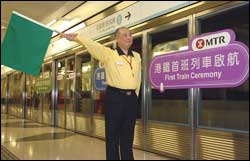 Sunday's 5.28am departure of the Mass Transit Railway train from East Tsim Sha
Tsui station opened a new chapter in Hong Kong's railway history. The MTR and
Kowloon-Canton Railway corporations officially merged yesterday to become the
city's only railway service provider under the name of MTR Corp. The company's
nine heavy rail lines, the Airport Express and the Light Rail will make up a
comprehensive transport network. By 9pm, 2.8 million passengers had ridden on
the two rails, compared with 2.9 million for the whole of last Sunday. Speaking
at a ceremony at Nam Cheong Station yesterday to mark the change, MTRC chairman
Raymond Ch'ien Kuo-fung said he had waited three years for the plan to come
true. Chief Secretary for Administration Henry Tang Ying-yen said the MTR and
the KCR were both renowned for their excellent railway services. The first job
of the post-merger MTRC was to reduce fares.
Sunday's 5.28am departure of the Mass Transit Railway train from East Tsim Sha
Tsui station opened a new chapter in Hong Kong's railway history. The MTR and
Kowloon-Canton Railway corporations officially merged yesterday to become the
city's only railway service provider under the name of MTR Corp. The company's
nine heavy rail lines, the Airport Express and the Light Rail will make up a
comprehensive transport network. By 9pm, 2.8 million passengers had ridden on
the two rails, compared with 2.9 million for the whole of last Sunday. Speaking
at a ceremony at Nam Cheong Station yesterday to mark the change, MTRC chairman
Raymond Ch'ien Kuo-fung said he had waited three years for the plan to come
true. Chief Secretary for Administration Henry Tang Ying-yen said the MTR and
the KCR were both renowned for their excellent railway services. The first job
of the post-merger MTRC was to reduce fares.
Night workers beware - the
"graveyard shift" could be killing you. Hong Kong doctors and unionists are
scrambling for more information after the World Health Organization announced on
Friday that, starting next month, it will classify overnight shift work as a
"probable" carcinogen. The International Agency for Research on Cancer, WHO's
cancer arm, will put shift duty in the same category as cancer-causing agents
such as anabolic steroids, ultraviolet radiation and diesel-engine exhaust. It
is based on research that finds higher rates of breast and prostate cancer among
women and men whose work day starts after dark. The news has raised concern
among unions since many people in Hong Kong work at night. The Hong Kong
Federation of Trade Unions and the Hong Kong Confederation of Trade Unions have
called for guidelines and legislation to ensure those working night shifts have
sufficient time off to maintain good health. Confederation spokesman Cheng Ching-fat
estimates about 25 percent of the working population, or about half a million
people, work night shifts. They are mostly in the traditional service industries
such as hotels, hospitals and logistics as well as in the disciplinary services
such as the police and fire services. Recently, more people have been put on
night duties, with restaurants and clinics turning to 24-hour services. "Night
shifts are also common in the financial sector, with some people overseeing
overseas stock exchanges," he said. Cheng suggested those on night shift should
have two days off after working for four days. He plans to raise the issue for
discussion within the union. Local doctors are anxiously awaiting more details
to be released by the WHO. But they point out the link between cancer and
working at night remains in dispute as there is no established research to
confirm the risk. Scientists suspect the graveyard shift disrupts the circadian
rhythm - the body's biological clock. The hormone melatonin, which can suppress
tumor development, is normally produced at night. Light shuts down melatonin
production, so people working in artificial light may have lower melatonin
levels, which scientists think can raise their chances of developing cancer.
Oncologist Jonathan Sham Shun- tong suggested people should sleep in complete
darkness, which would help their bodies produce melatonin. Other doctors suggest
night workers should focus on their diet and lifestyle to ensure they had
sufficient nutrition and rest. Taxi-driver Lai Kin-man, in his fotties, has been
working night shifts for nearly 20 years and says he does not have any health
problems. "The WHO warning doesn't really bother me."
The Centre for Food Safety was
Friday night scrambling to ferret out the canned pork of two popular mainland
brands after Singapore banned the products, alleging they carry a cancer-causing
antibiotic. But the health authority said there is no plan for a product recall
until tests had been carried out. The center said it had collected samples of
Maling and Gulong canned meat for testing. It was also in contact with mainland
authorities for more information on the incident. According to Singapore's The
Straits Times, the city state's Agri-Food and Veterinary Authority had destroyed
a consignment of canned pork products from the two food-processing plants after
finding traces of nitrofurans, an antibiotic used for killing bacteria and which
can cause cancer. Maling insisted its consignments to Hong Kong are different
from those sent to Singapore. "There is absolutely no need to worry," Maling
quality control spokeswoman Shi Min said. Shi also denied using any poisonous
additives during manufacturing, saying: "Nitrofurans are poisonous, we will
definitely not put that into our cans. No factory will be so stupid to use it in
the production process." Shi did not rule out the possibility the chemical may
have been fed to the pigs. Secretary for Food and Health York Chow Yat-ngok said
there would be no recall before it was determined if Singapore and Hong Kong
received the same consignment of products. Hong Kong Food Trades Association
vice president Lee Kwong-lam said the government should check if the products
being sold in Hong Kong are from the same batch as those shipped to Singapore.
Supermarket chain ParknShop said it was in contact with the suppliers and
believed the products sold in its outlets were from different consignments, so
it had no plan to remove them from the shelves. Wellcome said it was still
seeking confirmation with the wholesalers. Consumer Council chief executive
Connie Lau Yin-hing said consumers should not worry. "Hong Kong has adequate
legislation to ban the use of poisonous chemicals in canned meat products," she
said. "There is no need to put a ban on the sale before the release of food-test
results in Hong Kong."
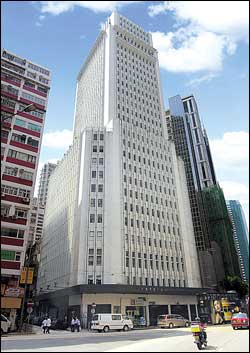 After fierce bidding, Swire
Pacific (0019) bought an office tower on Hong Kong Island for HK$1.36 billion,
an amount above expectations, reflecting developers' optimism on the commercial
market. The sale of Tai Sang Commercial Building, situated on a 9,600 square
foot site near Swire's Three Pacific Place, where Wan Chai meets Admiralty,
attracted 26 bids from seven paddles. "It is a fair price, and it indicates a
solid office market," said Swire Properties chief operating officer Gordon
Ongley. The building, originally belonging to the family of Ma Kam-chan, founder
of the bank-to-property conglomerate Tai Sang group, has a total floor area of
185,447 sq ft. The transaction price, 60 percent higher than the HK$850 million
opening bid, translates to HK$7,334 per sq ft. Surveyors have estimated the
28-story tower to be worth between HK$900 million and HK$1 billion. Swire will
keep the 30-year-old office building and spend HK$150 million to renovate it,
Ongley said. With Three Pacific Place fully let, the company will have to expand
its portfolio to provide enough space for the expansion of clients. After fierce bidding, Swire
Pacific (0019) bought an office tower on Hong Kong Island for HK$1.36 billion,
an amount above expectations, reflecting developers' optimism on the commercial
market. The sale of Tai Sang Commercial Building, situated on a 9,600 square
foot site near Swire's Three Pacific Place, where Wan Chai meets Admiralty,
attracted 26 bids from seven paddles. "It is a fair price, and it indicates a
solid office market," said Swire Properties chief operating officer Gordon
Ongley. The building, originally belonging to the family of Ma Kam-chan, founder
of the bank-to-property conglomerate Tai Sang group, has a total floor area of
185,447 sq ft. The transaction price, 60 percent higher than the HK$850 million
opening bid, translates to HK$7,334 per sq ft. Surveyors have estimated the
28-story tower to be worth between HK$900 million and HK$1 billion. Swire will
keep the 30-year-old office building and spend HK$150 million to renovate it,
Ongley said. With Three Pacific Place fully let, the company will have to expand
its portfolio to provide enough space for the expansion of clients.
China Railway bags HK$19.2b IPO
proceeds - China Railway Group easily raised the maximum HK$19.2 billion target
for its initial public offering after a flood of orders from global investors, a
sign it will not join the growing list of recent first-day trading failures.
China Railway, the world's third-biggest construction contractor, fixed its
H-share offering at the high end of expected prices, according to a source close
to the deal. The company's shares will make their trading debut in Hong Kong
next Friday and in Shanghai on Monday. China Railway sold 3.326 billion H shares
at HK$5.78 each amid strong bidding from institutional and retail investors, the
source said. It marketed the shares at between HK$5.03 and HK$5.78. The offering
to retail investors was more than 208 times covered, leading to the retail
tranche being increased to 25 per cent from 10 per cent. The company also drew
strong demand from institutions which submitted more than US$60 billion worth of
orders. "The recent market weakness has not had a negative impact on China
Railway, as people are still rushing to find good investments," said another
source, adding that demand from the oil-rich Middle East was strong. At the same
time, China Railway raised 23.6 billion yuan selling A shares on the mainland
market, fixing the price at 4.80 yuan each. The combined offering in Hong Kong
and the mainland amounts to US$5.5 billion, making it the fifth-biggest initial
public offering on the mainland this year, according to Thomson Financial. China
Railway is expected to gain from the country's accelerating infrastructure
investment from highways to airports. Beijing plans to spend 3.8 trillion yuan
on transport and infrastructure construction until 2010. The company's earnings
potential means it is likely to shrug off the negative impact of other recent
market debuts. Sinotruk (Hong Kong) dived 15.68 per cent on its trading debut
this week while Sinotrans Shipping (SEHK: 0368) sank 12.96 per cent. As of
yesterday, Sinotruk and Sinotrans (SEHK: 0598) were still 5.1 per cent and 16.1
per cent respectively below their offer prices. Analysts say high market
volatility and uncertainties over the health of the global financial market have
dampened investor demand for some smaller offerings. Dongyue Group, the
mainland's largest fluorochemical firm, priced its shares at the low end of its
expected range yesterday, sources said. "The greater volatility in the global
market recently has reduced hedge fund appetite for participating in initial
public offerings," said one banker working on a Hong Kong share sale. "To be
honest, they have been the biggest buyers in the [initial public offering]
market." BYD Electric, spun off from BYD, also got a lower valuation than
planned for its HK$7.7 billion offering, one source said. It was selling 550
million shares at HK$10.74 to HK$14 each, or 13.6 to 17.7 times the firm's
earnings next year, the source said.
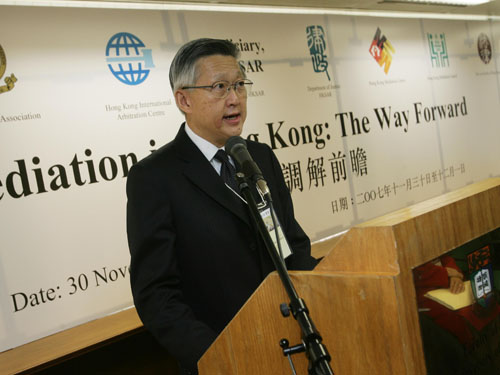 Chief
Justice Andrew Li Kwok-nang and Secretary for Justice Wong Yan-lung yesterday
called on the rising number of mediation service providers to make a concerted
effort to develop a common accreditation benchmark. Mr Justice Li also said
mediation should be made a compulsory part of the professional qualification
course for lawyers, whose current understanding of the mediation process was
"very far from satisfactory". He added that students should also be educated
about mediation at school. "Time has moved on," Mr Justice Li said. "We are
coming to a stage where we need to have a common benchmark ... all mediation
bodies should co-operate to develop this benchmark as soon as practicable," he
said at a conference on mediation in Hong Kong yesterday. Chief
Justice Andrew Li Kwok-nang and Secretary for Justice Wong Yan-lung yesterday
called on the rising number of mediation service providers to make a concerted
effort to develop a common accreditation benchmark. Mr Justice Li also said
mediation should be made a compulsory part of the professional qualification
course for lawyers, whose current understanding of the mediation process was
"very far from satisfactory". He added that students should also be educated
about mediation at school. "Time has moved on," Mr Justice Li said. "We are
coming to a stage where we need to have a common benchmark ... all mediation
bodies should co-operate to develop this benchmark as soon as practicable," he
said at a conference on mediation in Hong Kong yesterday.
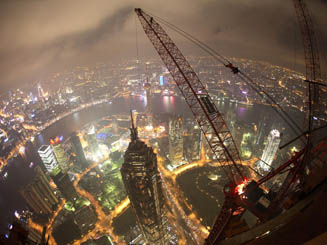 High prices, state policy fears keep
mainland buyers away - Property buyers in big mainland cities have apparently
hit their affordability limits and are staying away from the market in protest
against high prices. High prices, state policy fears keep
mainland buyers away - Property buyers in big mainland cities have apparently
hit their affordability limits and are staying away from the market in protest
against high prices.
 China:
Chinese Vice Premier Wu Yi on Friday asked the country's quality watchdogs to
beef up quality checks of food and toy exports ahead of the coming Christmas and
New Year holidays. "We must let no substandard products be exported (for the
holiday season)," Wu said while addressing a work conference for the country's
four-month-long nationwide product quality campaign launched in August.
China:
Chinese Vice Premier Wu Yi on Friday asked the country's quality watchdogs to
beef up quality checks of food and toy exports ahead of the coming Christmas and
New Year holidays. "We must let no substandard products be exported (for the
holiday season)," Wu said while addressing a work conference for the country's
four-month-long nationwide product quality campaign launched in August.
  Crowned Miss China Zhang Zilin(C), first runner-up Miss Angola Micaela REIS (2nd
L rear) and second runner-up Miss Mexico Carolina MORAN GORDILLO (2nd R rear )
pose during the 2007 Miss World Competition Final at the Beauty Crown theater in
Sanya, south China's Hainan Province, Dec. 1, 2007. Contestants from 106
countries and regions competed at the final of the 57th Miss World Competition
in Sanya on Saturday.
Crowned Miss China Zhang Zilin(C), first runner-up Miss Angola Micaela REIS (2nd
L rear) and second runner-up Miss Mexico Carolina MORAN GORDILLO (2nd R rear )
pose during the 2007 Miss World Competition Final at the Beauty Crown theater in
Sanya, south China's Hainan Province, Dec. 1, 2007. Contestants from 106
countries and regions competed at the final of the 57th Miss World Competition
in Sanya on Saturday.
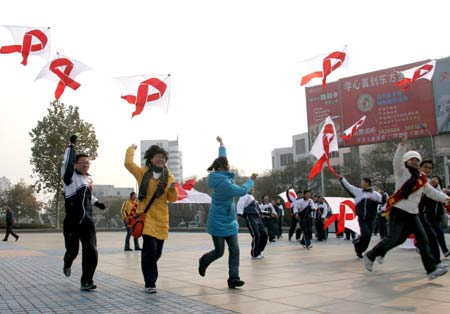 Volunteers fly kites carrying red ribbon
at the Renmin Square in Weihai, a coastal city in east China's Shandong
Province, Dec. 1, 2007. A group of volunteers from local medical institutions
and Shandong University Weihai Branch gathered on the World AIDS Day to
popularize knowledge about AIDS and promote the awareness of preventing the
epidemic. Volunteers fly kites carrying red ribbon
at the Renmin Square in Weihai, a coastal city in east China's Shandong
Province, Dec. 1, 2007. A group of volunteers from local medical institutions
and Shandong University Weihai Branch gathered on the World AIDS Day to
popularize knowledge about AIDS and promote the awareness of preventing the
epidemic.
 China's diving prince, 2000 and
2004 Olympic champion Tian Liang (R) and 2005 Super Girl contestant Ye Yiqian
(L) exchange rings at their wedding ceremony in Shangri-La Hotel, Xi'an of
Northwest China November 29, 2007. The pair's love story has been in spotlight
in China since 2006. China's diving prince, 2000 and
2004 Olympic champion Tian Liang (R) and 2005 Super Girl contestant Ye Yiqian
(L) exchange rings at their wedding ceremony in Shangri-La Hotel, Xi'an of
Northwest China November 29, 2007. The pair's love story has been in spotlight
in China since 2006.
More Chinese tourists expected to
visit U.S. - More Chinese tourists are expected to visit the United States as
new travel rules between the two nations are pending, a report said on Sunday.
Southern California is a likely destination for middle- and upper-class visitors
with money to spend, said the Los Angeles Times. Travels agencies are preparing
for what they hope could be a boom in new Chinese tourism to the United States
that is expected to occur next year. Both nations are finalizing a deal to ease
entry restrictions and lift a ban in China on promoting travel to the United
States, according to the paper. The negotiations have been going on for several
years, but China's government news agencies and sources at the U.S. Commerce
Department said a deal should be completed within the next few weeks, said the
paper. The new travel rules are expected to be a particular boom to Southern
California, which already sees more Chinese tourists -- 110,000 in Los Angeles
County last year -- than anywhere else in the United States. But travel
officials expect that number to grow significantly if more members of China's
emerging middle and upper classes are able to travel to the region for
vacations. China's travel industry is currently prohibited from marketing the
United States as a travel destination because of disputes over the strict entry
process initiated after 9/11 -- a reality that U.S. officials blame on the need
for national security and concerns about visitors overstaying their visas, said
the paper.
China's Hainan Airlines has become
Hungary's chartered carrier for the 2008 Beijing Olympic Games in a deal signed
Friday with the Hungarian Olympic Committee.
Investors' concerns over a growth
"hangover" from domestic over-investment are unwarranted, said a UBS report
released earlier this week about China's macroeconomic trends in 2008. Jonathan
Anderson, UBS' senior analyst on global emerging markets, made this comment in
"The 2008 China Macro Almanac" amid worries that the country's economy is set to
overheat, with its double-digit gross domestic product (GDP) and a monthly
consumer price index (CPI) of more than six percent. "The current high headline
CPI inflation rate is mostly due to temporary supply-related spikes in a few
goods categories," said the report, adding that the CPI would fall throughout
the first half of 2008. The optimism of the report comes from the buoyant
margins in most industrial and service sectors. While profits dropped sharply in
heavy industrial firms between 2004 and 2006, they have already recovered
visibly over the past 12 months, the report said. The report anticipated the
country would continue its double-digit growth despite a tiny slowdown of 0.6
percent in 2008 from more than 11 percent this year, which mainly came from
falling net exports. A potential recession in the United States could be a major
external risk for Chinese economy, but past experience has shown that domestic
growth is "insulated from even the most aggressive export shocks", said the
report.
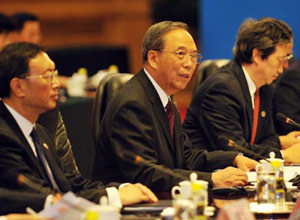 China is willing to create sound
conditions for Japanese firms to invest in China, Chinese Vice Premier Zeng
Peiyan said at the on-going first China-Japan high-level economic dialogue. China is willing to create sound
conditions for Japanese firms to invest in China, Chinese Vice Premier Zeng
Peiyan said at the on-going first China-Japan high-level economic dialogue.
 The world's second-largest PC maker
Dell Inc plans to boost its presence in China's smaller cities to take on rivals
Hewlett-Packard, Lenovo and Acer. The company will expand to 1,000 Chinese
cities from the current 45, Steve Felice, president of Dell, Asia-Pacific and
Japan, said on Friday. "Most recently, we've seen a propensity to move up
dramatically in the fourth-, fifth- and sixth-tier cities (in China)," he said.
"Some of that will be done through continued expansion of our direct sales model
and some of that will be done through increased partnerships," he said, without
giving a specific timeframe for the expansion. He also said Dell is considering
turning its existing customer experience centers into retail outlets. Dell has
partnered with Gome Electrical Appliances to sell PCs in the retailer's 170
outlets in China. The world's second-largest PC maker
Dell Inc plans to boost its presence in China's smaller cities to take on rivals
Hewlett-Packard, Lenovo and Acer. The company will expand to 1,000 Chinese
cities from the current 45, Steve Felice, president of Dell, Asia-Pacific and
Japan, said on Friday. "Most recently, we've seen a propensity to move up
dramatically in the fourth-, fifth- and sixth-tier cities (in China)," he said.
"Some of that will be done through continued expansion of our direct sales model
and some of that will be done through increased partnerships," he said, without
giving a specific timeframe for the expansion. He also said Dell is considering
turning its existing customer experience centers into retail outlets. Dell has
partnered with Gome Electrical Appliances to sell PCs in the retailer's 170
outlets in China.
 Chau Ching-ngai, the Shanghai property
tycoon once ranked China's 11th- richest man, was jailed for 16 years after
being convicted of bribery and forgery. Shanghai's Number Two Intermediate
People's Court convicted 46-year- old Chau, who was also fined 3.35 million yuan
(HK$3.53 million), Caijing magazine reported. He was sentenced to 10 years for
forging tax invoices, six years for embezzlement, and three years for bribery.
His imprisonment was capped at 16 years because he had repaid the amount
embezzled as well as confessed to acts of bribery. He was also accused of
offering bribes to corporate executives. Chau's lawyer said he might appeal
because the 10-year sentence for forging tax invoices was unfair. Chau Ching-ngai, the Shanghai property
tycoon once ranked China's 11th- richest man, was jailed for 16 years after
being convicted of bribery and forgery. Shanghai's Number Two Intermediate
People's Court convicted 46-year- old Chau, who was also fined 3.35 million yuan
(HK$3.53 million), Caijing magazine reported. He was sentenced to 10 years for
forging tax invoices, six years for embezzlement, and three years for bribery.
His imprisonment was capped at 16 years because he had repaid the amount
embezzled as well as confessed to acts of bribery. He was also accused of
offering bribes to corporate executives. Chau's lawyer said he might appeal
because the 10-year sentence for forging tax invoices was unfair.
December 3, 2007
 Hong Kong:
Recent data show that the Hong Kong economy continues to perform strongly.
According to the country's Census and Statistics Department, retail sales grew
by 15.0% year on year (y/y) in August, above market expectations and a
significant improvement on (revised) growth of 14.3% in July. In the first eight
months of 2007, retail sales increased by 10.6% y/y. This strong performance
reflects favourable labour market conditions, healthy tourist inflows and a
strong domestic stock market which has induced a positive wealth effect. Hong Kong:
Recent data show that the Hong Kong economy continues to perform strongly.
According to the country's Census and Statistics Department, retail sales grew
by 15.0% year on year (y/y) in August, above market expectations and a
significant improvement on (revised) growth of 14.3% in July. In the first eight
months of 2007, retail sales increased by 10.6% y/y. This strong performance
reflects favourable labour market conditions, healthy tourist inflows and a
strong domestic stock market which has induced a positive wealth effect.
Hong Kong's total assets of the
Exchange Fund amounted to 1.386 trillion Hong Kong dollars (178.10 billion U.S.
dollars) on Oct. 31, up 67.2 billion Hong Kong dollars (8.64 billion U.S.
dollars) over September's figure, Hong Kong Monetary Authority said on Friday.
Foreign currency assets rose by 29.2 billion Hong Kong dollars (3.75 billion
U.S. dollars) and Hong Kong dollar assets grew by 38 billion Hong Kong dollars
(4.88 billion U.S. dollars), the authority said. According to a press release
from the authority, the rise in foreign currency assets was mainly due to
foreign currency investments, interest and dividend income from foreign currency
assets, purchases of foreign currencies and rise in unsettled securities, but
partly offset by redemption of Certificates of Indebtedness. The rise in Hong
Kong dollar assets was mainly due to valuation gains in Hong Kong equities,
placements received from fiscal reserves and a rise in the balance of the
banking system, but partly offset by the sale of Hong Kong dollars for foreign
currencies. Hong Kong's total deposits with authorized institutions rose 8.2
percent in October, Hong Kong Monetary Authority said on Friday. Hong Kong
dollar deposits grew 9.5 percent, while foreign- currency deposits rose 6.7
percent, the authority said. Hong Kong dollar demand deposits rose 11.9 percent,
reflecting vibrant initial public offering activities. Renminbi deposits grew
2.7 percent to 28.3 billion yuan. According to the figure released by the
authority, total loans and advances rose 4.8 percent as both Hong Kong dollar
and foreign- currency loans increased. Loans for use in Hong Kong rose 5.3
percent, while those for outside Hong Kong rose 2 percent. The Hong Kong dollar
loan-to-deposit ratio edged down to 70.2 percent at the end of October. On a
seasonally adjusted basis, Hong Kong dollar M1 grew 8.2 percent in October and
20.2 percent from a year earlier, the authority said.
 Hong Kong singer and actress Gigi Leung
attended a Christmas lighting ceremony at Pacific Place in Hong Kong Wednesday
night, clad in a luxury dress and diamonds. Web site sina.com reported that Gigi
sang Christmas songs and played piano at the ceremony, which she had prepared in
anticipation for expressing her best Christmas wishes. Gigi said her Christmas
plans include spending time with friends and exchanging presents. Hong Kong singer and actress Gigi Leung
attended a Christmas lighting ceremony at Pacific Place in Hong Kong Wednesday
night, clad in a luxury dress and diamonds. Web site sina.com reported that Gigi
sang Christmas songs and played piano at the ceremony, which she had prepared in
anticipation for expressing her best Christmas wishes. Gigi said her Christmas
plans include spending time with friends and exchanging presents.
 Venetian Macau executives yesterday shot back at criticism from incumbent ferry
operator Shun Tak Holdings (SEHK: 0242, announcements, news) ' chairman Stanley
Ho Hung-sun, as the Las Vegas firm prepared to launch a rival high-speed
passenger ferry service today. Mr Ho said last week that Macau's decision last
month awarding a new ferry operator's licence to Cotai Waterjets, a firm
controlled by Venetian Macau parent company Las Vegas Sands Corp, without a
public tender process was "unfair, unjust and un-transparent". He called on the
government to "withdraw or terminate" the licence, saying it was "illegal" for a
gaming company to also operate ferries, and said it could prove dangerous to
allow an "inexperienced" operator into the already congested waters. "Where do I
start?" Las Vegas Sands president for Asia Stephen Weaver said yesterday when
asked to respond to Mr Ho's criticisms. "I thought he ran a gaming company." Mr
Weaver said that Las Vegas Sands' ferry and gaming licences were held by two
separate Macau companies and there was little overlap between the directors. "As
far as the experience of the operator, [our partner] Chu Kong Shipping probably
runs as many ferries in the Pearl River Delta - if not more - than Shun Tak," he
said. Cotai Waterjets launches today with three 408-seat high-speed catamarans
sailing 20 times per day from 7am to 5pm between the ferry terminal in Sheung
Wan and Macau's newly opened Pac On terminal, a 2.18 billion pataca three-berth
temporary facility adjacent to the Macau International Airport on Taipa. The
company signed a 20-year concession with Macau on October 29, obligating them to
provide at least 30 sailings every day between Hong Kong and Macau before the
end of the year and at least 80 every day before the end of September. The firm
expects to add night sailings before the end of the year. One-way fares are
priced from HK$134 for economy and HK$236 for first class, matching rates on
Shun Tak's Turbojet ferry service. Las Vegas Sands has another seven ferries on
order from Australian shipbuilder Austral that are expected to arrive by May.
Each of the 47-metre long catamarans costs around US$17 million. The upstart
operator will sharpen competition for Shun Tak, which has dominated ferry travel
between the two cities since launching the service in 1962. The company carried
a record 6 million passengers between the two cities in the first half. The
route is the backbone of Shun Tak's transport division, which booked HK$1.08
billion in sales during the first half and accounted for 75 per cent of group
turnover. Macau Chief Executive Edmund Ho Hau-wah responded to Stanley Ho's
comments last week saying there is "no monopoly" at Pac On, and that all
shipping companies would have the opportunity to use the terminal. Rights for
the three berths were awarded without public tender to Cotai Waterjets and Giant
Dragon, a separate firm controlled by Macau businessman Ng Fok. A permanent
facility at Pac On is expected to accommodate several extra operators when it is
done in 2009. Some would-be travellers to Macau have recently been unable to
secure ferry tickets during major events, such as last weekend's tennis match
between Pete Sampras and Roger Federer. "There's clearly a very strong demand
here that isn't being met," said Mr Weaver.
Venetian Macau executives yesterday shot back at criticism from incumbent ferry
operator Shun Tak Holdings (SEHK: 0242, announcements, news) ' chairman Stanley
Ho Hung-sun, as the Las Vegas firm prepared to launch a rival high-speed
passenger ferry service today. Mr Ho said last week that Macau's decision last
month awarding a new ferry operator's licence to Cotai Waterjets, a firm
controlled by Venetian Macau parent company Las Vegas Sands Corp, without a
public tender process was "unfair, unjust and un-transparent". He called on the
government to "withdraw or terminate" the licence, saying it was "illegal" for a
gaming company to also operate ferries, and said it could prove dangerous to
allow an "inexperienced" operator into the already congested waters. "Where do I
start?" Las Vegas Sands president for Asia Stephen Weaver said yesterday when
asked to respond to Mr Ho's criticisms. "I thought he ran a gaming company." Mr
Weaver said that Las Vegas Sands' ferry and gaming licences were held by two
separate Macau companies and there was little overlap between the directors. "As
far as the experience of the operator, [our partner] Chu Kong Shipping probably
runs as many ferries in the Pearl River Delta - if not more - than Shun Tak," he
said. Cotai Waterjets launches today with three 408-seat high-speed catamarans
sailing 20 times per day from 7am to 5pm between the ferry terminal in Sheung
Wan and Macau's newly opened Pac On terminal, a 2.18 billion pataca three-berth
temporary facility adjacent to the Macau International Airport on Taipa. The
company signed a 20-year concession with Macau on October 29, obligating them to
provide at least 30 sailings every day between Hong Kong and Macau before the
end of the year and at least 80 every day before the end of September. The firm
expects to add night sailings before the end of the year. One-way fares are
priced from HK$134 for economy and HK$236 for first class, matching rates on
Shun Tak's Turbojet ferry service. Las Vegas Sands has another seven ferries on
order from Australian shipbuilder Austral that are expected to arrive by May.
Each of the 47-metre long catamarans costs around US$17 million. The upstart
operator will sharpen competition for Shun Tak, which has dominated ferry travel
between the two cities since launching the service in 1962. The company carried
a record 6 million passengers between the two cities in the first half. The
route is the backbone of Shun Tak's transport division, which booked HK$1.08
billion in sales during the first half and accounted for 75 per cent of group
turnover. Macau Chief Executive Edmund Ho Hau-wah responded to Stanley Ho's
comments last week saying there is "no monopoly" at Pac On, and that all
shipping companies would have the opportunity to use the terminal. Rights for
the three berths were awarded without public tender to Cotai Waterjets and Giant
Dragon, a separate firm controlled by Macau businessman Ng Fok. A permanent
facility at Pac On is expected to accommodate several extra operators when it is
done in 2009. Some would-be travellers to Macau have recently been unable to
secure ferry tickets during major events, such as last weekend's tennis match
between Pete Sampras and Roger Federer. "There's clearly a very strong demand
here that isn't being met," said Mr Weaver.
 China:
Chang'e I will experience a lunar eclipse around February 21. This may lead to a
power shortage because of the lack of sunlight on its solar panels that generate
electricity, experts have said. The lunar eclipse will be the first of two that
are expected, with the second likely to occur in August, Ye Peijian, lead
designer of Chang'e I, said. "The orbiter will be operating without a solar
power supply for five-and-a-half hours," he said yesterday in an online
interview. The temperature on the lunar orbiter will subsequently drop to nearly
minus 130 C. "The eclipses will be a real challenge for the proper function of
various pieces of equipment on Chang'e I," he said. Rao Wei, a designer at the
Academy for Space Technology Research, said repeated testing and preparation
beforehand should be able to solve the "blackout" problem. The storage battery
will be put to use during the blackout to power the normal operation of the
lunar probe, he said. Non-essential equipment on the orbiter is also designed to
pause, allowing the limited power of the battery to work key parts during the
blackout, Rao told the Xinhua News Agency. Enhancing the performance of the
storage battery and cold-resistant devices on the satellite will keep warming
the probe, he said. In normal conditions the solar battery is recharged every
127 minutes. Eclipses occur when the Earth is positioned on a straight line with
the Sun and the moon. In a lunar eclipse, the Earth's shadow falls on the moon,
darkening it, and can be seen from wherever on Earth the moon is above the
horizon.
China:
Chang'e I will experience a lunar eclipse around February 21. This may lead to a
power shortage because of the lack of sunlight on its solar panels that generate
electricity, experts have said. The lunar eclipse will be the first of two that
are expected, with the second likely to occur in August, Ye Peijian, lead
designer of Chang'e I, said. "The orbiter will be operating without a solar
power supply for five-and-a-half hours," he said yesterday in an online
interview. The temperature on the lunar orbiter will subsequently drop to nearly
minus 130 C. "The eclipses will be a real challenge for the proper function of
various pieces of equipment on Chang'e I," he said. Rao Wei, a designer at the
Academy for Space Technology Research, said repeated testing and preparation
beforehand should be able to solve the "blackout" problem. The storage battery
will be put to use during the blackout to power the normal operation of the
lunar probe, he said. Non-essential equipment on the orbiter is also designed to
pause, allowing the limited power of the battery to work key parts during the
blackout, Rao told the Xinhua News Agency. Enhancing the performance of the
storage battery and cold-resistant devices on the satellite will keep warming
the probe, he said. In normal conditions the solar battery is recharged every
127 minutes. Eclipses occur when the Earth is positioned on a straight line with
the Sun and the moon. In a lunar eclipse, the Earth's shadow falls on the moon,
darkening it, and can be seen from wherever on Earth the moon is above the
horizon.
Wang Qishan will no longer serve as
Beijing mayor and deputy secretary of the Beijing Municipal Committee of the
Communist Party of China (CPC), according to a CPC Central Committee decision.
Guo Jinlong, former party chief of Anhui Province, will fill the position of
Wang in the municipal's Party committee and has been nominated as candidate for
acting mayor. Wang was elected member of the Political Bureau of the CPC Central
Committee in October.
A Chinese court sentenced Shanghai
property tycoon Zhou Zhengyi to 16 years in prison on Friday after he was found
guilty on five charges that included misappropriation of funds, bribery and
forging value-added tax (VAT) receipts. Zhou's company, the Shanghai-based
property firm Nongkai Development Group, was fined 3.35 million yuan (452,700
U.S. dollars), under a ruling by the Shanghai Municipal No. 2 Intermediate
People's Court. Zhou and his company were accused of bribing officials from the
Shanghai Futures Exchange and banks, for a total of 1.67 million yuan, the court
heard. He and his company were also accused of forging 8,435 VAT receipts,
involving 1.2 billion yuan in taxes, it heard. Zhou was also charged with
bribing a prison official with 200,000 yuan for special treatment during his
first jail term. Altogether, four prison officials were involved in the case and
they were jailed in August for taking bribes and providing preferential
treatment to Zhou. In addition, Zhou was found guilty of embezzling 200 million
yuan from another company, the court heard. There was no word on whether Zhou
would lodge an appeal.
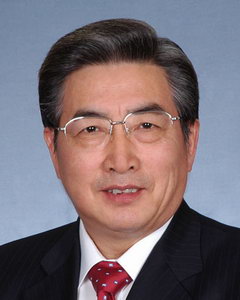 Guo Jinlong was appointed vice and acting
mayor of Beijing by the standing committee of the municipal people’s congress on
Friday. Wang Qishan will no longer serve as Beijing mayor and deputy secretary
of the Beijing Municipal Committee of the Communist Party of China (CPC),
according to a CPC Central Committee decision. Guo Jinlong, former Party chief
of Anhui Province, will assume Wang's position on the municipal Party committee.
He was also nominated as a candidate for mayor on Thursday. Guo will serve as
vice mayor and acting mayor before the full mayoralty is decided by voting at
the municipal people's congress meeting, to be held early next year. Guo Jinlong was appointed vice and acting
mayor of Beijing by the standing committee of the municipal people’s congress on
Friday. Wang Qishan will no longer serve as Beijing mayor and deputy secretary
of the Beijing Municipal Committee of the Communist Party of China (CPC),
according to a CPC Central Committee decision. Guo Jinlong, former Party chief
of Anhui Province, will assume Wang's position on the municipal Party committee.
He was also nominated as a candidate for mayor on Thursday. Guo will serve as
vice mayor and acting mayor before the full mayoralty is decided by voting at
the municipal people's congress meeting, to be held early next year.
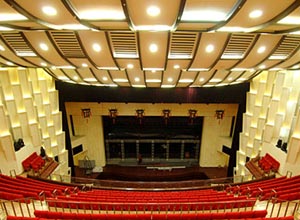 The Meilanfang Grand Theater, which will
stage its inaugural performances from Nov. 29 to Dec. 22, bears Chinese artists'
hope for boosting Peking Opera in an era with abundant forms of entertainment. The Meilanfang Grand Theater, which will
stage its inaugural performances from Nov. 29 to Dec. 22, bears Chinese artists'
hope for boosting Peking Opera in an era with abundant forms of entertainment.
 Jade ornaments
featuring a pair of rats trumping are on display in Suzhou, East China's Jiangsu
Province Nov 30, 2007. Jade ornaments
featuring a pair of rats trumping are on display in Suzhou, East China's Jiangsu
Province Nov 30, 2007.
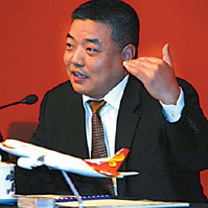 Chen Wenli, executive
chairman of Grand China Air, talks to journalists at the launching ceremony of
Grand China Air on Nov 29 in Beijing. Hainan Airlines Group launched a new
carrier to consolidate its businesses yesterday. Chen Wenli, executive
chairman of Grand China Air, talks to journalists at the launching ceremony of
Grand China Air on Nov 29 in Beijing. Hainan Airlines Group launched a new
carrier to consolidate its businesses yesterday.
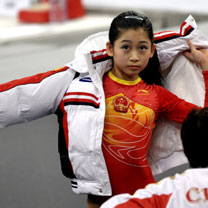 China's Jiang
Yuyuan puts on her coat after winning the women's all-around gymnastics at the
"Good Luck Beijing" Olympic gymnastics test event in the National Indoor
Stadium, in Beijing on Thursday. The 15-year-old Jiang was the only gymnast to
surpass 60 points in the women's all-around finals. China's Jiang
Yuyuan puts on her coat after winning the women's all-around gymnastics at the
"Good Luck Beijing" Olympic gymnastics test event in the National Indoor
Stadium, in Beijing on Thursday. The 15-year-old Jiang was the only gymnast to
surpass 60 points in the women's all-around finals.
China wants an extra 150,000 foreign professionals in
areas ranging from energy to agriculture by 2010 to further develop the economy,
a state newspaper said on Friday. The world’s most populous country is “in dire
need of talented people from abroad to help with development and innovation”,
the official China Daily said. “We will announce more laws and regulations as
well as preferential policies to better protect foreign experts’ rights and
interests by working together with government departments,” it quoted Ji Yunshi,
head of the State Administration of Foreign Experts Affairs, as saying. New
rules would help foreigners deal with problems such as medical insurance and
education for their children, Mr Ji said. The government has long had a “foreign
experts” programme, which has brought in thousands of foreigners to work as
teachers and editors in state-run media publishing or broadcasting in languages
other than Chinese, among other jobs. But the country has had problems
attracting many high-flying executives to live long-term in China because of
pollution, language difficulties and other issues. Large Chinese cities
regularly fail to perform that well in global standard-of-living surveys.
 Hundreds of officials, headed by Vice-Premier Wu Yi ,
embarked on two days of spot checks on food safety and product quality in
Guangdong yesterday in the biggest effort of its kind to hit the province,
according to Guangdong officials. More than 320 ministerial and provincial
representatives fanned out in the morning across 11 cities, from Zhaoqing to
Chaozhou and Qingyuan to Shantou , Guangdong Food and Drug Administration
official Zhang Binggui said. Mr Zhang said it was the first time so many
delegates from around the mainland had conducted inspections focused on the
province. Government sources said Ms Wu inspected some sites in Foshan
yesterday, including a fishery in Shunde district, and would preside over a
general meeting in Guangzhou today. Mr Zhang said it was the third in a series
of special spot checks on product quality and food safety, following audits in
Zhejiang in September and Shandong last month. He said the earlier inspections
focused on individual food workshops, small restaurants and agricultural
products. "This time in Guangdong, the inspection groups will mainly talk about
the state of drug safety and the quality of export products," Mr Zhang said. The
assessments are part of a four-month special campaign against poor product
quality that began in August in response to a series of safety scares involving
mainland-made products. The campaign, described by Ms Wu as a special war to
protect the public and to safeguard the made-in-China label, will run to the end
of the year. To prepare for the national inspections, Guangdong began sending
its own working parties to all 21 cities last month. "I have been staying in
Shantou for more than a month to carry out special inspections," said Kong
Xiangpei, a provincial quality supervision official. Mr Kong's duties involved
assessing thousands of businesses in the area, including toy factories and small
food manufacturers. In Shenzhen yesterday, top safety officials concentrated
their efforts on retail outlets and private enterprises. A team of dozens of
officials led by Wu Zhen , deputy director of the State Food and Drug
Administration, began their spot checks at Hong Kong-based Yongqin Toys Industry
Company and ended the day at the Hanyu Pharmaceutical Company. The inspection
group also visited six other sites, including a shopping mall, a school canteen
and a wet market. All the outlets singled out for assessment were well prepared
in advance and almost half the stalls at the Huaqiaocheng wet market were closed
before the group arrived for their 15-minute noon tour. A wet-market stall owner
said the inspection was just a political front, complaining that stallholders
were ordered to upgrade the market more than a month ago in preparation for the
15-minute check. "We were told to combine two stalls into one, which made the
market clean and big," he said. "The monthly rent will increase soon from 700
yuan to 1,000 yuan after the renovation. It means we will have to pay for the
inspection show." Some customers also said the spot check was an inconvenience.
"Many stalls are closed today," one housewife said. "I'll have to pay more than
usual to buy food at the supermarket." So far in the campaign, Guangdong has
seized more than 402 million yuan in illegal products and closed nearly 45,000
uncertified companies. The province has jailed 28 people and police have
detained 53.
Hundreds of officials, headed by Vice-Premier Wu Yi ,
embarked on two days of spot checks on food safety and product quality in
Guangdong yesterday in the biggest effort of its kind to hit the province,
according to Guangdong officials. More than 320 ministerial and provincial
representatives fanned out in the morning across 11 cities, from Zhaoqing to
Chaozhou and Qingyuan to Shantou , Guangdong Food and Drug Administration
official Zhang Binggui said. Mr Zhang said it was the first time so many
delegates from around the mainland had conducted inspections focused on the
province. Government sources said Ms Wu inspected some sites in Foshan
yesterday, including a fishery in Shunde district, and would preside over a
general meeting in Guangzhou today. Mr Zhang said it was the third in a series
of special spot checks on product quality and food safety, following audits in
Zhejiang in September and Shandong last month. He said the earlier inspections
focused on individual food workshops, small restaurants and agricultural
products. "This time in Guangdong, the inspection groups will mainly talk about
the state of drug safety and the quality of export products," Mr Zhang said. The
assessments are part of a four-month special campaign against poor product
quality that began in August in response to a series of safety scares involving
mainland-made products. The campaign, described by Ms Wu as a special war to
protect the public and to safeguard the made-in-China label, will run to the end
of the year. To prepare for the national inspections, Guangdong began sending
its own working parties to all 21 cities last month. "I have been staying in
Shantou for more than a month to carry out special inspections," said Kong
Xiangpei, a provincial quality supervision official. Mr Kong's duties involved
assessing thousands of businesses in the area, including toy factories and small
food manufacturers. In Shenzhen yesterday, top safety officials concentrated
their efforts on retail outlets and private enterprises. A team of dozens of
officials led by Wu Zhen , deputy director of the State Food and Drug
Administration, began their spot checks at Hong Kong-based Yongqin Toys Industry
Company and ended the day at the Hanyu Pharmaceutical Company. The inspection
group also visited six other sites, including a shopping mall, a school canteen
and a wet market. All the outlets singled out for assessment were well prepared
in advance and almost half the stalls at the Huaqiaocheng wet market were closed
before the group arrived for their 15-minute noon tour. A wet-market stall owner
said the inspection was just a political front, complaining that stallholders
were ordered to upgrade the market more than a month ago in preparation for the
15-minute check. "We were told to combine two stalls into one, which made the
market clean and big," he said. "The monthly rent will increase soon from 700
yuan to 1,000 yuan after the renovation. It means we will have to pay for the
inspection show." Some customers also said the spot check was an inconvenience.
"Many stalls are closed today," one housewife said. "I'll have to pay more than
usual to buy food at the supermarket." So far in the campaign, Guangdong has
seized more than 402 million yuan in illegal products and closed nearly 45,000
uncertified companies. The province has jailed 28 people and police have
detained 53.
December 1 - 2, 2007
 Hong Kong:
Dozens of hotel guests from Hong Kong were caught up in a rebel siege at the
Peninsula Manila hotel yesterday, which ended after troops stormed the luxury
hotel in a flurry of gunfire and tear gas. The 350 guests, including about 35
from Hong Kong, were evacuated from the hotel after armed rebel soldiers took
control of the building. About 1,500 government troops later stormed the hotel,
located in the Makati financial district, forcing the rebel group to surrender. Hong Kong:
Dozens of hotel guests from Hong Kong were caught up in a rebel siege at the
Peninsula Manila hotel yesterday, which ended after troops stormed the luxury
hotel in a flurry of gunfire and tear gas. The 350 guests, including about 35
from Hong Kong, were evacuated from the hotel after armed rebel soldiers took
control of the building. About 1,500 government troops later stormed the hotel,
located in the Makati financial district, forcing the rebel group to surrender.
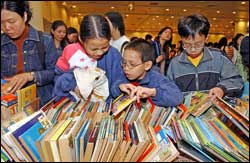 Hong Kong SAR children are tops at their
ABCs - The reading ability of Hong Kong children is the second highest in the
world, according to results of a global study released yesterday. International
Education Achievement, which studied 215,000 students in 44 countries, said Hong
Kong ranked second in reading comprehension - just behind Russia and ahead of
such developed countries as England, the United States and Canada. Hong Kong was
in 14th place five years ago. More than 4,700 Primary 4 pupils and their parents
and 144 primary school principals and Chinese teachers from Hong Kong were
interviewed from April to June for the study. Hong Kong students achieved a
reading achievement of 564 points, just one point behind Russia and four points
more than Alberta, Canada, which was third. Singapore was fourth on 558 points.
However, when it came to interpreting information from newspapers and
instructional booklets, Hong Kong came out on top with 568 points. Russia was
second (564) and Singapore third (563). The study revealed that, while there was
a general improvement in the reading attitudes and habits of students, there was
no significant improvement in the attitude of parents, with 15 percent saying
they hardly read at all. Hong Kong University education faculty associate dean
Tse Shek-kam, who helped with the study, said the government's educational
reforms had contributed to the improvement as schools were able to conduct more
reading programs. Tse urged parents to act as role models for their children by
reading during their spare time.He also said the reading habit is not related to
a person's socio-economic status. "The time parents devote to reading with their
children is the key to improvement. Parents should read more at home along with
their children, or take them to a library to borrow and read books," Tse said.
He added that the critical period to get children geared to the reading habit is
from a few months old to nine. "If they have not acquired the reading habit by
age 10, it will be very difficult to get them to pick it up." Tse advised
students to spend some time every day to watch news programs on television and
to read newspapers. Joseph Lam Wai-ip, teaching consultant of the university's
education faculty, said parents should play an active role in encouraging their
children to read. They should also indulge in pre- school reading activities,
like reading to their children, telling them stories and playing games in which
words or labels are used. The Education Bureau said it welcomed the news of Hong
Kong's students' accomplishments. A spokesman stressed the bureau will continue
to work closely with schools, parents, tertiary institutions and the community
to sustain the good performance of the students, and will consider ways to
further promote and support reading. Hong Kong SAR children are tops at their
ABCs - The reading ability of Hong Kong children is the second highest in the
world, according to results of a global study released yesterday. International
Education Achievement, which studied 215,000 students in 44 countries, said Hong
Kong ranked second in reading comprehension - just behind Russia and ahead of
such developed countries as England, the United States and Canada. Hong Kong was
in 14th place five years ago. More than 4,700 Primary 4 pupils and their parents
and 144 primary school principals and Chinese teachers from Hong Kong were
interviewed from April to June for the study. Hong Kong students achieved a
reading achievement of 564 points, just one point behind Russia and four points
more than Alberta, Canada, which was third. Singapore was fourth on 558 points.
However, when it came to interpreting information from newspapers and
instructional booklets, Hong Kong came out on top with 568 points. Russia was
second (564) and Singapore third (563). The study revealed that, while there was
a general improvement in the reading attitudes and habits of students, there was
no significant improvement in the attitude of parents, with 15 percent saying
they hardly read at all. Hong Kong University education faculty associate dean
Tse Shek-kam, who helped with the study, said the government's educational
reforms had contributed to the improvement as schools were able to conduct more
reading programs. Tse urged parents to act as role models for their children by
reading during their spare time.He also said the reading habit is not related to
a person's socio-economic status. "The time parents devote to reading with their
children is the key to improvement. Parents should read more at home along with
their children, or take them to a library to borrow and read books," Tse said.
He added that the critical period to get children geared to the reading habit is
from a few months old to nine. "If they have not acquired the reading habit by
age 10, it will be very difficult to get them to pick it up." Tse advised
students to spend some time every day to watch news programs on television and
to read newspapers. Joseph Lam Wai-ip, teaching consultant of the university's
education faculty, said parents should play an active role in encouraging their
children to read. They should also indulge in pre- school reading activities,
like reading to their children, telling them stories and playing games in which
words or labels are used. The Education Bureau said it welcomed the news of Hong
Kong's students' accomplishments. A spokesman stressed the bureau will continue
to work closely with schools, parents, tertiary institutions and the community
to sustain the good performance of the students, and will consider ways to
further promote and support reading.
 Tony Leung
(R) and Tang Wei are seen in this post of "Lust, Caution". They have been
nominated for best leading actor and actress in the 2008 Film Independent's
Spirit Awards. Tony Leung
(R) and Tang Wei are seen in this post of "Lust, Caution". They have been
nominated for best leading actor and actress in the 2008 Film Independent's
Spirit Awards.
 China:
It is safe for European parents to buy Chinese-made toys for Christmas despite a
spate of recall dramas involving Chinese products earlier this year, head of the
European Union toy industry said.
China:
It is safe for European parents to buy Chinese-made toys for Christmas despite a
spate of recall dramas involving Chinese products earlier this year, head of the
European Union toy industry said.
The annual container throughput on
the Chinese mainland is set to exceed 100 million twenty-foot equivalent units (TEUs)
as of 2007, following the loading of 9,500containers in north china's Tianjin
port on Wednesday.
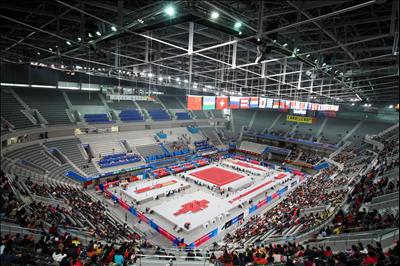 Photo taken on Nov. 28,
2007 shows the inside view of China’s National Indoor Stadium in Beijing, China.
The National Indoor Stadium started operation Wednesday to hold the "Good Luck
Beijing" 2007 International Gymnastics Tournament. Photo taken on Nov. 28,
2007 shows the inside view of China’s National Indoor Stadium in Beijing, China.
The National Indoor Stadium started operation Wednesday to hold the "Good Luck
Beijing" 2007 International Gymnastics Tournament.
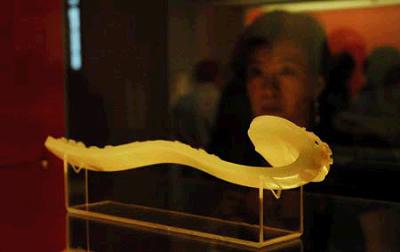 A woman visits the Chinese
culture relic exposition in Manila, capital of the Philippines, Nov. 28, 2007.
Around 80 precious culture relics from China were on display here. The
exposition will last to next February. A woman visits the Chinese
culture relic exposition in Manila, capital of the Philippines, Nov. 28, 2007.
Around 80 precious culture relics from China were on display here. The
exposition will last to next February.
 Cast member Tang Wei poses at the premiere of "Lust, Caution" at the Academy of
Motion Picture Arts and Sciences in Beverly Hills, California.
Cast member Tang Wei poses at the premiere of "Lust, Caution" at the Academy of
Motion Picture Arts and Sciences in Beverly Hills, California.
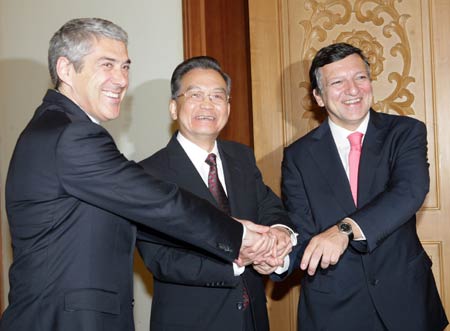 Chinese
Premier Wen Jiabao(C), Prime Minister Jose Socrates of Portugal(L), which
currently holds rotating presidency of the European Union, and European
Commission President Jose Manuel Durao Barroso(R) hold the 10th China-EU
Leaders' Meeting Wednesday in Beijing. The 10th China-EU Leaders' Meeting was
held here Wednesday, and leaders from both China and the European Union (EU)
outlined their future strategic partnership while discussing pragmatic issues.
The yearly summit was attended by Chinese Premier Wen Jiabao, Prime Minister
Jose Socrates of Portugal, which currently holds rotating presidency of the
European Union, and European Commission President Jose Manuel Durao Barroso. The
meeting came as the 10th anniversary of the regular meeting mechanism of Chinese
and EU leaders. Over the past decade the China-EU ties have witnessed the
fastest development in history and mutually beneficial cooperation has produced
rich results and the ties now have reached an unprecedented level in width and
depth, Wen said during the meeting. From the Renminbi exchange rate issue, trade
imbalance to climate change and energy cooperation, both sides touched upon all
the core issues in the China-EU relations in a pragmatic and open attitude.
During the two-hour summit meeting, both sides agreed to properly handle the
disputes through dialogue and negotiation so as to seek balance of trade and
push forward the China-EU relations to a new height. Chinese
Premier Wen Jiabao(C), Prime Minister Jose Socrates of Portugal(L), which
currently holds rotating presidency of the European Union, and European
Commission President Jose Manuel Durao Barroso(R) hold the 10th China-EU
Leaders' Meeting Wednesday in Beijing. The 10th China-EU Leaders' Meeting was
held here Wednesday, and leaders from both China and the European Union (EU)
outlined their future strategic partnership while discussing pragmatic issues.
The yearly summit was attended by Chinese Premier Wen Jiabao, Prime Minister
Jose Socrates of Portugal, which currently holds rotating presidency of the
European Union, and European Commission President Jose Manuel Durao Barroso. The
meeting came as the 10th anniversary of the regular meeting mechanism of Chinese
and EU leaders. Over the past decade the China-EU ties have witnessed the
fastest development in history and mutually beneficial cooperation has produced
rich results and the ties now have reached an unprecedented level in width and
depth, Wen said during the meeting. From the Renminbi exchange rate issue, trade
imbalance to climate change and energy cooperation, both sides touched upon all
the core issues in the China-EU relations in a pragmatic and open attitude.
During the two-hour summit meeting, both sides agreed to properly handle the
disputes through dialogue and negotiation so as to seek balance of trade and
push forward the China-EU relations to a new height.
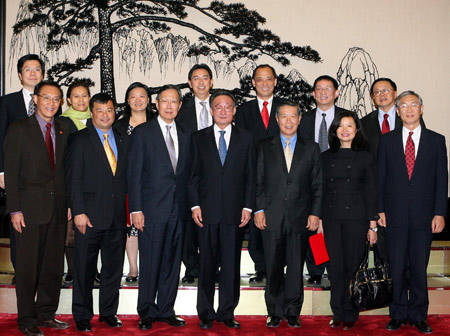 Wu Bangguo (C Front), chairman of
the Standing Committee of China's National People's Congress, the country's top
legislature, meets with a delegation from the Committee of 100 of the United
States in Beijing, capital of China, Nov. 28, 2007. Chinese top legislator Wu
Bangguo said here Wednesday that current Sino-U.S. relations have make
remarkable progress and their cooperation has been fruitful, and the two
countries have strengthened consultation in international and regional issues.
Wu, chairman of the Standing Committee of the National People's Congress (NPC),
made the remarks while meeting with a delegation from the Committee of 100 of
the United States. Wu expressed gratitude for the work the committee has done to
improve the understanding and friendship between China and the United States.
China would like to make joint efforts with the U.S. side to grasp their common
interests and take into consideration the concern of both sides, promote
dialogue, trust and cooperation so as to push forward their constructive and
cooperative relations, Wu said. This year marks the 35th anniversary of Shanghai
Communique, Wu said, adding history has demonstrated that the long-term, stable
and healthy Sino-U.S. relations conforms to the fundamental interests of the two
countries and peoples. He hoped the Committee of 100 would continue to promote
mutual understanding and cooperation between China and the United States. John
Fugh, chairman of the Committee of 100, vowed to enhance Sino-U.S. friendship.
Liu Yandong, vice chairwoman of the National Committee of the Chinese People's
Political Consultative Conference (CPPCC), and Sheng Huaren, vice chairman of
the NPC Standing Committee, also met with the U.S. guests on Wednesday. The
Committee of 100 was founded in 1990 by a group of well-known Chinese Americans.
It has been engaged in promoting China-U.S. relations and cooperation. Wu Bangguo (C Front), chairman of
the Standing Committee of China's National People's Congress, the country's top
legislature, meets with a delegation from the Committee of 100 of the United
States in Beijing, capital of China, Nov. 28, 2007. Chinese top legislator Wu
Bangguo said here Wednesday that current Sino-U.S. relations have make
remarkable progress and their cooperation has been fruitful, and the two
countries have strengthened consultation in international and regional issues.
Wu, chairman of the Standing Committee of the National People's Congress (NPC),
made the remarks while meeting with a delegation from the Committee of 100 of
the United States. Wu expressed gratitude for the work the committee has done to
improve the understanding and friendship between China and the United States.
China would like to make joint efforts with the U.S. side to grasp their common
interests and take into consideration the concern of both sides, promote
dialogue, trust and cooperation so as to push forward their constructive and
cooperative relations, Wu said. This year marks the 35th anniversary of Shanghai
Communique, Wu said, adding history has demonstrated that the long-term, stable
and healthy Sino-U.S. relations conforms to the fundamental interests of the two
countries and peoples. He hoped the Committee of 100 would continue to promote
mutual understanding and cooperation between China and the United States. John
Fugh, chairman of the Committee of 100, vowed to enhance Sino-U.S. friendship.
Liu Yandong, vice chairwoman of the National Committee of the Chinese People's
Political Consultative Conference (CPPCC), and Sheng Huaren, vice chairman of
the NPC Standing Committee, also met with the U.S. guests on Wednesday. The
Committee of 100 was founded in 1990 by a group of well-known Chinese Americans.
It has been engaged in promoting China-U.S. relations and cooperation.
Mainland insurer Ping An (2318)
stepped into the big league of global financial services yesterday, securing a
4.18 percent stake in Fortis, a leading banking and insurance company in Europe.
The deal, in which Ping An became the single largest shareholder of Fortis, is
being heralded as the biggest international acquisition by a mainland insurer.
Ping An chairman and chief executive Peter Ma Mingzhe yesterday described the
transaction carried out in the secondary market as "a major milestone for
China's insurance industry." The insurer's executive director and group
president Louis Cheung Chi-yan will sit on the board of Fortis. Ping An acquired
95.01 million shares in Fortis for US$2.69 billion (HK$20.98 billion). Nan Sheng,
research analyst at UOB-KayHian, said the the price paid for the stake "is very
attractive," noting that this was a signal for Ping An to buy. Shares in the
Belgian-Dutch insurer have plunged 32 percent year-to-date.
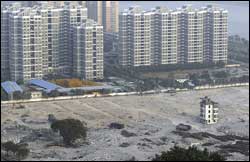 Booming Guangdong is facing a huge
urban land shortage due to years of unlimited factory expansion. Guangdong is
home to tens of thousands of Hong Kong- and Taiwan-invested factories due to
years of attracting investors with low-cost and even free land. "Just 6 percent
of the urban land reserves remain undeveloped," said Wen Chunyang, an official
from the Guangdong Urban and Rural Planning and Design Institute. "[It] is
insufficient to sustain healthy and consistent economic growth." The province,
with nearly 100 million people, has been a dynamo of China's economic growth
since reforms started nearly 30 years ago. Last year, the province accounted for
an eighth of the country's overall economic growth. "With supply lagging far
behind demand, some local governments have started exploiting farmland for urban
construction projects," Wen said. "In the long run, this will have a detrimental
impact on the province." Cities have been the focus of official efforts to clean
factory smoke and car exhaust from often smoggy skies. But as richer areas have
set stricter controls, polluting factories have sprung up in the poorer
countryside. Booming Guangdong is facing a huge
urban land shortage due to years of unlimited factory expansion. Guangdong is
home to tens of thousands of Hong Kong- and Taiwan-invested factories due to
years of attracting investors with low-cost and even free land. "Just 6 percent
of the urban land reserves remain undeveloped," said Wen Chunyang, an official
from the Guangdong Urban and Rural Planning and Design Institute. "[It] is
insufficient to sustain healthy and consistent economic growth." The province,
with nearly 100 million people, has been a dynamo of China's economic growth
since reforms started nearly 30 years ago. Last year, the province accounted for
an eighth of the country's overall economic growth. "With supply lagging far
behind demand, some local governments have started exploiting farmland for urban
construction projects," Wen said. "In the long run, this will have a detrimental
impact on the province." Cities have been the focus of official efforts to clean
factory smoke and car exhaust from often smoggy skies. But as richer areas have
set stricter controls, polluting factories have sprung up in the poorer
countryside.

*News information are obtained via various
sources deemed reliable, but not guaranteed

|
![]()
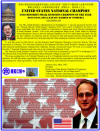 USA Small Business Administration (SBA)
Selected Johnson Choi/HKCHcc
2008 United States
National Champion
USA Small Business Administration (SBA)
Selected Johnson Choi/HKCHcc
2008 United States
National Champion![]()
![]() and follow us
on
and follow us
on
![]()

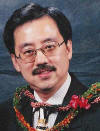
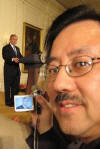
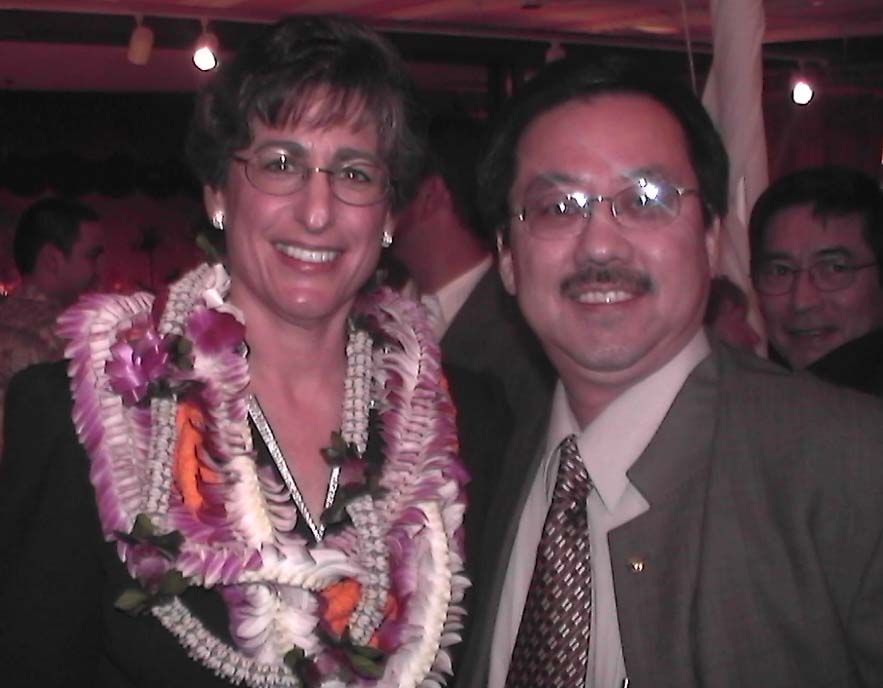
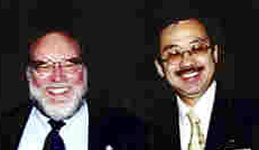
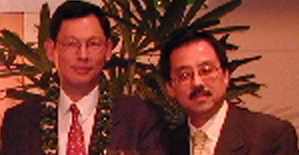
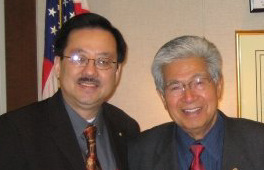


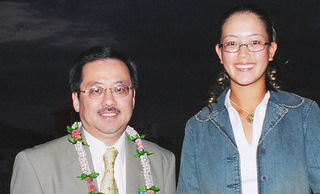
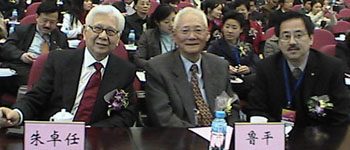

















 The anti-graft watchdog
is launching a corruption awareness drive among supermarket operators after
receiving more than 10 malpractice reports in the first 11 months of the year.
The Independent Commission Against Corruption is urging the supermarket chains
to give clear instructions to staff that forbid them to accept advantages from
suppliers. It also calls for a policy for handling short deliveries or
poor-quality goods and security measures to protect customers' credit-card
information from improper use. A "best practice module" listing the
recommendations was issued to major supermarket chains this month. ICAC figures
show there are about 20 graft complaints related to supermarkets and chain
stores each year. Last year five people were convicted and received sentences of
between five and 39 months. The agency's acting assistant director of corruption
prevention, Mok Wah-hoi, said the malpractices were most likely to occur during
the procurement of goods by middle-ranking staff. "In some cases, the
supermarket staff were given a certain proportion of sales volume as commission
in return for providing preferential treatment to the suppliers," the official
said.
The anti-graft watchdog
is launching a corruption awareness drive among supermarket operators after
receiving more than 10 malpractice reports in the first 11 months of the year.
The Independent Commission Against Corruption is urging the supermarket chains
to give clear instructions to staff that forbid them to accept advantages from
suppliers. It also calls for a policy for handling short deliveries or
poor-quality goods and security measures to protect customers' credit-card
information from improper use. A "best practice module" listing the
recommendations was issued to major supermarket chains this month. ICAC figures
show there are about 20 graft complaints related to supermarkets and chain
stores each year. Last year five people were convicted and received sentences of
between five and 39 months. The agency's acting assistant director of corruption
prevention, Mok Wah-hoi, said the malpractices were most likely to occur during
the procurement of goods by middle-ranking staff. "In some cases, the
supermarket staff were given a certain proportion of sales volume as commission
in return for providing preferential treatment to the suppliers," the official
said.  China:
Exporters of food products that fail to meet safety standards of destination
countries face a fine of up to 20 times the value of the consignment and can
even be charged for committing a crime if the top legislature approves a draft
law. Food product exporters who fail to go through entry-exit quarantine
inspections face similar punishments, according to the draft law under the first
review at the ongoing session of the National People's Congress (NPC) Standing
Committee. If approved, the draft law will spell out clear penalties for illegal
food exporters for the first time. The two existing laws on food safety, the
Food Hygiene Law and the Law on Agricultural Product Quality and Safety, say
nothing about penalties. They only authorize the State Council to issue relevant
regulations. The draft food safety law seeks to impose tighter checks on food
exports, too, and makes it mandatory for food exporters and supply farms to
register with the General Administration of Quality Supervision, Inspection and
Quarantine (AQSIQ).
China:
Exporters of food products that fail to meet safety standards of destination
countries face a fine of up to 20 times the value of the consignment and can
even be charged for committing a crime if the top legislature approves a draft
law. Food product exporters who fail to go through entry-exit quarantine
inspections face similar punishments, according to the draft law under the first
review at the ongoing session of the National People's Congress (NPC) Standing
Committee. If approved, the draft law will spell out clear penalties for illegal
food exporters for the first time. The two existing laws on food safety, the
Food Hygiene Law and the Law on Agricultural Product Quality and Safety, say
nothing about penalties. They only authorize the State Council to issue relevant
regulations. The draft food safety law seeks to impose tighter checks on food
exports, too, and makes it mandatory for food exporters and supply farms to
register with the General Administration of Quality Supervision, Inspection and
Quarantine (AQSIQ).
 Japanese Prime Minister Yasuo Fukuda (C)
is welcomed by Chinese officials at an airport in Beijing, capital of China,
Dec. 27, 2007. Yasuo Fukuda arrived here on Thursday for a four-day official
visit to China.
Japanese Prime Minister Yasuo Fukuda (C)
is welcomed by Chinese officials at an airport in Beijing, capital of China,
Dec. 27, 2007. Yasuo Fukuda arrived here on Thursday for a four-day official
visit to China. The partnership between China Eastern
Airlines and Singapore Airlines will provide necessary financial resources and
management expertise to help the Chinese firm achieve the goal of becoming a hub
airline company based in Shanghai, Li Fenghua said Thursday.
The partnership between China Eastern
Airlines and Singapore Airlines will provide necessary financial resources and
management expertise to help the Chinese firm achieve the goal of becoming a hub
airline company based in Shanghai, Li Fenghua said Thursday. A
female trainee pilot of the China Air Force undergoes training in this undated
photo. Twenty-nine female trainee pilots gained their qualifications to attend
higher level flying training on Thursday.
A
female trainee pilot of the China Air Force undergoes training in this undated
photo. Twenty-nine female trainee pilots gained their qualifications to attend
higher level flying training on Thursday. Xinhua
selects Chinese athletes of the Year 2007. They are Liu Xiang, Yang Wei, Shen
Xue/Zhao Hongbo, Zhu Qinan, Guo Jingjing, Zhang Guozheng, Zhu Lin, Zou Shiming,
Wu Peng and Guo Yue.
Xinhua
selects Chinese athletes of the Year 2007. They are Liu Xiang, Yang Wei, Shen
Xue/Zhao Hongbo, Zhu Qinan, Guo Jingjing, Zhang Guozheng, Zhu Lin, Zou Shiming,
Wu Peng and Guo Yue. The relaunch of the Ngong Ping 360 cable car system on Lantau Island was met
with two minor halts lasting several minutes in the first two days of trials
since an empty cabin plunged more than 50 meters to the ground six months ago.
The company offered 8,000 to 10,000 free tickets to MTR staff and their family
members as well as to local engineers yesterday, ending up with more than 5,800
people enjoying a fog- shrouded ride from Tung Chung to Ngong Ping plateau. A
full relaunch of the line will be made on New Year's Eve after nearly six months
of enforced closure. The two breaks, lasting eight minutes yesterday and five
minutes on Saturday, were described as "normal situations" by Ngong Ping 360
managing director Morris Cheung Siu-wah. "Those were because the sensors of the
cable car had deviations. The operators of the car made announcements
immediately through the public address system while the cabins were moved
backwards for checkups," he said. Cheung added such incidents were a matter of
probability and normally took place once or twice a week.
The relaunch of the Ngong Ping 360 cable car system on Lantau Island was met
with two minor halts lasting several minutes in the first two days of trials
since an empty cabin plunged more than 50 meters to the ground six months ago.
The company offered 8,000 to 10,000 free tickets to MTR staff and their family
members as well as to local engineers yesterday, ending up with more than 5,800
people enjoying a fog- shrouded ride from Tung Chung to Ngong Ping plateau. A
full relaunch of the line will be made on New Year's Eve after nearly six months
of enforced closure. The two breaks, lasting eight minutes yesterday and five
minutes on Saturday, were described as "normal situations" by Ngong Ping 360
managing director Morris Cheung Siu-wah. "Those were because the sensors of the
cable car had deviations. The operators of the car made announcements
immediately through the public address system while the cabins were moved
backwards for checkups," he said. Cheung added such incidents were a matter of
probability and normally took place once or twice a week. The main tower of the Linjiang Bridge
over the Qingyi River is finished in Wuhu, East China’s Anhui Province, December
23, 2007. The tower, with a distinct fish-like design, will be a new landmark
after the bridge opens to traffic and also provide an ideal overlook to the
city.
The main tower of the Linjiang Bridge
over the Qingyi River is finished in Wuhu, East China’s Anhui Province, December
23, 2007. The tower, with a distinct fish-like design, will be a new landmark
after the bridge opens to traffic and also provide an ideal overlook to the
city. A staff member onboard China’s expedition ship Xue Long, or Snow Dragon, takes
pictures as the icebreaker makes its way through ice floe from Zhongshan Station
to the Great Wall Station for the country’s 24th scientific expedition to
Antarctica, Dec. 23, 2007.
A staff member onboard China’s expedition ship Xue Long, or Snow Dragon, takes
pictures as the icebreaker makes its way through ice floe from Zhongshan Station
to the Great Wall Station for the country’s 24th scientific expedition to
Antarctica, Dec. 23, 2007. A Chinese farmer is
selling apples at the nation's largest fruits trading market in East China's
Shangong Province. China is now the world's top apple grower, accounting for
nearly half of the entire global harvest.
A Chinese farmer is
selling apples at the nation's largest fruits trading market in East China's
Shangong Province. China is now the world's top apple grower, accounting for
nearly half of the entire global harvest. Special Administrative Region (MSAR) Chief Executive Edmund Ho Hau Wah (1st L)
proposes a toast with all the guests presented in Macao, China, Dec. 20, 2007.
Macao celebrated on Thursday the eighth anniversary of the region’s return to
the Chinese motherland.
Special Administrative Region (MSAR) Chief Executive Edmund Ho Hau Wah (1st L)
proposes a toast with all the guests presented in Macao, China, Dec. 20, 2007.
Macao celebrated on Thursday the eighth anniversary of the region’s return to
the Chinese motherland. This photo published on Wednesday, December 19, 2007 shows Joey Yung in a newly
shot TV commercial for the fast food restaurant chain McDonalds. She was invited
to shoot a new TV commercial for the venerable institution, reported the Hong
Kong-based publication Tungstar on Wednesday.
This photo published on Wednesday, December 19, 2007 shows Joey Yung in a newly
shot TV commercial for the fast food restaurant chain McDonalds. She was invited
to shoot a new TV commercial for the venerable institution, reported the Hong
Kong-based publication Tungstar on Wednesday.  Tang Wei and Tony Leung Chiu Wai
in the film Lust, Caution (Se, jie). Tang Wei didn't know what it was that she
was auditioning for, or who was involved with the production. She had no idea
that 10,000 actresses, including many A-listers, were competing for the role. In
the little-known actress' first audition for the project, she read lines from a
fake script. For the second audition, the director showed up. It was Ang Lee.
Surprisingly, Lee poured a cup of tea for her, as if he had noticed her tension.
They then talked about Tang's family, her school and her stage experience. After
graduating from the Central Academy of Drama, China's best institute for theater
arts, Tang has spent most of her time on stage. She told Lee her favorite
director was Ingmar Bergman, but she had no idea he was also one of Lee's
favorites. When she mentioned that her mother was a Yueju opera singer, Lee
asked her to sing. As Lee later described it, that day they found something in
common - a love for theater and southern China. "Lee was like a senior family
member," Tang said in a phone interview. "He was a modest, good listener. I felt
very happy when I found the communication was so smooth, no obstacle at all."
When the call for the third audition came, Tang was told to wear a cheongsam. "I
had no cheongsam at all, actually I seldom wore dresses then," she said. After
hanging up the phone, she rushed to a tailor's shop. No one gave her any
feedback at the third audition. She had the fourth and fifth soon after with
makeup and full costume, which helped her get into the character, a
student-turned spy in the chaos of 1930s' Shanghai. After five auditions, Tang
was getting nervous. "I said to myself, 'you have tried your best, now it's time
to relax'." Another call led her to Hong Kong last summer. There, she found that
the crew had begun preparations for Lee's new project - the espionage thriller
Lust, Caution. "Everyone was busy," she recalled, "Material was piled
everywhere, but no one came up and told me that I was the leading actress." But
she suspected that was the case, as Lee had told her they were planning a
celebration. "Celebrating what? I asked myself, but I felt that something was
happening," she said. Even so, to stop the news from leaking to the press, the
crew had a simple dinner. "It was like, everyone has been busy preparing for the
film. I knew work had begun." To prepare for her role, Lee gave her a pile of
historic records and books to read, and she had to watch plenty of films about
1930s and '40s Shanghai. She threw herself into Greta Garbo's films and the
poems of Xu Zhimuo, one of the most famous Chinese poets of the 1920s.
Rehearsals included walking with a book on the head and tying her knees together
with a ribbon to emulate the elegant pose of Shanghai ladies. She also learned
southern opera, Cantonese, Shanghai dialect and English. The biggest torture for
the 28-year-old, however, was trying on different clothes. "I seldom shop. I
think shopping is exhausting. When I had to change clothes, they jokingly asked
me if I needed headache pills." Tang said that Lee once told her: "What you will
learn is more than 60 years of courses at the film academy." The newcomer had to
act alongside Asian superstars Tony Leung and Joan Chen and yet, of the 118 days
of shooting, 114 were focused on her. She slept three hours a day, sometimes
five to six. But despite these hardships, she said: "Even if it is the only role
I have in my life, I feel content."
Tang Wei and Tony Leung Chiu Wai
in the film Lust, Caution (Se, jie). Tang Wei didn't know what it was that she
was auditioning for, or who was involved with the production. She had no idea
that 10,000 actresses, including many A-listers, were competing for the role. In
the little-known actress' first audition for the project, she read lines from a
fake script. For the second audition, the director showed up. It was Ang Lee.
Surprisingly, Lee poured a cup of tea for her, as if he had noticed her tension.
They then talked about Tang's family, her school and her stage experience. After
graduating from the Central Academy of Drama, China's best institute for theater
arts, Tang has spent most of her time on stage. She told Lee her favorite
director was Ingmar Bergman, but she had no idea he was also one of Lee's
favorites. When she mentioned that her mother was a Yueju opera singer, Lee
asked her to sing. As Lee later described it, that day they found something in
common - a love for theater and southern China. "Lee was like a senior family
member," Tang said in a phone interview. "He was a modest, good listener. I felt
very happy when I found the communication was so smooth, no obstacle at all."
When the call for the third audition came, Tang was told to wear a cheongsam. "I
had no cheongsam at all, actually I seldom wore dresses then," she said. After
hanging up the phone, she rushed to a tailor's shop. No one gave her any
feedback at the third audition. She had the fourth and fifth soon after with
makeup and full costume, which helped her get into the character, a
student-turned spy in the chaos of 1930s' Shanghai. After five auditions, Tang
was getting nervous. "I said to myself, 'you have tried your best, now it's time
to relax'." Another call led her to Hong Kong last summer. There, she found that
the crew had begun preparations for Lee's new project - the espionage thriller
Lust, Caution. "Everyone was busy," she recalled, "Material was piled
everywhere, but no one came up and told me that I was the leading actress." But
she suspected that was the case, as Lee had told her they were planning a
celebration. "Celebrating what? I asked myself, but I felt that something was
happening," she said. Even so, to stop the news from leaking to the press, the
crew had a simple dinner. "It was like, everyone has been busy preparing for the
film. I knew work had begun." To prepare for her role, Lee gave her a pile of
historic records and books to read, and she had to watch plenty of films about
1930s and '40s Shanghai. She threw herself into Greta Garbo's films and the
poems of Xu Zhimuo, one of the most famous Chinese poets of the 1920s.
Rehearsals included walking with a book on the head and tying her knees together
with a ribbon to emulate the elegant pose of Shanghai ladies. She also learned
southern opera, Cantonese, Shanghai dialect and English. The biggest torture for
the 28-year-old, however, was trying on different clothes. "I seldom shop. I
think shopping is exhausting. When I had to change clothes, they jokingly asked
me if I needed headache pills." Tang said that Lee once told her: "What you will
learn is more than 60 years of courses at the film academy." The newcomer had to
act alongside Asian superstars Tony Leung and Joan Chen and yet, of the 118 days
of shooting, 114 were focused on her. She slept three hours a day, sometimes
five to six. But despite these hardships, she said: "Even if it is the only role
I have in my life, I feel content." More than 50 varieties of new
Olympic licensed products are to go on sale, with half of them priced at around
100 yuan each, according a New Year promotional activity by the Beijing
Organizing Committee for the Games of the XXIX Olympiad (BOCOG) in Beijing on
Wednesday. Most of the products are affordable Olympic badges. Among the
higher-end articles, gold badges and "Yubi" jade products will attract buyers
because of their combination of Olympic elements with gold and Hetian jade to
highlight Chinese traditional characteristics.
More than 50 varieties of new
Olympic licensed products are to go on sale, with half of them priced at around
100 yuan each, according a New Year promotional activity by the Beijing
Organizing Committee for the Games of the XXIX Olympiad (BOCOG) in Beijing on
Wednesday. Most of the products are affordable Olympic badges. Among the
higher-end articles, gold badges and "Yubi" jade products will attract buyers
because of their combination of Olympic elements with gold and Hetian jade to
highlight Chinese traditional characteristics. A girl from the Netherlands poses for
photos with two big Mickey Mice made in China, at the World of Disney in New
York, the United States, Dec. 18, 2007. China-made products are seen everywhere
in the brand stores like Macy's and the World of Disney in New York. Chinese
toys still well received by U.S. customers. The day after Thanksgiving, dubbed
Black Friday because it traditionally marks the day when retailers finally move
out of the red and into the black, shoppers rushed in their hordes into stores
such as Toys "R" Us to grab gifts for their children this Christmas.
A girl from the Netherlands poses for
photos with two big Mickey Mice made in China, at the World of Disney in New
York, the United States, Dec. 18, 2007. China-made products are seen everywhere
in the brand stores like Macy's and the World of Disney in New York. Chinese
toys still well received by U.S. customers. The day after Thanksgiving, dubbed
Black Friday because it traditionally marks the day when retailers finally move
out of the red and into the black, shoppers rushed in their hordes into stores
such as Toys "R" Us to grab gifts for their children this Christmas.  This undated file photo shows an artist's
impression of the glasshouse on the beach of Yangjiang, South China's Guangdong
Province, where a sunken ship will be displayed. The largest Chinese wreck, from
the Song Dynasty will be hauled from its watery grave on Saturday.
This undated file photo shows an artist's
impression of the glasshouse on the beach of Yangjiang, South China's Guangdong
Province, where a sunken ship will be displayed. The largest Chinese wreck, from
the Song Dynasty will be hauled from its watery grave on Saturday. A general view
of the Tianwan nuclear power station in Lianyungang, Jiangsu Province. China
plans to build eight nuclear reactors with a combined capacity of 8,000
megawatts at the station.
A general view
of the Tianwan nuclear power station in Lianyungang, Jiangsu Province. China
plans to build eight nuclear reactors with a combined capacity of 8,000
megawatts at the station. The
traditional Chinese festival Dongzhi, or midwinter in English, falls on this
Saturday. Chinese people normally eat dumplings to mark this occasion. The
reason why they eat dumplings is to protect their ears from getting frostbitten.
In ancient China dumplings once contained medicine countering frostbites. The
tradition is carried down until today. So let's go and eat dumplings on Dongzhi
in China.
The
traditional Chinese festival Dongzhi, or midwinter in English, falls on this
Saturday. Chinese people normally eat dumplings to mark this occasion. The
reason why they eat dumplings is to protect their ears from getting frostbitten.
In ancient China dumplings once contained medicine countering frostbites. The
tradition is carried down until today. So let's go and eat dumplings on Dongzhi
in China.  Lounge 18 is an
open yet oddly disjointed upscale lounge in the only place for an upscale
lounge–the Bund. A whimsical mix of furniture styles from comfortable lounge
chairs and caged candles to a digitized reproduction of Vermeer's "Girl with a
Pearl Earring" leads you to wonder if the venue was decorated by committee.
Although most of the basic drinks are covered, there are some holes in the drink
menu (like having only one single malt scotch). If you want wine, you can either
drink a first growth Bordeaux for thousands of renminbi or Jacob's Creek for a
few hundred. In all fairness though, they're still building up their inventory.
The specialty cocktail list offered one intriguing selection: the Ylang-Ylang(¥68),
a mix of gin, fresh mint, vanilla and fruit juices. Quite tasty, but why garnish
the rim of the glass with black pepper? Black pepper aside, the wait staff were
attentive and all smiles which was a welcome change from the pretension that so
abounds in bars on the Bund.
Lounge 18 is an
open yet oddly disjointed upscale lounge in the only place for an upscale
lounge–the Bund. A whimsical mix of furniture styles from comfortable lounge
chairs and caged candles to a digitized reproduction of Vermeer's "Girl with a
Pearl Earring" leads you to wonder if the venue was decorated by committee.
Although most of the basic drinks are covered, there are some holes in the drink
menu (like having only one single malt scotch). If you want wine, you can either
drink a first growth Bordeaux for thousands of renminbi or Jacob's Creek for a
few hundred. In all fairness though, they're still building up their inventory.
The specialty cocktail list offered one intriguing selection: the Ylang-Ylang(¥68),
a mix of gin, fresh mint, vanilla and fruit juices. Quite tasty, but why garnish
the rim of the glass with black pepper? Black pepper aside, the wait staff were
attentive and all smiles which was a welcome change from the pretension that so
abounds in bars on the Bund. Hong Kong singer
Eason Chan was the biggest winner on Sunday night at the Mandarin
Music-On-Demand (MOD) Best 10 Awards ceremony held by Hong Kong's TVB station.
Chan's song "Tao Tai" (Elimination) won Best Producing, Best Songwriting and was
one of the Best 10 Golden Melodies. Another of his hits, "Under Mount Fuji," was
named the Globally-Loved Cantonese Song. Chan himself was also voted as the Most
Popular Male Singer. Taiwan singer Angela Zhang was the Most Popular Female
Singer. As one of Hong Kong's most important occasions music-wise, the awards
also honored new artistes from the mainland, including Zhang Liangying and Shang
Wenjie, both of who rose to fame from the Super Girl singing competition. Zhang
Liangying's "Damned Love" was among the Golden Melodies, while Shang Wenjie was
named Best Newcomer. There to share the 32 awards were also Wilber Pan, Twins,
Joey Yung and Gary Cao.
Hong Kong singer
Eason Chan was the biggest winner on Sunday night at the Mandarin
Music-On-Demand (MOD) Best 10 Awards ceremony held by Hong Kong's TVB station.
Chan's song "Tao Tai" (Elimination) won Best Producing, Best Songwriting and was
one of the Best 10 Golden Melodies. Another of his hits, "Under Mount Fuji," was
named the Globally-Loved Cantonese Song. Chan himself was also voted as the Most
Popular Male Singer. Taiwan singer Angela Zhang was the Most Popular Female
Singer. As one of Hong Kong's most important occasions music-wise, the awards
also honored new artistes from the mainland, including Zhang Liangying and Shang
Wenjie, both of who rose to fame from the Super Girl singing competition. Zhang
Liangying's "Damned Love" was among the Golden Melodies, while Shang Wenjie was
named Best Newcomer. There to share the 32 awards were also Wilber Pan, Twins,
Joey Yung and Gary Cao. Mickey Mouse and his
friends appear to have lost their charm as the number of visitors to the Hong
Kong Disneyland theme park dropped 23 percent in its second year of operation.
According to a paper to be discussed by the Legislative Council's economic
development panel on Friday, the park recorded just over four million visitors
from October 2006 to September 2007, compared to 5.2 million in the first year
after its launch on September 12, 2005. Hong Kong Disneyland is one of Hong
Kong's key attractions and was designed to revive the tourist industry which
went into a slump following the 2003 SARS outbreak. On a brighter note, while
overall attendance was down, the paper said the number of overnight family
visitors was up 15.8 percent from 2005 and the number of visitors under the age
of 16 had increased by 23.5 percent. According to the paper, issued by the
Tourism Commission and the Commerce and Economic Development Bureau, the drop in
attendance was mainly due to a lack of interest by Hongkongers. Locals accounted
for just 31 percent of the total number of visitors in 2006/07, compared with 42
percent in 2005/06. Conversely the percentage of mainland visitors rose from 34
percent in 2005/06 to 39 percent in 2006/07. Overall, the paper said that up to
December this year the park had received more than 10 million visitors since
opening in 2005, placing it among the top 20 theme parks in the world. A survey
carried out by theme park operator Hong Kong International Theme Parks Limited,
of which the government and the Walt Disney Company are joint shareholders,
showed 90 percent of visitors rated their experience at Hong Kong Disneyland as
positive and 92 percent said they would like to revisit the park again, compared
with an 85 percent rating in the opening year. On November 10, the Walt Disney
Company admitted for the first time that the poor performance of Hong Kong
Disneyland was dragging down its results, prompting calls from the SAR
government for the park's management to improve its operations. Hong Kong
Disneyland's worsening performance has left the park unable to meet performance
promises to its lenders and the American entertainment giant has asked creditors
to temporarily remove the covenants on its US$294 million (HK$2.29 billion)
revolving- credit facility. Following conversations with the government, Disney
has also agreed to give up its royalties for "a couple of years," according to
reports.
Mickey Mouse and his
friends appear to have lost their charm as the number of visitors to the Hong
Kong Disneyland theme park dropped 23 percent in its second year of operation.
According to a paper to be discussed by the Legislative Council's economic
development panel on Friday, the park recorded just over four million visitors
from October 2006 to September 2007, compared to 5.2 million in the first year
after its launch on September 12, 2005. Hong Kong Disneyland is one of Hong
Kong's key attractions and was designed to revive the tourist industry which
went into a slump following the 2003 SARS outbreak. On a brighter note, while
overall attendance was down, the paper said the number of overnight family
visitors was up 15.8 percent from 2005 and the number of visitors under the age
of 16 had increased by 23.5 percent. According to the paper, issued by the
Tourism Commission and the Commerce and Economic Development Bureau, the drop in
attendance was mainly due to a lack of interest by Hongkongers. Locals accounted
for just 31 percent of the total number of visitors in 2006/07, compared with 42
percent in 2005/06. Conversely the percentage of mainland visitors rose from 34
percent in 2005/06 to 39 percent in 2006/07. Overall, the paper said that up to
December this year the park had received more than 10 million visitors since
opening in 2005, placing it among the top 20 theme parks in the world. A survey
carried out by theme park operator Hong Kong International Theme Parks Limited,
of which the government and the Walt Disney Company are joint shareholders,
showed 90 percent of visitors rated their experience at Hong Kong Disneyland as
positive and 92 percent said they would like to revisit the park again, compared
with an 85 percent rating in the opening year. On November 10, the Walt Disney
Company admitted for the first time that the poor performance of Hong Kong
Disneyland was dragging down its results, prompting calls from the SAR
government for the park's management to improve its operations. Hong Kong
Disneyland's worsening performance has left the park unable to meet performance
promises to its lenders and the American entertainment giant has asked creditors
to temporarily remove the covenants on its US$294 million (HK$2.29 billion)
revolving- credit facility. Following conversations with the government, Disney
has also agreed to give up its royalties for "a couple of years," according to
reports. The MGM Grand Macau opens its
doors on Tuesday, Dec 18th, becoming the latest Las Vegas-backed casino to crowd
into the tiny Chinese gambling enclave hoping to lure China’s growing middle
class. The US$1.25 billion (HK$9.75 billion) MGM Grand is a joint venture
between Las Vegas casino operator MGM Mirage and Pansy Ho Chiu-king, the
daughter of Macau’s former casino kingpin, Stanley Ho Hung-sun. It will vie for
high rollers with dozens of casinos already stationed in Macau, the only place
in China were gambling is legal and which last year raked in more gaming revenue
than the Las Vegas Strip. Mr Ho ran the casino business in Macau for 40 years
until 2001 — two years after the then-Portuguese colony returned to Chinese rule
— when the government broke up his monopoly and handed out gaming concessions to
foreign interests. American Sheldon Adelson was the first to enter the
territory, opening the Sands Macau in 2004, and then this August the US$2.4
billion (HK$18.7 billion) Venetian, a Las Vegas style mega casino-resort
complete with Italian gondolas punting down indoor canals. Ms Ho said the
600-room MGM Grand will target the wealthiest gamblers, called “VIP customers”
in the business, who are interested in top-end shopping and entertainment as
well as gambling. She dismissed concerns that the casino was squeezing into a
corner of Macau’s main island that was already packed with luxury gambling
resorts, including some run by her family. “These few casinos will actually work
in conjunction to present a really formidable proposition to all VIP customers
that this should be the centre of the high-rolling gaming experience,” she said
in Macau last week during a preview tour of the hotel. The 35-storey MGM Grand
boasts a huge atrium with a glass ceiling that’s 6.5 meters high and is modelled
on the central train station in Lisbon, a nod to the territory’s Portuguese
heritage. Abstract hand-blown glass sculptures by US artist Dale Chihuly are
scattered around the plush lobby. The hotel offers 400 gambling tables, 800 slot
machines and 16 private gaming rooms, comparable to its closest rivals, US
tycoon Steve Wynn’s casino and the Crown Macau. Both the US$1.1 billion (HK$8.78
million) Wynn and the Crown Macau, a joint venture between Australia’s
Publishing & Broadcasting and Hong Kong-based Melco International Development (SEHK:
0200, announcements, news), run by Pansy’s brother, Lawrence Ho Yau-lung, have
positioned themselves as high-end casinos. The Grand is MGM’s first entry into
Asia. While the jury is still out on whether Asian gamblers respond to the same
type of non-casino entertainment as those in Las Vegas, it was expected to be a
successful launch, said Jonathan Galaviz, a partner at Globalysis, a Las
Vegas-based consultancy. “MGM Mirage has an excellent Asian consumer base that
patronizes their integrated resorts in Las Vegas, their new Macau property
should benefit from these pre-existing customer relationships,” he said.
However, analysts warned that Macau was reaching “opening fatigue.” “We’re not
seeing the big jump in gaming revenues with every new opening that we saw with
the early casinos,” Rob Hart, an analyst with Hong Kong-based Morgan Stanley
said. However, with 100 million people just next door in China’s wealthiest
region of Guangdong, and with average salaries of one billion people in the land
on the increase, Mr Hart said there was still huge growth potential for Macau’s
gaming industry.
The MGM Grand Macau opens its
doors on Tuesday, Dec 18th, becoming the latest Las Vegas-backed casino to crowd
into the tiny Chinese gambling enclave hoping to lure China’s growing middle
class. The US$1.25 billion (HK$9.75 billion) MGM Grand is a joint venture
between Las Vegas casino operator MGM Mirage and Pansy Ho Chiu-king, the
daughter of Macau’s former casino kingpin, Stanley Ho Hung-sun. It will vie for
high rollers with dozens of casinos already stationed in Macau, the only place
in China were gambling is legal and which last year raked in more gaming revenue
than the Las Vegas Strip. Mr Ho ran the casino business in Macau for 40 years
until 2001 — two years after the then-Portuguese colony returned to Chinese rule
— when the government broke up his monopoly and handed out gaming concessions to
foreign interests. American Sheldon Adelson was the first to enter the
territory, opening the Sands Macau in 2004, and then this August the US$2.4
billion (HK$18.7 billion) Venetian, a Las Vegas style mega casino-resort
complete with Italian gondolas punting down indoor canals. Ms Ho said the
600-room MGM Grand will target the wealthiest gamblers, called “VIP customers”
in the business, who are interested in top-end shopping and entertainment as
well as gambling. She dismissed concerns that the casino was squeezing into a
corner of Macau’s main island that was already packed with luxury gambling
resorts, including some run by her family. “These few casinos will actually work
in conjunction to present a really formidable proposition to all VIP customers
that this should be the centre of the high-rolling gaming experience,” she said
in Macau last week during a preview tour of the hotel. The 35-storey MGM Grand
boasts a huge atrium with a glass ceiling that’s 6.5 meters high and is modelled
on the central train station in Lisbon, a nod to the territory’s Portuguese
heritage. Abstract hand-blown glass sculptures by US artist Dale Chihuly are
scattered around the plush lobby. The hotel offers 400 gambling tables, 800 slot
machines and 16 private gaming rooms, comparable to its closest rivals, US
tycoon Steve Wynn’s casino and the Crown Macau. Both the US$1.1 billion (HK$8.78
million) Wynn and the Crown Macau, a joint venture between Australia’s
Publishing & Broadcasting and Hong Kong-based Melco International Development (SEHK:
0200, announcements, news), run by Pansy’s brother, Lawrence Ho Yau-lung, have
positioned themselves as high-end casinos. The Grand is MGM’s first entry into
Asia. While the jury is still out on whether Asian gamblers respond to the same
type of non-casino entertainment as those in Las Vegas, it was expected to be a
successful launch, said Jonathan Galaviz, a partner at Globalysis, a Las
Vegas-based consultancy. “MGM Mirage has an excellent Asian consumer base that
patronizes their integrated resorts in Las Vegas, their new Macau property
should benefit from these pre-existing customer relationships,” he said.
However, analysts warned that Macau was reaching “opening fatigue.” “We’re not
seeing the big jump in gaming revenues with every new opening that we saw with
the early casinos,” Rob Hart, an analyst with Hong Kong-based Morgan Stanley
said. However, with 100 million people just next door in China’s wealthiest
region of Guangdong, and with average salaries of one billion people in the land
on the increase, Mr Hart said there was still huge growth potential for Macau’s
gaming industry. Hong Kong scientists have for the
first time identified cancer stem cells responsible for spreading colorectal
cancer, a discovery that could bring better-targeted treatment of the city's
second deadliest malignancy. The University of Hong Kong team of molecular
biologists was able to show that if the two stem cells were injected into
specially bred mice, the colorectal cancer spread to the liver. The team is also
the second in the world to show evidence that specific stem cells trigger the
growth of colorectal cancer. Stem cells can grow into any organ but some
researchers believe that rogue stem cells could be seeding some, if not all,
cancers. These cancer stem cells are now the focus of intense global research as
some patients do not respond well to chemotherapy or if the cancer returns in a
more aggressive form. "[Colorectal cancer] is one of those cancers with a
well-established treatment regimen but it remains the second cause of cancer
death in Hong Kong, suggesting that the current therapies are not adequate to
cure the disease," said Roberta Pang Wen-chi, research assistant professor at
the university's department of medicine, who is lead investigator. Dr Pang said
her team and scientists at the Ontario Cancer Institute at Princess Margaret
Hospital in Toronto might have been studying the same stem cell protein - CD133
- at the same time last year, but it was the Canadian team that published the
breakthrough first in the journal Nature. The Hong Kong study would be submitted
to an international journal by the end of the month. "We started to look for
other markers or proteins on the surface of stem cells," she said. "The novelty
of our research is the metastatic part." Metastasis is the process by which
cancer spreads from where it first arose to other locations in the body. The
Hong Kong team extracted cancer tissues from 30 patients and isolated the cancer
stem cells, which were implanted into the colons of about 120 immune-deficient
mice. For the growth of primary colorectal cancer, the team identified two
proteins, CD133 and CD44. The team also found CD133 and CD26 initiated the
spread of colorectal cancer to the liver. CD133 has also been implicated in the
growth of cancers of the brain and breast. "We showed that they not only grow
but they can actually metastasise to the liver. This is the first time it has
been shown in animal models. Usually in animal models it is not easy to show
metastasis with these stem cells," Dr Pang said. "We believe these stem cells
have the ability to self-renew, so we believe these cells are responsible for
tumour maintenance and metastasising. They are more resistant to chemotherapy,"
she said. The next step would be to look for colorectal patients who were
resistant to chemotherapy and see whether "they have high expressions of these
cancer stem cells".
Hong Kong scientists have for the
first time identified cancer stem cells responsible for spreading colorectal
cancer, a discovery that could bring better-targeted treatment of the city's
second deadliest malignancy. The University of Hong Kong team of molecular
biologists was able to show that if the two stem cells were injected into
specially bred mice, the colorectal cancer spread to the liver. The team is also
the second in the world to show evidence that specific stem cells trigger the
growth of colorectal cancer. Stem cells can grow into any organ but some
researchers believe that rogue stem cells could be seeding some, if not all,
cancers. These cancer stem cells are now the focus of intense global research as
some patients do not respond well to chemotherapy or if the cancer returns in a
more aggressive form. "[Colorectal cancer] is one of those cancers with a
well-established treatment regimen but it remains the second cause of cancer
death in Hong Kong, suggesting that the current therapies are not adequate to
cure the disease," said Roberta Pang Wen-chi, research assistant professor at
the university's department of medicine, who is lead investigator. Dr Pang said
her team and scientists at the Ontario Cancer Institute at Princess Margaret
Hospital in Toronto might have been studying the same stem cell protein - CD133
- at the same time last year, but it was the Canadian team that published the
breakthrough first in the journal Nature. The Hong Kong study would be submitted
to an international journal by the end of the month. "We started to look for
other markers or proteins on the surface of stem cells," she said. "The novelty
of our research is the metastatic part." Metastasis is the process by which
cancer spreads from where it first arose to other locations in the body. The
Hong Kong team extracted cancer tissues from 30 patients and isolated the cancer
stem cells, which were implanted into the colons of about 120 immune-deficient
mice. For the growth of primary colorectal cancer, the team identified two
proteins, CD133 and CD44. The team also found CD133 and CD26 initiated the
spread of colorectal cancer to the liver. CD133 has also been implicated in the
growth of cancers of the brain and breast. "We showed that they not only grow
but they can actually metastasise to the liver. This is the first time it has
been shown in animal models. Usually in animal models it is not easy to show
metastasis with these stem cells," Dr Pang said. "We believe these stem cells
have the ability to self-renew, so we believe these cells are responsible for
tumour maintenance and metastasising. They are more resistant to chemotherapy,"
she said. The next step would be to look for colorectal patients who were
resistant to chemotherapy and see whether "they have high expressions of these
cancer stem cells".



 Malaysia's low-cost airlines AirAsia said here on Tuesday that it would offer
daily direct flights to Guangzhou, China, beginning Jan. 16 next year. The
budget airlines hoped that it could attract young people from China's Pearl
River Delta region to visit Malaysia with its amazing low fares, according to
the airlines. This would be the fourth destination opened by AirAsia to China
after Shenzhen Xiamen and Macao, it said. AirAsia is offering promotional fares
on its website on Dec. 19-26 for travels from Jan. 16 to Oct. 25 next year.
Malaysia's low-cost airlines AirAsia said here on Tuesday that it would offer
daily direct flights to Guangzhou, China, beginning Jan. 16 next year. The
budget airlines hoped that it could attract young people from China's Pearl
River Delta region to visit Malaysia with its amazing low fares, according to
the airlines. This would be the fourth destination opened by AirAsia to China
after Shenzhen Xiamen and Macao, it said. AirAsia is offering promotional fares
on its website on Dec. 19-26 for travels from Jan. 16 to Oct. 25 next year.


 China
unveiled Tuesday the design for its national pavilion for the 2010 Shanghai
Expo. With an estimated cost of 1.5 billion yuan, its design features a
traditional style red architecture called "oriental crown". Organizers said the
project is a significant milestone in the countdown to the 2010 event, signaling
the beginning of full-scale construction of the Expo's core projects. A
computer-generated image shows the design for the China pavilion for the 2010
Shanghai Expo. "Countries and international organizations have shown tremendous
enthusiasm to the Shanghai Expo, with many having come up with characteristic
and wonderful schemes for their national pavilions. That means there is a
greater expectation for the China Pavilion," said Wan Jifei, Chairman of the
China Council for the Promotion of International Trade. Since a global search
for designs was launched in April, organizers collected 344 submissions in a few
months, which were later short-listed to three winning entries. The oriental
crown scheme was approved in September. "The construction scheme for the China
Pavilion contains rich elements of Chinese culture and could well display
Chinese wisdom," vice-mayor Yang Xiong said during the ceremony. "It also has
international features, modernity and could serve as a symbol. It helps develop
the theme of the 2010 Expo." Located at the crossing of two horizontal and
vertical axes in the Pudong part of Expo garden, the China Pavilion comprises of
three parts. The first is the national hall, which is 20,000-sq-m, 30,000-sq-m
for provinces and regions, and 3,000-sq-m shared between Hong Kong, Macao and
Taiwan. The oriental crown, standing 63 meters in height, uses traditional
dougong brackets and features wooden brackets fixed layer upon layer between the
top of a column and a crossbeam. As a permanent landmark in the inner part of
Pudong New Area, the structure will adopt ecological sound technologies and
energy-saving measures. These include the sun-shading design, exterior of the
domestic pavilion is a buffer zone for heat or cold, as well as ecological
landscaping on the roof could lower energy demands effectively. During the Expo,
the main structure will be used for an exhibition based on the theme of "Chinese
wisdom in urban development" by explaining the values of harmony, nature and
spirit. The domestic hall will provide provinces, municipalities, autonomous
regions and other areas a platform to display their urban achievements,
designers said. But officials suggested that there might be some complexities of
having Taiwan participate in the event. "Negotiations with the Taiwan side has
lagged behind our talks with other provinces or regions, including Hong Kong and
Macao," said Dai Liu, China World Expo (Group) Co Ltd Managing Director. China
will have a back-up plan if they fail to persuade the island, he added. "If we
can include Taiwan in the Shanghai Expo, the world will see the status of
Chinese people is escalating in the global arena," he said. Organizers are still
searching for exhibition ideas for the pavilion, whose construction will be
completed in two years.
China
unveiled Tuesday the design for its national pavilion for the 2010 Shanghai
Expo. With an estimated cost of 1.5 billion yuan, its design features a
traditional style red architecture called "oriental crown". Organizers said the
project is a significant milestone in the countdown to the 2010 event, signaling
the beginning of full-scale construction of the Expo's core projects. A
computer-generated image shows the design for the China pavilion for the 2010
Shanghai Expo. "Countries and international organizations have shown tremendous
enthusiasm to the Shanghai Expo, with many having come up with characteristic
and wonderful schemes for their national pavilions. That means there is a
greater expectation for the China Pavilion," said Wan Jifei, Chairman of the
China Council for the Promotion of International Trade. Since a global search
for designs was launched in April, organizers collected 344 submissions in a few
months, which were later short-listed to three winning entries. The oriental
crown scheme was approved in September. "The construction scheme for the China
Pavilion contains rich elements of Chinese culture and could well display
Chinese wisdom," vice-mayor Yang Xiong said during the ceremony. "It also has
international features, modernity and could serve as a symbol. It helps develop
the theme of the 2010 Expo." Located at the crossing of two horizontal and
vertical axes in the Pudong part of Expo garden, the China Pavilion comprises of
three parts. The first is the national hall, which is 20,000-sq-m, 30,000-sq-m
for provinces and regions, and 3,000-sq-m shared between Hong Kong, Macao and
Taiwan. The oriental crown, standing 63 meters in height, uses traditional
dougong brackets and features wooden brackets fixed layer upon layer between the
top of a column and a crossbeam. As a permanent landmark in the inner part of
Pudong New Area, the structure will adopt ecological sound technologies and
energy-saving measures. These include the sun-shading design, exterior of the
domestic pavilion is a buffer zone for heat or cold, as well as ecological
landscaping on the roof could lower energy demands effectively. During the Expo,
the main structure will be used for an exhibition based on the theme of "Chinese
wisdom in urban development" by explaining the values of harmony, nature and
spirit. The domestic hall will provide provinces, municipalities, autonomous
regions and other areas a platform to display their urban achievements,
designers said. But officials suggested that there might be some complexities of
having Taiwan participate in the event. "Negotiations with the Taiwan side has
lagged behind our talks with other provinces or regions, including Hong Kong and
Macao," said Dai Liu, China World Expo (Group) Co Ltd Managing Director. China
will have a back-up plan if they fail to persuade the island, he added. "If we
can include Taiwan in the Shanghai Expo, the world will see the status of
Chinese people is escalating in the global arena," he said. Organizers are still
searching for exhibition ideas for the pavilion, whose construction will be
completed in two years. Supermodel Jessica White has joined Zhang Ziyi as the latest Maybelline New
York's spokesperson.
Supermodel Jessica White has joined Zhang Ziyi as the latest Maybelline New
York's spokesperson. People love
watching movies. They like the beautiful actresses, handsome actors, touching
dialogues, stylish fashions and the witty lines in the movies. Yet there is one
more thing about movies that makes them worth our special attention-the
delicious food. When the the characters on the screen eat in a scene, we as the
audience can do a lot more than sit quietly watching them. Many of these
delicious foods can be found in Beijing.
People love
watching movies. They like the beautiful actresses, handsome actors, touching
dialogues, stylish fashions and the witty lines in the movies. Yet there is one
more thing about movies that makes them worth our special attention-the
delicious food. When the the characters on the screen eat in a scene, we as the
audience can do a lot more than sit quietly watching them. Many of these
delicious foods can be found in Beijing. Hong Kong parents
are eager to send their children to education institutes overseas despite the
stronger euro and the pound, according to a placement agency. The credentials
evaluation director of a private company promoting overseas studies said there
was a 15 percent increase in inquiries this year, compared with the same period
last year. Ken Ng Chung-lai of the International Student Services Center
Corporation also said that more parents now seem to prefer Britain or Canada to
the United States. "Probably, Hong Kongers are wealthier ... perhaps it is
related to the better economy," Ng said. He said it appears the US may not be
the top choice in the wake of several school shootings. Ng said 40 percent of
students sent overseas by his company went to Canada, 30 percent to Britain and
30 percent to other countries including the US and Australia. But in the past 30
percent went to Canada and the US, 20 percent to Britain and 20 percent to other
countries. Ng said one of the surprising facts was that families earning only
about HK$20,000 a month were also keen to send their children to Canada for
study. He said one possible reason is that many Hong Kongers have relatives in
Canada. "Boarding is expensive, and in many cases it can cost as much as the
school fees, so parents with moderate means are advised to send their children
to schools in countries where they have relatives," Ng said. It was a different
story with the Hong Kong Overseas Studies Centre whose administrator, Michelle
Leung Pui-ling, said more parents sought information about studying in the US.
"This is because the Hong Kong dollar is fixed to the US dollar and parents have
a better idea of the costs involved," Leung said. She advised parents sending
their children elsewhere to budget for extra expenses as the pound as well as
the Australian and New Zealand dollars have been appreciating. A US report said
that - fueled by Asia - foreign student enrollment in US higher education
institutions has increased significantly for the first time since the September
11, 2001 attacks, which led to tighter visa controls. According to the report by
the Institute of International Education, enrollments from East Asia increased 3
percent, with strong increases from China, South Korea and Taiwan. This, though,
was partially offset by declines from Japan and Hong Kong. The report said
582,984 international students enrolled in colleges and universities in the US
in the 2006/07 academic year. "This is the first significant increase in total
international student enrollments since 2001/02," the institute said in its
annual " Open Doors" report. In the previous academic year, the increase was
just within a fraction of a percent. Asia accounts for 59 percent of total US
international enrollments, up 5 percent this year. Strong increases were seen
from the top three sending countries - India up 10 percent, China up 8percent
and South Korea 6 percent.
Hong Kong parents
are eager to send their children to education institutes overseas despite the
stronger euro and the pound, according to a placement agency. The credentials
evaluation director of a private company promoting overseas studies said there
was a 15 percent increase in inquiries this year, compared with the same period
last year. Ken Ng Chung-lai of the International Student Services Center
Corporation also said that more parents now seem to prefer Britain or Canada to
the United States. "Probably, Hong Kongers are wealthier ... perhaps it is
related to the better economy," Ng said. He said it appears the US may not be
the top choice in the wake of several school shootings. Ng said 40 percent of
students sent overseas by his company went to Canada, 30 percent to Britain and
30 percent to other countries including the US and Australia. But in the past 30
percent went to Canada and the US, 20 percent to Britain and 20 percent to other
countries. Ng said one of the surprising facts was that families earning only
about HK$20,000 a month were also keen to send their children to Canada for
study. He said one possible reason is that many Hong Kongers have relatives in
Canada. "Boarding is expensive, and in many cases it can cost as much as the
school fees, so parents with moderate means are advised to send their children
to schools in countries where they have relatives," Ng said. It was a different
story with the Hong Kong Overseas Studies Centre whose administrator, Michelle
Leung Pui-ling, said more parents sought information about studying in the US.
"This is because the Hong Kong dollar is fixed to the US dollar and parents have
a better idea of the costs involved," Leung said. She advised parents sending
their children elsewhere to budget for extra expenses as the pound as well as
the Australian and New Zealand dollars have been appreciating. A US report said
that - fueled by Asia - foreign student enrollment in US higher education
institutions has increased significantly for the first time since the September
11, 2001 attacks, which led to tighter visa controls. According to the report by
the Institute of International Education, enrollments from East Asia increased 3
percent, with strong increases from China, South Korea and Taiwan. This, though,
was partially offset by declines from Japan and Hong Kong. The report said
582,984 international students enrolled in colleges and universities in the US
in the 2006/07 academic year. "This is the first significant increase in total
international student enrollments since 2001/02," the institute said in its
annual " Open Doors" report. In the previous academic year, the increase was
just within a fraction of a percent. Asia accounts for 59 percent of total US
international enrollments, up 5 percent this year. Strong increases were seen
from the top three sending countries - India up 10 percent, China up 8percent
and South Korea 6 percent.  A veterinarian
feeds an injured wild giant panda after operation at the Shaanxi Province Rare
Wildlife Rescue & Breeding Research Center in Xi'an, capital of northwest
China's Shaanxi Province, Dec. 16, 2007.
A veterinarian
feeds an injured wild giant panda after operation at the Shaanxi Province Rare
Wildlife Rescue & Breeding Research Center in Xi'an, capital of northwest
China's Shaanxi Province, Dec. 16, 2007. Workers lay the last
rail of the Beijing-Tianjin high speed railway in Tianjin on Sunday, December
16, 2007. The railway will be put into use before the Olympic Games in August
2008.
Workers lay the last
rail of the Beijing-Tianjin high speed railway in Tianjin on Sunday, December
16, 2007. The railway will be put into use before the Olympic Games in August
2008. China's
fast-expanding oil tanker fleet is expected to shoulder half of the
transportation of imported oil by 2010, experts have said. Luo Ping, a
researcher with the Institute of Comprehensive Transportation (ICT) affiliated
to the National Development and Reform Commission, said domestic shipping
companies have been encouraged to expand the oil transportation market in the
past years to help guarantee economic security. Recent studies by the ICT showed
that Chinese-operated tankers should transport at least 60 percent of imported
oil to ensure supplies. But domestic tankers last year shipped only 16 percent
of oil imported by China, ICT figures showed. "Based on our studies, we
recommended in 2000 that it should be a long-term goal to have 60 percent of
China's imported oil shipped by domestic companies by 2015," Luo told China
Daily. The country imports more than 130 million tons of oil each year, about 90
percent of which is transported by ship. It has made China, the world's second
largest importer after the United States, vulnerable to transportation costs and
other uncertainties such as war. Given the huge potential of the market, almost
all major domestic shipping companies have rolled out ambitious plans to expand
their fleet. "Major shipping companies have all carried out plans to increase
oil transportation capacities," Luo said. Almost all of China's major shipping
companies have set a target of at least doubling their current imported oil
transportation capacity by the year 2010. The China Ocean Shipping (Group)
Company (COSCO), for example, said it planned to have an oil transportation
fleet totaling 10 million deadweight (dwt) tons by the year 2010, up from the
current 5.07 million dwt tons. The expanded fleet will be able to transport 35
million tons a year, accounting for more than 15 percent of China's imported oil
transport in 2010 and up from the current 8 percent, said COSCO vice-president
Zhang Liang. "We have already placed orders to build new tankers totaling 2.4
million dwt tons. The rest will be achieved through rents and more purchases,"
Zhang told China Daily. Another major player, China Shipping Development Co
Ltd's Tanker Company, said it planned to expand its oil transportation fleet to
a scale of 8.5 million dwt tons in 2010 through buying and renting, up from the
current 3.9 million dwt tons. The general manager of the tanker company, Mao
Shijia, said the firm has orders for new tankers of 3.5 million dwt tons. The
expanded fleet, including at least 12 to 14 very large crude carriers, will help
the company take up around 15 per cent of China's imported oil transportation
market, up from the current 5 percent, Mao said. Both companies forecast that
domestic shipping companies will be able to transport 50 percent of China's
imported oil in 2010. At the same time, the authorities have expressed some
concern that their new oil tankers are not flying Chinese flags. The deputy
director of the Water Transport Department of the Ministry of Communications,
Zhang Shouguo, said the ministry would prefer more Chinese ocean-going ships to
fly Chinese flags instead of flags of convenience. Zhang said the country needs
to have better command over shipping to safeguard economic interests. To that
end, the ministry has introduced a two-year policy granting tax exemption for
ships of certain types - including oil tankers between four and 12 years old in
July this year - if they come back and register at home.
China's
fast-expanding oil tanker fleet is expected to shoulder half of the
transportation of imported oil by 2010, experts have said. Luo Ping, a
researcher with the Institute of Comprehensive Transportation (ICT) affiliated
to the National Development and Reform Commission, said domestic shipping
companies have been encouraged to expand the oil transportation market in the
past years to help guarantee economic security. Recent studies by the ICT showed
that Chinese-operated tankers should transport at least 60 percent of imported
oil to ensure supplies. But domestic tankers last year shipped only 16 percent
of oil imported by China, ICT figures showed. "Based on our studies, we
recommended in 2000 that it should be a long-term goal to have 60 percent of
China's imported oil shipped by domestic companies by 2015," Luo told China
Daily. The country imports more than 130 million tons of oil each year, about 90
percent of which is transported by ship. It has made China, the world's second
largest importer after the United States, vulnerable to transportation costs and
other uncertainties such as war. Given the huge potential of the market, almost
all major domestic shipping companies have rolled out ambitious plans to expand
their fleet. "Major shipping companies have all carried out plans to increase
oil transportation capacities," Luo said. Almost all of China's major shipping
companies have set a target of at least doubling their current imported oil
transportation capacity by the year 2010. The China Ocean Shipping (Group)
Company (COSCO), for example, said it planned to have an oil transportation
fleet totaling 10 million deadweight (dwt) tons by the year 2010, up from the
current 5.07 million dwt tons. The expanded fleet will be able to transport 35
million tons a year, accounting for more than 15 percent of China's imported oil
transport in 2010 and up from the current 8 percent, said COSCO vice-president
Zhang Liang. "We have already placed orders to build new tankers totaling 2.4
million dwt tons. The rest will be achieved through rents and more purchases,"
Zhang told China Daily. Another major player, China Shipping Development Co
Ltd's Tanker Company, said it planned to expand its oil transportation fleet to
a scale of 8.5 million dwt tons in 2010 through buying and renting, up from the
current 3.9 million dwt tons. The general manager of the tanker company, Mao
Shijia, said the firm has orders for new tankers of 3.5 million dwt tons. The
expanded fleet, including at least 12 to 14 very large crude carriers, will help
the company take up around 15 per cent of China's imported oil transportation
market, up from the current 5 percent, Mao said. Both companies forecast that
domestic shipping companies will be able to transport 50 percent of China's
imported oil in 2010. At the same time, the authorities have expressed some
concern that their new oil tankers are not flying Chinese flags. The deputy
director of the Water Transport Department of the Ministry of Communications,
Zhang Shouguo, said the ministry would prefer more Chinese ocean-going ships to
fly Chinese flags instead of flags of convenience. Zhang said the country needs
to have better command over shipping to safeguard economic interests. To that
end, the ministry has introduced a two-year policy granting tax exemption for
ships of certain types - including oil tankers between four and 12 years old in
July this year - if they come back and register at home. State-owned
Chang'an Automobile Group has started making its own hybrid cars, the first such
move by a mainland automaker. Mass production of the mainland- designed car,
which consumes 20 percent less fuel than ordinary cars of the same size, was
launched after six years of research and development. "This shows Chinese
automakers have grasped the core technology of making hybrid cars," Xinhua News
Agency said, adding that Chang'an will donate 10 such vehicles for the 2008
Olympics. The Chang'an Group controls listed Changan Automobile, a partner of
Ford and Mazda. The listed arm, based in the southwestern city of Chongqing, is
also China's largest minivan maker. Demand for hybrid cars is negligible in
China, where fuel economy figures little in consumers' purchasing decisions.
Hybrid cars are also expensive since the government offers buyers no incentives
to purchase them. Toyota was the first carmaker to build hybrid cars in China.
General Motors said last month it would begin producing a hybrid car in China
from next year, in time for the Olympics. Japan's Nikkei said the hybrid vehicle
made by Chang'an is based on a two-liter compact wagon that will be able to
travel 100 kilometers on 6.8 liters of gasoline, and it will be officially
released next year. The new hybrid is close in size to Toyota's Prius hybrid,
sold in China since late 2005. Mainland sales of the Toyota hybrid were down 86
percent in the first 10 months this year from the same period a year earlier to
299 units, as its 300,000 yuan (HK$317,390) price tag hurt its popularity.
Changan's new offering will cost around 150,000 yuan, roughly 20,000 yuan more
than the base vehicle but just half as much as the Prius.
State-owned
Chang'an Automobile Group has started making its own hybrid cars, the first such
move by a mainland automaker. Mass production of the mainland- designed car,
which consumes 20 percent less fuel than ordinary cars of the same size, was
launched after six years of research and development. "This shows Chinese
automakers have grasped the core technology of making hybrid cars," Xinhua News
Agency said, adding that Chang'an will donate 10 such vehicles for the 2008
Olympics. The Chang'an Group controls listed Changan Automobile, a partner of
Ford and Mazda. The listed arm, based in the southwestern city of Chongqing, is
also China's largest minivan maker. Demand for hybrid cars is negligible in
China, where fuel economy figures little in consumers' purchasing decisions.
Hybrid cars are also expensive since the government offers buyers no incentives
to purchase them. Toyota was the first carmaker to build hybrid cars in China.
General Motors said last month it would begin producing a hybrid car in China
from next year, in time for the Olympics. Japan's Nikkei said the hybrid vehicle
made by Chang'an is based on a two-liter compact wagon that will be able to
travel 100 kilometers on 6.8 liters of gasoline, and it will be officially
released next year. The new hybrid is close in size to Toyota's Prius hybrid,
sold in China since late 2005. Mainland sales of the Toyota hybrid were down 86
percent in the first 10 months this year from the same period a year earlier to
299 units, as its 300,000 yuan (HK$317,390) price tag hurt its popularity.
Changan's new offering will cost around 150,000 yuan, roughly 20,000 yuan more
than the base vehicle but just half as much as the Prius.  Revised labeling scheme
more balanced - Centre for Food Safety, The revised nutrition labeling scheme
for pre-packaged food has taken into account principles adopted by the Codex
Alimentarius Commission, local health and disease patterns as well as overseas
regimes, striking a balance among different stakeholders, Centre for Food Safety
Controller Dr Constance Chan says. Speaking on a radio show today, Dr Chan said
the revised scheme will cover energy, trans-fat, protein, carbohydrates, fat,
saturated fat, sodium and sugars. Compared with the original proposal tabled in
2005, the revised scheme will include saturated fat, sodium, sugars and
trans-fat, but cholesterol, calcium and dietary fibre will be taken off the
list. However, when a claim is made on the amount of cholesterol or the amount
and type of fat, then the amount of cholesterol, mono-unsaturated fat and
polyunsaturated fat should also be declared. Local situation - Dr Chan said
saturated fat, sodium, sugars and trans-fat are closely associated with
cardiovascular diseases and strokes, the second and third major causes of death
in Hong Kong. Limited intake of energy-dense foods and salt, and avoidance of
sugary drinks will cut the risk of cancer, the major cause of deaths in the
city. She said cholesterol is taken out as saturated fat and trans-fats are
considered more important risk factors for cardiovascular disease. Dr Chan said
apart from the principles adopted by the Codex Alimentarius Commission, local
health and disease patterns as well as overseas regimes, the revised proposal
has also taken into account compliance costs for the food trade, implication on
food choice, views collected during the consultation exercise and the results of
the regulatory impact assessment, so as to come up with a scheme appropriate for
the local situation. More flexibility - Principal Assistant Secretary for Food &
Health Angelina Cheung said under the original proposal 5% to 10% of food
available in Hong Kong would be withdrawn from the market. The impact on food
choice, however, will be reduced with the flexibility allowed in the revised
scheme. On the proposed small volume exemption scheme for food products with
annual sales volume of 30,000 units or below Mrs. Cheung said the move will
exempt many ethnic food, organic food, or niche food products mostly imported or
manufactured in small volume. This will also cater for the staging of food fairs
and trade promotion events held usually for market testing purposes. She said
small volume exemption will be subject to Food & Environmental Hygiene
Department approval under a pre-registration system. Food traders will have to
report to the department the monthly sales volume of the food items while
department staff will conduct enforcement checks.
Revised labeling scheme
more balanced - Centre for Food Safety, The revised nutrition labeling scheme
for pre-packaged food has taken into account principles adopted by the Codex
Alimentarius Commission, local health and disease patterns as well as overseas
regimes, striking a balance among different stakeholders, Centre for Food Safety
Controller Dr Constance Chan says. Speaking on a radio show today, Dr Chan said
the revised scheme will cover energy, trans-fat, protein, carbohydrates, fat,
saturated fat, sodium and sugars. Compared with the original proposal tabled in
2005, the revised scheme will include saturated fat, sodium, sugars and
trans-fat, but cholesterol, calcium and dietary fibre will be taken off the
list. However, when a claim is made on the amount of cholesterol or the amount
and type of fat, then the amount of cholesterol, mono-unsaturated fat and
polyunsaturated fat should also be declared. Local situation - Dr Chan said
saturated fat, sodium, sugars and trans-fat are closely associated with
cardiovascular diseases and strokes, the second and third major causes of death
in Hong Kong. Limited intake of energy-dense foods and salt, and avoidance of
sugary drinks will cut the risk of cancer, the major cause of deaths in the
city. She said cholesterol is taken out as saturated fat and trans-fats are
considered more important risk factors for cardiovascular disease. Dr Chan said
apart from the principles adopted by the Codex Alimentarius Commission, local
health and disease patterns as well as overseas regimes, the revised proposal
has also taken into account compliance costs for the food trade, implication on
food choice, views collected during the consultation exercise and the results of
the regulatory impact assessment, so as to come up with a scheme appropriate for
the local situation. More flexibility - Principal Assistant Secretary for Food &
Health Angelina Cheung said under the original proposal 5% to 10% of food
available in Hong Kong would be withdrawn from the market. The impact on food
choice, however, will be reduced with the flexibility allowed in the revised
scheme. On the proposed small volume exemption scheme for food products with
annual sales volume of 30,000 units or below Mrs. Cheung said the move will
exempt many ethnic food, organic food, or niche food products mostly imported or
manufactured in small volume. This will also cater for the staging of food fairs
and trade promotion events held usually for market testing purposes. She said
small volume exemption will be subject to Food & Environmental Hygiene
Department approval under a pre-registration system. Food traders will have to
report to the department the monthly sales volume of the food items while
department staff will conduct enforcement checks. Airport passenger traffic up
10% - airport authority, Hong Kong International Airport's passenger throughput
exceeded four million in November, up 10% on the same month last year, the
Airport Authority says. Airport Authority Chief Executive Officer Stanley Hui
said today November saw robust visitor traffic, particularly from the Mainland,
North America and Europe. "At our current growth rate annual passenger volume
will soon reach 50 million. Hong Kong International Airport is ready to meet
this demand and committed to delivering top-quality services and facilities."
Cargo throughput grew 6.2% to 364,000 tonnes, driven by strong exports to
Southeast Asia and Europe, and transhipments to and from Southeast Asia and the
Mainland. Air traffic movements rose 6.1% to 25,210. For the 12 months ending
November 30 passenger throughput was 47.4 million, cargo volume 3.72 million
tons with 294,180 air traffic movements, representing year-on-year growth of
7.5%, 4.3% and 5.2%.
Airport passenger traffic up
10% - airport authority, Hong Kong International Airport's passenger throughput
exceeded four million in November, up 10% on the same month last year, the
Airport Authority says. Airport Authority Chief Executive Officer Stanley Hui
said today November saw robust visitor traffic, particularly from the Mainland,
North America and Europe. "At our current growth rate annual passenger volume
will soon reach 50 million. Hong Kong International Airport is ready to meet
this demand and committed to delivering top-quality services and facilities."
Cargo throughput grew 6.2% to 364,000 tonnes, driven by strong exports to
Southeast Asia and Europe, and transhipments to and from Southeast Asia and the
Mainland. Air traffic movements rose 6.1% to 25,210. For the 12 months ending
November 30 passenger throughput was 47.4 million, cargo volume 3.72 million
tons with 294,180 air traffic movements, representing year-on-year growth of
7.5%, 4.3% and 5.2%. 


 Hong Kong Financial Secretary John Tsang
has told Indian business people Hong Kong is a good platform for them to do
business on the Mainland. Speaking in Mumbai, he urged Indian entrepreneurs to
take advantage of Hong Kong's position as both an international business center
in Asia and China's global financial center. Tsang said 10 years after
reunification Hong Kong enjoys a much deeper relationship with the Mainland. The
city is working to enhance its unrivalled status as China's global financial
center by facilitating the flow of investment in and out of the Mainland. Tsang
said Hong Kong and India have built a strong friendship over many years, adding
the 30,000-strong Indian community in Hong Kong has an important part to play in
the city's future development. He added the One Country, Two Systems formula for
reunification with the Mainland is working well and Hong Kong people are running
the city with a high degree of autonomy.
Hong Kong Financial Secretary John Tsang
has told Indian business people Hong Kong is a good platform for them to do
business on the Mainland. Speaking in Mumbai, he urged Indian entrepreneurs to
take advantage of Hong Kong's position as both an international business center
in Asia and China's global financial center. Tsang said 10 years after
reunification Hong Kong enjoys a much deeper relationship with the Mainland. The
city is working to enhance its unrivalled status as China's global financial
center by facilitating the flow of investment in and out of the Mainland. Tsang
said Hong Kong and India have built a strong friendship over many years, adding
the 30,000-strong Indian community in Hong Kong has an important part to play in
the city's future development. He added the One Country, Two Systems formula for
reunification with the Mainland is working well and Hong Kong people are running
the city with a high degree of autonomy. A Japanese skims over the "Iris
Chang: The Rape of Nanking" Japanese edition in a bookshop in Tokyo Dec 15,
2007. The book explored one of the darkest episodes of history in 1937 when
Japanese troops occupied Nanjing.
A Japanese skims over the "Iris
Chang: The Rape of Nanking" Japanese edition in a bookshop in Tokyo Dec 15,
2007. The book explored one of the darkest episodes of history in 1937 when
Japanese troops occupied Nanjing. Tasked with safeguarding the Mandatory Provident Fund accounts of more than
460,000 people in Hong Kong, Bank Consortium Trust managing director Lau Ka-shi
says she is cautious. BCT offers an array of MPF and retirement products as well
as third-party scheme and fund administration services. Lau puts the single
largest chunk of her investment portfolio - about 30 percent - in equities.
"Equities in the long run will always outperform other investment vehicles,"
says Lau, and blue-chip China Life Insurance (2628) is one of her favorites. "I
have been holding my stocks for more than 10 years. I seldom sell them, except
shares in initial public offerings. "I may sell IPOs [initial public offerings]
within a month or even several days. Yet, these only account for less than 5
percent of my investment portfolio. It will not feel painful if I lose money."
Unlike many local investors, Lau does not use margin financing to fund her
purchases of IPO stocks. "One should not lose sleep over investments," she
stresses. Lau says she does not believe in borrowing money for investments, and
does not even use a credit card for personal purchases. Mortgages for her
apartments are the exception. Lau's first apartment in New York was her first
investment, and saving the money for the downpayment was important. To Lau,
saving is key to accumulating adequate liquidity enabling her to take advantage
of the most opportune time to invest. Lau offloaded stocks in August and
September before the Hang Seng Index ended at record high of 31,638.22 on
October 30.
Tasked with safeguarding the Mandatory Provident Fund accounts of more than
460,000 people in Hong Kong, Bank Consortium Trust managing director Lau Ka-shi
says she is cautious. BCT offers an array of MPF and retirement products as well
as third-party scheme and fund administration services. Lau puts the single
largest chunk of her investment portfolio - about 30 percent - in equities.
"Equities in the long run will always outperform other investment vehicles,"
says Lau, and blue-chip China Life Insurance (2628) is one of her favorites. "I
have been holding my stocks for more than 10 years. I seldom sell them, except
shares in initial public offerings. "I may sell IPOs [initial public offerings]
within a month or even several days. Yet, these only account for less than 5
percent of my investment portfolio. It will not feel painful if I lose money."
Unlike many local investors, Lau does not use margin financing to fund her
purchases of IPO stocks. "One should not lose sleep over investments," she
stresses. Lau says she does not believe in borrowing money for investments, and
does not even use a credit card for personal purchases. Mortgages for her
apartments are the exception. Lau's first apartment in New York was her first
investment, and saving the money for the downpayment was important. To Lau,
saving is key to accumulating adequate liquidity enabling her to take advantage
of the most opportune time to invest. Lau offloaded stocks in August and
September before the Hang Seng Index ended at record high of 31,638.22 on
October 30. Hong Kong's first equity fund
that complies with Islamic investment principles has gotten off to a good start.
The Islamic China Index Fund from Hang Seng Investment is an index tracker fund
based on the Dow Jones Islamic Market China/Hong Kong Titans Index.
Hong Kong's first equity fund
that complies with Islamic investment principles has gotten off to a good start.
The Islamic China Index Fund from Hang Seng Investment is an index tracker fund
based on the Dow Jones Islamic Market China/Hong Kong Titans Index. 
 Bo Xilai(R), secretary of the
Chongqing Municipal Committee of the Communist Party of China (CPC), meets with
World Bank president Robert Zoellick in Chongqing on Saturday.
Bo Xilai(R), secretary of the
Chongqing Municipal Committee of the Communist Party of China (CPC), meets with
World Bank president Robert Zoellick in Chongqing on Saturday. Snow sculptors work on the world's
tallest snow sculpture on Dec. 13 for the 20th Int'l Snow Sculpture Art Expo to
in Harbin in northeastern China's Heilongjiang Province.
Snow sculptors work on the world's
tallest snow sculpture on Dec. 13 for the 20th Int'l Snow Sculpture Art Expo to
in Harbin in northeastern China's Heilongjiang Province. Students’ chorus perform in front
of the 55-feet-high lighting Christmas tree in Hong Kong of south China, Dec.
14, 2007 as the city is decorated to greet the Christmas.
Students’ chorus perform in front
of the 55-feet-high lighting Christmas tree in Hong Kong of south China, Dec.
14, 2007 as the city is decorated to greet the Christmas. Mainland customs believe they have smashed a multimillion-dollar Hong Kong-based
luxury watch syndicate following the arrest of 15 people, including two from the
city. Officials say 10 Hong Kong watch shops and traders evaded 43 million yuan
(HK$45.5 million) in tax by smuggling more than 35,000 brandname watches worth
more than 200 million yuan into the mainland over the past two years. The brands
include Rolex, Vacheron Constantin and Longines, made by Swiss watchmakers, and
French brand Cartier. Customs attributed the increase in smuggling to the high
import tax in the mainland - which is 57 percent for every watch costing more
than HK$10,000. For a HK$26,000 Omega watch, 60 percent - or HK$16,000 - in tax
must be paid. Two of the 15 people arrested in Zhejiang and Guangdong provinces
were from Hong Kong. Mainland security officers uncovered the syndicate on
Thursday following raids on four "reputable" watch shops in Yiwu city and
Taizhou city in Zhejiang province. They were found to be selling watches for
prices ranging from 30 to 40 percent below the normal sale tags. An
investigation by customs officials in Zhejiang province showed the watches came
from about 10 companies in Hong Kong and were shipped in every few days. The
investigation also revealed two smuggling routes. In one of these, a man in
Dongguan smuggled watches to Dongguan city in Guangdong province by hiding them
in a space above the driver's seat of his brother's cross- border truck, and
then mailed the watches in batches to companies in Zhejiang. The alternative
arrangement was for Hong Kong companies to ask people to hand carry the watches
in their luggage when crossing the border to Shenzhen and then mail them to
Zhejiang. Officials in Hangzhou said the smuggling activities were becoming more
organized and networked and were being used to smuggle other luxury goods as
well.
Mainland customs believe they have smashed a multimillion-dollar Hong Kong-based
luxury watch syndicate following the arrest of 15 people, including two from the
city. Officials say 10 Hong Kong watch shops and traders evaded 43 million yuan
(HK$45.5 million) in tax by smuggling more than 35,000 brandname watches worth
more than 200 million yuan into the mainland over the past two years. The brands
include Rolex, Vacheron Constantin and Longines, made by Swiss watchmakers, and
French brand Cartier. Customs attributed the increase in smuggling to the high
import tax in the mainland - which is 57 percent for every watch costing more
than HK$10,000. For a HK$26,000 Omega watch, 60 percent - or HK$16,000 - in tax
must be paid. Two of the 15 people arrested in Zhejiang and Guangdong provinces
were from Hong Kong. Mainland security officers uncovered the syndicate on
Thursday following raids on four "reputable" watch shops in Yiwu city and
Taizhou city in Zhejiang province. They were found to be selling watches for
prices ranging from 30 to 40 percent below the normal sale tags. An
investigation by customs officials in Zhejiang province showed the watches came
from about 10 companies in Hong Kong and were shipped in every few days. The
investigation also revealed two smuggling routes. In one of these, a man in
Dongguan smuggled watches to Dongguan city in Guangdong province by hiding them
in a space above the driver's seat of his brother's cross- border truck, and
then mailed the watches in batches to companies in Zhejiang. The alternative
arrangement was for Hong Kong companies to ask people to hand carry the watches
in their luggage when crossing the border to Shenzhen and then mail them to
Zhejiang. Officials in Hangzhou said the smuggling activities were becoming more
organized and networked and were being used to smuggle other luxury goods as
well.

 Macau and Hong Kong, although both
former colonies, have very different attitudes toward cultural preservation. It
appears that the Hong Kong government, regardless of the dedicated voice of
"collective memories," prefers for the city to be an ultra-modern metropolis,
with almost all traits of colonial influence being allowed to fade. Quite the
reverse, Macau understands and treasures its position as crossroads for
different cultures, cuisines and commerce, a delicious mixture of Portuguese and
Chinese civilization. You might call it hybrid, but for the Macanese, it is
their very own, genuine culture. Regardless of the increasing attention it gets
as a gaming and business tourism venue, Macau also proudly preserves its own
historical heritage and customs, while adding some new elements now and then.
Following the successful inscription of "The Historic Centre of Macau" on the
Unesco World Heritage List in July 2005, Macau received the Grand Award for
Heritage from Pacific Asia Travel Association in September. This award was given
to the Macau Government Tourist Office for its "2006 Macau World Heritage Year"
campaign that positioned the former Portugese enclave as a destination offering
travelers much more than entertainment and gaming - a historic center with rich
heritage. "Macau's living culture and heritage will always remain as our core
tourism assets, alongside other modern entertainment, leisure and business
ingredients, and we look forward to sharing this with all our visitors," said
Joao Manuel Costa Antunes, MGTO's director. For those wanting to know more about
the past history of Macau along with the existing architecture and customs, the
permanent exhibition "A Glimpse of the Past: A Collection of Old Macau Photos
from MAM" at the Macau Museum of Art ( Museu de Arte de Macau) will be an
invaluable opportunity for a more profound exploration. Through the display of
130 photographs, the exhibition showcases scenic spots, daily life, cultural
events, buildings, street views and vehicles of the old Macau across the last
century. Apart from nostalgic cultural preservation, Macau also enthusiastically
brings creative and artistic elements into its vivid life. The Macau Fringe is
an annual arts festival organized by the Civic and Municipal Affairs Bureau.
Every October or November, minds of creativeness, openness and inspiration bring
inventive, interesting, invigorating and passionate sentiments onto stage. An
inspirational platform for juvenile and experienced artists, international and
local, to interact and exchange ideas, Macau Fringe is a recognized channel for
the betterment of a more artistic Macau.
Macau and Hong Kong, although both
former colonies, have very different attitudes toward cultural preservation. It
appears that the Hong Kong government, regardless of the dedicated voice of
"collective memories," prefers for the city to be an ultra-modern metropolis,
with almost all traits of colonial influence being allowed to fade. Quite the
reverse, Macau understands and treasures its position as crossroads for
different cultures, cuisines and commerce, a delicious mixture of Portuguese and
Chinese civilization. You might call it hybrid, but for the Macanese, it is
their very own, genuine culture. Regardless of the increasing attention it gets
as a gaming and business tourism venue, Macau also proudly preserves its own
historical heritage and customs, while adding some new elements now and then.
Following the successful inscription of "The Historic Centre of Macau" on the
Unesco World Heritage List in July 2005, Macau received the Grand Award for
Heritage from Pacific Asia Travel Association in September. This award was given
to the Macau Government Tourist Office for its "2006 Macau World Heritage Year"
campaign that positioned the former Portugese enclave as a destination offering
travelers much more than entertainment and gaming - a historic center with rich
heritage. "Macau's living culture and heritage will always remain as our core
tourism assets, alongside other modern entertainment, leisure and business
ingredients, and we look forward to sharing this with all our visitors," said
Joao Manuel Costa Antunes, MGTO's director. For those wanting to know more about
the past history of Macau along with the existing architecture and customs, the
permanent exhibition "A Glimpse of the Past: A Collection of Old Macau Photos
from MAM" at the Macau Museum of Art ( Museu de Arte de Macau) will be an
invaluable opportunity for a more profound exploration. Through the display of
130 photographs, the exhibition showcases scenic spots, daily life, cultural
events, buildings, street views and vehicles of the old Macau across the last
century. Apart from nostalgic cultural preservation, Macau also enthusiastically
brings creative and artistic elements into its vivid life. The Macau Fringe is
an annual arts festival organized by the Civic and Municipal Affairs Bureau.
Every October or November, minds of creativeness, openness and inspiration bring
inventive, interesting, invigorating and passionate sentiments onto stage. An
inspirational platform for juvenile and experienced artists, international and
local, to interact and exchange ideas, Macau Fringe is a recognized channel for
the betterment of a more artistic Macau.  The popularity of
the Standard Chartered Hong Kong Marathon was proven once again after organisers
closed entries at noon yesterday - a full two weeks before the original deadline
- having estimated that the quota of 50,000 runners had been reached. "I believe
we will have more than 50,000 entries in all three categories including the
marathon," said Vivian So Wing-yee, executive director of the Hong Kong Amateur
Athletic Association. "We had to bring the deadline forward as we have already
reached the quota set for next year. "This is a great response. The numbers
taking part continue to grow and we are very happy. Last year we had around
44,000 entries." A new route and new finish line have apparently given the
February 17 race a fresh lease on life. Supported by Standard Chartered for the
12th year, the marathon will end at Victoria Park with the 10km race run
entirely on Hong Kong Island. Organisers set quotas for the three events: 30,000
runners for the 10km race, 12,000 for the half-marathon and 8,000 for the
marathon. The 10km race will start at North Point and be run on the Island East
Corridor, take a U-turn at Shau Kei Wan and return to Victoria Park. The other
two categories will have their usual start on Nathan Road, Tsim Sha Tsui, but
instead of finishing at the Grand Bauhinia Square in Wan Chai, continue on to
Victoria Park. The extra 1.5km will be compensated by shortening the loop on the
Tsing Ma Bridge. "The new 10km route will allow more runners to take part as
there won't be any more bottlenecks created by the presence of 10km runners,"
said organising committee chairman William Ko Wai-lam.
The popularity of
the Standard Chartered Hong Kong Marathon was proven once again after organisers
closed entries at noon yesterday - a full two weeks before the original deadline
- having estimated that the quota of 50,000 runners had been reached. "I believe
we will have more than 50,000 entries in all three categories including the
marathon," said Vivian So Wing-yee, executive director of the Hong Kong Amateur
Athletic Association. "We had to bring the deadline forward as we have already
reached the quota set for next year. "This is a great response. The numbers
taking part continue to grow and we are very happy. Last year we had around
44,000 entries." A new route and new finish line have apparently given the
February 17 race a fresh lease on life. Supported by Standard Chartered for the
12th year, the marathon will end at Victoria Park with the 10km race run
entirely on Hong Kong Island. Organisers set quotas for the three events: 30,000
runners for the 10km race, 12,000 for the half-marathon and 8,000 for the
marathon. The 10km race will start at North Point and be run on the Island East
Corridor, take a U-turn at Shau Kei Wan and return to Victoria Park. The other
two categories will have their usual start on Nathan Road, Tsim Sha Tsui, but
instead of finishing at the Grand Bauhinia Square in Wan Chai, continue on to
Victoria Park. The extra 1.5km will be compensated by shortening the loop on the
Tsing Ma Bridge. "The new 10km route will allow more runners to take part as
there won't be any more bottlenecks created by the presence of 10km runners,"
said organising committee chairman William Ko Wai-lam. Air New Zealand, tapping the burgeoning
Chinese tourist market, and strong interest by New Zealanders in the Olympic
Games in Beijing next year, will start flying to Beijing from July 18 next year,
ahead of the Olympic Games. Air New Zealand chief executive Rob Fyfe announced
the new service on Thursday, the Dominion Post daily reported. The service,
subject to all necessary Chinese regulatory and operating approvals, would
operate out of New Zealand's largest city of Auckland on Wednesday and Friday
and out of Beijing on Thursday and Saturday using the airline's new Boeing
777-200ER aircraft. Fyfe said the new service would build on the success of the
airline's Auckland-Shanghai service, launched in November 2006. He added that
Chinese visitor numbers to New Zealand were booming, with growth of about 14
percent a year. The new service was part of the airline's push to expand its
presence in China, and was expected to generate a high level of interest, he
said. To provide sufficient capacity for the Beijing flights, the airline will
cut its Auckland Shanghai service to three times a week until November 2008.
Fyfe said from November next year the airline planned to operate five services a
week to Shanghai, plus the two Beijing flights. Fyfe expected strong demand from
New Zealanders as it coincided with the Beijing Olympics which run from Aug.
8-24.
Air New Zealand, tapping the burgeoning
Chinese tourist market, and strong interest by New Zealanders in the Olympic
Games in Beijing next year, will start flying to Beijing from July 18 next year,
ahead of the Olympic Games. Air New Zealand chief executive Rob Fyfe announced
the new service on Thursday, the Dominion Post daily reported. The service,
subject to all necessary Chinese regulatory and operating approvals, would
operate out of New Zealand's largest city of Auckland on Wednesday and Friday
and out of Beijing on Thursday and Saturday using the airline's new Boeing
777-200ER aircraft. Fyfe said the new service would build on the success of the
airline's Auckland-Shanghai service, launched in November 2006. He added that
Chinese visitor numbers to New Zealand were booming, with growth of about 14
percent a year. The new service was part of the airline's push to expand its
presence in China, and was expected to generate a high level of interest, he
said. To provide sufficient capacity for the Beijing flights, the airline will
cut its Auckland Shanghai service to three times a week until November 2008.
Fyfe said from November next year the airline planned to operate five services a
week to Shanghai, plus the two Beijing flights. Fyfe expected strong demand from
New Zealanders as it coincided with the Beijing Olympics which run from Aug.
8-24.  Chinese Director Zhang Yimou was among
nine winners of the "Green Chinese" awards, a government environmental prize, on
Friday for his engagement in environmental protection.
Chinese Director Zhang Yimou was among
nine winners of the "Green Chinese" awards, a government environmental prize, on
Friday for his engagement in environmental protection.  Chang'e-I mission may not end with a bang - An official said on Friday that
scientists had come up with several proposals on how to dispose of the lunar
satellite at the end of its mission, and two of them are under consideration.
Chang'e-I mission may not end with a bang - An official said on Friday that
scientists had come up with several proposals on how to dispose of the lunar
satellite at the end of its mission, and two of them are under consideration.


 The Chinese-language "Lust, Caution" was nominated for
Best Foreign Language movie Friday by the 65th Golden Globes in Los Angeles. The
award ceremony is slated for Jan. 13, 2008. Along with "Lust, Caution," four
others were also nominated as Best Foreign Language movies. They are "4 Months,
3 Weeks and 2 Days" (Romania), "The Diving Bell and the Butterfly" (France),
"The Kite Runner" (U.S.), and "Persepolis" (France). Directed by Ang Lee, "Lust,
Caution" was shot outside U.S. and partly produced by foreign entities, but was
financed and distributed by U.S. companies. World War II film saga "Atonement"
earned seven Golden Globe nominations, including one for best drama, to lead the
pack of movies vying for a key Hollywood honor in the widely watched awards
season.
The Chinese-language "Lust, Caution" was nominated for
Best Foreign Language movie Friday by the 65th Golden Globes in Los Angeles. The
award ceremony is slated for Jan. 13, 2008. Along with "Lust, Caution," four
others were also nominated as Best Foreign Language movies. They are "4 Months,
3 Weeks and 2 Days" (Romania), "The Diving Bell and the Butterfly" (France),
"The Kite Runner" (U.S.), and "Persepolis" (France). Directed by Ang Lee, "Lust,
Caution" was shot outside U.S. and partly produced by foreign entities, but was
financed and distributed by U.S. companies. World War II film saga "Atonement"
earned seven Golden Globe nominations, including one for best drama, to lead the
pack of movies vying for a key Hollywood honor in the widely watched awards
season. 
 Hong Kong
director Peter Chan's "The Warlords" took in more than 10 million yuan, or 1.3
million U.S. dollars, at the box office in the first few hours following its
release. The war epic premiered in several Chinese cities at 6 p.m. on
Wednesday. Yu Dong, president of Poly-Bona, one of the movie's producers, told a
reporter with Chinese Web portal sina.com that he believed box office income
could double on Thursday, when the movie opens nationwide. "The Warlords" could
potentially break the box office records set by Zhang Yimou's "Curse of Golden
Flower," Yu Dong said. The movie, starring Jet Li, Andy Lau, Takeshi Kaneshiro
and Xu Jinglei, tells the tale of three blood brothers and their struggles
against a backdrop of war and political upheaval. It is scheduled for North
American release next March.
Hong Kong
director Peter Chan's "The Warlords" took in more than 10 million yuan, or 1.3
million U.S. dollars, at the box office in the first few hours following its
release. The war epic premiered in several Chinese cities at 6 p.m. on
Wednesday. Yu Dong, president of Poly-Bona, one of the movie's producers, told a
reporter with Chinese Web portal sina.com that he believed box office income
could double on Thursday, when the movie opens nationwide. "The Warlords" could
potentially break the box office records set by Zhang Yimou's "Curse of Golden
Flower," Yu Dong said. The movie, starring Jet Li, Andy Lau, Takeshi Kaneshiro
and Xu Jinglei, tells the tale of three blood brothers and their struggles
against a backdrop of war and political upheaval. It is scheduled for North
American release next March.  Whacked by the
subprime mortgage debacle in the United States, financial results of several
Hong Kong banks may be in the red, Hong Kong Monetary Authority chief executive
Joseph Yam Chi-kwong warned yesterday. "Up till now, we still haven't seen any
big impact [from subprime] on our economy," Yam said. "Yet, individual banks
that have involvement in subprime business might have problems. "We cannot rule
out the possibility that year-end results of these banks may report less profit
or even go into the red." On November 21, Moody's cut the rating of CITIC Ka Wah
Bank, a wholly owned subsidiary of CITIC International Financial Holdings
(0183), as the bank was found to have US$340 million (HK$2.65 billion) invested
in structured investment vehicles, accounting for 16.8 percent of the bank's
total investment portfolio and 34.4 percent of the bank's share capital. The
financial strength rating of CITIC Ka Wah was lowered to D+ from C- and its
subordinated debt was cut to Baa3 from Baa2. On November 26, CIFH injected
HK$2.5 billion into CITIC Ka Wah to strengthen its capital ratios. "The cash is
not big enough for us to change the rating," May Yan Meizhi, Moody's leading
analyst for CITIC Ka Wah told The Standard yesterday. "Furthermore, we need to
consider other factors. "CITIC Ka Wah could have to absorb impairment charges
related to its SIVs possibly equivalent to a full year's earnings. Without the
SIV impairment, full year earnings would be approximately double in the first
half of 2007." Kim Eng Securities analyst Ivan Li Sing-yeung said: "Profits of
CITIC Ka Wah will be less this year. The decrease depends on the amount of SIV-related
write-offs recorded this year." Adding to CITIC Ka Wah, Fubon Bank (Hong Kong)
(0636), HSBC Holdings (0005), BOC Hong Kong (Holdings) (2388), Bank of China
(3988), Standard Chartered (2888) and DBS Group were also found to have
exposures to subprime loans. Before the end of August, the city's de facto
central bank already collected data from local banks concerning their
involvement in the subprime mortgage. "Major banks are unlikely to report less
profits as the banking industry will benefit from this year's robust equity
market and improved loan growth. They will report increased profits instead," an
analyst at an Asian-based securities said. Fubon chief executive Lee Jin-yi
yesterday said the bank's investment in subprime-related assets is only slightly
larger than 1 percent of the bank's total assets. The most recent banks in the
city with red ink were Union Bank in 1998 fiscal year and Hong Kong Chinese Bank
in 1999. Meanwhile, Yam said the money injection by the US Federal Reserve and
four central banks yesterday showed that the worst of the subprime problem is
not yet over. "All central banks want to solve the issue quickly," said Yam.
Whacked by the
subprime mortgage debacle in the United States, financial results of several
Hong Kong banks may be in the red, Hong Kong Monetary Authority chief executive
Joseph Yam Chi-kwong warned yesterday. "Up till now, we still haven't seen any
big impact [from subprime] on our economy," Yam said. "Yet, individual banks
that have involvement in subprime business might have problems. "We cannot rule
out the possibility that year-end results of these banks may report less profit
or even go into the red." On November 21, Moody's cut the rating of CITIC Ka Wah
Bank, a wholly owned subsidiary of CITIC International Financial Holdings
(0183), as the bank was found to have US$340 million (HK$2.65 billion) invested
in structured investment vehicles, accounting for 16.8 percent of the bank's
total investment portfolio and 34.4 percent of the bank's share capital. The
financial strength rating of CITIC Ka Wah was lowered to D+ from C- and its
subordinated debt was cut to Baa3 from Baa2. On November 26, CIFH injected
HK$2.5 billion into CITIC Ka Wah to strengthen its capital ratios. "The cash is
not big enough for us to change the rating," May Yan Meizhi, Moody's leading
analyst for CITIC Ka Wah told The Standard yesterday. "Furthermore, we need to
consider other factors. "CITIC Ka Wah could have to absorb impairment charges
related to its SIVs possibly equivalent to a full year's earnings. Without the
SIV impairment, full year earnings would be approximately double in the first
half of 2007." Kim Eng Securities analyst Ivan Li Sing-yeung said: "Profits of
CITIC Ka Wah will be less this year. The decrease depends on the amount of SIV-related
write-offs recorded this year." Adding to CITIC Ka Wah, Fubon Bank (Hong Kong)
(0636), HSBC Holdings (0005), BOC Hong Kong (Holdings) (2388), Bank of China
(3988), Standard Chartered (2888) and DBS Group were also found to have
exposures to subprime loans. Before the end of August, the city's de facto
central bank already collected data from local banks concerning their
involvement in the subprime mortgage. "Major banks are unlikely to report less
profits as the banking industry will benefit from this year's robust equity
market and improved loan growth. They will report increased profits instead," an
analyst at an Asian-based securities said. Fubon chief executive Lee Jin-yi
yesterday said the bank's investment in subprime-related assets is only slightly
larger than 1 percent of the bank's total assets. The most recent banks in the
city with red ink were Union Bank in 1998 fiscal year and Hong Kong Chinese Bank
in 1999. Meanwhile, Yam said the money injection by the US Federal Reserve and
four central banks yesterday showed that the worst of the subprime problem is
not yet over. "All central banks want to solve the issue quickly," said Yam.
 Hong Kong's leading
medical training academy and public hospitals are cooperating to open the door
for mainland doctors to work in Hong Kong through a new training exchange
program. The first batch of about 10 mainland specialist doctors will receive
temporary work placements in public hospitals for one to six months to
familiarize themselves with the local specialist training system. The program
has been jointly set up by the Hospital Authority, which will provide training,
insurance coverage and accommodation, and the Hong Kong Academy of Medicine,
which will provide a monthly scholarship of HK$15,000 to each eligible
candidate. The academy's foundation fund has set aside HK$500,000 a year for
eligible candidates. Others who are recommended by the mainland's Ministry of
Health can also train locally without a scholarship. The mainland doctors will
be provided with a temporary license to work in Hong Kong. The training program
aims to give doctors on both sides of the border a wider exposure to medical
practice in the hope that it will improve standards. "The purpose is not for the
mainland doctors to work in Hong Kong but to contribute to the medical
profession at home. To this end the mainland has asked us to help train their
doctors," Hospital Authority chief executive Shane Solomon said yesterday. Grace
Tang Wai-king, president of the Hong Kong Academy of Medicine, said mainland
doctors with experience in opthalmology, orthopaedics, dental surgery and
pediatrics will be eligible to apply to the Ministry of Health to work in Hong
Kong. A panel consisting of representatives from the Hospital Authority, the
academy and its 15 colleges will vet the applications. The program will be
provided by departments which have adequate training capacity to ensure local
trainees are not affected. Local trainees, who are one or two years from getting
their specialist qualifications, can also join the exchange program being
offered by mainland hospitals. At present, doctors who graduate from accredited
mainland universities must pass a licensing examination offered by the Hong Kong
Medical Council, complete a 12-month-long internship at a public hospital and
register at the council before they can practice in Hong Kong. Local
practitioner Lo Wing-lok, who has previously practiced in the mainland, welcomed
the program, saying it would attract talented mainland doctors. He dismissed
concerns that they would compete with Hong Kong doctors saying the city had a
shortage of local medics.
Hong Kong's leading
medical training academy and public hospitals are cooperating to open the door
for mainland doctors to work in Hong Kong through a new training exchange
program. The first batch of about 10 mainland specialist doctors will receive
temporary work placements in public hospitals for one to six months to
familiarize themselves with the local specialist training system. The program
has been jointly set up by the Hospital Authority, which will provide training,
insurance coverage and accommodation, and the Hong Kong Academy of Medicine,
which will provide a monthly scholarship of HK$15,000 to each eligible
candidate. The academy's foundation fund has set aside HK$500,000 a year for
eligible candidates. Others who are recommended by the mainland's Ministry of
Health can also train locally without a scholarship. The mainland doctors will
be provided with a temporary license to work in Hong Kong. The training program
aims to give doctors on both sides of the border a wider exposure to medical
practice in the hope that it will improve standards. "The purpose is not for the
mainland doctors to work in Hong Kong but to contribute to the medical
profession at home. To this end the mainland has asked us to help train their
doctors," Hospital Authority chief executive Shane Solomon said yesterday. Grace
Tang Wai-king, president of the Hong Kong Academy of Medicine, said mainland
doctors with experience in opthalmology, orthopaedics, dental surgery and
pediatrics will be eligible to apply to the Ministry of Health to work in Hong
Kong. A panel consisting of representatives from the Hospital Authority, the
academy and its 15 colleges will vet the applications. The program will be
provided by departments which have adequate training capacity to ensure local
trainees are not affected. Local trainees, who are one or two years from getting
their specialist qualifications, can also join the exchange program being
offered by mainland hospitals. At present, doctors who graduate from accredited
mainland universities must pass a licensing examination offered by the Hong Kong
Medical Council, complete a 12-month-long internship at a public hospital and
register at the council before they can practice in Hong Kong. Local
practitioner Lo Wing-lok, who has previously practiced in the mainland, welcomed
the program, saying it would attract talented mainland doctors. He dismissed
concerns that they would compete with Hong Kong doctors saying the city had a
shortage of local medics.  Saved market to
get a facelift - Stallholders at Tai Yuen Street bazaar will give the biggest
outdoor market in Wan Chai a facelift after the Lunar New Year in a bid to turn
it into a popular tourist spot.
Saved market to
get a facelift - Stallholders at Tai Yuen Street bazaar will give the biggest
outdoor market in Wan Chai a facelift after the Lunar New Year in a bid to turn
it into a popular tourist spot. Chinese President Hu Jintao (R) meets with
U.S. Treasury Secretary Henry Paulson in Beijing Dec. 13, 2007. Hu Jintao called
for further cooperation between China and the U.S. as the two countries wound up
two days of economic talks with a slew of agreements in Beijing.
Chinese President Hu Jintao (R) meets with
U.S. Treasury Secretary Henry Paulson in Beijing Dec. 13, 2007. Hu Jintao called
for further cooperation between China and the U.S. as the two countries wound up
two days of economic talks with a slew of agreements in Beijing. Wang Wei (C), the millionth Chinese to visit South Korea in 2007, poses with two
other Chinese travelers during a ceremony by South Korea to mark the historical
number at the airport of Daegu, December 13, 2007.
Wang Wei (C), the millionth Chinese to visit South Korea in 2007, poses with two
other Chinese travelers during a ceremony by South Korea to mark the historical
number at the airport of Daegu, December 13, 2007. WTO judge vows to fulfill promise of job
- Zhang Yuejiao (center) displays a work of calligraphy - a goodwill scroll -
presented to her by the Western Returned Scholars Association at a press
conference in Beijing yesterday. Zhang has been appointed to the WTO's
seven-member Appellate Body that issues final rulings in trade disputes. The
first Chinese judge in WTO's highest court has vowed to serve the world trade
body impartially and faithfully. Zhang Yuejiao was appointed by the WTO Dispute
Settlement Body (DSB) as a member of Appellate Body last month, and termed her
new posting as a major turning point in her legal career. "I will do my best
with unwavering impartiality," Zhang said yesterday. She will take her seat in
June in the seven-member Appellate Body, which issues final rulings in trade
disputes. "You can rest assured that I will do justice to the post," she said.
The 63-year-old lawyer is at present senior counsel for Jun He Law Offices, one
of China's top law firms, and teaches at Shantou University in Guangdong
Province. Zhang once served as director of the treaty and law department of the
erstwhile Ministry of Foreign Trade and Economic Cooperation (now the Ministry
of Commerce) and in different capacities in the World Bank and the Asian
Development Bank. Her present colleagues describe her as "easy-going but
hard-working". "She looks petite, soft and easy-going, but she has a very
determined will. Once she sets a goal, she will go after it with full force,"
said Zheng Shujun, Partner and Lawyer with Jun He Law Offices. "She gets up as
early as 5 am and works late into night almost everyday, and has been doing that
for the past 19 months to prepare for the post (in the WTO Appellate Body),"
said Zheng, who has known Zhang for more than 10 years. Zhang was "assiduously
studying everything needed for the post (in WTO). She was like a fresh student,
though she was already an authority on the subject", Zheng said. Zhang is a
veteran negotiator and has taken part in China's talks with its trade partners
to settle disputes and for accession into the WTO. Zhang, who pursued law
studies in France and the US, is fluent in English and French. "I was moved and
encouraged by the overwhelming support of the Chinese people both at home and
abroad during my application for the post," she said. "Hence, I cannot afford
not to do a good job. I will strive to bring cheers to Chinese lawyers and
Chinese people."
WTO judge vows to fulfill promise of job
- Zhang Yuejiao (center) displays a work of calligraphy - a goodwill scroll -
presented to her by the Western Returned Scholars Association at a press
conference in Beijing yesterday. Zhang has been appointed to the WTO's
seven-member Appellate Body that issues final rulings in trade disputes. The
first Chinese judge in WTO's highest court has vowed to serve the world trade
body impartially and faithfully. Zhang Yuejiao was appointed by the WTO Dispute
Settlement Body (DSB) as a member of Appellate Body last month, and termed her
new posting as a major turning point in her legal career. "I will do my best
with unwavering impartiality," Zhang said yesterday. She will take her seat in
June in the seven-member Appellate Body, which issues final rulings in trade
disputes. "You can rest assured that I will do justice to the post," she said.
The 63-year-old lawyer is at present senior counsel for Jun He Law Offices, one
of China's top law firms, and teaches at Shantou University in Guangdong
Province. Zhang once served as director of the treaty and law department of the
erstwhile Ministry of Foreign Trade and Economic Cooperation (now the Ministry
of Commerce) and in different capacities in the World Bank and the Asian
Development Bank. Her present colleagues describe her as "easy-going but
hard-working". "She looks petite, soft and easy-going, but she has a very
determined will. Once she sets a goal, she will go after it with full force,"
said Zheng Shujun, Partner and Lawyer with Jun He Law Offices. "She gets up as
early as 5 am and works late into night almost everyday, and has been doing that
for the past 19 months to prepare for the post (in the WTO Appellate Body),"
said Zheng, who has known Zhang for more than 10 years. Zhang was "assiduously
studying everything needed for the post (in WTO). She was like a fresh student,
though she was already an authority on the subject", Zheng said. Zhang is a
veteran negotiator and has taken part in China's talks with its trade partners
to settle disputes and for accession into the WTO. Zhang, who pursued law
studies in France and the US, is fluent in English and French. "I was moved and
encouraged by the overwhelming support of the Chinese people both at home and
abroad during my application for the post," she said. "Hence, I cannot afford
not to do a good job. I will strive to bring cheers to Chinese lawyers and
Chinese people." Bank of China (3988), the mainland's largest foreign exchange lender, said it is
steadily cutting down its subprime holdings, although it is only minimally
affected by the global mortgage-related problem. "Our subprime holdings will
definitely be less than its September level by the end of the fourth quarter,"
BOC chairman Xiao Gang told reporters in Hong Kong yesterday. "Our subprime
holdings are decreasing, for few of those investments have matured. The bank is
also selling part of the portfolio during daily trades. "We have only 2.8
percent of our securities investment in collateral debt obligations and subprime
investments as at the end of September. And we do not have any investment in
SIVs [structured investment vehicles] that recently caused another slump among
global big banks." Beijing-based BOC said at its third quarter results
announcement that it has put aside US$470 million (HK$3.67 billion) to cover
potential losses.
Bank of China (3988), the mainland's largest foreign exchange lender, said it is
steadily cutting down its subprime holdings, although it is only minimally
affected by the global mortgage-related problem. "Our subprime holdings will
definitely be less than its September level by the end of the fourth quarter,"
BOC chairman Xiao Gang told reporters in Hong Kong yesterday. "Our subprime
holdings are decreasing, for few of those investments have matured. The bank is
also selling part of the portfolio during daily trades. "We have only 2.8
percent of our securities investment in collateral debt obligations and subprime
investments as at the end of September. And we do not have any investment in
SIVs [structured investment vehicles] that recently caused another slump among
global big banks." Beijing-based BOC said at its third quarter results
announcement that it has put aside US$470 million (HK$3.67 billion) to cover
potential losses.  The central government announced plans to further open its financial markets on
Thursday, saying it would let foreign firms invest again in domestic securities
joint ventures but did not go as far as United States officials wanted.
The central government announced plans to further open its financial markets on
Thursday, saying it would let foreign firms invest again in domestic securities
joint ventures but did not go as far as United States officials wanted.  Chinese martial art movie star Jet Li (L) talks to CNN anchor Anjali Rao before
the talk show is recorded in Hong Kong, south China, Dec. 12, 2007. Li, starring
in his latest movie Warlords, was interviewed in CNN’s talk show TalkAsia on
Wednesday in Hong Kong.
Chinese martial art movie star Jet Li (L) talks to CNN anchor Anjali Rao before
the talk show is recorded in Hong Kong, south China, Dec. 12, 2007. Li, starring
in his latest movie Warlords, was interviewed in CNN’s talk show TalkAsia on
Wednesday in Hong Kong.
 Hong Kong’s
Secretary for Constitutional and Mainland Affairs Stephen Lam Sui-lung on
Thursday defended Chief Executive Donald Tsang Yam-kuen’s 2017 proposal for
universal suffrage, saying there was still room under the Basic Law for more
democracy. This came a day after Mr Tsang had submitted a summarised report to
the central government on the outcome of the green paper public consultation on
constitutional reform earlier this year. Mr Tsang had suggested that a 2017
implementation for universal suffrage would have as good a chance of being
accepted by the majority – even though the general consensus of the public was
for a 2012 deadline. Mr Lam told state media public opinion was not the only
factor at play when Mr Tsang had drafted the report. He said: “In presenting our
report and in taking forward our plans in universal suffrage, we have to take an
overview and that incorporates positions taken by different political parties in
the legislature and district councils and in the different societal sectors.”
However, political analyst Stanley Ho did not agree with Mr Tsang’s stance on
Wednesday. Instead, he said a 2017 implementation was too early, RTHK radio
reported. He rationalised that Hong Kong did not need full democracy as it
already had a “stable society”.
Hong Kong’s
Secretary for Constitutional and Mainland Affairs Stephen Lam Sui-lung on
Thursday defended Chief Executive Donald Tsang Yam-kuen’s 2017 proposal for
universal suffrage, saying there was still room under the Basic Law for more
democracy. This came a day after Mr Tsang had submitted a summarised report to
the central government on the outcome of the green paper public consultation on
constitutional reform earlier this year. Mr Tsang had suggested that a 2017
implementation for universal suffrage would have as good a chance of being
accepted by the majority – even though the general consensus of the public was
for a 2012 deadline. Mr Lam told state media public opinion was not the only
factor at play when Mr Tsang had drafted the report. He said: “In presenting our
report and in taking forward our plans in universal suffrage, we have to take an
overview and that incorporates positions taken by different political parties in
the legislature and district councils and in the different societal sectors.”
However, political analyst Stanley Ho did not agree with Mr Tsang’s stance on
Wednesday. Instead, he said a 2017 implementation was too early, RTHK radio
reported. He rationalised that Hong Kong did not need full democracy as it
already had a “stable society”.
 Chinese Vice Premier Wu Yi (R Back) and United States Treasury Secretary Henry
Paulson (L Back) hold a joint news conference after the Third China-U.S.
Strategic Economic Dialogue in Beijing, Dec. 13, 2007. The two-day meeting was
concluded on Thursday. Vice-premier Wu Yi and US Treasury Secretary Henry
Paulson opened the Third China-US Strategic Economic Dialogue in Beijing
yesterday amid rising concerns over food and product safety and protectionist
sentiments.
Chinese Vice Premier Wu Yi (R Back) and United States Treasury Secretary Henry
Paulson (L Back) hold a joint news conference after the Third China-U.S.
Strategic Economic Dialogue in Beijing, Dec. 13, 2007. The two-day meeting was
concluded on Thursday. Vice-premier Wu Yi and US Treasury Secretary Henry
Paulson opened the Third China-US Strategic Economic Dialogue in Beijing
yesterday amid rising concerns over food and product safety and protectionist
sentiments.
 Foreign investors keen to win a slice of prime property in Shanghai have been
locked out of the bidding for two sites enjoying panoramic views of the Huangpu
River, according to market sources. The two pieces of land have a total area of
6.9 hectares and are zoned for mixed development. They are in Shanghai's Luwan
district, a key area for commercial and residential developments. Foreign funds
had expressed interest in the sites to the district government but were told
last week that they would not be allowed to join the bidding. The Luwan district
government could not be reached for comment. The setback for the funds followed
a People's Bank of China (SEHK: 3988) statement last Thursday, pledging to
strengthen liquidity management and improve the yuan exchange rate mechanism.
The pledge was interpreted by economists as a signal for stricter control on
liquidity and loan growth. The decision to bar foreign bidders also came a month
after the central government revised its guidelines on foreign investment in the
property market. Property experts were uncertain whether the specific case in
Luwan district would become a general rule. But they said the restriction was
not unexpected in view of Beijing's determination to contain rising prices in
the property market. Tang Zedong, deputy general manager of Centaline Property
Agency, said he was unaware that foreign investors had been banned from the
bidding for the Luwan sites but the news was not a shock. "I'm not surprised.
The government has been setting up barriers and making it increasingly difficult
for foreign investors to set foot in the property market. "There is a lot of hot
money coming in, betting on the yuan's appreciation and of course the mainland
authorities do not want to see more foreign investments that make excessive
liquidity even more serious." The sites will be the first new releases of
residential land in Shanghai since 2004. David Chen Weir, a senior director at
CB Richard Ellis in Shanghai, described the two pieces of land as "rare" and
said competition would be intense. The sites are among 32 pieces of land
totalling about 178 hectares to be sold between December 21 and 31. It is
understood the other 30 sites have no restrictions on foreign investment. In a
bid to curb the red hot property market, the Shanghai city government announced
in September that it would increase land supply by adding about 450 hectares to
the market by the end of the year, including 50 hectares in the city centre.
Foreign investors have long been under fire from critics on the mainland for
allegedly driving property prices out of the reach of local home-seekers. The
National Development and Reform Commission and the Ministry of Commerce
announced last month a revised Catalogue of Guidelines on Foreign Investment
that took effect this month. The guidelines, first issued by the NDRC in 2004,
classify investment in the country into three categories: "encouraged" or
preferential investments that qualify for incentives; "restricted" or those that
are subject to increased regulation; and "prohibited" or those that are
outlawed. The principal purpose of the new rules was said to be aimed at helping
put foreign direct investment to better use to spur innovation, promote
industrial restructuring and ease regional imbalances. The government said the
rule was intended to encourage investment that would help the mainland protect
its environment, cut pollution and develop renewable energy, as well as in the
technology sector. However, included in the catalogue were changes to
classification of foreign-invested property projects. Missing from the
"encouraged" list in the previous guidelines is foreign investment in new
ordinary residential developments on the mainland, which means these projects
will no longer qualify for incentives.
Foreign investors keen to win a slice of prime property in Shanghai have been
locked out of the bidding for two sites enjoying panoramic views of the Huangpu
River, according to market sources. The two pieces of land have a total area of
6.9 hectares and are zoned for mixed development. They are in Shanghai's Luwan
district, a key area for commercial and residential developments. Foreign funds
had expressed interest in the sites to the district government but were told
last week that they would not be allowed to join the bidding. The Luwan district
government could not be reached for comment. The setback for the funds followed
a People's Bank of China (SEHK: 3988) statement last Thursday, pledging to
strengthen liquidity management and improve the yuan exchange rate mechanism.
The pledge was interpreted by economists as a signal for stricter control on
liquidity and loan growth. The decision to bar foreign bidders also came a month
after the central government revised its guidelines on foreign investment in the
property market. Property experts were uncertain whether the specific case in
Luwan district would become a general rule. But they said the restriction was
not unexpected in view of Beijing's determination to contain rising prices in
the property market. Tang Zedong, deputy general manager of Centaline Property
Agency, said he was unaware that foreign investors had been banned from the
bidding for the Luwan sites but the news was not a shock. "I'm not surprised.
The government has been setting up barriers and making it increasingly difficult
for foreign investors to set foot in the property market. "There is a lot of hot
money coming in, betting on the yuan's appreciation and of course the mainland
authorities do not want to see more foreign investments that make excessive
liquidity even more serious." The sites will be the first new releases of
residential land in Shanghai since 2004. David Chen Weir, a senior director at
CB Richard Ellis in Shanghai, described the two pieces of land as "rare" and
said competition would be intense. The sites are among 32 pieces of land
totalling about 178 hectares to be sold between December 21 and 31. It is
understood the other 30 sites have no restrictions on foreign investment. In a
bid to curb the red hot property market, the Shanghai city government announced
in September that it would increase land supply by adding about 450 hectares to
the market by the end of the year, including 50 hectares in the city centre.
Foreign investors have long been under fire from critics on the mainland for
allegedly driving property prices out of the reach of local home-seekers. The
National Development and Reform Commission and the Ministry of Commerce
announced last month a revised Catalogue of Guidelines on Foreign Investment
that took effect this month. The guidelines, first issued by the NDRC in 2004,
classify investment in the country into three categories: "encouraged" or
preferential investments that qualify for incentives; "restricted" or those that
are subject to increased regulation; and "prohibited" or those that are
outlawed. The principal purpose of the new rules was said to be aimed at helping
put foreign direct investment to better use to spur innovation, promote
industrial restructuring and ease regional imbalances. The government said the
rule was intended to encourage investment that would help the mainland protect
its environment, cut pollution and develop renewable energy, as well as in the
technology sector. However, included in the catalogue were changes to
classification of foreign-invested property projects. Missing from the
"encouraged" list in the previous guidelines is foreign investment in new
ordinary residential developments on the mainland, which means these projects
will no longer qualify for incentives. Universal suffrage in 2017 is the
expected timetable Beijing will have to decide on following Chief Executive
Donald Tsang Yam-kuen's submission of a long-awaited report on democratic
reform. In concluding his report - described as "utterly disappointing" by pan-
democrats - Tsang said setting the timetable for implementing universal suffrage
for chief executive and the Legislative Council "can help promote the ultimate
resolution of the issues involved." To this end, the 176-strong Standing
Committee of the National People's Congress will discuss at its bi-monthly
meeting Tsang's 18-paragraph report and recommendations from December 17-29. In
an official report to top legislator Wu Bangguo, Tsang stated that Hong Kong
people are getting more pragmatic and rational, as they eagerly await a
timetable for universal suffrage, which would help set the course for the city's
constitutional development and end political squabbling. "Implementing universal
suffrage for CE first in 2012 is the expectation of more than half of the
public, as reflected in the opinion polls," Tsang said. "This expectation should
be taken seriously and given consideration."
Universal suffrage in 2017 is the
expected timetable Beijing will have to decide on following Chief Executive
Donald Tsang Yam-kuen's submission of a long-awaited report on democratic
reform. In concluding his report - described as "utterly disappointing" by pan-
democrats - Tsang said setting the timetable for implementing universal suffrage
for chief executive and the Legislative Council "can help promote the ultimate
resolution of the issues involved." To this end, the 176-strong Standing
Committee of the National People's Congress will discuss at its bi-monthly
meeting Tsang's 18-paragraph report and recommendations from December 17-29. In
an official report to top legislator Wu Bangguo, Tsang stated that Hong Kong
people are getting more pragmatic and rational, as they eagerly await a
timetable for universal suffrage, which would help set the course for the city's
constitutional development and end political squabbling. "Implementing universal
suffrage for CE first in 2012 is the expectation of more than half of the
public, as reflected in the opinion polls," Tsang said. "This expectation should
be taken seriously and given consideration." US Treasury Secretary Henry Paulson
shakes hands with Chinese Vice-Premier Wu Yi (L) during the opening of The Third
Strategic Economic Dialogue in Xianghe, near Beijing, December 12, 2007.
US Treasury Secretary Henry Paulson
shakes hands with Chinese Vice-Premier Wu Yi (L) during the opening of The Third
Strategic Economic Dialogue in Xianghe, near Beijing, December 12, 2007.
 Vice Premier Wu Yi and US Treasury
Secretary Paulson cut ribbons for the launch of the New York Stock Exchange's
Beijing office yesterday.
Vice Premier Wu Yi and US Treasury
Secretary Paulson cut ribbons for the launch of the New York Stock Exchange's
Beijing office yesterday. The Wujiang Mega Bridge is seen
under construction over the Wujiang River near Guiyang, Southwest China’s
Guizhou Province, Dec. 11, 2007. The tallest pier of the 1,452-meter-long bridge
stands 173.5 meters high, and the bridge will open to traffic before the new
year.
The Wujiang Mega Bridge is seen
under construction over the Wujiang River near Guiyang, Southwest China’s
Guizhou Province, Dec. 11, 2007. The tallest pier of the 1,452-meter-long bridge
stands 173.5 meters high, and the bridge will open to traffic before the new
year.
 Crying out for nurses - Public and private hospitals are raising their stakes to
attract senior nurses in the face of a worsening shortage of frontline medical
staff in Hong Kong. At the launch of its mass recruitment exercise today, the
Hospital Authority will offer better salaries to experienced nurses. The
authority will replace its old pay scale that was based on a system of so-called
entry points and flat rates for both full- and part-time nursing posts with a
more flexible scale based on experience. Under the new arrangements, part- time
nurses will be paid between HK$99 and HK$215 an hour, depending on the work
shifts and their clinical experience. This compares with the old flat rates for
normal, non- standard and night shifts of HK$114, HK$134 and HK$154 an hour,
respectively. Salaries for full-time posts will be determined by clinical
experience instead of seniority within the authority, Housing Authority chief
manager (nursing) Susie Lum Shun-sui said. Private nurses are paid at least 10
percent more than their peers in the public sector. To bring remuneration in
line, starting salaries for senior matrons and nursing managers at public
hospitals have been raised to almost HK$60,000, up from nearly HK$48,000, and to
more than HK$87,000 for a hospital cluster chief manager, up from HK$62,000. Lum
told The Standard the authority was alarmed by the higher-than- expected
turnover rate, which rose to about 4 percent this year compared with the usual
rate of 3 percent. Some public nurses have joined the private sector, while
others have been recruited overseas or have left the profession altogether. The
Hospital Authority, Hong Kong's biggest employer of medical workers, has 19,000
nurses. Lum said the authority does not have a quota for new recruits, but hoped
it could attract at least 300 full- and part- time nurses at its first
recruitment fair. The authority also could not say how much more would be spent
on salaries after the adjustment. It normally advertises jobs in newspapers or
internally, but Lum believes the high-profile jobs fair will reach out to more
career seekers. "We will take as many recruits as possible," she said. "The more
the better." But the recruitment exercise has raised concern among private
hospitals that some senior nurses will be siphoned off by their public rivals.
Hong Kong Private Hospitals Association chairman Alan Lau Kwok- lam said the
shortage of nurses is acute across the whole medical sector as some had been
hired by private elderly homes and elderly centers run by agencies. Lau said
private hospitals have been offering attractive packages to appeal to both new
graduates and senior nurses. Kwong Kwok-hay, deputy medical superintendent of
Hong Kong Sanatorium and Hospital, does not rule out the authority's recruitment
putting pressure on private hospitals to improve pay and conditions for their
staff. "We will monitor the situation very carefully," Kwong said. The deputy
medical superintendent said the Hong Kong Sanatorium and Hospital had offered
both bonus and double pay for nurses since last year amid the fierce manpower
shortage. However, a spokeswoman for the Association of Hong Kong Nursing Staff
said some former Hospital Authority staff had become so fed up with the large
workload and poor working conditions in public hospitals that they were unlikely
to return. One former public nurse, who did not wish to be named, moved to a
private hospital a year ago after working a decade in public hospitals. She said
she would not be lured back by the authority's new package as it would not be
able to compensate for the heavy workload and stress from working in public
hospitals.
Crying out for nurses - Public and private hospitals are raising their stakes to
attract senior nurses in the face of a worsening shortage of frontline medical
staff in Hong Kong. At the launch of its mass recruitment exercise today, the
Hospital Authority will offer better salaries to experienced nurses. The
authority will replace its old pay scale that was based on a system of so-called
entry points and flat rates for both full- and part-time nursing posts with a
more flexible scale based on experience. Under the new arrangements, part- time
nurses will be paid between HK$99 and HK$215 an hour, depending on the work
shifts and their clinical experience. This compares with the old flat rates for
normal, non- standard and night shifts of HK$114, HK$134 and HK$154 an hour,
respectively. Salaries for full-time posts will be determined by clinical
experience instead of seniority within the authority, Housing Authority chief
manager (nursing) Susie Lum Shun-sui said. Private nurses are paid at least 10
percent more than their peers in the public sector. To bring remuneration in
line, starting salaries for senior matrons and nursing managers at public
hospitals have been raised to almost HK$60,000, up from nearly HK$48,000, and to
more than HK$87,000 for a hospital cluster chief manager, up from HK$62,000. Lum
told The Standard the authority was alarmed by the higher-than- expected
turnover rate, which rose to about 4 percent this year compared with the usual
rate of 3 percent. Some public nurses have joined the private sector, while
others have been recruited overseas or have left the profession altogether. The
Hospital Authority, Hong Kong's biggest employer of medical workers, has 19,000
nurses. Lum said the authority does not have a quota for new recruits, but hoped
it could attract at least 300 full- and part- time nurses at its first
recruitment fair. The authority also could not say how much more would be spent
on salaries after the adjustment. It normally advertises jobs in newspapers or
internally, but Lum believes the high-profile jobs fair will reach out to more
career seekers. "We will take as many recruits as possible," she said. "The more
the better." But the recruitment exercise has raised concern among private
hospitals that some senior nurses will be siphoned off by their public rivals.
Hong Kong Private Hospitals Association chairman Alan Lau Kwok- lam said the
shortage of nurses is acute across the whole medical sector as some had been
hired by private elderly homes and elderly centers run by agencies. Lau said
private hospitals have been offering attractive packages to appeal to both new
graduates and senior nurses. Kwong Kwok-hay, deputy medical superintendent of
Hong Kong Sanatorium and Hospital, does not rule out the authority's recruitment
putting pressure on private hospitals to improve pay and conditions for their
staff. "We will monitor the situation very carefully," Kwong said. The deputy
medical superintendent said the Hong Kong Sanatorium and Hospital had offered
both bonus and double pay for nurses since last year amid the fierce manpower
shortage. However, a spokeswoman for the Association of Hong Kong Nursing Staff
said some former Hospital Authority staff had become so fed up with the large
workload and poor working conditions in public hospitals that they were unlikely
to return. One former public nurse, who did not wish to be named, moved to a
private hospital a year ago after working a decade in public hospitals. She said
she would not be lured back by the authority's new package as it would not be
able to compensate for the heavy workload and stress from working in public
hospitals.  Tung wins his freedom of speech - Former
chief executive Tung Chee-hwa yesterday faced down a group of protesting Chinese
University students - and won his right to freedom of speech. He was conferred
with an honorary doctorate degree by the university - an award disputed by the
students, who described it as an act of "fawning on Tung" by vice chancellor
Lawrence Lau Chun- yee. The students also want Lau to step down. The protesters
shouted, whistled and chanted slogans during the ceremony. Some tried to enter
the congregation venue but were stopped by security guards. Just as Tung began
to deliver his acceptance speech in Putonghua, he had to switch to Cantonese to
ask the students to respect the big day of graduates and their parents. He also
told them that he would meet them afterwards. "Today is the happiest day for
parents but now, can you give me a chance and freedom to finish my speech?" Tung
said. The audience of parents and students clapped when they heard these words.
Among the protesters was lawmaker "Long Hair" Leung Kwok-hung, of the League of
Social Democrats, who sat on the floor as a protest against Tung's policy over
parents seeking right of abode for their mainland-born children when he was a
chief executive. Leung was barred from going up to the stage and was asked to
leave. Students' Union chairman Napoleon Wong Weng-chi said the protest was
meant to demonstrate against university head Lau, rather than Tung. Lau said the
decision on Tung's doctorate degree was not made by one person, but by the board
of the university.
Tung wins his freedom of speech - Former
chief executive Tung Chee-hwa yesterday faced down a group of protesting Chinese
University students - and won his right to freedom of speech. He was conferred
with an honorary doctorate degree by the university - an award disputed by the
students, who described it as an act of "fawning on Tung" by vice chancellor
Lawrence Lau Chun- yee. The students also want Lau to step down. The protesters
shouted, whistled and chanted slogans during the ceremony. Some tried to enter
the congregation venue but were stopped by security guards. Just as Tung began
to deliver his acceptance speech in Putonghua, he had to switch to Cantonese to
ask the students to respect the big day of graduates and their parents. He also
told them that he would meet them afterwards. "Today is the happiest day for
parents but now, can you give me a chance and freedom to finish my speech?" Tung
said. The audience of parents and students clapped when they heard these words.
Among the protesters was lawmaker "Long Hair" Leung Kwok-hung, of the League of
Social Democrats, who sat on the floor as a protest against Tung's policy over
parents seeking right of abode for their mainland-born children when he was a
chief executive. Leung was barred from going up to the stage and was asked to
leave. Students' Union chairman Napoleon Wong Weng-chi said the protest was
meant to demonstrate against university head Lau, rather than Tung. Lau said the
decision on Tung's doctorate degree was not made by one person, but by the board
of the university. Hong Kong's economic growth will moderate
next year, dampened by the US subprime mess and a moderate slowdown in the
mainland, according to Secretary of Financial Services and the Treasury Ceajer
Chan Ka-keung. However, the economy will maintain its momentum, he said. Chan
expects the economy this year will have expanded by 6 percent. The economy grew
6.2 percent in the third quarter, moderating from the 6.6 percent growth in the
second quarter, as exports dropped amid slowing demand in the United States.
Speaking at an economic summit yesterday, Chan said that China's pledge to
tighten its monetary policy in 2008 was aimed at avoiding economic overheating.
He said the move will be beneficial to both Hong Kong and China. Beijing
announced on Wednesday that it will shift to "tight" monetary policy next year,
which some analysts said could have a major significance to the mainland
economy. George Leung Siu-kay, Asia-Pacific adviser on strategy and economics at
HSBC, said the policy shift can help avoid an asset bubble and pave the way for
balanced economic development in China. Leung said the Hong Kong economy will
grow by more than 5 percent next year, while inflation will rise to 4 percent.
He added that the Hong Kong asset market will benefit from a negative real
interest rate next year, with rising inflation and falling interest rates. But
the city will not experience an asset price bubble similar to the one seen in
1997, as next year's negative real interest rate will be less than 1 percent,
compared to the 2 to 3 percent seen in 1997, he said. Interest rates are falling
as local banks follow US interest rate movements, due to the city's currency
link to the US dollar. Leung expects Hong Kong to record a HK$80 billion surplus
this year, exceeding the financial secretary's October projection of HK$50
billion.
Hong Kong's economic growth will moderate
next year, dampened by the US subprime mess and a moderate slowdown in the
mainland, according to Secretary of Financial Services and the Treasury Ceajer
Chan Ka-keung. However, the economy will maintain its momentum, he said. Chan
expects the economy this year will have expanded by 6 percent. The economy grew
6.2 percent in the third quarter, moderating from the 6.6 percent growth in the
second quarter, as exports dropped amid slowing demand in the United States.
Speaking at an economic summit yesterday, Chan said that China's pledge to
tighten its monetary policy in 2008 was aimed at avoiding economic overheating.
He said the move will be beneficial to both Hong Kong and China. Beijing
announced on Wednesday that it will shift to "tight" monetary policy next year,
which some analysts said could have a major significance to the mainland
economy. George Leung Siu-kay, Asia-Pacific adviser on strategy and economics at
HSBC, said the policy shift can help avoid an asset bubble and pave the way for
balanced economic development in China. Leung said the Hong Kong economy will
grow by more than 5 percent next year, while inflation will rise to 4 percent.
He added that the Hong Kong asset market will benefit from a negative real
interest rate next year, with rising inflation and falling interest rates. But
the city will not experience an asset price bubble similar to the one seen in
1997, as next year's negative real interest rate will be less than 1 percent,
compared to the 2 to 3 percent seen in 1997, he said. Interest rates are falling
as local banks follow US interest rate movements, due to the city's currency
link to the US dollar. Leung expects Hong Kong to record a HK$80 billion surplus
this year, exceeding the financial secretary's October projection of HK$50
billion.  The government will push ahead with a
new law giving the health chief draconian powers during outbreaks of disease or
other health emergencies. Under the proposed Prevention and Control of Disease
Bill, to be gazetted tomorrow, the director of health will be empowered to seize
any object believed to be an infectious agent and also to detain suspected
disease carriers for isolation, quarantine or medical surveillance. Officials
can also arrest people who escape from medical detention. The announcement comes
after a 24-year-old man died in the mainland from avian flu on Sunday with no
known contact with infected or dead poultry. Under the new law, the government
can also demand access to information about the diseases, even patients' details
from doctors. It also has the power to requisition private property with
compensation in the case of a public health emergency. It means that the
government can requisition any private assets from properties, transport, basic
necessities, vaccines, protective gear and drugs. Research laboratories will
also have to surrender their specimens on government orders. These powers will
also be extended to the airport and all border checkpoints. Travelers may be
required to make health declarations, show proof of vaccination or even be
subject to medical examination. Deputy Secretary for Food and Health Patrick Nip
Tak-kuen said any such powers would be exercised only in a full public health
emergency. Officials would also have to apply for court orders to exercise any
of these powers if the measures infringe on human rights and freedom. "Such
powers would be exercised only in the most extreme situation and would not
affect daily life [outside of emergencies]," Nip said. Thomas Tsang Ho-fai,
controller of the Centre for Health Protection, said similar contingency
measures had already been enacted through administrative rules during the SARS
outbreak four years ago. Putting them into a legal framework would help the
government cope with any new emergency and disease outbreak more efficiently and
speedily, Tsang explained. The number of notifiable diseases will also increase
from 31 to 45. However, the bill is set to face challenges from lawmakers when
it is submitted to Legislative council for first and second readings on December
19. Some legislators expressed concern over the scope and severity of the
powers. Independent legislator Albert Chan Wai-yip said that he did not see the
justification for the government to put such powers into law while they could be
done by means of administrative measures. "It would be dangerous if the
government is given absolute legal power, especially over detention of people
and seizure of private property, Chan said. Richard Tsoi Yiu-cheong, member of
Hong Kong Human Rights Commission, raised serious concern over possible
infringement of basic human rights.
The government will push ahead with a
new law giving the health chief draconian powers during outbreaks of disease or
other health emergencies. Under the proposed Prevention and Control of Disease
Bill, to be gazetted tomorrow, the director of health will be empowered to seize
any object believed to be an infectious agent and also to detain suspected
disease carriers for isolation, quarantine or medical surveillance. Officials
can also arrest people who escape from medical detention. The announcement comes
after a 24-year-old man died in the mainland from avian flu on Sunday with no
known contact with infected or dead poultry. Under the new law, the government
can also demand access to information about the diseases, even patients' details
from doctors. It also has the power to requisition private property with
compensation in the case of a public health emergency. It means that the
government can requisition any private assets from properties, transport, basic
necessities, vaccines, protective gear and drugs. Research laboratories will
also have to surrender their specimens on government orders. These powers will
also be extended to the airport and all border checkpoints. Travelers may be
required to make health declarations, show proof of vaccination or even be
subject to medical examination. Deputy Secretary for Food and Health Patrick Nip
Tak-kuen said any such powers would be exercised only in a full public health
emergency. Officials would also have to apply for court orders to exercise any
of these powers if the measures infringe on human rights and freedom. "Such
powers would be exercised only in the most extreme situation and would not
affect daily life [outside of emergencies]," Nip said. Thomas Tsang Ho-fai,
controller of the Centre for Health Protection, said similar contingency
measures had already been enacted through administrative rules during the SARS
outbreak four years ago. Putting them into a legal framework would help the
government cope with any new emergency and disease outbreak more efficiently and
speedily, Tsang explained. The number of notifiable diseases will also increase
from 31 to 45. However, the bill is set to face challenges from lawmakers when
it is submitted to Legislative council for first and second readings on December
19. Some legislators expressed concern over the scope and severity of the
powers. Independent legislator Albert Chan Wai-yip said that he did not see the
justification for the government to put such powers into law while they could be
done by means of administrative measures. "It would be dangerous if the
government is given absolute legal power, especially over detention of people
and seizure of private property, Chan said. Richard Tsoi Yiu-cheong, member of
Hong Kong Human Rights Commission, raised serious concern over possible
infringement of basic human rights.
 Another investment bank has been drawn away from Central
to International Commerce Centre in West Kowloon - a move analysts believe will
trigger even more financial houses to go across the harbor because of more
attractive rents there. ICC's developer Sun Hung Kai Properties (0016) and
Credit Suisse said the bank will take up the top 10 floors of the office tower
atop MTR Kowloon station. Credit Suisse will take up some 300,000 square feet,
an expansion of the bank's Hong Kong office by 40 percent to house a
2,000-strong staff. Support departments will move from Exchange Square to the
ICC in the second half of next year. The relocation will be completed by 2011.
ICC has signed leases for 60 percent of the building's 2.5 million sq ft total
floor area, said Victor Lui Ting, Sun Hung Kai Real Estate Agency managing
director. Credit Suisse followed Morgan Stanley, who signed a lease for 350,000
sq ft in the lower floors of what would be Hong Kong's tallest building.
"Because of successful leasing results, we will raise rents in phase 2 by 10
percent from the current HK$42 psf," Lui said. DTZ Debenham Tie Leung business
space director Alan Yuen Chun-yin expects more companies to relocate to ICC. The
firm is currently talking to a few major financial institutions. Despite the
rent hike, Yuen said it is still attractive compared to Central. ICC and
International Finance Centre in Central have been built according to the same
specifications. Both have been co-developed by SHKP. According to Jones Lang
LaSalle, prime offices rentals in Central rose 6.7 percent last quarter,
chalking up a 21 percent surge so far this year. Spot rents in IFC and Exchange
Square hit HK$176 per sq ft, and HK$120 psf respectively. Financial firms like
Morgan Stanley and Credit Suisse have offices scattered around Central. It is
impossible to get all their staff under one roof in the core business area due
to a lack of space. "As vacancy rates in Central dive below 2 percent, ICC
represents a very good alternative for major tenants keen to expand and
consolidate," said Chris Marriott, deputy managing director and head of leasing
at Savills Hong Kong. But analysts had mixed reactions as to whether ICC will
make an impact on rents in Central. Lehman brothers said ICC and One Island East
in Quarry Bay coming on stream will create a cap for Central rents, while Yuen
and Marriott said the effect would be small and gradual. Lui expects the pace of
rent hikes in Central to ease by about 10 percent next year.
Another investment bank has been drawn away from Central
to International Commerce Centre in West Kowloon - a move analysts believe will
trigger even more financial houses to go across the harbor because of more
attractive rents there. ICC's developer Sun Hung Kai Properties (0016) and
Credit Suisse said the bank will take up the top 10 floors of the office tower
atop MTR Kowloon station. Credit Suisse will take up some 300,000 square feet,
an expansion of the bank's Hong Kong office by 40 percent to house a
2,000-strong staff. Support departments will move from Exchange Square to the
ICC in the second half of next year. The relocation will be completed by 2011.
ICC has signed leases for 60 percent of the building's 2.5 million sq ft total
floor area, said Victor Lui Ting, Sun Hung Kai Real Estate Agency managing
director. Credit Suisse followed Morgan Stanley, who signed a lease for 350,000
sq ft in the lower floors of what would be Hong Kong's tallest building.
"Because of successful leasing results, we will raise rents in phase 2 by 10
percent from the current HK$42 psf," Lui said. DTZ Debenham Tie Leung business
space director Alan Yuen Chun-yin expects more companies to relocate to ICC. The
firm is currently talking to a few major financial institutions. Despite the
rent hike, Yuen said it is still attractive compared to Central. ICC and
International Finance Centre in Central have been built according to the same
specifications. Both have been co-developed by SHKP. According to Jones Lang
LaSalle, prime offices rentals in Central rose 6.7 percent last quarter,
chalking up a 21 percent surge so far this year. Spot rents in IFC and Exchange
Square hit HK$176 per sq ft, and HK$120 psf respectively. Financial firms like
Morgan Stanley and Credit Suisse have offices scattered around Central. It is
impossible to get all their staff under one roof in the core business area due
to a lack of space. "As vacancy rates in Central dive below 2 percent, ICC
represents a very good alternative for major tenants keen to expand and
consolidate," said Chris Marriott, deputy managing director and head of leasing
at Savills Hong Kong. But analysts had mixed reactions as to whether ICC will
make an impact on rents in Central. Lehman brothers said ICC and One Island East
in Quarry Bay coming on stream will create a cap for Central rents, while Yuen
and Marriott said the effect would be small and gradual. Lui expects the pace of
rent hikes in Central to ease by about 10 percent next year. Cairo-based Orascom
Telecom Holding is selling off its entire 14.22 percent stake in Hutchison
Telecommunications International Ltd (2332), ending the two-year relationship
between the two emerging-markets telecom firms. The move comes less than a month
after Orascom Telecom said it would not reduce its holding further. HTIL's
parent Hutchison Whampoa (0013) announced late yesterday it was reacquiring a
9.22 stake, or 441.026 million shares, from Orascom for HK$4.851 billion, or
HK$11 per share. The buyer for the Egyptian firm's remaining 5 percent interest
is Hutchison Whampoa chairman Li Ka-shing, a person familiar with the situation
told The Standard. The price Hutchison is paying represents a 2.65 percent
discount to HTIL's closing price yesterday of HK$11.30. Orascom - the largest
mobile operator in the Middle East by subscribers - will not make any profit on
its investment, as it originally acquired the HTIL shares from Hutchison for the
same HK$11 apiece. After completion of the latest deal, Hutchison Whampoa's
stake in its subsidiary will be increased to 59.33 percent from 50.11 percent.
HTIL "is one of the best capitalized telecom companies in the region, and is
strategically and financially well positioned to take up new opportunities and
to capture growth opportunity in certain of their existing markets," the parent
said in the statement. Shareholder approval for the transaction is not required.
Cairo-based Orascom
Telecom Holding is selling off its entire 14.22 percent stake in Hutchison
Telecommunications International Ltd (2332), ending the two-year relationship
between the two emerging-markets telecom firms. The move comes less than a month
after Orascom Telecom said it would not reduce its holding further. HTIL's
parent Hutchison Whampoa (0013) announced late yesterday it was reacquiring a
9.22 stake, or 441.026 million shares, from Orascom for HK$4.851 billion, or
HK$11 per share. The buyer for the Egyptian firm's remaining 5 percent interest
is Hutchison Whampoa chairman Li Ka-shing, a person familiar with the situation
told The Standard. The price Hutchison is paying represents a 2.65 percent
discount to HTIL's closing price yesterday of HK$11.30. Orascom - the largest
mobile operator in the Middle East by subscribers - will not make any profit on
its investment, as it originally acquired the HTIL shares from Hutchison for the
same HK$11 apiece. After completion of the latest deal, Hutchison Whampoa's
stake in its subsidiary will be increased to 59.33 percent from 50.11 percent.
HTIL "is one of the best capitalized telecom companies in the region, and is
strategically and financially well positioned to take up new opportunities and
to capture growth opportunity in certain of their existing markets," the parent
said in the statement. Shareholder approval for the transaction is not required. Chinese sharpshooter Du Li, who held the world record of women's 10-meter air
rifle, mounted the champion platform of the event again at the 11th Asian
Shooting Championships here on Thursday, with an easy win of 503.7 points.
Chinese sharpshooter Du Li, who held the world record of women's 10-meter air
rifle, mounted the champion platform of the event again at the 11th Asian
Shooting Championships here on Thursday, with an easy win of 503.7 points.
 Hong
Kong school kids outclass most of the world in maths, reading and science,
according to an eagerly awaited global score card of scholastic performance
released yesterday. Hong Kong pupils aged 15 scored an average of 547 in maths,
along with South Korea - one point below Finland and two points below Taiwan.
"In mathematics, Chinese Taipei, Finland, Hong Kong and Korea together rank the
top, with no statistically significant difference between their scores," said
the report by the Programme for International Student Assessment rankings, which
are coordinated by the Organization for Economic Cooperation and Development. In
the last two PISA surveys, conducted in 2000 and 2003, Hong Kong led the top
group in maths. "We are always in the top four. This does not differ from the
previous cycles," said Dr Esther Ho Sui-chu of the Chinese University of Hong
Kong. "To the layman, this might look as though we are third, but there is no
statistical difference." Hong Kong pupils made huge strides in reading, climbing
to third place from 10th position in 2003 - the last time the study was
conducted - and moving up one place to second in science. About 400,000 students
in 57 countries were assessed as part of the poll - including 4,645 randomly
selected students from 146 Hong Kong secondary schools. "Hong Kong's
15-year-olds performed well. Socioeconomic status had a modest impact on
performance," the report said. The three-yearly survey compares education
systems by assessing how 15-year-olds have developed the skills necessary to
deal with daily life. An Education Bureau spokesman said of Hong Kong's results:
"The flying colors were the result of concerted efforts of schools and teachers.
It is a great encouragement to stakeholders in the education sector who have
been making tireless efforts in carrying through education reform." He
attributed the improved ranking in reading to school-based programs, the
strategic approach of emphasising learning to read among younger students and
gradually moving towards reading to learn among older students in the curriculum
reform, and implementation of the new Chinese language curriculum in 2002.
Hong
Kong school kids outclass most of the world in maths, reading and science,
according to an eagerly awaited global score card of scholastic performance
released yesterday. Hong Kong pupils aged 15 scored an average of 547 in maths,
along with South Korea - one point below Finland and two points below Taiwan.
"In mathematics, Chinese Taipei, Finland, Hong Kong and Korea together rank the
top, with no statistically significant difference between their scores," said
the report by the Programme for International Student Assessment rankings, which
are coordinated by the Organization for Economic Cooperation and Development. In
the last two PISA surveys, conducted in 2000 and 2003, Hong Kong led the top
group in maths. "We are always in the top four. This does not differ from the
previous cycles," said Dr Esther Ho Sui-chu of the Chinese University of Hong
Kong. "To the layman, this might look as though we are third, but there is no
statistical difference." Hong Kong pupils made huge strides in reading, climbing
to third place from 10th position in 2003 - the last time the study was
conducted - and moving up one place to second in science. About 400,000 students
in 57 countries were assessed as part of the poll - including 4,645 randomly
selected students from 146 Hong Kong secondary schools. "Hong Kong's
15-year-olds performed well. Socioeconomic status had a modest impact on
performance," the report said. The three-yearly survey compares education
systems by assessing how 15-year-olds have developed the skills necessary to
deal with daily life. An Education Bureau spokesman said of Hong Kong's results:
"The flying colors were the result of concerted efforts of schools and teachers.
It is a great encouragement to stakeholders in the education sector who have
been making tireless efforts in carrying through education reform." He
attributed the improved ranking in reading to school-based programs, the
strategic approach of emphasising learning to read among younger students and
gradually moving towards reading to learn among older students in the curriculum
reform, and implementation of the new Chinese language curriculum in 2002.
 Airport staff wait
beside a car of an express train, which is known as the Automated People Mover
system at the new Terminal 3, or T3, in the Beijing Capital International
Airport, November 4, 2007. The express train service system was completed
Tuesday at the T3 that will serve Olympic and Paralympic chartered flights
during the Games.
Airport staff wait
beside a car of an express train, which is known as the Automated People Mover
system at the new Terminal 3, or T3, in the Beijing Capital International
Airport, November 4, 2007. The express train service system was completed
Tuesday at the T3 that will serve Olympic and Paralympic chartered flights
during the Games. Xinhua News Agency Vice President Lu Wei meets with former British Prime
Minister John Major in Beijing, Dec. 5, 2007. John Major was born on March 29,
1943, London. He was prime minister from 1990 to 1997.
Xinhua News Agency Vice President Lu Wei meets with former British Prime
Minister John Major in Beijing, Dec. 5, 2007. John Major was born on March 29,
1943, London. He was prime minister from 1990 to 1997. Sony Ericsson mobile phones are
exhibited at a high-tech expo held in Beijing in May this year. China is likely
to produce nearly 500 million mobile phones in 2007, or more than 40 percent of
the world's total.
Sony Ericsson mobile phones are
exhibited at a high-tech expo held in Beijing in May this year. China is likely
to produce nearly 500 million mobile phones in 2007, or more than 40 percent of
the world's total. Hong Kong's Tony Leung and mainland
actress Tang Wei 'flirt' in Ang Lee's film "Lust, Caution". The Venice Film
Festival's Golden Lion winner has become a popular hit on the Chinese mainland
for its explicit sex scenes. A month after its release in the Chinese mainland,
Ang Lee's award-winning film "Lust, Caution" has been a permanent subject of
debate for its explicit sexual content - or lack of it - and for its political
undertones. Containing bold sex scenes, the Venice Film Festival's Golden Lion
winner for Best Picture had to be cut by seven sexually explicit minutes.
Unfazed, Chinese filmgoers have ensured the film has been a big hit on the
mainland, with box office sales surpassing more than 100 million yuan (US$13.3
million) in just over two weeks. Some were left unsatisfied by the deleted sex
scenes, choosing to download the film from the Internet and, in some cases,
traveling from southern Guangdong province to Hong Kong specifically to watch
the steamy sections. In online forums, the movie ignited a new round of debate
about the adoption of a film rating system in China. One critic said, "The true
meaning of the film's screening in the Chinese mainland lies in renewing the
debate of the rating system." In 2001, Wang Xingdong, movie director, and a
member of the Chinese People's Political Consultative Conference, was one of the
first to call for a film rating system, but over the subsequent six years, the
idea has only remained on the lips of some senior officials of the State
Administration of Radio, Film and Television (SARFT). After watching the
censored version of "Lust, Caution", Dong Yanbin, a doctoral student in Beijing,
filed a lawsuit against SARFT as well as UME, the cinema showing the film, for
infringing upon his "consumer rights", according to local media reports.
Hong Kong's Tony Leung and mainland
actress Tang Wei 'flirt' in Ang Lee's film "Lust, Caution". The Venice Film
Festival's Golden Lion winner has become a popular hit on the Chinese mainland
for its explicit sex scenes. A month after its release in the Chinese mainland,
Ang Lee's award-winning film "Lust, Caution" has been a permanent subject of
debate for its explicit sexual content - or lack of it - and for its political
undertones. Containing bold sex scenes, the Venice Film Festival's Golden Lion
winner for Best Picture had to be cut by seven sexually explicit minutes.
Unfazed, Chinese filmgoers have ensured the film has been a big hit on the
mainland, with box office sales surpassing more than 100 million yuan (US$13.3
million) in just over two weeks. Some were left unsatisfied by the deleted sex
scenes, choosing to download the film from the Internet and, in some cases,
traveling from southern Guangdong province to Hong Kong specifically to watch
the steamy sections. In online forums, the movie ignited a new round of debate
about the adoption of a film rating system in China. One critic said, "The true
meaning of the film's screening in the Chinese mainland lies in renewing the
debate of the rating system." In 2001, Wang Xingdong, movie director, and a
member of the Chinese People's Political Consultative Conference, was one of the
first to call for a film rating system, but over the subsequent six years, the
idea has only remained on the lips of some senior officials of the State
Administration of Radio, Film and Television (SARFT). After watching the
censored version of "Lust, Caution", Dong Yanbin, a doctoral student in Beijing,
filed a lawsuit against SARFT as well as UME, the cinema showing the film, for
infringing upon his "consumer rights", according to local media reports. Hopes of stability as China Railway
A shares perform - Hong Kong-listing candidate China Railway Group's
yuan-denominated shares saw a 69 percent rise on its Shanghai debut yesterday.
This was in line with market expectations and shows that the enthusiasm of
mainland investors is still intact. Buoyed by its near monopoly of China's
fast-growing railway construction sector, China Rail's A shares closed yesterday
at 8.09 yuan (HK$8.51), compared with its IPO price of 4.8 yuan, easing from an
intraday high of 8.1 yuan in the morning. About 1.86 billion shares changed
hands, with a total value of 8.59 billion yuan. "Despite the fact that China
Rail's performance is not as good as some of its predecessors such as PetroChina
(0857) and China Shenhua Energy Company (1088), the almost 70 percent rise in
the first day amid the recent fragile domestic market was reasonably good," said
a Hong Kong-based fund manager who also manages QFII (qualified foreign
institutional investor) funds for investment in domestic markets. The company's
closing price was slightly inclined to the high end but was more reasonable than
many previous debutants, Huaxia Securities analyst Zhou Lin said. The world's
largest construction contractor will commence H-share trading on Friday with an
offer price of HK$5.80 per share. Market watchers have said the H shares will
not gain a spillover effect from its A-share counterpart. "There was an asking
bid at above HK$6 yesterday but there have not been any transactions yet," a
fund manager said, adding the H-share performance will depend on the market
performance over the coming days. China Railway raised US$3 billion (HK$23.4
billion) in its Shanghai initial public offering, and another US$2.5 billion
from an IPO in Hong Kong while attracting US$457 billion in subscriptions.
Analysts had previously warned a lackluster debut may dent confidence in
Shanghai and Hong Kong, but now they believe the first day performance could
help towards stabilizing a future slump.
Hopes of stability as China Railway
A shares perform - Hong Kong-listing candidate China Railway Group's
yuan-denominated shares saw a 69 percent rise on its Shanghai debut yesterday.
This was in line with market expectations and shows that the enthusiasm of
mainland investors is still intact. Buoyed by its near monopoly of China's
fast-growing railway construction sector, China Rail's A shares closed yesterday
at 8.09 yuan (HK$8.51), compared with its IPO price of 4.8 yuan, easing from an
intraday high of 8.1 yuan in the morning. About 1.86 billion shares changed
hands, with a total value of 8.59 billion yuan. "Despite the fact that China
Rail's performance is not as good as some of its predecessors such as PetroChina
(0857) and China Shenhua Energy Company (1088), the almost 70 percent rise in
the first day amid the recent fragile domestic market was reasonably good," said
a Hong Kong-based fund manager who also manages QFII (qualified foreign
institutional investor) funds for investment in domestic markets. The company's
closing price was slightly inclined to the high end but was more reasonable than
many previous debutants, Huaxia Securities analyst Zhou Lin said. The world's
largest construction contractor will commence H-share trading on Friday with an
offer price of HK$5.80 per share. Market watchers have said the H shares will
not gain a spillover effect from its A-share counterpart. "There was an asking
bid at above HK$6 yesterday but there have not been any transactions yet," a
fund manager said, adding the H-share performance will depend on the market
performance over the coming days. China Railway raised US$3 billion (HK$23.4
billion) in its Shanghai initial public offering, and another US$2.5 billion
from an IPO in Hong Kong while attracting US$457 billion in subscriptions.
Analysts had previously warned a lackluster debut may dent confidence in
Shanghai and Hong Kong, but now they believe the first day performance could
help towards stabilizing a future slump. Cathay Pacific Airways appears headed for turbulence ahead
of the busy Christmas period with the Flight Attendants Union threatening
industrial action unless the airline withdraws a new medical policy set to go
into effect January 1.
Cathay Pacific Airways appears headed for turbulence ahead
of the busy Christmas period with the Flight Attendants Union threatening
industrial action unless the airline withdraws a new medical policy set to go
into effect January 1. China Railway Chairman Shi Dahua paints the eyes of a dancing lion at a ceremony
to mark the company's trading debut in Shanghai yesterday. China Railway Group
Ltd, the world's third-biggest construction company, surged 69 percent on its
Shanghai trading debut Monday on optimism the nation's growing transport demand
will spur earnings. The stock climbed to 8.09 yuan at the close of trading,
compared with an initial public offer price of 4.80 yuan, valuing the company at
141 billion yuan. China Railway sold shares on the mainland and in Hong Kong to
raise funds for equipment, capacity expansion and technology upgrades as China
spends 5.05 trillion yuan on transportation through 2010. The country will
lengthen its rail network by almost a third through 2020 to move more people and
goods. "The current share price reflects the potential of the company," Tony
Zheng, who manages the equivalent of $790 million at Bank of Communications
Schroeders Fund Management Co in Shanghai, said by phone yesterday. "Railway
investment will be huge in the next few years in China, and this will give the
company huge opportunities to expand its market share." China Railway, Asia's
biggest construction company, raised 22.4 billion yuan in the Shanghai offering
and another HK$19.2 billion in a Hong Kong IPO, people with direct knowledge of
the sales said on November 22 and November 30. The company, established in
September, is the publicly traded unit of China Railway Engineering Corp, the
world's third-largest construction company by contract value last year,
according to a draft of the company's share-sale documents. China, with 78,000
km of rail, has the world's third-longest railway after the US and Russia. Its
projected spending on railways in the five years to 2010 is more than triple
that of the previous five years, according to the share- sale documents. Railway
builders and operators will need to raise as much as 1 trillion yuan from
capital markets through the sale of stock or debt to fund the expansion, Cao
Yuanzheng, chief economist at share-sale arranger BOCI International Holdings
Ltd, said on April 18.
China Railway Chairman Shi Dahua paints the eyes of a dancing lion at a ceremony
to mark the company's trading debut in Shanghai yesterday. China Railway Group
Ltd, the world's third-biggest construction company, surged 69 percent on its
Shanghai trading debut Monday on optimism the nation's growing transport demand
will spur earnings. The stock climbed to 8.09 yuan at the close of trading,
compared with an initial public offer price of 4.80 yuan, valuing the company at
141 billion yuan. China Railway sold shares on the mainland and in Hong Kong to
raise funds for equipment, capacity expansion and technology upgrades as China
spends 5.05 trillion yuan on transportation through 2010. The country will
lengthen its rail network by almost a third through 2020 to move more people and
goods. "The current share price reflects the potential of the company," Tony
Zheng, who manages the equivalent of $790 million at Bank of Communications
Schroeders Fund Management Co in Shanghai, said by phone yesterday. "Railway
investment will be huge in the next few years in China, and this will give the
company huge opportunities to expand its market share." China Railway, Asia's
biggest construction company, raised 22.4 billion yuan in the Shanghai offering
and another HK$19.2 billion in a Hong Kong IPO, people with direct knowledge of
the sales said on November 22 and November 30. The company, established in
September, is the publicly traded unit of China Railway Engineering Corp, the
world's third-largest construction company by contract value last year,
according to a draft of the company's share-sale documents. China, with 78,000
km of rail, has the world's third-longest railway after the US and Russia. Its
projected spending on railways in the five years to 2010 is more than triple
that of the previous five years, according to the share- sale documents. Railway
builders and operators will need to raise as much as 1 trillion yuan from
capital markets through the sale of stock or debt to fund the expansion, Cao
Yuanzheng, chief economist at share-sale arranger BOCI International Holdings
Ltd, said on April 18. Fiat
announced yesterday it will invest $32.2 mln to build its first Chinese R&D
center in Shanghai, which will will focus on development of engines and
transmissions for commercial vehicles.
Fiat
announced yesterday it will invest $32.2 mln to build its first Chinese R&D
center in Shanghai, which will will focus on development of engines and
transmissions for commercial vehicles. Shanghai took a huge step toward
its target of becoming the most promising international air cargo center in the
Asia-Pacific region last week after DHL announced decisions to build its North
Asia express delivery hub in Shanghai Pudong International Airport. The
announcement means the airport will be the first in the world with two
international express delivery hubs. United Parcel Service Inc (UPS) is also
building a facility at Pudong. The General Administration of Civil Aviation of
China and the Shanghai Municipality launched a strategy in 2004 to build
Shanghai into a leading international air cargo transportation hub, which is
also part of China's 11th Five-Year Plan (2006-10). Attracting world-leading
express and logistics giants to establish their operations in the city plays a
crucial role in realizing this ambition. The airport, which currently handles 63
percent of China's international cargo, has been busy expanding its capacity and
is the world's fastest-growing international airport for handling cargo. It was
only ranked the 26th largest cargo airport in the world in 2002 with cargo
throughput of 635,000 tons, according to Airports Council International (ACI).
But by 2006, it raced up the rankings to become the sixth-largest in the world
with cargo throughput of 2.17 million tons. ACI is a non-profit association with
573 members operating over 1,640 airports in 178 countries and territories. "Our
target is to handle six million tons of cargo a year by 2015," says Wu Nianzu,
the Shanghai Airport Authority's chairman and president.
Shanghai took a huge step toward
its target of becoming the most promising international air cargo center in the
Asia-Pacific region last week after DHL announced decisions to build its North
Asia express delivery hub in Shanghai Pudong International Airport. The
announcement means the airport will be the first in the world with two
international express delivery hubs. United Parcel Service Inc (UPS) is also
building a facility at Pudong. The General Administration of Civil Aviation of
China and the Shanghai Municipality launched a strategy in 2004 to build
Shanghai into a leading international air cargo transportation hub, which is
also part of China's 11th Five-Year Plan (2006-10). Attracting world-leading
express and logistics giants to establish their operations in the city plays a
crucial role in realizing this ambition. The airport, which currently handles 63
percent of China's international cargo, has been busy expanding its capacity and
is the world's fastest-growing international airport for handling cargo. It was
only ranked the 26th largest cargo airport in the world in 2002 with cargo
throughput of 635,000 tons, according to Airports Council International (ACI).
But by 2006, it raced up the rankings to become the sixth-largest in the world
with cargo throughput of 2.17 million tons. ACI is a non-profit association with
573 members operating over 1,640 airports in 178 countries and territories. "Our
target is to handle six million tons of cargo a year by 2015," says Wu Nianzu,
the Shanghai Airport Authority's chairman and president. Shanghai determined to build own Disney -
A competitor to the already troubled Hong Kong Disneyland may emerge sooner than
expected because Shanghai has expressed determination to build its own
Disneyland theme park starting 2010, when it hosts the World Expo, according to
mainland media reports. The proposed location for the attraction has switched
from suburban Chuansha town in Shanghai's Pudong district to Chongming Island,
the China Business Journal reported, quoting an unidentified source. Project
investment has also increased to 40 billion yuan (HK$42.12 billion), from the
previous plan of 30 billion yuan. Negotiations for a Shanghai Chuansha
Disneyland was stopped last year when the probe into the city's pension fund
began, the China Business Journal said. Walt Disney Corporation has resumed
talks with the Shanghai government recently for a possible shift in location,
according to the newspaper report. Chuansha's main advantage is its location.
Only 10 minutes away from Shanghai Pudong International Airport, the easy access
would allow airport transit passengers to visit the park for up to 48 hours
without needing a visa. But as it is also within the Shanghai Pudong area, any
future land expansion would be very difficult. Chongming Island, situated at the
mouth of Yangtze River, has a population of 650,000 and an area of nearly 1,200
square kilometers. Its main advantage over Chuansha is that it is "virgin
territory," according to the report. The undeveloped island is said to be more
suitable for a theme park, allowing it to adopt the same model as Disney World
Orlando in Florida and be a "back to nature" park. The Chongming county
government has had plans to develop the island since 2004 and already set aside
land for a theme park as part of its plans to develop the economy in an
environmentally friendly way.
Shanghai determined to build own Disney -
A competitor to the already troubled Hong Kong Disneyland may emerge sooner than
expected because Shanghai has expressed determination to build its own
Disneyland theme park starting 2010, when it hosts the World Expo, according to
mainland media reports. The proposed location for the attraction has switched
from suburban Chuansha town in Shanghai's Pudong district to Chongming Island,
the China Business Journal reported, quoting an unidentified source. Project
investment has also increased to 40 billion yuan (HK$42.12 billion), from the
previous plan of 30 billion yuan. Negotiations for a Shanghai Chuansha
Disneyland was stopped last year when the probe into the city's pension fund
began, the China Business Journal said. Walt Disney Corporation has resumed
talks with the Shanghai government recently for a possible shift in location,
according to the newspaper report. Chuansha's main advantage is its location.
Only 10 minutes away from Shanghai Pudong International Airport, the easy access
would allow airport transit passengers to visit the park for up to 48 hours
without needing a visa. But as it is also within the Shanghai Pudong area, any
future land expansion would be very difficult. Chongming Island, situated at the
mouth of Yangtze River, has a population of 650,000 and an area of nearly 1,200
square kilometers. Its main advantage over Chuansha is that it is "virgin
territory," according to the report. The undeveloped island is said to be more
suitable for a theme park, allowing it to adopt the same model as Disney World
Orlando in Florida and be a "back to nature" park. The Chongming county
government has had plans to develop the island since 2004 and already set aside
land for a theme park as part of its plans to develop the economy in an
environmentally friendly way.  Health authorities of the Chinese mainland, Hong Kong and Macao held a joint
communication exercise Monday shortly after a man in east China's Jiangsu
Province died of avian flu on Sunday. The exercise was to test their cooperation
and coordination in mounting an emergency response in the event of a
cross-border incident of avian flu involving human cases. The Secretary for Food
and Health Dr. York Chow, who led Hong Kong's team in the exercise, said the
joint exercise was a valuable opportunity for the three places to review their
response actions via video-conference in respective command and control centers.
"The exercise has further bolstered collaboration and communication among the
three places in emergency preparedness and response for public health crisis,"
Chow said, adding "the importance of timely notification and collaboration for
the prevention of avian influenza and pandemic influenza was highlighted." The
Director of Health, Dr. P Y Lam, said that the Department of Health would
strengthen its work with health authorities on the Chinese mainland and in Macao
in the prevention of infectious diseases. It was the second joint exercise
organized under the Cooperation Agreement on Response Mechanism for Public
Health Emergencies signed by the three places in 2005. Code-named "Great Wall
2007", the exercise was based on a scenario in which several members of a family
on the Chinese mainland had been infected with avian flu during a visit to a
poultry market and one of them had traveled by public transport to Hong Kong via
Macao before symptoms emerged. During the exercise, emergency responses set out
in preparedness plans were tested, including the notification of counterparts in
the three places, epidemiological investigation of the affected patients,
contact tracing and medical surveillance for probable cases. More than 60 public
health officials and medical personnel took part in the exercise. Participating
organizations included the Food and Health Bureau, the Department of Health and
the Hospital Authority in Hong Kong, the Ministry of Health in Beijing, the
Jiangsu province Health Department and the Health Bureau of Macao. The scenario
of Monday's exercise unfolded when a 17-year-old girl living in east China's
Jiangsu province was confirmed to have been infected with avian influenza virus
after visiting a local poultry market with her mother, brother and uncle. Her
mother and brother also developed influenza symptoms while her uncle had arrived
in Hong Kong via Macao. The Ministry of Health promptly notified the Center for
Health Protection in Hong Kong and the Health Bureau of Macao of the case. In
order to control and prevent the spread of the disease, the health authorities
of the three places immediately swung into action. In Hong Kong, the Department
of Health promptly located the girl's uncle who had developed symptoms of
influenza upon arrival in Hong Kong. The man was taken to an isolation ward of
the Health Authority's Infectious Disease Center for treatment. A nasal swab
taken from him subsequently tested positive for the deadly H5N1 influenza virus
strain. The Hong Kong Special Administrative Region government activated the
"Serious Response Level" and the Health Authority activated the corresponding
contingency measures. After epidemiological investigation and contact tracing,
the Department of Health in Hong Kong found 22 people who had had contact with
the man while he traveled and stayed in Hong Kong. All of them were taken to a
holiday village for quarantine and were put under medical surveillance.
Health authorities of the Chinese mainland, Hong Kong and Macao held a joint
communication exercise Monday shortly after a man in east China's Jiangsu
Province died of avian flu on Sunday. The exercise was to test their cooperation
and coordination in mounting an emergency response in the event of a
cross-border incident of avian flu involving human cases. The Secretary for Food
and Health Dr. York Chow, who led Hong Kong's team in the exercise, said the
joint exercise was a valuable opportunity for the three places to review their
response actions via video-conference in respective command and control centers.
"The exercise has further bolstered collaboration and communication among the
three places in emergency preparedness and response for public health crisis,"
Chow said, adding "the importance of timely notification and collaboration for
the prevention of avian influenza and pandemic influenza was highlighted." The
Director of Health, Dr. P Y Lam, said that the Department of Health would
strengthen its work with health authorities on the Chinese mainland and in Macao
in the prevention of infectious diseases. It was the second joint exercise
organized under the Cooperation Agreement on Response Mechanism for Public
Health Emergencies signed by the three places in 2005. Code-named "Great Wall
2007", the exercise was based on a scenario in which several members of a family
on the Chinese mainland had been infected with avian flu during a visit to a
poultry market and one of them had traveled by public transport to Hong Kong via
Macao before symptoms emerged. During the exercise, emergency responses set out
in preparedness plans were tested, including the notification of counterparts in
the three places, epidemiological investigation of the affected patients,
contact tracing and medical surveillance for probable cases. More than 60 public
health officials and medical personnel took part in the exercise. Participating
organizations included the Food and Health Bureau, the Department of Health and
the Hospital Authority in Hong Kong, the Ministry of Health in Beijing, the
Jiangsu province Health Department and the Health Bureau of Macao. The scenario
of Monday's exercise unfolded when a 17-year-old girl living in east China's
Jiangsu province was confirmed to have been infected with avian influenza virus
after visiting a local poultry market with her mother, brother and uncle. Her
mother and brother also developed influenza symptoms while her uncle had arrived
in Hong Kong via Macao. The Ministry of Health promptly notified the Center for
Health Protection in Hong Kong and the Health Bureau of Macao of the case. In
order to control and prevent the spread of the disease, the health authorities
of the three places immediately swung into action. In Hong Kong, the Department
of Health promptly located the girl's uncle who had developed symptoms of
influenza upon arrival in Hong Kong. The man was taken to an isolation ward of
the Health Authority's Infectious Disease Center for treatment. A nasal swab
taken from him subsequently tested positive for the deadly H5N1 influenza virus
strain. The Hong Kong Special Administrative Region government activated the
"Serious Response Level" and the Health Authority activated the corresponding
contingency measures. After epidemiological investigation and contact tracing,
the Department of Health in Hong Kong found 22 people who had had contact with
the man while he traveled and stayed in Hong Kong. All of them were taken to a
holiday village for quarantine and were put under medical surveillance.
 The woman once called the "conscience of Hong Kong," Anson Chan Fang On-sang has
won the most closely contested election since the handover in 1997. Chan
defeated her archrival Regina Ip Lau Suk-yee by 38,324 votes when final results
were released at 3.30am. Chan had 175,874 votes against Ip's 137,550 in the
Legislative Council by-election. I'm feeling great. Chan said with her
trade-mark smile. More than 320,000 people, or 52 percent of the electorate,
cast their votes. Polling stations closed at 10.30pm. Chan campaigned on a
platform of democracy and universal suffrage. Flanked by cheering supporters and
core backers, including pan-democratic lawmakers, Chan thanked Hong Kong people
for their support and blessings.
The woman once called the "conscience of Hong Kong," Anson Chan Fang On-sang has
won the most closely contested election since the handover in 1997. Chan
defeated her archrival Regina Ip Lau Suk-yee by 38,324 votes when final results
were released at 3.30am. Chan had 175,874 votes against Ip's 137,550 in the
Legislative Council by-election. I'm feeling great. Chan said with her
trade-mark smile. More than 320,000 people, or 52 percent of the electorate,
cast their votes. Polling stations closed at 10.30pm. Chan campaigned on a
platform of democracy and universal suffrage. Flanked by cheering supporters and
core backers, including pan-democratic lawmakers, Chan thanked Hong Kong people
for their support and blessings. China vies for a piece of Alaskan gas project - Five companies applied to build
the pipeline, including Sinopec, TransCanada Corp, ConocoPhillips.
China vies for a piece of Alaskan gas project - Five companies applied to build
the pipeline, including Sinopec, TransCanada Corp, ConocoPhillips. The
New York Stock Exchange (NYSE) will officially inaugurate its Beijing office
next week, the exchange said on Monday. NYSE Euronext (NYX) Chief Executive
Officer Duncan L. Niederauer will travel to the Chinese capital to host the
grand opening on Dec. 11 in his first overseas trip since becoming exchange boss
earlier this year. NYSE Euronext is a holding company that was created by the
merger of the NYSE Group, Inc. and Euronext N.V. in April. NYSE Euronext started
trading on April 4 and now operates the world's largest and most liquid exchange
group. On Sept. 4, it was announced the NYSE had received approval from the
China Securities Regulatory Commission (CSRC) to open a representative office in
Beijing. It was the first foreign exchange to receive such approval. Since July
1, representative offices of foreign exchanges have been allowed to set up in
the country if approved. The new office will become the NYSE's center of
operations for China in advancing its brand and services to its listed companies
operating in the country. Catherine R. Kinney, president and co-chief operating
officer of NYSE Euronext, said during her recent trip to China in September that
the opening was a historical event for both the New York-based stock exchange
and global capital markets. It would help the NYSE to woo more initial public
offerings in the fast-growing Chinese economy. The NYSE currently lists a total
of 49 Chinese companies, including 38 from China's mainland. Others listed
include six Hong Kong companies and five from Taiwan. This year, 14 Chinese
mainland companies have launched initial public offerings on the famed exchange.
As of Nov. 30, the total market capitalization of Chinese mainland companies on
the NYSE was 1.1 trillion U.S. dollars. At the same time, Hong Kong and Macao
authorities received notification from the Chinese mainland that the index
patient's mother was confirmed to have been infected with avian influenza virus.
The exercise ended when the participants exchanged information on their
respective actions and the latest situation in the three places and the
situation was subsequently brought under control.
The
New York Stock Exchange (NYSE) will officially inaugurate its Beijing office
next week, the exchange said on Monday. NYSE Euronext (NYX) Chief Executive
Officer Duncan L. Niederauer will travel to the Chinese capital to host the
grand opening on Dec. 11 in his first overseas trip since becoming exchange boss
earlier this year. NYSE Euronext is a holding company that was created by the
merger of the NYSE Group, Inc. and Euronext N.V. in April. NYSE Euronext started
trading on April 4 and now operates the world's largest and most liquid exchange
group. On Sept. 4, it was announced the NYSE had received approval from the
China Securities Regulatory Commission (CSRC) to open a representative office in
Beijing. It was the first foreign exchange to receive such approval. Since July
1, representative offices of foreign exchanges have been allowed to set up in
the country if approved. The new office will become the NYSE's center of
operations for China in advancing its brand and services to its listed companies
operating in the country. Catherine R. Kinney, president and co-chief operating
officer of NYSE Euronext, said during her recent trip to China in September that
the opening was a historical event for both the New York-based stock exchange
and global capital markets. It would help the NYSE to woo more initial public
offerings in the fast-growing Chinese economy. The NYSE currently lists a total
of 49 Chinese companies, including 38 from China's mainland. Others listed
include six Hong Kong companies and five from Taiwan. This year, 14 Chinese
mainland companies have launched initial public offerings on the famed exchange.
As of Nov. 30, the total market capitalization of Chinese mainland companies on
the NYSE was 1.1 trillion U.S. dollars. At the same time, Hong Kong and Macao
authorities received notification from the Chinese mainland that the index
patient's mother was confirmed to have been infected with avian influenza virus.
The exercise ended when the participants exchanged information on their
respective actions and the latest situation in the three places and the
situation was subsequently brought under control.  Goubuli's
store in Beijing's Wangfujing snack street. As a 150-year-old brand, Goubuli is
famous across China and even known to many foreigners.
Goubuli's
store in Beijing's Wangfujing snack street. As a 150-year-old brand, Goubuli is
famous across China and even known to many foreigners. Leon Lai plays Peking Opera master Mei Lanfang in Chen Kaige's new film. Scenes
from Hong Kong pop star Leon Lai's upcoming portrayal of late Peking Opera
virtuoso Mei Lanfang debuted when a film magazine revealed stills from the
biography directed by Chen Kaige. In one of the photos, Leon Lai is dressed in
opera costumes from a Dan role, since Mei Lanfang was the most famous
cross-gender Dan (which refers to female roles in Peking Opera) performer of all
time. Chen Kaige's film, "Mei Lanfang," chronicles the legend's career from
childhood. Ever since Leon Lai was selected to play the adult Mei Lanfang,
skeptics have debated whether the young star can manage the mature role. Lai,
who was born in Beijing, has been polishing his Peking Opera skills heavily,
following professionals including Mei Baojiu, Mei Lanfang's youngest son.
However, criticism has continued after the stills revealed that Lai's appearance
may not be good enough. Meanwhile, a report says Zhang Ziyi, who plays a fellow
singer of Mei Lanfang in the film, has left the entourage after completing her
parts. The film is slated to premiere next year.
Leon Lai plays Peking Opera master Mei Lanfang in Chen Kaige's new film. Scenes
from Hong Kong pop star Leon Lai's upcoming portrayal of late Peking Opera
virtuoso Mei Lanfang debuted when a film magazine revealed stills from the
biography directed by Chen Kaige. In one of the photos, Leon Lai is dressed in
opera costumes from a Dan role, since Mei Lanfang was the most famous
cross-gender Dan (which refers to female roles in Peking Opera) performer of all
time. Chen Kaige's film, "Mei Lanfang," chronicles the legend's career from
childhood. Ever since Leon Lai was selected to play the adult Mei Lanfang,
skeptics have debated whether the young star can manage the mature role. Lai,
who was born in Beijing, has been polishing his Peking Opera skills heavily,
following professionals including Mei Baojiu, Mei Lanfang's youngest son.
However, criticism has continued after the stills revealed that Lai's appearance
may not be good enough. Meanwhile, a report says Zhang Ziyi, who plays a fellow
singer of Mei Lanfang in the film, has left the entourage after completing her
parts. The film is slated to premiere next year.  Sunday's 5.28am departure of the Mass Transit Railway train from East Tsim Sha
Tsui station opened a new chapter in Hong Kong's railway history. The MTR and
Kowloon-Canton Railway corporations officially merged yesterday to become the
city's only railway service provider under the name of MTR Corp. The company's
nine heavy rail lines, the Airport Express and the Light Rail will make up a
comprehensive transport network. By 9pm, 2.8 million passengers had ridden on
the two rails, compared with 2.9 million for the whole of last Sunday. Speaking
at a ceremony at Nam Cheong Station yesterday to mark the change, MTRC chairman
Raymond Ch'ien Kuo-fung said he had waited three years for the plan to come
true. Chief Secretary for Administration Henry Tang Ying-yen said the MTR and
the KCR were both renowned for their excellent railway services. The first job
of the post-merger MTRC was to reduce fares.
Sunday's 5.28am departure of the Mass Transit Railway train from East Tsim Sha
Tsui station opened a new chapter in Hong Kong's railway history. The MTR and
Kowloon-Canton Railway corporations officially merged yesterday to become the
city's only railway service provider under the name of MTR Corp. The company's
nine heavy rail lines, the Airport Express and the Light Rail will make up a
comprehensive transport network. By 9pm, 2.8 million passengers had ridden on
the two rails, compared with 2.9 million for the whole of last Sunday. Speaking
at a ceremony at Nam Cheong Station yesterday to mark the change, MTRC chairman
Raymond Ch'ien Kuo-fung said he had waited three years for the plan to come
true. Chief Secretary for Administration Henry Tang Ying-yen said the MTR and
the KCR were both renowned for their excellent railway services. The first job
of the post-merger MTRC was to reduce fares.  After fierce bidding, Swire
Pacific (0019) bought an office tower on Hong Kong Island for HK$1.36 billion,
an amount above expectations, reflecting developers' optimism on the commercial
market. The sale of Tai Sang Commercial Building, situated on a 9,600 square
foot site near Swire's Three Pacific Place, where Wan Chai meets Admiralty,
attracted 26 bids from seven paddles. "It is a fair price, and it indicates a
solid office market," said Swire Properties chief operating officer Gordon
Ongley. The building, originally belonging to the family of Ma Kam-chan, founder
of the bank-to-property conglomerate Tai Sang group, has a total floor area of
185,447 sq ft. The transaction price, 60 percent higher than the HK$850 million
opening bid, translates to HK$7,334 per sq ft. Surveyors have estimated the
28-story tower to be worth between HK$900 million and HK$1 billion. Swire will
keep the 30-year-old office building and spend HK$150 million to renovate it,
Ongley said. With Three Pacific Place fully let, the company will have to expand
its portfolio to provide enough space for the expansion of clients.
After fierce bidding, Swire
Pacific (0019) bought an office tower on Hong Kong Island for HK$1.36 billion,
an amount above expectations, reflecting developers' optimism on the commercial
market. The sale of Tai Sang Commercial Building, situated on a 9,600 square
foot site near Swire's Three Pacific Place, where Wan Chai meets Admiralty,
attracted 26 bids from seven paddles. "It is a fair price, and it indicates a
solid office market," said Swire Properties chief operating officer Gordon
Ongley. The building, originally belonging to the family of Ma Kam-chan, founder
of the bank-to-property conglomerate Tai Sang group, has a total floor area of
185,447 sq ft. The transaction price, 60 percent higher than the HK$850 million
opening bid, translates to HK$7,334 per sq ft. Surveyors have estimated the
28-story tower to be worth between HK$900 million and HK$1 billion. Swire will
keep the 30-year-old office building and spend HK$150 million to renovate it,
Ongley said. With Three Pacific Place fully let, the company will have to expand
its portfolio to provide enough space for the expansion of clients. Chief
Justice Andrew Li Kwok-nang and Secretary for Justice Wong Yan-lung yesterday
called on the rising number of mediation service providers to make a concerted
effort to develop a common accreditation benchmark. Mr Justice Li also said
mediation should be made a compulsory part of the professional qualification
course for lawyers, whose current understanding of the mediation process was
"very far from satisfactory". He added that students should also be educated
about mediation at school. "Time has moved on," Mr Justice Li said. "We are
coming to a stage where we need to have a common benchmark ... all mediation
bodies should co-operate to develop this benchmark as soon as practicable," he
said at a conference on mediation in Hong Kong yesterday.
Chief
Justice Andrew Li Kwok-nang and Secretary for Justice Wong Yan-lung yesterday
called on the rising number of mediation service providers to make a concerted
effort to develop a common accreditation benchmark. Mr Justice Li also said
mediation should be made a compulsory part of the professional qualification
course for lawyers, whose current understanding of the mediation process was
"very far from satisfactory". He added that students should also be educated
about mediation at school. "Time has moved on," Mr Justice Li said. "We are
coming to a stage where we need to have a common benchmark ... all mediation
bodies should co-operate to develop this benchmark as soon as practicable," he
said at a conference on mediation in Hong Kong yesterday. High prices, state policy fears keep
mainland buyers away - Property buyers in big mainland cities have apparently
hit their affordability limits and are staying away from the market in protest
against high prices.
High prices, state policy fears keep
mainland buyers away - Property buyers in big mainland cities have apparently
hit their affordability limits and are staying away from the market in protest
against high prices.
 Crowned Miss China Zhang Zilin(C), first runner-up Miss Angola Micaela REIS (2nd
L rear) and second runner-up Miss Mexico Carolina MORAN GORDILLO (2nd R rear )
pose during the 2007 Miss World Competition Final at the Beauty Crown theater in
Sanya, south China's Hainan Province, Dec. 1, 2007. Contestants from 106
countries and regions competed at the final of the 57th Miss World Competition
in Sanya on Saturday.
Crowned Miss China Zhang Zilin(C), first runner-up Miss Angola Micaela REIS (2nd
L rear) and second runner-up Miss Mexico Carolina MORAN GORDILLO (2nd R rear )
pose during the 2007 Miss World Competition Final at the Beauty Crown theater in
Sanya, south China's Hainan Province, Dec. 1, 2007. Contestants from 106
countries and regions competed at the final of the 57th Miss World Competition
in Sanya on Saturday.  Volunteers fly kites carrying red ribbon
at the Renmin Square in Weihai, a coastal city in east China's Shandong
Province, Dec. 1, 2007. A group of volunteers from local medical institutions
and Shandong University Weihai Branch gathered on the World AIDS Day to
popularize knowledge about AIDS and promote the awareness of preventing the
epidemic.
Volunteers fly kites carrying red ribbon
at the Renmin Square in Weihai, a coastal city in east China's Shandong
Province, Dec. 1, 2007. A group of volunteers from local medical institutions
and Shandong University Weihai Branch gathered on the World AIDS Day to
popularize knowledge about AIDS and promote the awareness of preventing the
epidemic. China's diving prince, 2000 and
2004 Olympic champion Tian Liang (R) and 2005 Super Girl contestant Ye Yiqian
(L) exchange rings at their wedding ceremony in Shangri-La Hotel, Xi'an of
Northwest China November 29, 2007. The pair's love story has been in spotlight
in China since 2006.
China's diving prince, 2000 and
2004 Olympic champion Tian Liang (R) and 2005 Super Girl contestant Ye Yiqian
(L) exchange rings at their wedding ceremony in Shangri-La Hotel, Xi'an of
Northwest China November 29, 2007. The pair's love story has been in spotlight
in China since 2006. China is willing to create sound
conditions for Japanese firms to invest in China, Chinese Vice Premier Zeng
Peiyan said at the on-going first China-Japan high-level economic dialogue.
China is willing to create sound
conditions for Japanese firms to invest in China, Chinese Vice Premier Zeng
Peiyan said at the on-going first China-Japan high-level economic dialogue. The world's second-largest PC maker
Dell Inc plans to boost its presence in China's smaller cities to take on rivals
Hewlett-Packard, Lenovo and Acer. The company will expand to 1,000 Chinese
cities from the current 45, Steve Felice, president of Dell, Asia-Pacific and
Japan, said on Friday. "Most recently, we've seen a propensity to move up
dramatically in the fourth-, fifth- and sixth-tier cities (in China)," he said.
"Some of that will be done through continued expansion of our direct sales model
and some of that will be done through increased partnerships," he said, without
giving a specific timeframe for the expansion. He also said Dell is considering
turning its existing customer experience centers into retail outlets. Dell has
partnered with Gome Electrical Appliances to sell PCs in the retailer's 170
outlets in China.
The world's second-largest PC maker
Dell Inc plans to boost its presence in China's smaller cities to take on rivals
Hewlett-Packard, Lenovo and Acer. The company will expand to 1,000 Chinese
cities from the current 45, Steve Felice, president of Dell, Asia-Pacific and
Japan, said on Friday. "Most recently, we've seen a propensity to move up
dramatically in the fourth-, fifth- and sixth-tier cities (in China)," he said.
"Some of that will be done through continued expansion of our direct sales model
and some of that will be done through increased partnerships," he said, without
giving a specific timeframe for the expansion. He also said Dell is considering
turning its existing customer experience centers into retail outlets. Dell has
partnered with Gome Electrical Appliances to sell PCs in the retailer's 170
outlets in China.  Chau Ching-ngai, the Shanghai property
tycoon once ranked China's 11th- richest man, was jailed for 16 years after
being convicted of bribery and forgery. Shanghai's Number Two Intermediate
People's Court convicted 46-year- old Chau, who was also fined 3.35 million yuan
(HK$3.53 million), Caijing magazine reported. He was sentenced to 10 years for
forging tax invoices, six years for embezzlement, and three years for bribery.
His imprisonment was capped at 16 years because he had repaid the amount
embezzled as well as confessed to acts of bribery. He was also accused of
offering bribes to corporate executives. Chau's lawyer said he might appeal
because the 10-year sentence for forging tax invoices was unfair.
Chau Ching-ngai, the Shanghai property
tycoon once ranked China's 11th- richest man, was jailed for 16 years after
being convicted of bribery and forgery. Shanghai's Number Two Intermediate
People's Court convicted 46-year- old Chau, who was also fined 3.35 million yuan
(HK$3.53 million), Caijing magazine reported. He was sentenced to 10 years for
forging tax invoices, six years for embezzlement, and three years for bribery.
His imprisonment was capped at 16 years because he had repaid the amount
embezzled as well as confessed to acts of bribery. He was also accused of
offering bribes to corporate executives. Chau's lawyer said he might appeal
because the 10-year sentence for forging tax invoices was unfair.  Hong Kong singer and actress Gigi Leung
attended a Christmas lighting ceremony at Pacific Place in Hong Kong Wednesday
night, clad in a luxury dress and diamonds. Web site sina.com reported that Gigi
sang Christmas songs and played piano at the ceremony, which she had prepared in
anticipation for expressing her best Christmas wishes. Gigi said her Christmas
plans include spending time with friends and exchanging presents.
Hong Kong singer and actress Gigi Leung
attended a Christmas lighting ceremony at Pacific Place in Hong Kong Wednesday
night, clad in a luxury dress and diamonds. Web site sina.com reported that Gigi
sang Christmas songs and played piano at the ceremony, which she had prepared in
anticipation for expressing her best Christmas wishes. Gigi said her Christmas
plans include spending time with friends and exchanging presents. 
 Guo Jinlong was appointed vice and acting
mayor of Beijing by the standing committee of the municipal people’s congress on
Friday. Wang Qishan will no longer serve as Beijing mayor and deputy secretary
of the Beijing Municipal Committee of the Communist Party of China (CPC),
according to a CPC Central Committee decision. Guo Jinlong, former Party chief
of Anhui Province, will assume Wang's position on the municipal Party committee.
He was also nominated as a candidate for mayor on Thursday. Guo will serve as
vice mayor and acting mayor before the full mayoralty is decided by voting at
the municipal people's congress meeting, to be held early next year.
Guo Jinlong was appointed vice and acting
mayor of Beijing by the standing committee of the municipal people’s congress on
Friday. Wang Qishan will no longer serve as Beijing mayor and deputy secretary
of the Beijing Municipal Committee of the Communist Party of China (CPC),
according to a CPC Central Committee decision. Guo Jinlong, former Party chief
of Anhui Province, will assume Wang's position on the municipal Party committee.
He was also nominated as a candidate for mayor on Thursday. Guo will serve as
vice mayor and acting mayor before the full mayoralty is decided by voting at
the municipal people's congress meeting, to be held early next year.  The Meilanfang Grand Theater, which will
stage its inaugural performances from Nov. 29 to Dec. 22, bears Chinese artists'
hope for boosting Peking Opera in an era with abundant forms of entertainment.
The Meilanfang Grand Theater, which will
stage its inaugural performances from Nov. 29 to Dec. 22, bears Chinese artists'
hope for boosting Peking Opera in an era with abundant forms of entertainment. Jade ornaments
featuring a pair of rats trumping are on display in Suzhou, East China's Jiangsu
Province Nov 30, 2007.
Jade ornaments
featuring a pair of rats trumping are on display in Suzhou, East China's Jiangsu
Province Nov 30, 2007. Chen Wenli, executive
chairman of Grand China Air, talks to journalists at the launching ceremony of
Grand China Air on Nov 29 in Beijing. Hainan Airlines Group launched a new
carrier to consolidate its businesses yesterday.
Chen Wenli, executive
chairman of Grand China Air, talks to journalists at the launching ceremony of
Grand China Air on Nov 29 in Beijing. Hainan Airlines Group launched a new
carrier to consolidate its businesses yesterday. China's Jiang
Yuyuan puts on her coat after winning the women's all-around gymnastics at the
"Good Luck Beijing" Olympic gymnastics test event in the National Indoor
Stadium, in Beijing on Thursday. The 15-year-old Jiang was the only gymnast to
surpass 60 points in the women's all-around finals.
China's Jiang
Yuyuan puts on her coat after winning the women's all-around gymnastics at the
"Good Luck Beijing" Olympic gymnastics test event in the National Indoor
Stadium, in Beijing on Thursday. The 15-year-old Jiang was the only gymnast to
surpass 60 points in the women's all-around finals.
 Hong Kong SAR children are tops at their
ABCs - The reading ability of Hong Kong children is the second highest in the
world, according to results of a global study released yesterday. International
Education Achievement, which studied 215,000 students in 44 countries, said Hong
Kong ranked second in reading comprehension - just behind Russia and ahead of
such developed countries as England, the United States and Canada. Hong Kong was
in 14th place five years ago. More than 4,700 Primary 4 pupils and their parents
and 144 primary school principals and Chinese teachers from Hong Kong were
interviewed from April to June for the study. Hong Kong students achieved a
reading achievement of 564 points, just one point behind Russia and four points
more than Alberta, Canada, which was third. Singapore was fourth on 558 points.
However, when it came to interpreting information from newspapers and
instructional booklets, Hong Kong came out on top with 568 points. Russia was
second (564) and Singapore third (563). The study revealed that, while there was
a general improvement in the reading attitudes and habits of students, there was
no significant improvement in the attitude of parents, with 15 percent saying
they hardly read at all. Hong Kong University education faculty associate dean
Tse Shek-kam, who helped with the study, said the government's educational
reforms had contributed to the improvement as schools were able to conduct more
reading programs. Tse urged parents to act as role models for their children by
reading during their spare time.He also said the reading habit is not related to
a person's socio-economic status. "The time parents devote to reading with their
children is the key to improvement. Parents should read more at home along with
their children, or take them to a library to borrow and read books," Tse said.
He added that the critical period to get children geared to the reading habit is
from a few months old to nine. "If they have not acquired the reading habit by
age 10, it will be very difficult to get them to pick it up." Tse advised
students to spend some time every day to watch news programs on television and
to read newspapers. Joseph Lam Wai-ip, teaching consultant of the university's
education faculty, said parents should play an active role in encouraging their
children to read. They should also indulge in pre- school reading activities,
like reading to their children, telling them stories and playing games in which
words or labels are used. The Education Bureau said it welcomed the news of Hong
Kong's students' accomplishments. A spokesman stressed the bureau will continue
to work closely with schools, parents, tertiary institutions and the community
to sustain the good performance of the students, and will consider ways to
further promote and support reading.
Hong Kong SAR children are tops at their
ABCs - The reading ability of Hong Kong children is the second highest in the
world, according to results of a global study released yesterday. International
Education Achievement, which studied 215,000 students in 44 countries, said Hong
Kong ranked second in reading comprehension - just behind Russia and ahead of
such developed countries as England, the United States and Canada. Hong Kong was
in 14th place five years ago. More than 4,700 Primary 4 pupils and their parents
and 144 primary school principals and Chinese teachers from Hong Kong were
interviewed from April to June for the study. Hong Kong students achieved a
reading achievement of 564 points, just one point behind Russia and four points
more than Alberta, Canada, which was third. Singapore was fourth on 558 points.
However, when it came to interpreting information from newspapers and
instructional booklets, Hong Kong came out on top with 568 points. Russia was
second (564) and Singapore third (563). The study revealed that, while there was
a general improvement in the reading attitudes and habits of students, there was
no significant improvement in the attitude of parents, with 15 percent saying
they hardly read at all. Hong Kong University education faculty associate dean
Tse Shek-kam, who helped with the study, said the government's educational
reforms had contributed to the improvement as schools were able to conduct more
reading programs. Tse urged parents to act as role models for their children by
reading during their spare time.He also said the reading habit is not related to
a person's socio-economic status. "The time parents devote to reading with their
children is the key to improvement. Parents should read more at home along with
their children, or take them to a library to borrow and read books," Tse said.
He added that the critical period to get children geared to the reading habit is
from a few months old to nine. "If they have not acquired the reading habit by
age 10, it will be very difficult to get them to pick it up." Tse advised
students to spend some time every day to watch news programs on television and
to read newspapers. Joseph Lam Wai-ip, teaching consultant of the university's
education faculty, said parents should play an active role in encouraging their
children to read. They should also indulge in pre- school reading activities,
like reading to their children, telling them stories and playing games in which
words or labels are used. The Education Bureau said it welcomed the news of Hong
Kong's students' accomplishments. A spokesman stressed the bureau will continue
to work closely with schools, parents, tertiary institutions and the community
to sustain the good performance of the students, and will consider ways to
further promote and support reading. Tony Leung
(R) and Tang Wei are seen in this post of "Lust, Caution". They have been
nominated for best leading actor and actress in the 2008 Film Independent's
Spirit Awards.
Tony Leung
(R) and Tang Wei are seen in this post of "Lust, Caution". They have been
nominated for best leading actor and actress in the 2008 Film Independent's
Spirit Awards. Photo taken on Nov. 28,
2007 shows the inside view of China’s National Indoor Stadium in Beijing, China.
The National Indoor Stadium started operation Wednesday to hold the "Good Luck
Beijing" 2007 International Gymnastics Tournament.
Photo taken on Nov. 28,
2007 shows the inside view of China’s National Indoor Stadium in Beijing, China.
The National Indoor Stadium started operation Wednesday to hold the "Good Luck
Beijing" 2007 International Gymnastics Tournament. A woman visits the Chinese
culture relic exposition in Manila, capital of the Philippines, Nov. 28, 2007.
Around 80 precious culture relics from China were on display here. The
exposition will last to next February.
A woman visits the Chinese
culture relic exposition in Manila, capital of the Philippines, Nov. 28, 2007.
Around 80 precious culture relics from China were on display here. The
exposition will last to next February.
 Chinese
Premier Wen Jiabao(C), Prime Minister Jose Socrates of Portugal(L), which
currently holds rotating presidency of the European Union, and European
Commission President Jose Manuel Durao Barroso(R) hold the 10th China-EU
Leaders' Meeting Wednesday in Beijing. The 10th China-EU Leaders' Meeting was
held here Wednesday, and leaders from both China and the European Union (EU)
outlined their future strategic partnership while discussing pragmatic issues.
The yearly summit was attended by Chinese Premier Wen Jiabao, Prime Minister
Jose Socrates of Portugal, which currently holds rotating presidency of the
European Union, and European Commission President Jose Manuel Durao Barroso. The
meeting came as the 10th anniversary of the regular meeting mechanism of Chinese
and EU leaders. Over the past decade the China-EU ties have witnessed the
fastest development in history and mutually beneficial cooperation has produced
rich results and the ties now have reached an unprecedented level in width and
depth, Wen said during the meeting. From the Renminbi exchange rate issue, trade
imbalance to climate change and energy cooperation, both sides touched upon all
the core issues in the China-EU relations in a pragmatic and open attitude.
During the two-hour summit meeting, both sides agreed to properly handle the
disputes through dialogue and negotiation so as to seek balance of trade and
push forward the China-EU relations to a new height.
Chinese
Premier Wen Jiabao(C), Prime Minister Jose Socrates of Portugal(L), which
currently holds rotating presidency of the European Union, and European
Commission President Jose Manuel Durao Barroso(R) hold the 10th China-EU
Leaders' Meeting Wednesday in Beijing. The 10th China-EU Leaders' Meeting was
held here Wednesday, and leaders from both China and the European Union (EU)
outlined their future strategic partnership while discussing pragmatic issues.
The yearly summit was attended by Chinese Premier Wen Jiabao, Prime Minister
Jose Socrates of Portugal, which currently holds rotating presidency of the
European Union, and European Commission President Jose Manuel Durao Barroso. The
meeting came as the 10th anniversary of the regular meeting mechanism of Chinese
and EU leaders. Over the past decade the China-EU ties have witnessed the
fastest development in history and mutually beneficial cooperation has produced
rich results and the ties now have reached an unprecedented level in width and
depth, Wen said during the meeting. From the Renminbi exchange rate issue, trade
imbalance to climate change and energy cooperation, both sides touched upon all
the core issues in the China-EU relations in a pragmatic and open attitude.
During the two-hour summit meeting, both sides agreed to properly handle the
disputes through dialogue and negotiation so as to seek balance of trade and
push forward the China-EU relations to a new height.  Wu Bangguo (C Front), chairman of
the Standing Committee of China's National People's Congress, the country's top
legislature, meets with a delegation from the Committee of 100 of the United
States in Beijing, capital of China, Nov. 28, 2007. Chinese top legislator Wu
Bangguo said here Wednesday that current Sino-U.S. relations have make
remarkable progress and their cooperation has been fruitful, and the two
countries have strengthened consultation in international and regional issues.
Wu, chairman of the Standing Committee of the National People's Congress (NPC),
made the remarks while meeting with a delegation from the Committee of 100 of
the United States. Wu expressed gratitude for the work the committee has done to
improve the understanding and friendship between China and the United States.
China would like to make joint efforts with the U.S. side to grasp their common
interests and take into consideration the concern of both sides, promote
dialogue, trust and cooperation so as to push forward their constructive and
cooperative relations, Wu said. This year marks the 35th anniversary of Shanghai
Communique, Wu said, adding history has demonstrated that the long-term, stable
and healthy Sino-U.S. relations conforms to the fundamental interests of the two
countries and peoples. He hoped the Committee of 100 would continue to promote
mutual understanding and cooperation between China and the United States. John
Fugh, chairman of the Committee of 100, vowed to enhance Sino-U.S. friendship.
Liu Yandong, vice chairwoman of the National Committee of the Chinese People's
Political Consultative Conference (CPPCC), and Sheng Huaren, vice chairman of
the NPC Standing Committee, also met with the U.S. guests on Wednesday. The
Committee of 100 was founded in 1990 by a group of well-known Chinese Americans.
It has been engaged in promoting China-U.S. relations and cooperation.
Wu Bangguo (C Front), chairman of
the Standing Committee of China's National People's Congress, the country's top
legislature, meets with a delegation from the Committee of 100 of the United
States in Beijing, capital of China, Nov. 28, 2007. Chinese top legislator Wu
Bangguo said here Wednesday that current Sino-U.S. relations have make
remarkable progress and their cooperation has been fruitful, and the two
countries have strengthened consultation in international and regional issues.
Wu, chairman of the Standing Committee of the National People's Congress (NPC),
made the remarks while meeting with a delegation from the Committee of 100 of
the United States. Wu expressed gratitude for the work the committee has done to
improve the understanding and friendship between China and the United States.
China would like to make joint efforts with the U.S. side to grasp their common
interests and take into consideration the concern of both sides, promote
dialogue, trust and cooperation so as to push forward their constructive and
cooperative relations, Wu said. This year marks the 35th anniversary of Shanghai
Communique, Wu said, adding history has demonstrated that the long-term, stable
and healthy Sino-U.S. relations conforms to the fundamental interests of the two
countries and peoples. He hoped the Committee of 100 would continue to promote
mutual understanding and cooperation between China and the United States. John
Fugh, chairman of the Committee of 100, vowed to enhance Sino-U.S. friendship.
Liu Yandong, vice chairwoman of the National Committee of the Chinese People's
Political Consultative Conference (CPPCC), and Sheng Huaren, vice chairman of
the NPC Standing Committee, also met with the U.S. guests on Wednesday. The
Committee of 100 was founded in 1990 by a group of well-known Chinese Americans.
It has been engaged in promoting China-U.S. relations and cooperation. Booming Guangdong is facing a huge
urban land shortage due to years of unlimited factory expansion. Guangdong is
home to tens of thousands of Hong Kong- and Taiwan-invested factories due to
years of attracting investors with low-cost and even free land. "Just 6 percent
of the urban land reserves remain undeveloped," said Wen Chunyang, an official
from the Guangdong Urban and Rural Planning and Design Institute. "[It] is
insufficient to sustain healthy and consistent economic growth." The province,
with nearly 100 million people, has been a dynamo of China's economic growth
since reforms started nearly 30 years ago. Last year, the province accounted for
an eighth of the country's overall economic growth. "With supply lagging far
behind demand, some local governments have started exploiting farmland for urban
construction projects," Wen said. "In the long run, this will have a detrimental
impact on the province." Cities have been the focus of official efforts to clean
factory smoke and car exhaust from often smoggy skies. But as richer areas have
set stricter controls, polluting factories have sprung up in the poorer
countryside.
Booming Guangdong is facing a huge
urban land shortage due to years of unlimited factory expansion. Guangdong is
home to tens of thousands of Hong Kong- and Taiwan-invested factories due to
years of attracting investors with low-cost and even free land. "Just 6 percent
of the urban land reserves remain undeveloped," said Wen Chunyang, an official
from the Guangdong Urban and Rural Planning and Design Institute. "[It] is
insufficient to sustain healthy and consistent economic growth." The province,
with nearly 100 million people, has been a dynamo of China's economic growth
since reforms started nearly 30 years ago. Last year, the province accounted for
an eighth of the country's overall economic growth. "With supply lagging far
behind demand, some local governments have started exploiting farmland for urban
construction projects," Wen said. "In the long run, this will have a detrimental
impact on the province." Cities have been the focus of official efforts to clean
factory smoke and car exhaust from often smoggy skies. But as richer areas have
set stricter controls, polluting factories have sprung up in the poorer
countryside.